
List of American Civil War Generals (Union)
Encyclopedia
-
- List of American Civil War brevet Generals (Union) for officers who were made generals by brevet only, and
- List of American Civil War Generals (Confederate) for general officers of the Confederate States ArmyConfederate States ArmyThe Confederate States Army was the army of the Confederate States of America while the Confederacy existed during the American Civil War. On February 8, 1861, delegates from the seven Deep South states which had already declared their secession from the United States of America adopted the...
UnionUnion ArmyThe Union Army was the land force that fought for the Union during the American Civil War. It was also known as the Federal Army, the U.S. Army, the Northern Army and the National Army...
generals
| Union Union Army The Union Army was the land force that fought for the Union during the American Civil War. It was also known as the Federal Army, the U.S. Army, the Northern Army and the National Army... generals: |
A | B | C | D | E | F | G | H | I | J | K | L | M | N | O | P | Q | R | S | T | U | V | W | X | Y | Z |
The following lists show the names, substantive ranks, and brevet ranks (if applicable) of all general officers who served in the United States Army during the Civil War, in addition to a small selection of lower-ranked officers who received brevets as general officers; while some 1,600 officers received or were nominated for brevets as general officers in the course of the war (or immediately following it for service during the war), only a small selection is listed here; for the sake of brevity, only those who held governorships or national offices, served as presidential cabinet secretaries, received the Congressional Medal of Honor, were killed in action, were department heads within the army, or had notable relations are listed here.
In addition to their names and ranks, there is a small set of notes after every entry listing Medal of Honor or Thanks of Congress
Thanks of Congress
The Thanks of Congress are a series of formal resolutions passed by the United States Congress originally to extend the government's formal thanks for significant victories or impressive actions by American military commanders and their troops. Although it began during the American Revolutionary...
citations, West Point graduation dates, important political or Army offices held, retirements or deaths during the war (whether in action or other means), notable relations, rejections or expiration of appointments, or unique facts pertaining to this article (i.e. youngest general, last surviving general, etc.); for all other information on their lives and accomplishments, please refer to their individual entries.
If available, ranks are followed by the "to rank from" dates (i.e. the date on which the commission is effective) rather than the date of appointment or confirmation, which were generally months if not years later.
Note on abbreviations:
- CMOH: Congressional Medal of Honor
- CSA: Confederate States ArmyConfederate States ArmyThe Confederate States Army was the army of the Confederate States of America while the Confederacy existed during the American Civil War. On February 8, 1861, delegates from the seven Deep South states which had already declared their secession from the United States of America adopted the...
- DOW: Died of Wounds
- GAR: Grand Army of the RepublicGrand Army of the RepublicThe Grand Army of the Republic was a fraternal organization composed of veterans of the Union Army, US Navy, US Marines and US Revenue Cutter Service who served in the American Civil War. Founded in 1866 in Decatur, Illinois, it was dissolved in 1956 when its last member died...
- KIA: Killed in ActionKilled in actionKilled in action is a casualty classification generally used by militaries to describe the deaths of their own forces at the hands of hostile forces. The United States Department of Defense, for example, says that those declared KIA need not have fired their weapons but have been killed due to...
- MOLLUS: Military Order of the Loyal Legion of the United StatesMilitary Order of the Loyal Legion of the United StatesThe Military Order of the Loyal Legion of the United States, also known by its acronym MOLLUS or simply as the Loyal Legion, is a United States patriotic order, organized April 15, 1865, by officers of the Army, Navy, or Marine Corps of the United States who "had aided in maintaining the honor,...
- USA: Regular ArmyUnited States ArmyThe United States Army is the main branch of the United States Armed Forces responsible for land-based military operations. It is the largest and oldest established branch of the U.S. military, and is one of seven U.S. uniformed services...
appointment or brevet - USMA: United States Military AcademyUnited States Military AcademyThe United States Military Academy at West Point is a four-year coeducational federal service academy located at West Point, New York. The academy sits on scenic high ground overlooking the Hudson River, north of New York City...
- USN: United States NavyUnited States NavyThe United States Navy is the naval warfare service branch of the United States Armed Forces and one of the seven uniformed services of the United States. The U.S. Navy is the largest in the world; its battle fleet tonnage is greater than that of the next 13 largest navies combined. The U.S...
- USV: Volunteer ArmyUnited States VolunteersUnited States Volunteers also known as U.S. Volunteers, U. S. Vol., or U.S.V.Starting as early as 1861 these regiments were often referred to as the "volunteer army" of the United States but not officially named that until 1898.During the nineteenth century this was the United States federal...
appointment or brevet - VRC: Veteran Reserve CorpsVeteran Reserve CorpsThe Veteran Reserve Corps was a military reserve organization created within the Union Army during the American Civil War to allow partially disabled or otherwised infirmed soldiers to perform light duty, freeing able-bodied soldiers to serve on the front lines.-The Invalid Corps:The corps was...
officer
A
| Image | Name | Substantive Rank | Brevet Brevet (military) In many of the world's military establishments, brevet referred to a warrant authorizing a commissioned officer to hold a higher rank temporarily, but usually without receiving the pay of that higher rank except when actually serving in that role. An officer so promoted may be referred to as being... Rank | Abbott, Henry Livermore Henry Livermore Abbott Henry Livermore Abbott , was a major in the Union Army during the American Civil War . Abbott was posthumously awarded the grade of brevet brigadier general, United States Volunteers, to rank from August 1, 1864, and the grades of brevet lieutenant colonel, brevet colonel and brevet brigadier... | Major Major (United States) In the United States Army, Air Force, and Marine Corps, major is a field grade military officer rank just above the rank of captain and just below the rank of lieutenant colonel... , USV (October 10, 1863) |
Brigadier General Brigadier general (United States) A brigadier general in the United States Army, Air Force, and Marine Corps, is a one-star general officer, with the pay grade of O-7. Brigadier general ranks above a colonel and below major general. Brigadier general is equivalent to the rank of rear admiral in the other uniformed... , USV (March 13, 1865) |
KIA, Battle of the Wilderness Battle of the Wilderness The Battle of the Wilderness, fought May 5–7, 1864, was the first battle of Lt. Gen. Ulysses S. Grant's 1864 Virginia Overland Campaign against Gen. Robert E. Lee and the Confederate Army of Northern Virginia. Both armies suffered heavy casualties, a harbinger of a bloody war of attrition by... (May 6, 1864) |
|---|---|---|---|---|---|---|---|
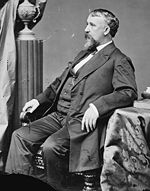 |
Abbott, Joseph Carter Joseph Carter Abbott Joseph Carter Abbott was a Union Army colonel during the American Civil War who was awarded the grade of brevet brigadier general of volunteers and a Republican United States Senator from the state of North Carolina between 1868 and 1871. During his career in private life he was a lawyer,... |
Colonel Colonel (United States) In the United States Army, Air Force, and Marine Corps, colonel is a senior field grade military officer rank just above the rank of lieutenant colonel and just below the rank of brigadier general... , USV (November 17, 1863) |
Brigadier General, USV (January 15, 1865) |
U.S. Senator United States Senate The United States Senate is the upper house of the bicameral legislature of the United States, and together with the United States House of Representatives comprises the United States Congress. The composition and powers of the Senate are established in Article One of the U.S. Constitution. Each... from New Hampshire New Hampshire New Hampshire is a state in the New England region of the northeastern United States of America. The state was named after the southern English county of Hampshire. It is bordered by Massachusetts to the south, Vermont to the west, Maine and the Atlantic Ocean to the east, and the Canadian... (1868–1871) |
|||
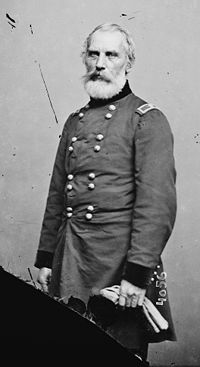 |
Abercrombie, John Joseph John Joseph Abercrombie John Joseph Abercrombie was a career United States Army officer who served in numerous wars, finally reaching the rank of brigadier general during the American Civil War.-Early life and career:... |
Brigadier General, USV (August 31, 1861) |
Brigadier General, USA (March 13, 1865) |
USMA, 1822 Resigned June 24, 1865 |
|||
 |
Adams, Charles Francis Jr. Charles Francis Adams, Jr. Charles Francis Adams II was a member of the prominent Adams family, and son of Charles Francis Adams, Sr. He served as a colonel in the Union Army during the American Civil War... |
Colonel, USV (March 14, 1865) |
Brigadier General, USV (March 13, 1865) |
Son of Charles Francis Adams, Sr. Charles Francis Adams, Sr. Charles Francis Adams, Sr. was an American lawyer, politician, diplomat and writer. He was the grandson of President John Adams and Abigail Adams and the son of President John Quincy Adams and Louisa Adams.... , U.S. Minister to the Court of St. James United States Ambassador to the United Kingdom The office of United States Ambassador to the United Kingdom was traditionally, and still is very much so today due to the Special Relationship, the most prestigious position in the United States Foreign Service... Grandson of President President of the United States The President of the United States of America is the head of state and head of government of the United States. The president leads the executive branch of the federal government and is the commander-in-chief of the United States Armed Forces.... John Quincy Adams John Quincy Adams John Quincy Adams was the sixth President of the United States . He served as an American diplomat, Senator, and Congressional representative. He was a member of the Federalist, Democratic-Republican, National Republican, and later Anti-Masonic and Whig parties. Adams was the son of former... Great-grandson of President John Adams John Adams John Adams was an American lawyer, statesman, diplomat and political theorist. A leading champion of independence in 1776, he was the second President of the United States... |
|||
| Albright, Charles Charles Albright (congressman) Charles Albright was a Republican member of the U.S. House of Representatives from Pennsylvania.-Biography:... |
Colonel, USV (January 24, 1863) |
Brigadier General, USV (March 7, 1865) |
U.S. Congressman United States House of Representatives The United States House of Representatives is one of the two Houses of the United States Congress, the bicameral legislature which also includes the Senate.The composition and powers of the House are established in Article One of the Constitution... from Pennsylvania Pennsylvania The Commonwealth of Pennsylvania is a U.S. state that is located in the Northeastern and Mid-Atlantic regions of the United States. The state borders Delaware and Maryland to the south, West Virginia to the southwest, Ohio to the west, New York and Ontario, Canada, to the north, and New Jersey to... (1873–1875) |
||||
 |
Alger, Russell Alexander Russell A. Alger Russell Alexander Alger was the 20th Governor and U.S. Senator from the state of Michigan and also U.S. Secretary of War during the Presidential administration of William McKinley... |
Colonel, USV (June 11, 1863) |
Major General Major general (United States) In the United States Army, United States Marine Corps, and United States Air Force, major general is a two-star general-officer rank, with the pay grade of O-8. Major general ranks above brigadier general and below lieutenant general... , USV (March 13, 1865) |
Resigned September 20, 1864 Governor of Michigan Governor of Michigan The Governor of Michigan is the chief executive of the U.S. State of Michigan. The current Governor is Rick Snyder, a member of the Republican Party.-Gubernatorial elections and term of office:... (1885-1887) Commander-in-chief, GAR (1889-1890) Secretary of War United States Secretary of War The Secretary of War was a member of the United States President's Cabinet, beginning with George Washington's administration. A similar position, called either "Secretary at War" or "Secretary of War," was appointed to serve the Congress of the Confederation under the Articles of Confederation... (1897-1899) Senator from Michigan Michigan Michigan is a U.S. state located in the Great Lakes Region of the United States of America. The name Michigan is the French form of the Ojibwa word mishigamaa, meaning "large water" or "large lake".... (1902–1907) |
|||
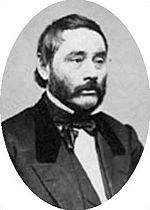 |
Allen, Robert Robert Allen (general) Robert Allen was a career officer in the United States Army, serving as a general during the American Civil War.-Early life and career:... |
Colonel, USA (February 19, 1862) Brigadier General, USV (May 23, 1863) |
Major General, USA (March 13, 1865) Major General, USV (March 13, 1865) |
USMA, 1836 | |||
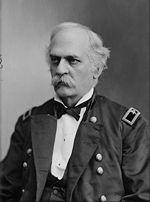 |
Alvord, Benjamin Benjamin Alvord (mathematician) Benjamin Alvord was an American soldier, mathematician, and botanist.-Early life and career:Alvord was born in Rutland, Vermont, where he developed an interest in nature. He attended the United States Military Academy and displayed a talent in mathematics. He graduated in 1833. He was assigned to... |
Major, USA (June 22, 1854) Brigadier General, USV (April 15, 1862) |
Brigadier General, USA (April 9, 1865) |
USMA, 1833 | |||
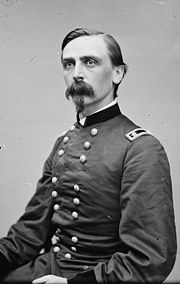 |
Ames, Adelbert Adelbert Ames Adelbert Ames was an American sailor, soldier, and politician. He served with distinction as a Union Army general during the American Civil War. As a Radical Republican and a Carpetbagger, he was military governor, Senator and civilian governor in Reconstruction-era Mississippi... |
Captain, USA (June 11, 1864) Brigadier General, USV (May 20, 1863) |
Major General, USA (March 13, 1865) Major General, USV (January 15, 1865) |
USMA, 1861 CMOH, First Battle of Bull Run First Battle of Bull Run First Battle of Bull Run, also known as First Manassas , was fought on July 21, 1861, in Prince William County, Virginia, near the City of Manassas... (July 21, 1861) Provisional Governor Mississippi (1868-1869) U.S. Senator from Mississippi Mississippi Mississippi is a U.S. state located in the Southern United States. Jackson is the state capital and largest city. The name of the state derives from the Mississippi River, which flows along its western boundary, whose name comes from the Ojibwe word misi-ziibi... (1870-1874) Governor of Mississippi (1875) Last surviving Union General, d. April 13, 1933 Son-in-law of Benjamin Franklin Butler Benjamin Franklin Butler (politician) Benjamin Franklin Butler was an American lawyer and politician who represented Massachusetts in the United States House of Representatives and later served as the 33rd Governor of Massachusetts.... |
|||
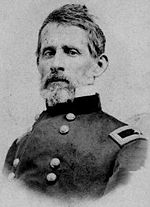 |
Ammen, Jacob Jacob Ammen Jacob Ammen was a college professor, civil engineer, and a general in the Union Army during the American Civil War. His younger brother, Daniel Ammen, was an admiral in the United States Navy.-Early life and career:... |
Brigadier General, USV (July 16, 1862) |
USMA, 1831 Resigned January 14, 1865 |
||||
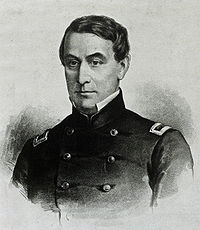 |
Anderson, Robert | Brigadier General, USA (May 15, 1861) |
Major General, USA (February 3, 1865) |
USMA, 1825 Retired October 27, 1863 |
|||
| Anderson, William Black William B. Anderson William Black Anderson is a former member of the US House of Representatives from Illinois. Born April 2, 1830 in Mount Vernon, Illinois, he attended McKendree College and studied law. Despite being admitted to the bar, he never practiced law, instead pursuing agricultural works. From 1856-58, he... |
Colonel, USV (April 4,1863) |
Brigadier General, USV (March 13, 1865) |
U.S. Congressman from Illinois Illinois Illinois is the fifth-most populous state of the United States of America, and is often noted for being a microcosm of the entire country. With Chicago in the northeast, small industrial cities and great agricultural productivity in central and northern Illinois, and natural resources like coal,... (1875-1877) |
||||
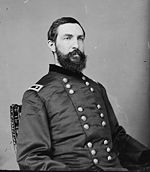 |
Andrews, Christopher Columbus Christopher Columbus Andrews Christopher Columbus Andrews was an American soldier, diplomat, newspaperman, author, and forester.-Early life and career:... |
Brigadier General, USV (January 5, 1864) |
Major General, USV (March 9, 1865) |
||||
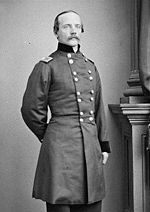 |
Andrews, George Leonard George Leonard Andrews George Leonard Andrews was an American professor, civil engineer, and soldier. He was a brigadier general in the Union Army during the American Civil War and was awarded the honorary grade of brevet major general.... |
Brigadier General, USV (November 10, 1862) |
Major General, USV (March 26, 1865) |
USMA, 1851 | |||
| Andrews, Timothy Patrick | Colonel, USA (September 6, 1862) |
Brigadier General, USA (September 13, 1847) |
Paymaster General (1862-1864) Retired November 29, 1862 rejected a commission as brevet Brigadier General, USA (March 13, 1865) on the basis that he already possessed such an appointment |
||||
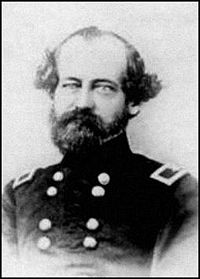 |
Arnold, Lewis Golding Lewis Golding Arnold Lewis Golding Arnold was a career U.S. Army officer and a brigadier general in the Union Army during the American Civil War, primarily noted for his service in Florida.-Birth and early years:... |
Lieutenant Colonel Lieutenant Colonel (United States) In the United States Army, United States Air Force, and United States Marine Corps, a lieutenant colonel is a field grade military officer rank just above the rank of major and just below the rank of colonel. It is equivalent to the naval rank of commander in the other uniformed services.The pay... , USA (August 1, 1863) Brigadier General, USV (January 24, 1862) |
USMA, 1837 Retired February 8, 1864 |
||||
 |
Arnold, Richard Richard Arnold (general) Richard Arnold was a career U.S. Army officer who served as a brigadier general in the Union forces during the American Civil War... |
Captain, USA (May 14, 1861) Brigadier General, USV (November 29, 1862) |
Major General, USA (March 13, 1865) Major General, USV (August 22, 1865) |
USMA, 1850 | |||
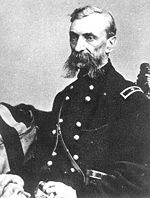 |
Asboth, Alexander Sandor Alexander Asboth Alexander Asboth was a Hungarian military leader best known for his victories as a Union general during the American Civil War. He also served as United States Ambassador to Argentina and as United States Ambassador to Uruguay.-Early life:Asboth was born in Keszthely, Hungary... |
Brigadier General, USV (March 21, 1862) |
Major General, USV (March 13, 1865) |
Appointed Brigadier General, USV (September 3, 1861) by John Charles Frémont John C. Frémont John Charles Frémont , was an American military officer, explorer, and the first candidate of the anti-slavery Republican Party for the office of President of the United States. During the 1840s, that era's penny press accorded Frémont the sobriquet The Pathfinder... who lacked the authority to make such an appointment |
|||
| Astor, John Jacob III John Jacob Astor III John Jacob Astor III was the elder son of William Backhouse Astor, Sr. and the wealthiest member of the Astor family in his generation... |
Colonel, USV (November 30, 1861) |
Brigadier General, USV (March 13, 1865) |
Mustered out July 11, 1862 | ||||
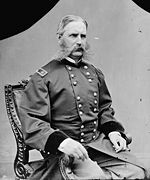 |
Augur, Christopher Columbus Christopher C. Augur Christopher Columbus Augur was an American military officer, most noted for his role in the American Civil War. Although less well known than other Union commanders, he was nonetheless considered an able battlefield commander.-Early life:Augur was born in Kendall, New York. He moved with his... |
Lieutenant Colonel, USA (July 1, 1863) Major General, USV (August 9, 1862) |
Major General, USA (March 13, 1865) |
USMA, 1843 | |||
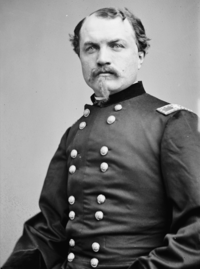 |
Averell, William Woods William W. Averell William Woods Averell was a career United States Army officer and a cavalry general in the American Civil War. After the war he was a diplomat and became wealthy by inventing American asphalt pavement.-Early years:... |
Captain, USA (July 17, 1862) Brigadier General, USV (September 26, 1862) |
Major General, USA (March 13, 1865) Major General, USV (August 7, 1864) |
USMA, 1855 | |||
| Averill, John Thomas | Colonel, USV (November 22, 1864) |
Brigadier General, USV (October 18, 1865) |
U.S. Congressman from Minnesota Minnesota Minnesota is a U.S. state located in the Midwestern United States. The twelfth largest state of the U.S., it is the twenty-first most populous, with 5.3 million residents. Minnesota was carved out of the eastern half of the Minnesota Territory and admitted to the Union as the thirty-second state... (1871-1875) |
||||
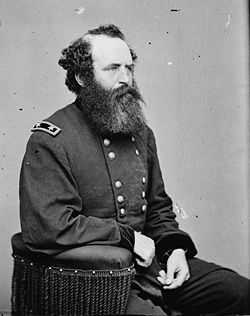 |
Ayres, Romeyn Beck Romeyn B. Ayres Romeyn Beck Ayres was a Union Army general in the American Civil War.-Early life:Ayres was born at East Creek, New York, along the Mohawk River in Montgomery County. He was the son of a small-town doctor who urged all of his sons into professional careers... |
Captain, USA (May 14, 1861) Brigadier General, USV (November 29, 1862) |
Major General, USA (March 13, 1865) Major General, USV (August 1, 1864) |
USMA, 1847 |
B
| Image | Name | Substantive Rank | Brevet Rank | Babcock, Orville Elias Orville E. Babcock Orville Elias Babcock was an American Civil War General in the Union Army. Immediately upon graduating third in his class as United States Military Academy in 1861, Babcock would go onto serve efficiently in the Corps of Engineers throughout the Civil War and was promoted to Brevet Brigadier... | Lieutenant Colonel, USA (January 1, 1863) |
Brigadier General, USA (March 13, 1865) |
Private secretary Secretary to the President of the United States The Secretary to the President was an old 19th and early 20th century White House position that carried out all the tasks now spread throughout the modern White House Office... to President President of the United States The President of the United States of America is the head of state and head of government of the United States. The president leads the executive branch of the federal government and is the commander-in-chief of the United States Armed Forces.... Ulysses Simpson Grant Ulysses S. Grant Ulysses S. Grant was the 18th President of the United States as well as military commander during the Civil War and post-war Reconstruction periods. Under Grant's command, the Union Army defeated the Confederate military and ended the Confederate States of America... |
|---|---|---|---|---|---|---|---|
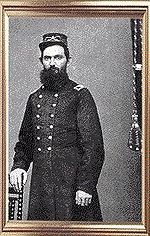 |
Bailey, Joseph Joseph Bailey (general) Joseph Bailey was a civil engineer who served as a general in the Union Army during the American Civil War.-Early life:... |
Brigadier General, USV (November 10, 1864) |
Major General, USV (March 13, 1865) |
Received the Thanks of Congress Thanks of Congress The Thanks of Congress are a series of formal resolutions passed by the United States Congress originally to extend the government's formal thanks for significant victories or impressive actions by American military commanders and their troops. Although it began during the American Revolutionary... (June 4, 1864) |
|||
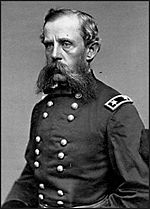 |
Baird, Absalom Absalom Baird Absalom Baird was a career United States Army officer who distinguished himself as a Union Army general in the American Civil War. Baird received the Congressional Medal of Honor for his military actions-Early life:... |
Major, USA (November 12, 1861) Brigadier General, USV (April 28, 1862) |
Major General, USA (March 13, 1865) Major General, USV (September 1, 1864) |
USMA, 1849 CMOH, Battle of Jonesborough Battle of Jonesborough -Further reading:... (September 1, 1864) |
|||
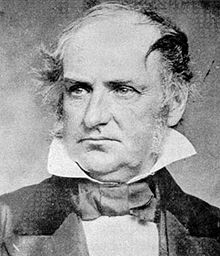 |
Baker, Edward Dickinson Edward Dickinson Baker Edward Dickinson Baker was an English-born American politician, lawyer, military leader. In his political career, Baker served in the U.S. House of Representatives from Illinois and later as a U.S. Senator from Oregon. A long-time close friend of U.S. President Abraham Lincoln, Baker served as U.S... |
Major General, USV (September 21, 1861) |
KIA, Battle of Ball's Bluff Battle of Ball's Bluff The Battle of Ball's Bluff, also known as the Battle of Harrison’s Island or the Battle of Leesburg, was fought on October 21, 1861, in Loudoun County, Virginia, as part of Union Maj. Gen. George B... (October 21, 1861) Rejected appointment as Brigadier General, USV (May 17, 1861) Promoted to Major General, USV posthumously U.S. Congressman from Illinois Illinois Illinois is the fifth-most populous state of the United States of America, and is often noted for being a microcosm of the entire country. With Chicago in the northeast, small industrial cities and great agricultural productivity in central and northern Illinois, and natural resources like coal,... (1845-1846, 1849-1851) U.S. Senator from Oregon Oregon Oregon is a state in the Pacific Northwest region of the United States. It is located on the Pacific coast, with Washington to the north, California to the south, Nevada on the southeast and Idaho to the east. The Columbia and Snake rivers delineate much of Oregon's northern and eastern... (1860-1861) |
||||
| Baker, Lafayette Curry Lafayette C. Baker Lafayette Curry Baker was a United States investigator and spy, serving for the Union Army, during the American Civil War and under presidents Abraham Lincoln and Andrew Johnson.... |
Brigadier General, USV (April 26, 1865) |
||||||
 |
Banks, Nathaniel Prentiss | Major General, USV (May 16, 1861) |
Received the Thanks of Congress Thanks of Congress The Thanks of Congress are a series of formal resolutions passed by the United States Congress originally to extend the government's formal thanks for significant victories or impressive actions by American military commanders and their troops. Although it began during the American Revolutionary... (January 28, 1864) U.S. Congressman from Massachusetts Massachusetts The Commonwealth of Massachusetts is a state in the New England region of the northeastern United States of America. It is bordered by Rhode Island and Connecticut to the south, New York to the west, and Vermont and New Hampshire to the north; at its east lies the Atlantic Ocean. As of the 2010... (1853-1857, 1865-1873, 1875-1879, 1889-1891) Speaker of the House Speaker of the United States House of Representatives The Speaker of the United States House of Representatives, or Speaker of the House, is the presiding officer of the United States House of Representatives... (1856-1857) Governor of Massachusetts Governor of Massachusetts The Governor of the Commonwealth of Massachusetts is the executive magistrate of the Commonwealth of Massachusetts, United States. The current governor is Democrat Deval Patrick.-Constitutional role:... (1858-1861) |
||||
| Banning, Henry Blackstone Henry B. Banning Henry Blackstone Banning was a lawyer and three-term U.S. Representative from Ohio, as well as an infantry officer in the Union Army during the American Civil War.-Early life and career:... |
Colonel, USV (November 10, 1863) |
Major General, USV (March 13, 1865) |
Resigned January 21, 1865 U.S. Congressman from Ohio Ohio Ohio is a Midwestern state in the United States. The 34th largest state by area in the U.S.,it is the 7th‑most populous with over 11.5 million residents, containing several major American cities and seven metropolitan areas with populations of 500,000 or more.The state's capital is Columbus... (1873-1879) |
||||
| Barlow, Francis Channing Francis C. Barlow Francis Channing Barlow was a lawyer, politician, and Union General during the American Civil War.-Early life and career:... |
Major General, USV (May 25, 1865) |
||||||
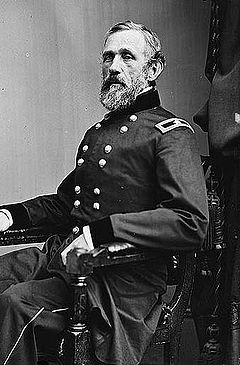 |
Barnard, John Gross John G. Barnard John Gross Barnard was a career engineering officer in the U.S. Army, serving in the Mexican-American War, as the Superintendent of the United States Military Academy and as a general in the Union Army during the American Civil War... |
Colonel, USA (December 28, 1865) Brigadier General, USV (September 23, 1861) |
Major General, USA (March 13, 1865) Major General, USV (July 4, 1864) |
USMA, 1833 Superintendent, USMA (1855-1856) |
|||
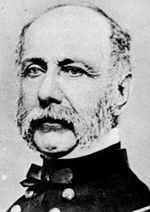 |
Barnes, James | Brigadier General, USV (November 29, 1862) |
Major General, USV (March 13, 1865) |
||||
| Barnes, Joseph K. Joseph Barnes Joseph K. Barnes, M.D. was an American physician and the 12th Surgeon General of the United States Army .-Career and early life:... , M.D. Doctor of Medicine Doctor of Medicine is a doctoral degree for physicians. The degree is granted by medical schools... |
Brigadier General, USA (August 22, 1864) |
Major General, USA (March 13, 1865) |
Surgeon General (1864-1882) Surgeon at the deathbeds of Presidents Abraham Lincoln Abraham Lincoln Abraham Lincoln was the 16th President of the United States, serving from March 1861 until his assassination in April 1865. He successfully led his country through a great constitutional, military and moral crisis – the American Civil War – preserving the Union, while ending slavery, and... and James Abram Garfield |
||||
| Barney, Lewis Tappan | Captain, USV (February 29, 1864) |
Brigadier General, USV (March 13, 1865) |
Resigned June 21, 1864 Declined appointment as Colonel, USV (1864) Youngest brevet brigadier general |
||||
| Barnum, Henry Alanson Henry A. Barnum Henry Alanson Barnum was a United States Army officer during the American Civil War and a recipient of the United States military's highest decoration, the Medal of Honor.-Early life:... |
Brigadier General, USV (May 31, 1865) |
Major General, USV (March 13, 1865) |
CMOH, Battle of Lookout Mountain Battle of Lookout Mountain The Battle of Lookout Mountain was fought November 24, 1863, as part of the Chattanooga Campaign of the American Civil War. Union forces under Maj. Gen. Joseph Hooker assaulted Lookout Mountain, Chattanooga, Tennessee, and defeated Confederate forces commanded by Maj. Gen. Carter L. Stevenson.... (November 24, 1863) |
||||
| Barry, Henry W. Henry W. Barry Henry W. Barry was a U.S. Representative from Mississippi.Born in Schoharie County, New York, Barry was self-educated.He was principal of Locust Grove Academy in Kentucky... |
Colonel, USV (April 28, 1864) |
Brigadier General, USV (March 13, 1865) |
U.S Congressman from Mississippi Mississippi Mississippi is a U.S. state located in the Southern United States. Jackson is the state capital and largest city. The name of the state derives from the Mississippi River, which flows along its western boundary, whose name comes from the Ojibwe word misi-ziibi... (1870-1875) Brevet obtained by alleged fraud |
||||
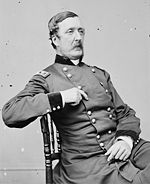 |
Barry, William Farquhar William Farquhar Barry William Farquhar Barry was a career officer in the United States Army, serving as an artillery commander during the Mexican-American War and Civil War.-Birth and early years:... |
Colonel, USA (December 11, 1865) Brigadier General, USV (August 20, 1861) |
Major General, USA (March 13, 1865) Major General, USV (September 1, 1864) |
USMA, 1838 | |||
| Bartlett, Joseph Jackson Joseph J. Bartlett Joseph Jackson Bartlett was a New York attorney, brigadier general in the Union Army during the American Civil War, and postbellum international diplomat and pensions administrator for the United States Government. He was chosen to receive the stacked arms of General Robert E... |
Brigadier General, USV (March 30, 1863) |
Major General, USV (August 1, 1864) |
Original appointment as Brigadier General, USV (October 4, 1862) expired March 4, 1863 | ||||
| Bartlett, William Francis William Francis Bartlett William Francis Bartlett was a general in the Union Army during the American Civil War and, later, an executive in the iron industry.... |
Brigadier General, USV (June 20, 1864) |
Major General, USV (March 13, 1865) |
|||||
| Batchelder, Richard Napoleon Richard Napoleon Batchelder Richard Napoleon Batchelder was a United States Army Officer and the 18th Quartermaster General of the United States Army. Brigadier General Batchelder was awarded the Medal Of Honor in 1891.-Military career:... |
Captain, USA (February 16, 1865) Colonel, USV (August 2, 1864) |
Brigadier General, USA (April 9, 1865) Brigadier General, USV (March 13, 1865) |
CMOH, between Catlett Catlett, Virginia Catlett is a census-designated place in Fauquier County, Virginia, United States. The population as of the 2010 Census was 296. It is located west of the Prince William County line. Catlett was a former rail stop on the Orange and Alexandria Railroad. The area was the site of many raids on the... and Fairfax Station, Virginia Fairfax Station, Virginia Fairfax Station is a census-designated place in Fairfax County, Virginia, ZIP code 22039. The population as of the 2010 Census was 12,030. As a suburb of Washington, DC, it is a bedroom community for many who work in the federal government.-Averages:... (October 13-15, 1863) |
||||
| Bates, Delevan | Colonel, USV (March 23, 1864) |
Brigadier General, USV (March 13, 1865) |
CMOH, Battle of the Crater Battle of the Crater The Battle of the Crater was a battle of the American Civil War, part of the Siege of Petersburg. It took place on July 30, 1864, between the Confederate Army of Northern Virginia, commanded by General Robert E. Lee and the Union Army of the Potomac, commanded by Major General George G. Meade The... (July 30, 1864) |
||||
| Baxter, Henry Henry Baxter Henry Baxter was a general in the Union Army during the American Civil War. At the Battle of Gettysburg, his brigade resisted a Confederate assault from parts of Maj. Gen. Robert E... |
Brigadier General, USV (March 12, 1863) |
Major General, USV (April 1, 1865) |
U.S. minister to Honduras United States Ambassador to Honduras The following is a list of United States Ambassadors, or other Chiefs of Mission, to Honduras. The title given by the United States State Department to this position is currently Ambassador Extraordinary and Plenipotentiary.-See also:... (1869-1873) |
||||
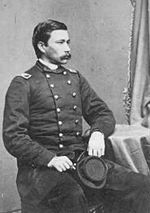 |
Bayard, George Dashiell George Dashiell Bayard George Dashiell Bayard was a career soldier in the United States Army and a general in the Union Army in the American Civil War... |
Captain, USA (August 20, 1861) Brigadier General, USV (April 28, 1862) |
USMA, 1856 DOW, Battle of Fredericksburg Battle of Fredericksburg The Battle of Fredericksburg was fought December 11–15, 1862, in and around Fredericksburg, Virginia, between General Robert E. Lee's Confederate Army of Northern Virginia and the Union Army of the Potomac, commanded by Maj. Gen. Ambrose E. Burnside... (w. December 13, 1862, d. December 14, 1862) |
||||
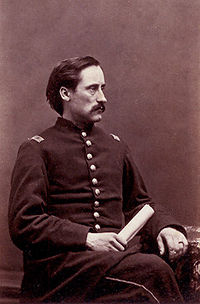 |
Beal, George Lafayette George Lafayette Beal George Lafayette Beal was an American politician from the state of Maine who served in the Union forces during the American Civil War.-Early life and background:... |
Brigadier General, USV (November 30, 1864) |
Major General, USV (March 13, 1865) |
||||
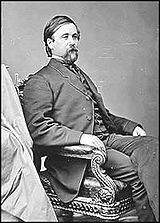 |
Beatty, John | Brigadier General, USV (November 29, 1862) |
U.S. Congressman from Ohio Ohio Ohio is a Midwestern state in the United States. The 34th largest state by area in the U.S.,it is the 7th‑most populous with over 11.5 million residents, containing several major American cities and seven metropolitan areas with populations of 500,000 or more.The state's capital is Columbus... (1868-1873) |
||||
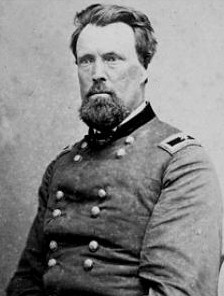 |
Beatty, Samuel Samuel Beatty (general) Samuel Beatty was an American soldier, sheriff, and farmer from Ohio. He was a brigadier general in the Union Army during the American Civil War. In 1866, he was awarded the brevet grade of major general of volunteers.... |
Brigadier General, USV (November 29, 1862) |
Major General, USV (March 13, 1863) |
||||
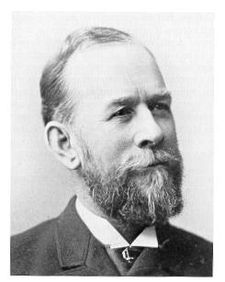 |
Beaver, James Addams James A. Beaver James Addams Beaver was an American politician who served as the 20th Governor of Pennsylvania from 1887 to 1891... |
Colonel, USV (September 8, 1862) |
Brigadier General, USV (August 1, 1864) |
Mustered out December 27, 1864 Governor of Pennsylvania (1887-1891) |
|||
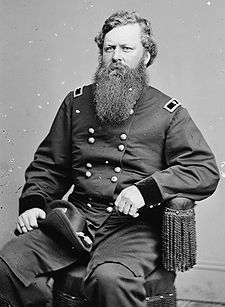 |
Belknap, William Worth William W. Belknap William Worth Belknap was a United States Army general, government administrator, and United States Secretary of War. He was the only Cabinet secretary ever to have been impeached by the United States House of Representatives.-Birth and early years:Born in Newburgh, New York to career soldier... |
Brigadier General, USV (July 30, 1864) |
Major General, USV (March 13, 1865) |
Secretary of War United States Secretary of War The Secretary of War was a member of the United States President's Cabinet, beginning with George Washington's administration. A similar position, called either "Secretary at War" or "Secretary of War," was appointed to serve the Congress of the Confederation under the Articles of Confederation... (1869-1876) |
|||
 |
Benedict, Lewis | Colonel, USV (September 12, 1862) |
Brigadier General, USV (March 13, 1865) |
KIA, Battle of Pleasant Hill Battle of Pleasant Hill The Battle of Pleasant Hill was fought on April 9, 1864, during the Red River Campaign of the American Civil War, near Pleasant Hill, Louisiana, between Union forces led by Maj. Gen. Nathaniel P. Banks and Confederate forces, led by Maj. Gen... (April 9, 1864) |
|||
 |
Benham, Henry Washington Henry Washington Benham Henry Washington Benham was an American soldier and civil engineer who served as a general in the Union Army during the American Civil War.... |
Major (August 6, 1861) Brigadier General, USV (August 13, 1861) |
Major General, USA (March 13, 1865) Major General, USV (March 13, 1865) |
USMA, 1837 | |||
| Bennett, Thomas Warren Thomas W. Bennett (territorial governor) Thomas Warren Bennett was governor of Idaho Territory from 1871 to 1875. He also served as a Congressional delegate from the territory from March 4, 1875 to June 23, 1876... |
Colonel, USV (November 1, 1862) |
Brigadier General, USV (March 5, 1865) |
Territorial Governor of Idaho (1871-1875) Congressional Delegate Delegate (United States Congress) A delegate to Congress is a non-voting member of the United States House of Representatives who is elected from a U.S. territory and from Washington, D.C. to a two-year term. While unable to vote in the full House, a non-voting delegate may vote in a House committee of which the delegate is a member... for the Idaho Territory Idaho Idaho is a state in the Rocky Mountain area of the United States. The state's largest city and capital is Boise. Residents are called "Idahoans". Idaho was admitted to the Union on July 3, 1890, as the 43rd state.... (1875-1876) |
||||
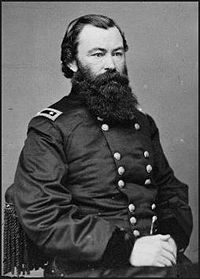 |
Benton, William Plummer William Plummer Benton William Plummer Benton was an American lawyer and soldier who served in both the Mexican-American War and the American Civil War, where he would rise to the rank of brigadier general and, in 1866, after his service had ended, would be awarded the brevet grade of major general.-Early life:Benton... |
Brigadier General, USV (April 28, 1862) |
Major General, USV (March 26, 1865) |
||||
 |
Berry, Hiram Gregory | Major General, USV (November 29, 1862) |
KIA, Battle of Chancellorsville Battle of Chancellorsville The Battle of Chancellorsville was a major battle of the American Civil War, and the principal engagement of the Chancellorsville Campaign. It was fought from April 30 to May 6, 1863, in Spotsylvania County, Virginia, near the village of Chancellorsville. Two related battles were fought nearby on... (May 3, 1863) |
||||
 |
Beveridge, John Lourie John Lourie Beveridge John Lourie Beveridge was the 16th Governor of Illinois, serving from 1873 to 1877.- References :... |
Colonel, USV (June 28, 1864) |
Brigadier General, USV (March 7, 1865) |
U.S. Congressman from Illinois Illinois Illinois is the fifth-most populous state of the United States of America, and is often noted for being a microcosm of the entire country. With Chicago in the northeast, small industrial cities and great agricultural productivity in central and northern Illinois, and natural resources like coal,... (1871-1873) Governor of Illinois Governor of Illinois The Governor of Illinois is the chief executive of the State of Illinois and the various agencies and departments over which the officer has jurisdiction, as prescribed in the state constitution. It is a directly elected position, votes being cast by popular suffrage of residents of the state.... (1873-1877) |
|||
| Bidwell, Daniel Davidson Daniel D. Bidwell Daniel Davidson Bidwell was a civic leader in Buffalo, New York, before the outbreak of the American Civil War. He enlisted early in the war and then was appointed colonel of a regiment of infantry... |
Brigadier General, USV (August 11, 1864) |
KIA, Battle of Cedar Creek Battle of Cedar Creek The Battle of Cedar Creek, or Battle of Belle Grove, October 19, 1864, was one of the final, and most decisive, battles in the Valley Campaigns of 1864 during the American Civil War. The final Confederate invasion of the North, led by Lt. Gen. Jubal A. Early, was effectively ended... (October 19, 1864) |
|||||
| Bingham, Henry Harrison Henry H. Bingham Henry Harrison Bingham was a Union Army officer in the American Civil War, who received the United States Military's highest award for valor, the Medal of Honor, for his actions at the Battle of the Wilderness.... |
Major, USV (August 1, 1864) |
Brigadier General, USV (April 9, 1865) |
CMOH, Battle of the Wilderness Battle of the Wilderness The Battle of the Wilderness, fought May 5–7, 1864, was the first battle of Lt. Gen. Ulysses S. Grant's 1864 Virginia Overland Campaign against Gen. Robert E. Lee and the Confederate Army of Northern Virginia. Both armies suffered heavy casualties, a harbinger of a bloody war of attrition by... (May 6, 1864) U.S. Congressman from Pennsylvania Pennsylvania The Commonwealth of Pennsylvania is a U.S. state that is located in the Northeastern and Mid-Atlantic regions of the United States. The state borders Delaware and Maryland to the south, West Virginia to the southwest, Ohio to the west, New York and Ontario, Canada, to the north, and New Jersey to... (1879-1912) |
||||
| Birge, Henry Warner Henry Warner Birge Henry Warner Birge was an American general during the American Civil War.-Biography:Birge was born at Hartford, Connecticut.At the opening of the Civil War Birge organized the first state regiment of three-year troops — the 4th Connecticut Infantry — in which he was appointed major... |
Brigadier General, USV (September 19, 1863) |
Major General, USV (February 25, 1865) |
|||||
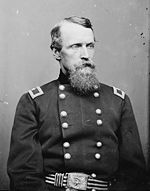 |
Birney, David Bell David B. Birney David Bell Birney was a businessman, lawyer, and a Union General in the American Civil War.-Early life:Birney was born in Huntsville, Alabama, the son of an abolitionist from Kentucky, James G. Birney. The Birney family returned to Kentucky in 1833, and James Birney freed his slaves... |
Major General, USV (May 20, 1863) |
Died of illness, October 18, 1864 Brother of William Birney William Birney William Birney was a professor, Union Army general during the American Civil War, attorney and author. An ardent abolitionist, he was noted for encouraging thousands of free black men to join the Union army.... |
||||
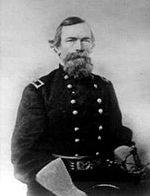 |
Birney, William William Birney William Birney was a professor, Union Army general during the American Civil War, attorney and author. An ardent abolitionist, he was noted for encouraging thousands of free black men to join the Union army.... |
Brigadier General, USV (May 22, 1863) |
Major General, USV (March 13, 1865) |
Brother of David Bell Birney David B. Birney David Bell Birney was a businessman, lawyer, and a Union General in the American Civil War.-Early life:Birney was born in Huntsville, Alabama, the son of an abolitionist from Kentucky, James G. Birney. The Birney family returned to Kentucky in 1833, and James Birney freed his slaves... |
|||
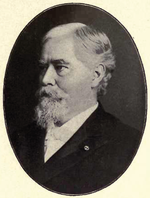 |
Black, John Charles John C. Black John Charles Black was a Democratic U.S. Congressman and received the Medal of Honor for his actions during the American Civil War.-Biography:... |
Colonel, USV (December 31, 1862) |
Brigadier General, USV (April 9, 1865) |
CMOH, Battle of Prairie Grove Battle of Prairie Grove The Battle of Prairie Grove was a battle of the American Civil War fought on 7 December 1862, that resulted in a tactical stalemate but essentially secured northwest Arkansas for the Union.-Strategic situation: Union:... (December 7, 1862) U.S. Congressman from Illinois Illinois Illinois is the fifth-most populous state of the United States of America, and is often noted for being a microcosm of the entire country. With Chicago in the northeast, small industrial cities and great agricultural productivity in central and northern Illinois, and natural resources like coal,... (1893-1895) Commander-in-chief, GAR (1903) |
|||
 |
Blair, Francis Preston Jr. | Major General, USV (November 29, 1862) |
Declined appointment as Brigadier General, USV (August 7, 1861) U.S. Congressman from Missouri Missouri Missouri is a US state located in the Midwestern United States, bordered by Iowa, Illinois, Kentucky, Tennessee, Arkansas, Oklahoma, Kansas and Nebraska. With a 2010 population of 5,988,927, Missouri is the 18th most populous state in the nation and the fifth most populous in the Midwest. It... (1857-1859, 1861-1862, 1863-1864) U.S. Senator from Missouri Missouri Missouri is a US state located in the Midwestern United States, bordered by Iowa, Illinois, Kentucky, Tennessee, Arkansas, Oklahoma, Kansas and Nebraska. With a 2010 population of 5,988,927, Missouri is the 18th most populous state in the nation and the fifth most populous in the Midwest. It... (1871-1873) Brother of Postmaster General Montgomery Blair Montgomery Blair Montgomery Blair , the son of Francis Preston Blair, elder brother of Francis Preston Blair, Jr. and cousin of B. Gratz Brown, was a politician and lawyer from Maryland... |
||||
| Blaisdell, William E. William E. Blaisdell William E. Blaisdell was an enlisted man in the Regular Army of the United States prior to and during the Mexican-American War. After Mexican War, he returned to civilian life as an inspector in the Boston Customs House... |
Colonel, USV (October 11, 1861) |
Brigadier General, USV (June 23, 1864) |
KIA, Battle of Jerusalem Plank Road Battle of Jerusalem Plank Road The Battle of Jerusalem Plank Road, also known as the First Battle of the Weldon Railroad, was fought June 21–23, 1864, near Petersburg, Virginia. It was the first of a series of battles during the Siege of Petersburg aimed at extending the Union siege lines to the west and cutting the rail... (June 23, 1864) |
||||
| Blenker, Louis Louis Blenker Louis Blenker was a German and American soldier.-Life in Germany:He was born at Worms, Germany. After being trained as a goldsmith by an uncle in Kreuznach, he was sent to a polytechnical school in Munich. Against his family's wishes, he enlisted in an Uhlan regiment which accompanied Otto to... (b. Blenker, Ludwig) |
Brigadier General, USV (August 9, 1861) |
Mustered out March 31, 1863 | |||||
| Blunt, James Gillpatrick James G. Blunt James Gillpatrick Blunt was a physician and abolitionist who rose to Union major general during the American Civil War.-Early life & career:... |
Major General, USV (March 16, 1863) |
||||||
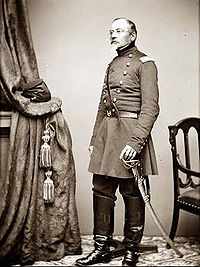 |
Bohlen, Henry Henry Bohlen Henry Bohlen was an American Civil War Union Brigadier General. Before becoming the first foreign-born Union general in the Civil War, he fought in the Mexican-American War Henry Bohlen (October 22, 1810 – August 22, 1862) was an American Civil War Union Brigadier General. Before becoming... |
Brigadier General, USV (April 28, 1862) |
KIA in reconnaissance over the Rappahannock River Rappahannock River The Rappahannock River is a river in eastern Virginia, in the United States, approximately in length. It traverses the entire northern part of the state, from the Blue Ridge Mountains in the west, across the Piedmont, to the Chesapeake Bay, south of the Potomac River.An important river in American... , Virginia Virginia The Commonwealth of Virginia , is a U.S. state on the Atlantic Coast of the Southern United States. Virginia is nicknamed the "Old Dominion" and sometimes the "Mother of Presidents" after the eight U.S. presidents born there... (August 22. 1862) |
||||
| Bowen, James | Brigadier General, USV (October 11, 1862) |
Major General, USV (March 13, 1865) |
Resigned July 27, 1864 | ||||
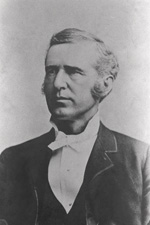 |
Bowen, Thomas Meade Thomas M. Bowen Thomas Mead Bowen was a United States Senator from Colorado.-Biography:Bowen was born near the present site of Burlington, Iowa, in what was then Michigan Territory. He attended the public schools and the academy at Mount Pleasant, Iowa, and studied law, and was admitted to the bar in 1853 and... |
Colonel, USV (September 20, 1862) |
Brigadier General, USV (February 13, 1865) |
Territorial Governor of Idaho (1871) U.S. Senator from Colorado Colorado Colorado is a U.S. state that encompasses much of the Rocky Mountains as well as the northeastern portion of the Colorado Plateau and the western edge of the Great Plains... (1883-1889) |
|||
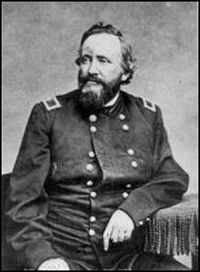 |
Boyle, Jeremiah Tilford Jeremiah Boyle Jeremiah Tilford Boyle was a successful lawyer and noted abolitionist. He served as a brigadier general in the Union Army during the American Civil War.-Biography:... |
Brigadier General, USV (November 9, 1861) |
Resigned January 26, 1864 | ||||
| Boynton, Henry Van Ness Henry V. Boynton Henry Van Ness Boynton was a Union Army officer during the American Civil War and a recipient of America's highest military decoration, the Medal of Honor, for his actions at the Battle of Missionary Ridge... |
Lieutenant Colonel, USV (July 13, 1863) |
Brigadier General, USV (March 13, 1865) |
CMOH, Battle of Missionary Ridge Battle of Missionary Ridge The Battle of Missionary Ridge was fought November 25, 1863, as part of the Chattanooga Campaign of the American Civil War. Following the Union victory in the Battle of Lookout Mountain on November 24, Union forces under Maj. Gen. Ulysses S. Grant assaulted Missionary Ridge and defeated the... (November 25, 1863) |
||||
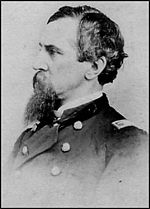 |
Bradley, Luther Prentice Luther Prentice Bradley Luther Prentice Bradley was an American soldier who served as a Union general officer during the American Civil War.-Early life:... |
Brigadier General, USV (June 30, 1864) |
|||||
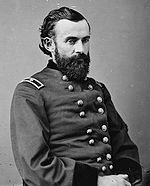 |
Bragg, Edward Stuyvesant Edward S. Bragg Edward Stuyvesant Bragg was a Democratic politician, lawyer and Union Army general from Wisconsin. He served in the U.S. House of Representatives from 1877 to 1883 and from 1885 to 1887 and subsequently served as a foreign diplomat.-Early life and career:Born in Unadilla, New York, Bragg attended... |
Brigadier General, USV (June 25, 1864) |
U.S. Congressman from Wisconsin Wisconsin Wisconsin is a U.S. state located in the north-central United States and is part of the Midwest. It is bordered by Minnesota to the west, Iowa to the southwest, Illinois to the south, Lake Michigan to the east, Michigan to the northeast, and Lake Superior to the north. Wisconsin's capital is... (1877-1883, 1885-1887) U.S. minister to Mexico United States Ambassador to Mexico The United States has maintained diplomatic relations with Mexico since 1823, when Andrew Jackson was appointed Envoy Extraordinary and Minister Plenipotentiary to that country. Jackson declined the appointment, however, and Joel R. Poinsett became the first U.S. envoy to Mexico in 1825. The rank... |
||||
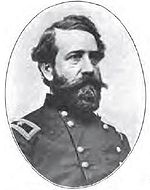 |
Brannan, John Milton John Milton Brannan John Milton Brannan was a career American Army officer who served in the Mexican-American War and as a Union general in the American Civil War, in command of the Department of Key West in Florida and assigned to Fort Zachary Taylor... |
Major, USA (August 1, 1863) Brigadier General, USV (September 28, 1861) |
Major General, USA (March 13, 1865) Major General, USV (January 23, 1865) |
USMA, 1841 | |||
| Brayman, Mason Mason Brayman Mason Brayman was an American attorney, newspaperman, and military officer. During his service to the Union Army during the American Civil War he rose to the rank of Brigadier general. Later in life, he became the seventh Governor of the Idaho Territory.-Early life:Brayman was born in Buffalo,... |
Brigadier General, USV (September 24, 1862) |
Major General, USV (March 13, 1865) |
Territorial Governor of Idaho (1876-1880) | ||||
| Brewerton, Henry Henry Brewerton Henry Brewerton was a career engineering officer in the United States Army, serving as the Superintendent of the United States Military Academy and then as a general in the Union Army during the American Civil War.... |
Colonel, USA (April 22, 1864) |
Brigadier General, USA (March 13, 1865) |
USMA, 1819 Superintendent, USMA (1845-1852) |
||||
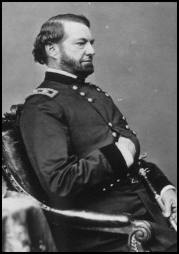 |
Brice, Benjamin William Benjamin Brice Benjamin William Brice was a lawyer and soldier who served in the United States Army during the Black Hawk War and Mexican-American War... |
Colonel, USA (November 29, 1864) |
Major General, USA (March 13, 1865) |
Paymaster General (1864-1872) | |||
| Briggs, Henry Shaw Henry Shaw Briggs Henry Shaw Briggs was brigadier general in the Union Army during the American Civil War.During the war, Briggs served as a captain with the 8th Regiment Massachusetts Volunteer Infantry. He was the colonel and first commander of the 10th Regiment Massachusetts Volunteer Infantry... |
Brigadier General, USV (July 17, 1862) |
||||||
| Brisbin, James Sanks James Sanks Brisbin James Sanks Brisbin was an American educator, lawyer, and soldier. He served as a Union Army general during the American Civil War... |
Captain, USA (August 5, 1861) Brigadier General, USV (May 1, 1865) |
Colonel, USA (March 13, 1865) Major General, USV (March 13, 1865) |
|||||
| Brodhead, Thornton Fleming | Colonel, USV (August 26, 1861) |
Brigadier General, USV (August 30, 1862) |
DOW, Second Battle of Bull Run Second Battle of Bull Run The Second Battle of Bull Run or Second Manassas was fought August 28–30, 1862, as part of the American Civil War. It was the culmination of an offensive campaign waged by Confederate Gen. Robert E. Lee's Army of Northern Virginia against Union Maj. Gen... (w. August 30, 1862 d. September 2, 1862) |
||||
 |
Brooke, John Rutter John R. Brooke John Rutter Brooke was a major general in the United States Army during both the American Civil War and the Spanish American War... |
Brigadier General, USV (May 12, 1864) |
Major General, USV (August 1, 1864) |
Military Governor of Puerto Rico Governor of Puerto Rico The Governor of Puerto Rico is the Head of Government of the Commonwealth of Puerto Rico. Since 1948, the Governor has been elected by the people of Puerto Rico... (1898) Military Governor of Cuba (1899) Commander-in-chief, MOLLUS (1905-1907) |
|||
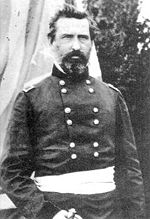 |
Brooks, William Thomas Harbaugh William T. H. Brooks William Thomas Harbaugh Brooks was a career military officer in the United States Army, serving as a major general during the American Civil War.-Early life:... |
Major, USA (March 12, 1862) Brigadier General, USV (September 28, 1861) |
USMA, 1841 Appointment as Major General, USV (June 10, 1863) revoked April 6, 1864 Resigned June 14, 1864 |
||||
| Brown, Charles Elwood Charles Elwood Brown Charles Elwood Brown was a U.S. Representative from Ohio.Born in Cincinnati, Ohio, Brown attended the common schools and Greenfield Academy, and was graduated from Miami University, Oxford, Ohio, in 1854.... |
Colonel, USV (June 6, 1865) |
Brigadier General, USV (March 13, 1865) |
U.S. Congressman from Ohio Ohio Ohio is a Midwestern state in the United States. The 34th largest state by area in the U.S.,it is the 7th‑most populous with over 11.5 million residents, containing several major American cities and seven metropolitan areas with populations of 500,000 or more.The state's capital is Columbus... (1885-1889) |
||||
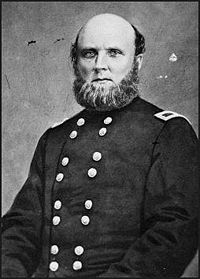 |
Brown, Egbert Benson Egbert B. Brown Egbert Benson Brown was a Union general in the Trans-Mississippi Theater of the American Civil War.-Early life and education:... |
Brigadier General, USV (November 29, 1862) |
|||||
| Browne, Thomas McLellan Thomas M. Browne Thomas McLelland Browne was a U.S. Representative from Indiana.Born in New Paris, Ohio, Browne moved to Indiana in January 1844.He attended the common schools.He moved to Winchester, Indiana, in 1848.He studied law.... |
Colonel, USV (October 10, 1865) |
Brigadier General, USV (March 13, 1865) |
U.S. Congressman from Indiana Indiana Indiana is a US state, admitted to the United States as the 19th on December 11, 1816. It is located in the Midwestern United States and Great Lakes Region. With 6,483,802 residents, the state is ranked 15th in population and 16th in population density. Indiana is ranked 38th in land area and is... (1877-1891) |
||||
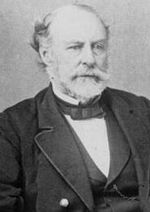 |
Buchanan, Robert Christie Robert C. Buchanan Robert Christie Buchanan was an American military officer who served in the Mexican War and then was a general in the Union Army during the American Civil War... |
Colonel, USA (February 8, 1864) Brigadier General, USV (November 29, 1862) |
Major General, USA (March 13, 1865) |
USMA, 1830 Volunteer appointment expired March 4, 1863 Nephew of First Lady First Lady of the United States First Lady of the United States is the title of the hostess of the White House. Because this position is traditionally filled by the wife of the president of the United States, the title is most often applied to the wife of a sitting president. The current first lady is Michelle Obama.-Current:The... Louisa Adams Louisa Adams Louisa Catherine Johnson Adams, born Louisa Catherine Johnson , wife of John Quincy Adams, was First Lady of the United States from 1825 to 1829.-Early life:... (Wife of President President of the United States The President of the United States of America is the head of state and head of government of the United States. The president leads the executive branch of the federal government and is the commander-in-chief of the United States Armed Forces.... John Quincy Adams John Quincy Adams John Quincy Adams was the sixth President of the United States . He served as an American diplomat, Senator, and Congressional representative. He was a member of the Federalist, Democratic-Republican, National Republican, and later Anti-Masonic and Whig parties. Adams was the son of former... ) |
|||
| Buckingham, Catharinus Putnam Catharinus P. Buckingham Catharinus Putnam Buckingham was an American soldier, college professor, author, and industrialist. He served as a general in the Union Army during the American Civil War, and was the main assistant to the U.S. Secretary of War, Edwin M... |
Brigadier General, USV (July 16, 1862) |
USMA, 1829 Resigned February 11, 1863 |
|||||
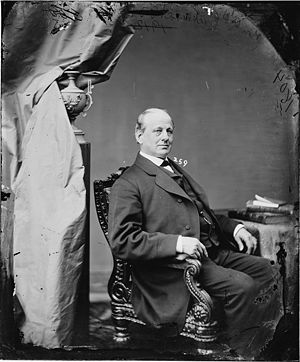 |
Buckland, Ralph Pomeroy Ralph P. Buckland Ralph Pomeroy Buckland was a U.S. Representative from Ohio, as well as a brigadier general in the Union Army during the American Civil War and an executive of the Union Pacific Railroad following the war.... |
Brigadier General, USV (November 29, 1862) |
Major General, USV (March 13, 1865) |
Resigned January 6, 1865 U.S. Congressman from Ohio Ohio Ohio is a Midwestern state in the United States. The 34th largest state by area in the U.S.,it is the 7th‑most populous with over 11.5 million residents, containing several major American cities and seven metropolitan areas with populations of 500,000 or more.The state's capital is Columbus... (1865-1869) |
|||
 |
Buell, Don Carlos Don Carlos Buell Don Carlos Buell was a career United States Army officer who fought in the Seminole War, the Mexican-American War, and the American Civil War. Buell led Union armies in two great Civil War battles—Shiloh and Perryville. The nation was angry at his failure to defeat the outnumbered... |
Colonel, USA (July 17, 1862) Major General, USV (March 21, 1862) |
USMA, 1841 Mustered out of volunteer service May 28, 1864 Resigned June 1, 1864 |
||||
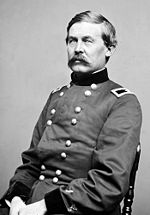 |
Buford, John John Buford John Buford, Jr. was a Union cavalry officer during the American Civil War, with a prominent role at the start of the Battle of Gettysburg.-Early years:... |
Captain, USA (November 12, 1861) Major General, USV (July 1, 1863) |
USMA, 1848 Died of illness December 16, 1863 Brother of Napoleon Bonaparte Buford Napoleon Bonaparte Buford Napoleon Bonaparte Buford was an American soldier, Union general in the American Civil War, and railroad executive. He was the half-brother of the famous Gettysburg hero, John Buford, but never attained his sibling's military distinction.-Birth and early years:Buford was the son of John and Nancy... |
||||
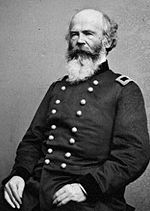 |
Buford, Napoleon Bonaparte Napoleon Bonaparte Buford Napoleon Bonaparte Buford was an American soldier, Union general in the American Civil War, and railroad executive. He was the half-brother of the famous Gettysburg hero, John Buford, but never attained his sibling's military distinction.-Birth and early years:Buford was the son of John and Nancy... |
Brigadier General, USV (April 15, 1862) |
Major General, USV (March 13, 1865) |
USMA, 1827 Appointment as Major General, USV (November 29, 1862) expired March 4, 1863 Brother of John Buford John Buford John Buford, Jr. was a Union cavalry officer during the American Civil War, with a prominent role at the start of the Battle of Gettysburg.-Early years:... |
|||
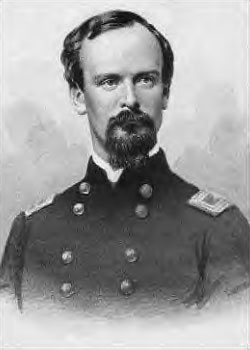 |
Burbridge, Stephen Gano Stephen G. Burbridge -External links:* — Article by Civil War historian/author Bryan S. Bush... |
Brigadier General, USV (June 9, 1862) |
Major General, USV (July 4, 1864) |
||||
 |
Burnett, Henry Lawrence Henry Lawrence Burnett Henry Lawrence Burnett was a brevet brigadier general for the Union in the American Civil War and a prosecutor in the trial that followed the Abraham Lincoln assassination.-Early life:... |
Major, USV (August 10, 1863) |
Brigadier General, USV (March 13, 1865) |
Assistant prosecutor, Lincoln assassination trial Abraham Lincoln assassination The assassination of United States President Abraham Lincoln took place on Good Friday, April 14, 1865, as the American Civil War was drawing to a close. The assassination occurred five days after the commanding General of the Army of Northern Virginia, Robert E. Lee, and his battered Army of... |
|||
| Burnham, Hiram Hiram Burnham Hiram Burnham was an officer in the Union Army who commanded a regiment and then a brigade in the Eastern Theater of the American Civil War... |
Brigadier General, USV (April 26, 1864) |
KIA, Battle of Chaffin's Farm Battle of Chaffin's Farm The Battle of Chaffin's Farm and New Market Heights, also known as Laurel Hill and combats at Forts Harrison, Johnson, and Gilmer, was fought September 29–30, 1864, as part of the Siege of Petersburg in the American Civil War.-Background:... (September 29, 1864) |
|||||
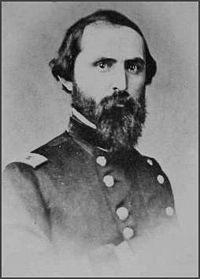 |
Burns, William Wallace William Wallace Burns William Wallace Burns was a career American soldier who served in the Union Army during the American Civil War, reaching the rank of brigadier general in the volunteer army. He was among the commanders of the famed Philadelphia Brigade.-Birth and early years:Burns was born in Coshocton, Ohio, son... |
Major, USA (August 3, 1861) Brigadier General, USV (September 28, 1861) |
Brigadier General, USA (March 13, 1865) |
USMA, 1847 Resigned volunteer commission March 20, 1863 |
|||
 |
Burnside, Ambrose Everett Ambrose Burnside Ambrose Everett Burnside was an American soldier, railroad executive, inventor, industrialist, and politician from Rhode Island, serving as governor and a U.S. Senator... |
Major General, USV (March 18, 1862) |
USMA, 1847 Received the Thanks of Congress Thanks of Congress The Thanks of Congress are a series of formal resolutions passed by the United States Congress originally to extend the government's formal thanks for significant victories or impressive actions by American military commanders and their troops. Although it began during the American Revolutionary... (January 28, 1864) Resigned April 15, 1865 Governor of Rhode Island (1866-1869) Commander-in-chief, GAR (1871-1873) U.S. Senator from Rhode Island Rhode Island The state of Rhode Island and Providence Plantations, more commonly referred to as Rhode Island , is a state in the New England region of the United States. It is the smallest U.S. state by area... (1875-1881) |
||||
| Busey, Samuel Thompson Samuel T. Busey Samuel Thompson Busey was a U.S. Representative from Illinois.-Biography:Samuel Busey was born in Greencastle, Indiana but moved with his parents to Urbana, Illinois... |
Colonel, USV (January 7, 1863) |
Brigadier General, USV (April 9, 1865) |
U.S. Congressman from Illinois Illinois Illinois is the fifth-most populous state of the United States of America, and is often noted for being a microcosm of the entire country. With Chicago in the northeast, small industrial cities and great agricultural productivity in central and northern Illinois, and natural resources like coal,... (1891-1893) |
||||
| Bussey, Cyrus Cyrus Bussey Cyrus Bussey was an American soldier and politician, serving as a major general in the Union Army during the American Civil War.-Early life and career:... |
Brigadier General, USV (January 5, 1864) |
Major General, USV (March 13, 1865) |
|||||
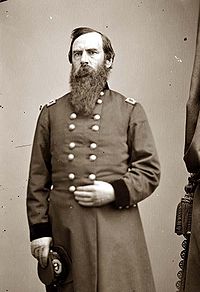 |
Busteed, Richard Richard Busteed Richard Busteed was an attorney and soldier who served in the Union Army during the American Civil War. He was a lawyer before and after the war, and also served as the U.S. District Judge of Alabama from 1863 – 1874. He became highly controversial in that position, and resigned to avoid... |
Brigadier General, USV (August 7, 1862) |
Appointment expired March 4, 1863 | ||||
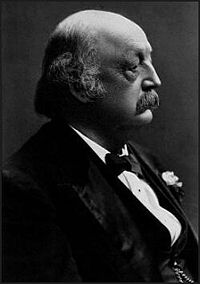 |
Butler, Benjamin Franklin Benjamin Franklin Butler (politician) Benjamin Franklin Butler was an American lawyer and politician who represented Massachusetts in the United States House of Representatives and later served as the 33rd Governor of Massachusetts.... |
Major General, USV (May 16, 1863) |
U.S. Congressman from Massachusetts Massachusetts The Commonwealth of Massachusetts is a state in the New England region of the northeastern United States of America. It is bordered by Rhode Island and Connecticut to the south, New York to the west, and Vermont and New Hampshire to the north; at its east lies the Atlantic Ocean. As of the 2010... (1867-1875, 1877-1879) Governor of Massachusetts Governor of Massachusetts The Governor of the Commonwealth of Massachusetts is the executive magistrate of the Commonwealth of Massachusetts, United States. The current governor is Democrat Deval Patrick.-Constitutional role:... (1883-1884) Father-in-law of Adelbert Ames Adelbert Ames Adelbert Ames was an American sailor, soldier, and politician. He served with distinction as a Union Army general during the American Civil War. As a Radical Republican and a Carpetbagger, he was military governor, Senator and civilian governor in Reconstruction-era Mississippi... |
||||
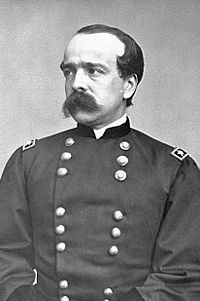 |
Butterfield, Daniel Daniel Butterfield Daniel Adams Butterfield was a New York businessman, a Union General in the American Civil War, and Assistant U.S. Treasurer in New York. He is credited with composing the bugle call Taps and was involved in the Black Friday gold scandal in the Grant administration... |
Colonel, USA (July 1, 1863) Major General, USV (November 29, 1862) |
Major General, USA (March 13, 1865) |
CMOH, Battle of Gaines' Mill Battle of Gaines' Mill The Battle of Gaines's Mill, sometimes known as the First Battle of Cold Harbor or the Battle of Chickahominy River, took place on June 27, 1862, in Hanover County, Virginia, as the third of the Seven Days Battles of the American Civil War... (June 27, 1862) |
C
| Image | Name | Substantive Rank | Brevet Rank | Cadwalader, George George Cadwalader George Cadwalader was a general in the United States Army during the Mexican-American War and American Civil War.-Biography:He was born and raised in Philadelphia, Pennsylvania, studied law, and was admitted to the bar... | Major General, USV (April 25, 1862) |
Resigned July 5, 1865 First commander-in-chief of MOLLUS (1865-1879) |
|
|---|---|---|---|---|---|---|---|
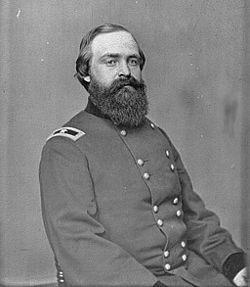 |
Caldwell, John Curtis John C. Caldwell John Curtis Caldwell was a teacher, a Union general in the American Civil War, and an American diplomat.-Early life:Caldwell was born in Lowell, Vermont... |
Brigadier General, USV (April 28, 1862) |
Major General, USV (August 19, 1865) |
U.S. minister to Uruguay United States Ambassador to Uruguay The following is a list of United States ambassadors, or other chiefs of mission, to Uruguay. The current title given by the United States State Department to this position is Ambassador Extraordinary and Minister Plenipotentiary.-See also:... and Paraguay United States Ambassador to Paraguay The following is a list of United States Ambassadors, or other chiefs of mission, to Paraguay. The title given by the United States State Department to this position is currently Ambassador Extraordinary and Minister Plenipotentiary.-See also:... (1874-1882) |
|||
| Callis, John Benton John Benton Callis John Benton Callis was a postbellum U.S. Representative from Alabama and an officer in the Union Army during the American Civil War.-Biography:... |
Lieutenant Colonel, USV, VRC (February 11, 1865) |
Brigadier General, USV (March 13, 1865) |
U.S. Congressman from Alabama Alabama Alabama is a state located in the southeastern region of the United States. It is bordered by Tennessee to the north, Georgia to the east, Florida and the Gulf of Mexico to the south, and Mississippi to the west. Alabama ranks 30th in total land area and ranks second in the size of its inland... (1878-1869) |
||||
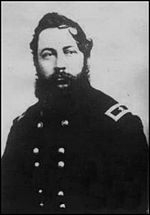 |
Cameron, Robert Alexander Robert Alexander Cameron Robert Alexander Cameron was an American soldier and newspaper publisher. He served as a Union general during the American Civil War. During the war he was made a brigadier general and after the war was appointed a brevet major general. After the war he was heavily involved in developing farms in... |
Brigadier General, USV (August 11, 1863) |
Major General, USV (March 13, 1865) |
||||
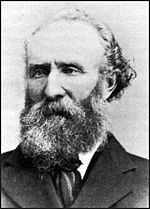 |
Campbell, Charles Thomas Charles Thomas Campbell Charles Thomas Campbell was an United States Army soldier, and a legislator, businessman, and town mayor... |
Brigadier General, USV (March 13, 1863) |
Original appointment as Brigadier General, USV (November 29, 1862) expired March 4, 1863 | ||||
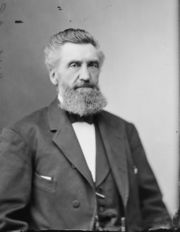 |
Campbell, Jacob Miller Jacob Miller Campbell Jacob Miller Campbell was a Republican member of the U.S. House of Representatives from Pennsylvania. He also served as an officer in the Union Army during the American Civil War.-Early life:... |
Colonel, USV (February 27, 1862) |
Brigadier General, USV (March 13, 1865) |
U.S. Congressman from Pennsylvania Pennsylvania The Commonwealth of Pennsylvania is a U.S. state that is located in the Northeastern and Mid-Atlantic regions of the United States. The state borders Delaware and Maryland to the south, West Virginia to the southwest, Ohio to the west, New York and Ontario, Canada, to the north, and New Jersey to... (1877-1879, 1881-1887) |
|||
| Campbell, John Allen John Allen Campbell John Allen Campbell was a politician and officer in the U.S. Army. During the Civil War, he advanced from lieutenant to brevet brigadier general. He was appointed the first Governor of Wyoming Territory in 1869 and again in 1873... |
Lieutenant Colonel, USV (January 31, 1865) |
Brigadier General, USV (March 13, 1865) |
Territorial Governor of Wyoming (1869-1875) | ||||
| Campbell, William Bowen William B. Campbell William Bowen Campbell was governor of Tennessee from 1851 to 1853.-Biography:Campbell was born in Sumner County, Tennessee, later leaving to study law in Virginia. He returned to Tennessee in 1829 in order to establish a law practice at Carthage, in Smith County... |
Brigadier General, USV (June 30, 1862) |
Resigned January 26, 1863 U.S. Congressman from Tennessee Tennessee Tennessee is a U.S. state located in the Southeastern United States. It has a population of 6,346,105, making it the nation's 17th-largest state by population, and covers , making it the 36th-largest by total land area... (1847-1853) Governor of Tennessee (1851-1853) |
|||||
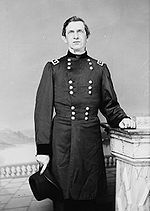 |
Canby, Edward Richard Sprigg Edward Canby Edward Richard Sprigg Canby was a career United States Army officer and a Union general in the American Civil War, Reconstruction era, and the Indian Wars... |
Colonel, USA (May 14, 1861) Major General, USV (May 7, 1864) |
Major General, USA (March 13, 1865) |
USMA, 1839 Brother-in-law of John Parker Hawkins John Parker Hawkins John Parker Hawkins was a Union Army brigadier general of volunteers during the American Civil War. In 1866, after being mustered out of the Union Army volunteer force, he was appointed to the brevet grade of major general of volunteers to rank from March 13, 1865.-Biography:Hawkins was born in... |
|||
| Capehard, Henry Henry Capehart -External links:... |
Colonel, USV (February 22, 1864) |
Major General, USV (June 17, 1865) |
CMOH for saving the life of Private Watson Karr while fording the Greenbrier River Greenbrier River The Greenbrier River is a tributary of the New River, long, in southeastern West Virginia, USA. Via the New, Kanawha and Ohio Rivers, it is part of the watershed of the Mississippi River, draining an area of... (May 22, 1864) |
||||
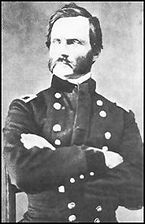 |
Carleton, James Henry James Henry Carleton James Henry Carleton was an officer in the Union army during the American Civil War. Carleton is most well known as an Indian fighter in the southwestern United States.-Biography:... |
Brigadier General, USV (April 28, 1862) |
Major General, USA Major General, USV (March 13, 1865) |
||||
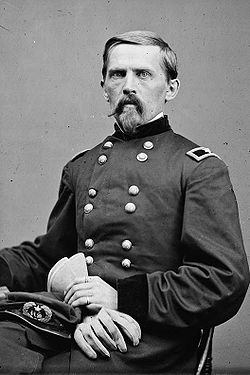 |
Carlin, William Passmore | Major, USA (February 8, 1864) Brigadier General, USV (November 29, 1862) |
Major General, USA (March 13, 1865 Major General, USV (March 19, 1865) |
USMA, 1850 | |||
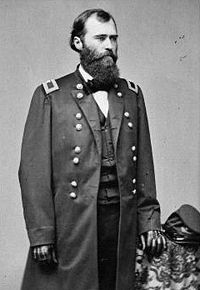 |
Carr, Eugene Asa Eugene Asa Carr Eugene Asa Carr was a soldier in the United States Army and a general in the Union Army during the American Civil War.-Early life:... |
Major, USA (July 17, 1862) Brigadier General, USV (March 7, 1862) |
Major General, USA Major General, USV |
USMA, 1850 CMOH, Battle of Pea Ridge Battle of Pea Ridge The Battle of Pea Ridge was a land battle of the American Civil War, fought on March 6–8, 1862, at Pea Ridge in northwest Arkansas, near Garfield. In the battle, Union forces led by Brig. Gen. Samuel R. Curtis defeated Confederate troops under Maj. Gen. Earl Van Dorn. The outcome of the... (March 7, 1862) |
|||
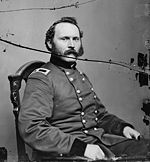 |
Carr, Joseph Bradford Joseph Bradford Carr Joseph Bradford Carr was a general in the Union Army during the American Civil War.-Early life:Carr was born in Albany, New York, the son of Irish immigrants, and worked as a tobacconist... |
Brigadier General, USV (March 30, 1863) |
Major General, USV (March 13, 1865) |
Original appointment as Brigadier General, USV (September 7, 1862) expired March 4, 1863; second appointment (March 30, 1863) expired March 30, 1864; finally confirmed June 30, 1864 | |||
 |
Carrington, Henry Beebee Henry B. Carrington Henry Beebee Carrington was a lawyer, professor, prolific author, and an officer in the United States Army during the American Civil War and in the Old West during Red Cloud's War... |
Colonel, USA (May 14, 1861) Brigadier General, USV (November 29, 1862) |
|||||
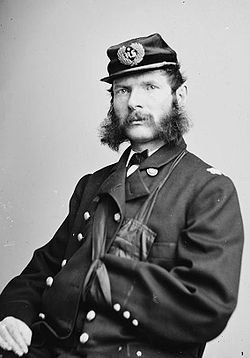 |
Carroll, Samuel Sprigg Samuel S. Carroll Samuel Spriggs "Red" Carroll was a career officer in the United States Army who rose to the rank of brigadier general during the American Civil War... |
Captain, USA (November 1, 1861) Brigadier General, USV (May 12, 1864) |
Major General, USA (March 13, 1865) Major General, USV (March 13, 1865) |
USMA, 1856 | |||
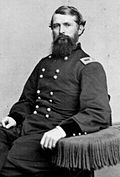 |
Carter, Samuel Powhatan | Commander Commander (United States) In the United States, commander is a military rank that is also sometimes used as a military title, depending on the branch of service. It is also used as a rank or title in some organizations outside of the military, particularly in police and law enforcement.-Naval rank:In the United States... , USN (June 25, 1865) Brigadier General, USV (May 1, 1862) |
Major General, USV (March 13, 1865) |
U.S. Naval Academy United States Naval Academy The United States Naval Academy is a four-year coeducational federal service academy located in Annapolis, Maryland, United States... , 1846 Only officer ever to hold flag rank in both the U.S. Army and U.S. Navy (appointed Rear Admiral Rear admiral (United States) Rear admiral is a naval commissioned officer rank above that of a commodore and captain, and below that of a vice admiral. The uniformed services of the United States are unique in having two grades of rear admirals.- Rear admiral :... May 16, 1882) |
|||
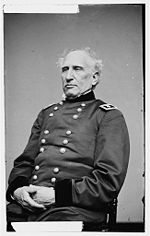 |
Casey, Silas Silas Casey Silas Casey was a career United States Army officer who rose to the rank of Major General during the American Civil War.-Early life and military career:... |
Colonel, USA (October 9, 1861) Major General, USV (May 31, 1862) |
Major General, USA (March 13, 1865) |
USMA, 1826 | |||
| Catlin, Isaac Swartwood Isaac S. Catlin Isaac Swartwood Catlin was an American lawyer and a decorated officer in the American Civil War. A native of Owego, New York, Catlin studied law in New York City before returning to Owego to begin his career. He joined the Union Army in the first days of the Civil War and rose to become commander... |
Colonel, USV (July 29, 1864) |
Major General, USV (March 13, 1865) |
CMOH, Battle of the Crater Battle of the Crater The Battle of the Crater was a battle of the American Civil War, part of the Siege of Petersburg. It took place on July 30, 1864, between the Confederate Army of Northern Virginia, commanded by General Robert E. Lee and the Union Army of the Potomac, commanded by Major General George G. Meade The... (July 30, 1864) Brother-in-law of Benjamin Franklin Tracy Benjamin F. Tracy Benjamin Franklin Tracy was a United States political figure who served as Secretary of the Navy from 1889 through 1893, during the administration of U.S. President Benjamin Harrison.-Biography:... |
||||
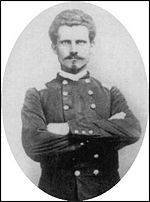 |
Catterson, Robert Francis Robert Francis Catterson Robert Francis Catterson was an American physician and soldier. He served in the Union Army during the American Civil War, enlisting at its beginning and rising to a general officer near the end... |
Brigadier General, USV (May 31,1865) |
|||||
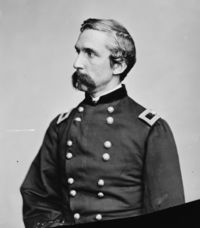 |
Chamberlain, Joshua Lawrence Joshua Chamberlain Joshua Lawrence Chamberlain , born as Lawrence Joshua Chamberlain, was an American college professor from the State of Maine, who volunteered during the American Civil War to join the Union Army... (b. Lawrence Joshua Chamberlain) |
Brigadier General, USV (June 19, 1864) |
Major General, USV (March 29, 1865) |
CMOH, Battle of Gettysburg Battle of Gettysburg The Battle of Gettysburg , was fought July 1–3, 1863, in and around the town of Gettysburg, Pennsylvania. The battle with the largest number of casualties in the American Civil War, it is often described as the war's turning point. Union Maj. Gen. George Gordon Meade's Army of the Potomac... (July 2, 1863) Detailed to receive surrender of the Army of Northern Virginia Army of Northern Virginia The Army of Northern Virginia was the primary military force of the Confederate States of America in the Eastern Theater of the American Civil War, as well as the primary command structure of the Department of Northern Virginia. It was most often arrayed against the Union Army of the Potomac... (April 12, 1865) Governor of Maine Governor of Maine The governor of Maine is the chief executive of the State of Maine. Before Maine was admitted to the Union in 1820, Maine was part of Massachusetts and the governor of Massachusetts was chief executive.... (1866-1870) One of only two general officers ever promoted on the field by General Grant |
|||
| Chambers, Alexander Alexander Chambers Alexander Chambers was a US Army officer, who became a general during the American Civil War.Chambers was born in Cattaraugus, New York. He graduated from West Point with the class of 1853 , and was commissioned a second lieutenant... |
Captain, USA (May 14, 1861) Brigadier General, USV (August 11, 1863) |
Brigadier General, USA (March 13, 1865) |
USMA, 1853 Volunteer appointment cancelled by the Senate April 6, 1864, ostensibly because Chambers was not a legal resident of Iowa Iowa Iowa is a state located in the Midwestern United States, an area often referred to as the "American Heartland". It derives its name from the Ioway people, one of the many American Indian tribes that occupied the state at the time of European exploration. Iowa was a part of the French colony of New... |
||||
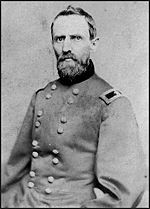 |
Champlin, Stephen Gardner Stephen Gardner Champlin Stephen Gardner Champlin was an American physician, lawyer, soldier, and judge. He served in the Union Army during the American Civil War, rising to the rank of brigadier general before succumbing to wounds he received in combat.-Early life:Champlin was born in Kingston, New York, a son of Jeffrey... |
Brigadier General, USV (November 29, 1862) |
Resigned November 8, 1863 DOW, Battle of Seven Pines Battle of Seven Pines The Battle of Seven Pines, also known as the Battle of Fair Oaks or Fair Oaks Station, took place on May 31 and June 1, 1862, in Henrico County, Virginia, as part of the Peninsula Campaign of the American Civil War. It was the culmination of an offensive up the Virginia Peninsula by Union Maj. Gen.... (w. May 31, 1862, d. January 24, 1864) |
||||
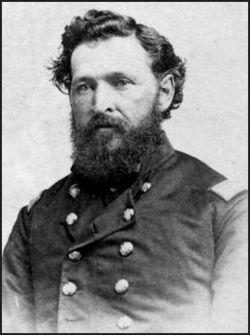 |
Chapin, Edward Payson Edward Payson Chapin Edward Payson Chapin was an American lawyer and soldier. He served in the Union Army during the American Civil War, and was wounded twice, both times occurring on May 27. Chapin was killed in action fighting in Louisiana, and after his death was promoted to brigadier general.-Early life and... |
Brigadier General, USV (May 27, 1863) |
KIA, Siege of Port Hudson Siege of Port Hudson The Siege of Port Hudson occurred from May 22 to July 9, 1863, when Union Army troops assaulted and then surrounded the Mississippi River town of Port Hudson, Louisiana, during the American Civil War.... (May 27, 1863); promoted posthumously |
||||
| Chaplin, Daniel Daniel Chaplin Col. Daniel Chaplin was a Union officer in the American Civil War who died in battle and was posthumously made a Major General. Under Chaplin's command, the ill-fated charge of the 1st Maine Heavy Artillery Regiment against Confederate breastworks during Siege of Petersburg resulted on the... |
Colonel, USV (August 21, 1862) |
Brigadier General, USV (August 17, 1864) |
DOW, Second Battle of Deep Bottom (w. August 16, 1864, d. August 20, 1864) | ||||
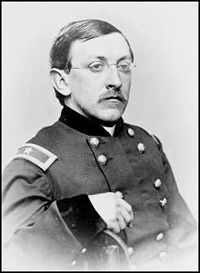 |
Chapman, George Henry George Henry Chapman George Henry Chapman was an American sailor, newspaper editor, lawyer, and soldier. He served in the United States Navy during the Mexican-American War and as a Union Army general during the American Civil War. Later in life he was a judge and a state legislator.-Early life and career:Chapman was... |
Brigadier General, USV (July 21, 1864) |
Major General, USV (March 13, 1865) |
||||
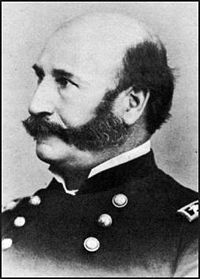 |
Chetlain, Augustus Louis Augustus Louis Chetlain Augustus Louis Chetlain was an United States Army soldier - the first man in Illinois to volunteer at the outbreak of the American Civil War. He served as a Union Army general .-Early life and career:... |
Brigadier General, USV (December 18, 1863) |
Major General, USV (June 18, 1865) |
||||
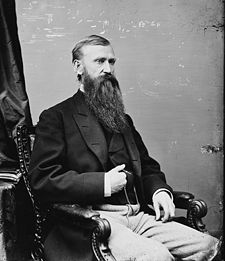 |
Chipman, Norton Parker Norton P. Chipman Norton Parker Chipman was an American Civil War army officer, military prosecutor, politician, author, and judge.-Biography:... |
Colonel, USV (April 17, 1862) |
Brigadier General, USV (March 13, 1865) |
Congressional Delegate for the District of Columbia (1871-1875) | |||
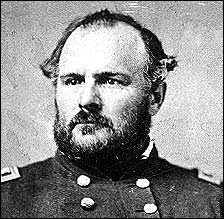 |
Chivington, John Milton John Chivington John Milton Chivington was a colonel in the United States Army who served in the American Indian Wars during the Colorado War and the New Mexico Campaigns of the American Civil War... |
Colonel, USV (April, 1862) Brigadier General, USV (November 29, 1862) |
Appointment as Brigadier General, USV withdrawn February 12, 1863 | ||||
| Churchill, Sylvester Sylvester Churchill Sylvester Churchill was an American journalist and Regular Army officer.-Early life:Churchill was born in Woodstock, Vermont, the son of Joseph and Sarah Churchill... |
Colonel, USA (June 25, 1841) |
Brigadier General, USA (September 23, 1847) |
Inspector General Inspector General An Inspector General is an investigative official in a civil or military organization. The plural of the term is Inspectors General.-Bangladesh:... , U.S. Army (1841-1861) Retired September 25, 1861 |
||||
| Chrysler, Morgan Henry Morgan Henry Chrysler Morgan Henry Chrysler was an American soldier who served as a Union Army general during the American Civil War.-Early life:... |
Brigadier General, USV (November 11, 1865) |
Major General, USV (March 13, 1865) |
|||||
| Clark, William Thomas William Thomas Clark William Thomas Clark was an American soldier and politician, serving as a general in the Union army during the American Civil War and as a postbellum U.S. Congressman.-Birth and early years:... |
Brigadier General, USV (May 31, 1865) |
Major General, USV (November 24, 1865) |
U.S. Congressman from Texas Texas Texas is the second largest U.S. state by both area and population, and the largest state by area in the contiguous United States.The name, based on the Caddo word "Tejas" meaning "friends" or "allies", was applied by the Spanish to the Caddo themselves and to the region of their settlement in... (1869-1872) |
||||
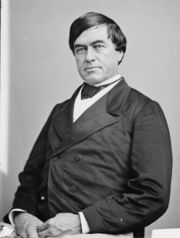 |
Clay, Cassius Marcellus | Major General, USV (April 11, 1862) |
Rejected appointment and resigned, March 11, 1863 U.S. minister to Russia (1863-1869) |
||||
| Clay, Cecil Cecil Clay Cecil Clay was captain of Company K in the 58th Pennsylvania Volunteer Infantry Regiment in the Union Army during the American Civil War.-Early life:... |
Lieutenant Colonel, USV (November 19, 1864) |
Brigadier General, USV (March 13, 1865) |
CMOH, Battle of Chaffin's Farm Battle of Chaffin's Farm The Battle of Chaffin's Farm and New Market Heights, also known as Laurel Hill and combats at Forts Harrison, Johnson, and Gilmer, was fought September 29–30, 1864, as part of the Siege of Petersburg in the American Civil War.-Background:... (September 29, 1864) |
||||
| Clayton, Powell Powell Clayton Powell Clayton was an engineer, a Union Army general in the American Civil War, the first Reconstruction Governor of the State of Arkansas, and Ambassador to Mexico during the administrations of William McKinley and Theodore Roosevelt.-Early life:Clayton was born in Bethel, Pennsylvania, to John... |
Brigadier General, USV (August 1, 1864) |
Governor of Arkansas (1868-1871) U.S. Senator from Arkansas Arkansas Arkansas is a state located in the southern region of the United States. Its name is an Algonquian name of the Quapaw Indians. Arkansas shares borders with six states , and its eastern border is largely defined by the Mississippi River... (1871-1877) U.S. minister to Mexico United States Ambassador to Mexico The United States has maintained diplomatic relations with Mexico since 1823, when Andrew Jackson was appointed Envoy Extraordinary and Minister Plenipotentiary to that country. Jackson declined the appointment, however, and Joel R. Poinsett became the first U.S. envoy to Mexico in 1825. The rank... (1897-1898); U.S. Ambassador to Mexico (1898-1905) |
|||||
| Clendenin, David Ramsay | Lieutenant Colonel, USV (December 5, 1862) |
Brigadier General, USV (July 11, 1865) |
Mustered out July 17, 1865 Commissioner, Lincoln assassination trial Abraham Lincoln assassination The assassination of United States President Abraham Lincoln took place on Good Friday, April 14, 1865, as the American Civil War was drawing to a close. The assassination occurred five days after the commanding General of the Army of Northern Virginia, Robert E. Lee, and his battered Army of... |
||||
.jpg) |
Cluseret, Gustave Paul Gustave Paul Cluseret Gustave Paul Cluseret was a French soldier and politician who served as a general in the Union Army during the American Civil War.-Biography:... |
Brigadier General, USV (October 14, 1862) |
Arrested on unspecified charges, January, 1863 Resigned March 2, 1863 Volunteer appointment never confirmed |
||||
| Cobb, Amasa Amasa Cobb Amasa Cobb was a Republican Wisconsin politician and an officer in the Union Army during the American Civil War.-Biography:... |
Colonel, USV (September 29, 1864) |
Brigadier General, USV (March 13, 1865) |
U.S. Congressman from Wisconsin Wisconsin Wisconsin is a U.S. state located in the north-central United States and is part of the Midwest. It is bordered by Minnesota to the west, Iowa to the southwest, Illinois to the south, Lake Michigan to the east, Michigan to the northeast, and Lake Superior to the north. Wisconsin's capital is... (1863-1871) |
||||
| Cobham, George Ashworth, Jr. George A. Cobham, Jr. George Ashworth Cobham, Jr. commanded a regiment in the American Civil War and rose to brigade command before being killed in battle.-Early life:... |
Colonel, USV (November 7, 1862) |
Brigadier General, USV (July 19, 1864) |
KIA, Battle of Peachtree Creek Battle of Peachtree Creek The Battle of Peachtree Creek was fought in Georgia on July 20, 1864, as part of the Atlanta Campaign in the American Civil War. It was the first major attack by Lt. Gen. John B. Hood since taking command of the Confederate Army of Tennessee. The attack was against Maj. Gen. William T. Sherman's... (July 20, 1864) |
||||
| Coburn, John John Coburn (politician) John Coburn was a United States Representative from Indiana and an officer in the Union Army during the American Civil War.-Early life and career:... |
Colonel, USV (September 16, 1861) |
Brigadier General, USV (March 13, 1865) |
U.S. Congressman from Indiana Indiana Indiana is a US state, admitted to the United States as the 19th on December 11, 1816. It is located in the Midwestern United States and Great Lakes Region. With 6,483,802 residents, the state is ranked 15th in population and 16th in population density. Indiana is ranked 38th in land area and is... (1867-1875) |
||||
| Cochrane, John John Cochrane (general) John Cochrane was an American lawyer, Union Army general and politician.-Life:He was the grandson of John Cochran, Surgeon General of the Continental Army.... |
Brigadier General, USV (July 17, 1862) |
Resigned February 25, 1862 U.S. Congressman from New York New York New York is a state in the Northeastern region of the United States. It is the nation's third most populous state. New York is bordered by New Jersey and Pennsylvania to the south, and by Connecticut, Massachusetts and Vermont to the east... (1857-1861) |
|||||
| Cockerill, Joseph Randolph Joseph R. Cockerill Joseph Randolph Cockerill was a U.S. Representative from Ohio.Born in Loudoun County, Virginia, Cockerill moved to Scott Township, Ohio, in 1837 and settled in Youngstown.He attended the public schools.He taught school.... |
Colonel, USV (December 20, 1861) |
Brigadier General, USV (March 13, 1865) |
U.S. Congressman from Ohio Ohio Ohio is a Midwestern state in the United States. The 34th largest state by area in the U.S.,it is the 7th‑most populous with over 11.5 million residents, containing several major American cities and seven metropolitan areas with populations of 500,000 or more.The state's capital is Columbus... (1857-1859) |
||||
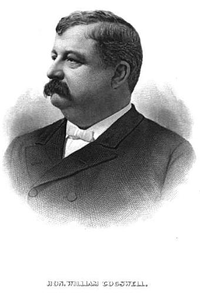 |
Cogswell, William William Cogswell William Cogswell was a U.S. Representative from Massachusetts and a colonel in the Union Army during the American Civil War who was awarded the honorary grade of brevet brigadier general, U.S. Volunteers.-Biography:... |
Colonel, USV (June 26, 1863) |
Brigadier General, USV (December 15, 1864) |
U.S. Congressman from Massachusetts Massachusetts The Commonwealth of Massachusetts is a state in the New England region of the northeastern United States of America. It is bordered by Rhode Island and Connecticut to the south, New York to the west, and Vermont and New Hampshire to the north; at its east lies the Atlantic Ocean. As of the 2010... (1887-1895) |
|||
| Collis, Charles Henry Tucker | Colonel, USV (December 1, 1862) |
Major General, USV (March 13, 1865) |
CMOH, Battle of Fredericksburg Battle of Fredericksburg The Battle of Fredericksburg was fought December 11–15, 1862, in and around Fredericksburg, Virginia, between General Robert E. Lee's Confederate Army of Northern Virginia and the Union Army of the Potomac, commanded by Maj. Gen. Ambrose E. Burnside... (December 13, 1862) Mustered out May 29, 1865 |
||||
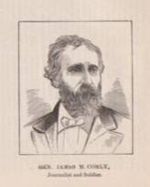 |
Comly, James Munroe Stuart James M. Comly James Munroe Stuart Comly was a brigadier general in the Union Army during the American Civil War, as well as a journalist, attorney, newspaper editor and owner, historian and diplomat. He was instrumental in advancing the political career of his friend Rutherford B... |
Colonel, USV (January 11, 1865) |
Brigadier General, USV (March 13, 1865) |
U.S. minister to Hawai'i United States Minister to Hawaii The Minister to Hawaii was an office of the United States Department of State to the Kingdom of Hawaii during the period of 1810 to 1898. Appointed by the President of the United States with the consent of Congress, the Minister to Hawaii was equivalent in rank to the present-day ambassador of the... (1877-1882) |
|||
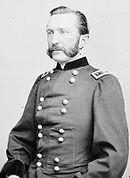 |
Connor, Patrick Edward Patrick Edward Connor Patrick Edward Connor was a Union General during the American Civil War. He was most famous for his campaigns against Native Americans in the American Old West.-Early life and career:... |
Brigadier General, USV (March 30, 1863) |
Major General, USV (March 13, 1865) |
||||
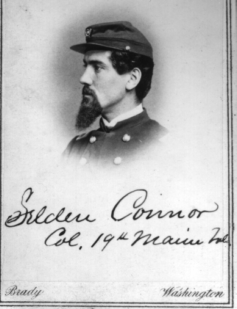 |
Connor, Selden | Brigadier General, USV (June 11, 1864) |
Governor of Maine Governor of Maine The governor of Maine is the chief executive of the State of Maine. Before Maine was admitted to the Union in 1820, Maine was part of Massachusetts and the governor of Massachusetts was chief executive.... (1876-1879) |
||||
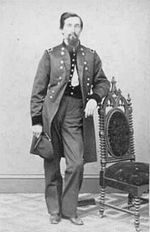 |
Cook, John | Brigadier General, USV (March 21, 1862) |
Major General, USV (August 24, 1865) |
||||
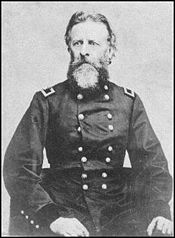 |
Cooke, Philip St. George Philip St. George Cooke Philip St. George Cooke was a career United States Army cavalry officer who served as a Union General in the American Civil War. He is noted for his authorship of an Army cavalry manual, and is sometimes called the "Father of the U.S... |
Brigadier General, USA (November 12, 1861) |
Major General, USA (March 13, 1865) |
USMA, 1827 Father of General John Rogers Cooke John Rogers Cooke John Rogers Cooke was a Confederate general during the American Civil War. He was the son of Union general Philip St. George Cooke and the brother-in-law of Confederate cavalry leader Jeb Stuart.-Biography:... , CSA Father-in-law of General James Ewell Brown Stuart J.E.B. Stuart James Ewell Brown "Jeb" Stuart was a U.S. Army officer from Virginia and a Confederate States Army general during the American Civil War. He was known to his friends as "Jeb", from the initials of his given names. Stuart was a cavalry commander known for his mastery of reconnaissance and the use... , CSA |
|||
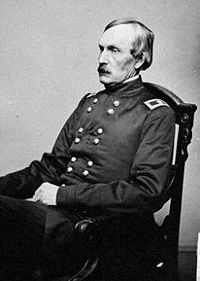 |
Cooper, James James Cooper (Pennsylvania) James Cooper was an American lawyer, soldier, and politician, who served in the United States Congress.Cooper lived much of his life in Gettysburg, Pennsylvania. He served in the Pennsylvania House of Representatives and was its Speaker for a year. He represented Pennsylvania in both the United... |
Brigadier General, USV (May 17, 1861) |
Died March 28, 1863 U.S. Congressman from Pennsylvania Pennsylvania The Commonwealth of Pennsylvania is a U.S. state that is located in the Northeastern and Mid-Atlantic regions of the United States. The state borders Delaware and Maryland to the south, West Virginia to the southwest, Ohio to the west, New York and Ontario, Canada, to the north, and New Jersey to... (1849-1843) U.S. Senator from Pennsylvania (1849-1855) |
||||
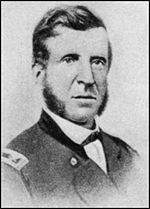 |
Cooper, Joseph Alexander Joseph Alexander Cooper Joseph Alexander Cooper was an American farmer, soldier, and civil servant. He briefly served in the United States Army during the Mexican–American War, and later he was a Union Army general during the American Civil War, fighting most notably during the 1864 Battle of Nashville.-Early life:Cooper... |
Brigadier General, USV (July 30, 1864) |
Major General, USV (March 13, 1865) |
||||
| Copeland, Joseph Tarr Joseph T. Copeland Joseph Tarr Copeland was a Justice of the Michigan Supreme Court from 1852 until 1857, as well as a general in the Union Army during the American Civil War.-Biography:... |
Brigadier General, USV (November 29, 1862) |
Resigned November 8, 1865 | |||||
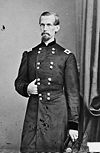 |
Corcoran, Michael Michael Corcoran Michael Corcoran was an Irish American general in the Union Army during the American Civil War and a close confidant of President Abraham Lincoln. As its colonel, he led the 69th New York regiment to Washington, D.C. and was one of the first to serve in the defense of Washington by building Fort... |
Brigadier General, USV (July 21, 1861) |
Died in riding accident December 22, 1863 | ||||
 |
Corse, John Murray John M. Corse John Murray Corse was an American politician and soldier who served as a general in the Union Army in the American Civil War.-Early life and career:... |
Brigadier General, USV (August 11, 1863) |
Major General, USV (October 5, 1864) |
USMA (class of 1857), withdrew 1855 | |||
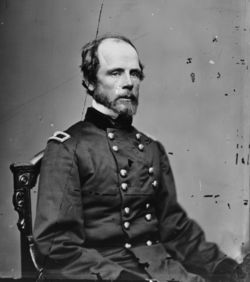 |
Couch, Darius Nash | Major General, USV (July 4, 1862) |
USMA, 1846 Resigned May 26, 1865 |
||||
| Coughlin, John | Lieutenant Colonel, USV (September 5, 1862) |
Brigadier General, USV (April 9, 1865) |
CMOH, Battle of Swift's Creek Battle of Swift Creek The Battle of Swift Creek was fought on May 9, 1864, between Union and Confederate forces during the American Civil War. Union forces were only partially successful: they inflicted damage on the local railroad, but further advance was halted.-Description:... (May 9, 1864) |
||||
| Cowdin, Robert Robert Cowdin Robert Cowdin was a businessman, a field officer in the Union Army during the American Civil War and a local politician in Massachusetts. Cowdin was colonel of the 1st Massachusetts Infantry and served in several major battles early in the war... |
Brigadier General, USV (September 26, 1862) |
Appointment expired March 4, 1863 Relieved and mustered out March 30, 1863 |
|||||
 |
Cox, Jacob Dolson Jacob Dolson Cox Jacob Dolson Cox, was a lawyer, a Union Army general during the American Civil War, and later a Republican politician from Ohio. He served as the 28th Governor of Ohio and as United States Secretary of the Interior.... |
Major General (December 7, 1864) |
Original appointment as Major General, USV (October 6, 1862) expired March 4, 1863 Resigned June 27, 1864 Governor of Ohio (1866-1867) United States Secretary of the Interior United States Secretary of the Interior The United States Secretary of the Interior is the head of the United States Department of the Interior.The US Department of the Interior should not be confused with the concept of Ministries of the Interior as used in other countries... (1869-1870) U.S. Congressman from Ohio Ohio Ohio is a Midwestern state in the United States. The 34th largest state by area in the U.S.,it is the 7th‑most populous with over 11.5 million residents, containing several major American cities and seven metropolitan areas with populations of 500,000 or more.The state's capital is Columbus... (1877-1879) |
||||
.jpg) |
Craig, James James Craig (Missouri) James Craig was an American lawyer and politician from Saint Joseph, Missouri. He represented Missouri in the U.S. House from 1857 until 1861. He also served as an army Captain in the Mexican-American War.... |
Brigadier General, USV (March 21, 1862) |
Resigned May 5, 1863 U.S. Congressman from Missouri Missouri Missouri is a US state located in the Midwestern United States, bordered by Iowa, Illinois, Kentucky, Tennessee, Arkansas, Oklahoma, Kansas and Nebraska. With a 2010 population of 5,988,927, Missouri is the 18th most populous state in the nation and the fifth most populous in the Midwest. It... (1857-1861) |
||||
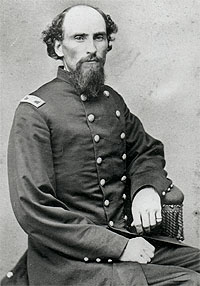 |
Crawford, Samuel Johnson | Colonel, USV (November 1, 1863) |
Brigadier General, USV (March 13, 1865) |
Resigned November 7, 1864 Governor of Kansas Governor of Kansas The Governor of the State of Kansas is the head of state for the State of Kansas, United States. Under the Kansas Constitution, the Governor is also the head of government, serving as the chief executive of the Kansas executive branch, of the government of Kansas. The Governor is the... (1865-1868) |
|||
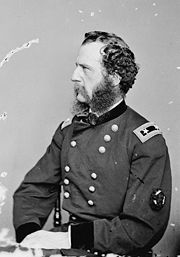 |
Crawford, Samuel Wylie Samuel W. Crawford Samuel Wylie Crawford was a United States Army surgeon and a Union general in the American Civil War.-Early life:... |
Lieutenant Colonel, USA (February 17, 1864) Brigadier General, USV (April 25, 1862) |
Major General, USA (March 13, 1865) Major General, USV (August 1, 1864) |
||||
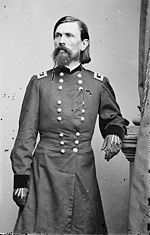 |
Crittenden, Thomas Leonidas Thomas Leonidas Crittenden Thomas Leonidas Crittenden was a lawyer, politician, and Union general during the American Civil War.-Early life:... |
Major General, USV (July 17, 1862) |
Resigned December 13, 1864 Son of Senator John Jordan Crittenden John J. Crittenden John Jordan Crittenden was a politician from the U.S. state of Kentucky. He represented the state in both the U.S. House of Representatives and the U.S. Senate and twice served as United States Attorney General in the administrations of William Henry Harrison and Millard Fillmore... Brother of General George Bibb Crittenden George B. Crittenden George Bibb Crittenden was a career United States Army officer who served in the Black Hawk War, the Army of the Republic of Texas, the Mexican-American War, and was a general in the Confederate States Army in the American Civil War.-Early life:Crittenden was born in Russellville, Kentucky, his... , CSA Cousin of Thomas Turpin Crittenden Thomas Turpin Crittenden Thomas Turpin Crittenden was a Union general in the American Civil War.-Birth and early years:Crittenden was born in Huntsville, Alabama, but his family moved to Texas shortly thereafter. He was a nephew of Senator John J. Crittenden of Kentucky, and a first cousin of Confederate general George B.... |
||||
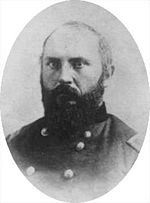 |
Crittenden, Thomas Turpin Thomas Turpin Crittenden Thomas Turpin Crittenden was a Union general in the American Civil War.-Birth and early years:Crittenden was born in Huntsville, Alabama, but his family moved to Texas shortly thereafter. He was a nephew of Senator John J. Crittenden of Kentucky, and a first cousin of Confederate general George B.... |
Brigadier General, USV (April 28, 1862) |
Resigned May 5, 1863 Nephew of Senator John Jordan Crittenden John J. Crittenden John Jordan Crittenden was a politician from the U.S. state of Kentucky. He represented the state in both the U.S. House of Representatives and the U.S. Senate and twice served as United States Attorney General in the administrations of William Henry Harrison and Millard Fillmore... Cousin of Thomas Leonidas Crittenden Thomas Leonidas Crittenden Thomas Leonidas Crittenden was a lawyer, politician, and Union general during the American Civil War.-Early life:... and General George Bibb Crittenden George B. Crittenden George Bibb Crittenden was a career United States Army officer who served in the Black Hawk War, the Army of the Republic of Texas, the Mexican-American War, and was a general in the Confederate States Army in the American Civil War.-Early life:Crittenden was born in Russellville, Kentucky, his... , CSA |
||||
| Crocker, Marcellus Monroe Marcellus M. Crocker Marcellus Monroe Crocker was a general in the Union Army during the American Civil War most noted for his service in the Western Theater.-Biography:... |
Brigadier General, USV (November 29, 1862) |
USMA (class of 1851), withdrew 1849 Died of illness August 26, 1865 |
|||||
 |
Crook, George George Crook George R. Crook was a career United States Army officer, most noted for his distinguished service during the American Civil War and the Indian Wars.-Early life:... |
Captain, USA (May 14, 1861) Major General, USV (October 21, 1864) |
Major General, USA (March 13, 1865) |
USMA, 1852 | |||
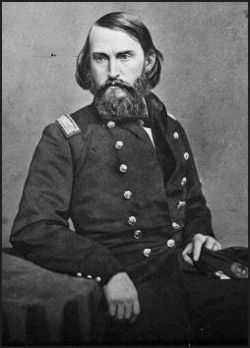 |
Croxton, John Thomas John T. Croxton John Thomas Croxton was an attorney, a general in the Union Army during the American Civil War, and a postbellum U.S. diplomat.-Early life and career:... |
Brigadier General, USV (July 30, 1864) |
Major General, USV (April 27, 1865) |
U.S. minister to Bolivia United States Ambassador to Bolivia The following is a list of United States Ambassadors, or other Chiefs of Mission, to Bolivia. The title given by the United States State Department to this position is currently Ambassador Extraordinary and Minister Plenipotentiary.-See also:... (1873-1874) |
|||
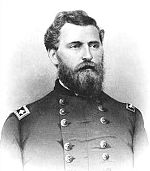 |
Cruft, Charles Charles Cruft (general) Charles Cruft was a teacher, lawyer, railroad executive, and a Union general during the American Civil War.-Biography:... |
Brigadier General, USV (July 16, 1862) |
Major General, USV (March 5, 1865) |
||||
| Cullum, George Washington George Washington Cullum George Washington Cullum was an American soldier, engineer and writer. He served as a general in the Union Army during the American Civil War, primarily serving in the Western Theater.-Birth and early years:... |
Lieutenant Colonel, USA (March 3, 1863) Brigadier General, USV (November 1, 1861) |
Major General, USA (March 13, 1865) |
USMA, 1833 Superintendent, USMA (1864-1866) Created the Cullum number system to identify USMA graduates Brother-in-law to Schuyler Hamilton Schuyler Hamilton Schuyler Hamilton was an American soldier, a grandson of Alexander Hamilton. He was born in New York, graduated at West Point in 1841, served with great gallantry in the Mexican War, and was brevetted first lieutenant in 1846 and captain in 1847. From the latter year until 1854 he was... (married widow of Henry Wager Halleck Henry Wager Halleck Henry Wager Halleck was a United States Army officer, scholar, and lawyer. A noted expert in military studies, he was known by a nickname that became derogatory, "Old Brains." He was an important participant in the admission of California as a state and became a successful lawyer and land developer... ) |
||||
| Cummings, Alexander Alexander Cummings (territorial governor) Alexander Cummings was the third Governor of the Territory of Colorado from 1865–1867, serving as a member of the Republican Party.Alexander Cummings was born in Williamsport, Pennsylvania on November 11, 1810... |
Colonel, USV (October 24,1863) |
Brigadier General, USV (April 19, 1865) |
Territorial Governor of Colorado Governor of Colorado The Governor of Colorado is the head of the executive branch of Colorado's government and the commander-in-chief of the state's military forces. The governor has a duty to enforce state laws, and the power to either approve or veto bills passed by the Colorado General Assembly, to convene the... (1865-1867) |
||||
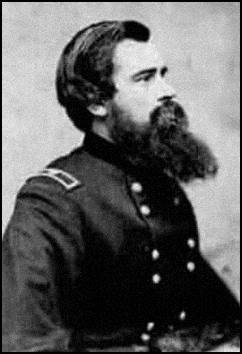 |
Curtis, Newton Martin Newton Martin Curtis Newton Martin Curtis was a Union brigadier general during the American Civil War and a member of the United States House of Representatives from New York.-Early life:... |
Brigadier General, USV (January 15, 1865) |
Major General, USV (March 13, 1865) |
CMOH, First Battle of Fort Fisher First Battle of Fort Fisher The First Battle of Fort Fisher, was a siege fought from December 23 to December 27, 1864, was a failed attempt by Union forces to capture the fort guarding Wilmington, North Carolina, the South's last major port on the Atlantic Ocean... (January 15, 1865) U.S. Congressman from New York New York New York is a state in the Northeastern region of the United States. It is the nation's third most populous state. New York is bordered by New Jersey and Pennsylvania to the south, and by Connecticut, Massachusetts and Vermont to the east... (1891-1897) |
|||
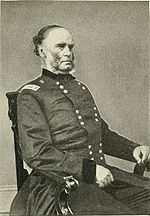 |
Curtis, Samuel Ryan Samuel Curtis Samuel Ryan Curtis was an American military officer, and one of the first Republicans elected to Congress. He was most famous for his role as a Union Army general the Trans-Mississippi Theater of the American Civil War.-Biography:Born near Champlain, New York, Curtis graduated from the United... |
Major General, USV (March 21, 1862) |
USMA, 1831 U.S. Congressman from Iowa Iowa Iowa is a state located in the Midwestern United States, an area often referred to as the "American Heartland". It derives its name from the Ioway people, one of the many American Indian tribes that occupied the state at the time of European exploration. Iowa was a part of the French colony of New... (1857-1861) |
||||
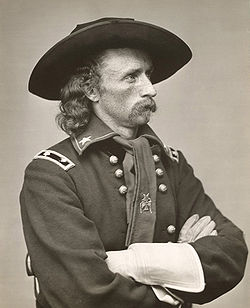 |
Custer, George Armstrong George Armstrong Custer George Armstrong Custer was a United States Army officer and cavalry commander in the American Civil War and the Indian Wars. Raised in Michigan and Ohio, Custer was admitted to West Point in 1858, where he graduated last in his class... |
Captain, USA (June 5, 1862) Major General, USV (April 15, 1865) |
Major General, USA (March 13, 1865) |
USMA, 1861 | |||
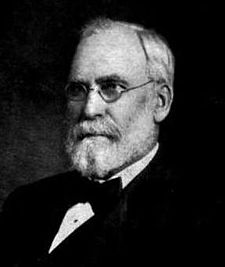 |
Cutcheon, Byron Mac Byron M. Cutcheon -See also:*List of American Civil War Medal of Honor recipients: A–F-References:... |
Colonel, USV (January 8, 1864) |
Brigadier General, USV (March 13, 1865) |
CMOH for actions at Horseshoe Bend, Kentucky Kentucky The Commonwealth of Kentucky is a state located in the East Central United States of America. As classified by the United States Census Bureau, Kentucky is a Southern state, more specifically in the East South Central region. Kentucky is one of four U.S. states constituted as a commonwealth... (May 10, 1863) Resigned March 6, 1865 U.S. Congressman from Michigan Michigan Michigan is a U.S. state located in the Great Lakes Region of the United States of America. The name Michigan is the French form of the Ojibwa word mishigamaa, meaning "large water" or "large lake".... (1883-1891) |
|||
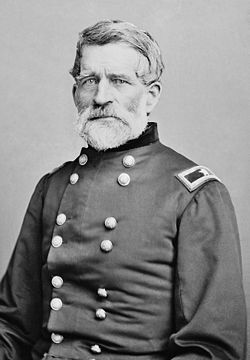 |
Cutler, Lysander Lysander Cutler Lysander Cutler was an American businessman, educator, politician, and a Union Army General during the American Civil War.-Early years:Cutler was born in Royalston, Massachusetts, the son of a farmer... |
Brigadier General, USV (November 29, 1862) |
Major General, USV (August 19, 1864) |
Resigned June 30, 1865 |
D
| Image | Name | Substantive Rank | Brevet Rank | Daggett, Aaron Simon Aaron S. Daggett - External links :*... | Lieutenant Colonel, USV (January 23, 1865) |
Brigadier General, USV (March 13, 1865) |
Last surviving brevet general (d. May 14, 1938) |
|---|---|---|---|---|---|---|---|
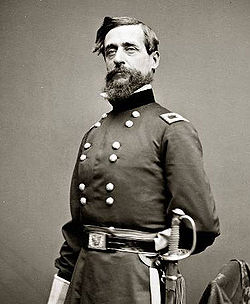 |
Dana, Napoleon Jackson Tecumseh | Major General, USV (November 29, 1862) |
USMA, 1842 Resigned May 27, 1865 |
||||
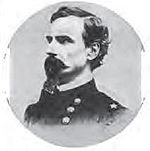 |
Davidson, John Wynn | Major, USA (November 14, 1861) Brigadier General, USV (February 3, 1862) |
Major General, USA (March 13, 1865) Major General, USV (March 13, 1865) |
USMA, 1845 | |||
| Davies, Henry Eugene Henry Eugene Davies Henry Eugene Davies was an American soldier, writer, public official and lawyer. He served in the Union Army as a brigadier general of volunteers in cavalry service during the American Civil War and was promoted to the grade of major general of volunteers at the end of the war... |
Major General, USV (May 4, 1865) |
Nephew of Thomas Alfred Davies Thomas Alfred Davies Thomas Alfred Davies was an American businessman, engineer, and soldier. He served as a general in the Union Army during the American Civil War. After the war Davies was a successful realtor as well as an author.... |
|||||
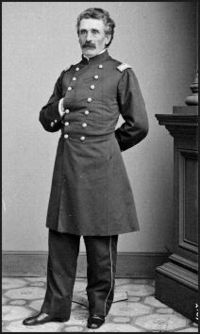 |
Davies, Thomas Alfred Thomas Alfred Davies Thomas Alfred Davies was an American businessman, engineer, and soldier. He served as a general in the Union Army during the American Civil War. After the war Davies was a successful realtor as well as an author.... |
Brigadier General, USV (March 7, 1862) |
Major General, USV (July 11, 1865) |
USMA, 1829 Uncle of Henry Eugene Davies Henry Eugene Davies Henry Eugene Davies was an American soldier, writer, public official and lawyer. He served in the Union Army as a brigadier general of volunteers in cavalry service during the American Civil War and was promoted to the grade of major general of volunteers at the end of the war... |
|||
 |
Davis, Edmund Jackson Edmund J. Davis Edmund Jackson Davis was an American lawyer, soldier, and politician. He was a Southern Unionist and served as a Union general in the American Civil War, besides serving one term as the 14th Governor of Texas.-Early years:... |
Brigadier General, USV (November 10, 1864) |
Governor of Texas Governor of Texas The governor of Texas is the head of the executive branch of Texas's government and the commander-in-chief of the state's military forces. The governor has the power to either approve or veto bills passed by the Texas Legislature, and to convene the legislature... (1870-1874) |
||||
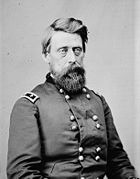 |
Davis, Jefferson Columbus Jefferson C. Davis Jefferson Columbus Davis was an officer in the United States Army who served in the Mexican-American War, the Civil War, and the Modoc War. He was the first commander of the Department of Alaska, from 1868 to 1870... |
Captain, USA (May 14, 1861) Brigadier General, USV (December 18, 1861) |
Major General, USA (March 13, 1865) Major General, USV (August 8, 1864) |
Shot and killed Major General William Nelson in a private altercation (September 29, 1862) | |||
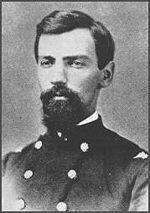 |
Dawes, Rufus Robinson Rufus R. Dawes Rufus R. Dawes was a military officer in the United States Army during the American Civil War. He used the middle initial "R" but had no middle name. He was noted for his service in the famed Iron Brigade, particularly during the Battle of Gettysburg... |
Colonel, USV (July 5, 1864) |
Brigadier General, USV (March 13, 1865) |
Resigned August 10, 1864 U.S. Congressman from Ohio Ohio Ohio is a Midwestern state in the United States. The 34th largest state by area in the U.S.,it is the 7th‑most populous with over 11.5 million residents, containing several major American cities and seven metropolitan areas with populations of 500,000 or more.The state's capital is Columbus... (1881-1883) Father of Vice President Vice President of the United States The Vice President of the United States is the holder of a public office created by the United States Constitution. The Vice President, together with the President of the United States, is indirectly elected by the people, through the Electoral College, to a four-year term... Charles Gates Dawes Charles G. Dawes Charles Gates Dawes was an American banker and politician who was the 30th Vice President of the United States . For his work on the Dawes Plan for World War I reparations he was a co-recipient of the Nobel Peace Prize. He served in the First World War, was U.S... |
|||
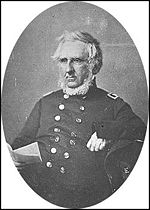 |
Delafield, Richard Richard Delafield Richard Delafield served as superintendent of the United States Military Academy, was Chief of Engineers, and was a major general in the Union Army during the American Civil War.-Biography:... |
Brigadier General, USA (April 22, 1864) |
Major General, USA (March 13, 1865) |
USMA, 1818 Superintendent, USMA (1838-1845, 1856-1861, 1861) Chief of Engineers Chief of Engineers The Chief of Engineers commands the US Army Corps of Engineers. As a staff officer at The Pentagon, the Chief advises the Army on engineering matters and serves as the Army's topographer and the proponent for real estate and other related engineering programs.... (1864-1866) |
|||
| Dennis, Elias Smith Elias Smith Dennis Elias Smith Dennis was a lawyer, politician, and soldier from the state of Illinois who served as a general in the Union Army during the American Civil War.-Early life and career:... |
Brigadier General, USV (November 29, 1862) |
Major General, USV (March 13, 1865) |
|||||
| Dent, Frederick Tracy Frederick Tracy Dent Frederick Tracy Dent was an American general, born in White Haven, St. Louis County, Missouri He graduated at West Point in 1843, was assigned as brevet second lieutenant to the 6th US Infantry, served in the Southern campaign during the Mexican War, and was brevetted first lieutenant and captain... |
Lieutenant Colonel, USA (1864) Brigadier General, USV (April 5, 1865) |
USMA, 1843 Brother-in-law of Ulysses S. Grant Ulysses S. Grant Ulysses S. Grant was the 18th President of the United States as well as military commander during the Civil War and post-war Reconstruction periods. Under Grant's command, the Union Army defeated the Confederate military and ended the Confederate States of America... |
|||||
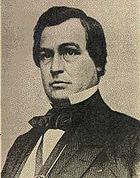 |
Denver, James W. James W. Denver James William Denver was an American politician, soldier, lawyer, and esteemed actor. He served in the California state government, as an officer in the United States Army in two wars, and as a Democratic member of the United States House of Representatives from California, as well as playing lead... |
Brigadier General, USV (August 14, 1861) |
Resigned March 5, 1863 U.S. Congressman from California California California is a state located on the West Coast of the United States. It is by far the most populous U.S. state, and the third-largest by land area... (1855-1857) Territorial Governor of Kansas Governor of Kansas The Governor of the State of Kansas is the head of state for the State of Kansas, United States. Under the Kansas Constitution, the Governor is also the head of government, serving as the chief executive of the Kansas executive branch, of the government of Kansas. The Governor is the... (1857-1858) Namesake of Denver, Colorado Denver, Colorado The City and County of Denver is the capital and the most populous city of the U.S. state of Colorado. Denver is a consolidated city-county, located in the South Platte River Valley on the western edge of the High Plains just east of the Front Range of the Rocky Mountains... |
||||
| De Russy, Gustavus Adolphus Gustavus De Russy Gustavus Adolphus De Russy was a US Army officer, who became a general during the American Civil War.De Russy was born in Brooklyn to French-American army officer René Edward De Russy and Helen Augusta Maxwell. He was also brother-in-law to Union general Henry Jackson Hunt... |
Captain, USA (August 17, 1857) Brigadier General, USV (May 23, 1863) |
Brigadier General, USA (March 13, 1865) |
USMA (class of 1839), resigned in 1838 Son of René Edward De Russy René Edward De Russy René Edward De Russy was an engineer, military educator, and career United States Army officer who was responsible for erecting many Eastern United States coastal fortifications... Brother-in-law of Henry Jackson Hunt Henry Jackson Hunt Henry Jackson Hunt was Chief of Artillery in the Army of the Potomac during the American Civil War. Considered by his contemporaries the greatest artillery tactician and strategist of the war, he was a master of the science of gunnery and rewrote the manual on the organization and use of artillery... and Lewis Cass Hunt |
||||
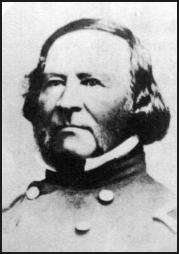 |
De Russy, René Edward René Edward De Russy René Edward De Russy was an engineer, military educator, and career United States Army officer who was responsible for erecting many Eastern United States coastal fortifications... |
Colonel, USA (March 3, 1863) |
Brigadier General, USA (March 13, 1865) |
USMA, 1812 Superintendent, USMA (1833-1838) Father of Gustavus Adolphus De Russy Father-in-law of Henry Jackson Hunt Henry Jackson Hunt Henry Jackson Hunt was Chief of Artillery in the Army of the Potomac during the American Civil War. Considered by his contemporaries the greatest artillery tactician and strategist of the war, he was a master of the science of gunnery and rewrote the manual on the organization and use of artillery... and Lewis Cass Hunt |
|||
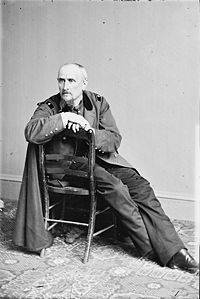 |
De Trobriand, Philippe Régis Dénis de Keredern Régis de Trobriand Philippe Régis Denis de Keredern de Trobriand was a French aristocrat, lawyer, poet, and novelist who emigrated at a young age to the United States... |
Brigadier General, USV (January 5, 1864) |
Major General, USV (April 9, 1865) |
||||
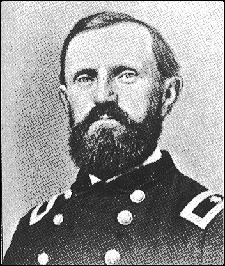 |
Deitzler, George Washington | Brigadier General, USV (November 29, 1862) |
Resigned August 27, 1863 | ||||
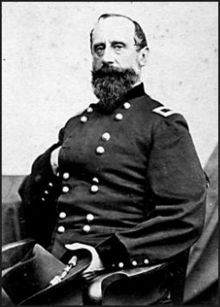 |
Devens, Charles Jr. Charles Devens Charles Devens was an American lawyer, jurist and statesman. He also served as a general in the Union Army during the American Civil War.-Early life and career:... |
Brigadier General, USV (April 15, 1862) |
Major General, USV (April 3, 1865) |
Commander-in-chief, GAR (1873-1875) Attorney General of the United States (1877-1881) |
|||
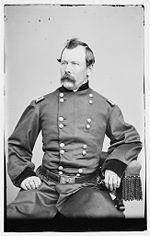 |
Devin, Thomas Casimer Thomas Devin Thomas Casimer Devin was an United States Army officer and general. He commanded Union cavalry during the American Civil War and during the Indian Wars.-Early life:... |
Brigadier General, USV (October 19, 1864) |
Major General, USV (March 13, 1865) |
||||
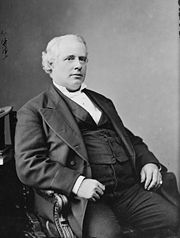 |
Deweese, John Thomas John T. Deweese John Thomas Deweese was a Congressional Representative from North Carolina.-Biography:Born in Van Buren, Arkansas, June 4, 1835; educated at home; studied law; was admitted to the bar in 1856 and commenced practice in Henderson, Kentucky; resident of Denver, Colorado, for some years; moved to Pike... |
Lieutenant Colonel, USV | Brigadier General, USV (March 13, 1865) |
U.S. Congressman from Indiana Indiana Indiana is a US state, admitted to the United States as the 19th on December 11, 1816. It is located in the Midwestern United States and Great Lakes Region. With 6,483,802 residents, the state is ranked 15th in population and 16th in population density. Indiana is ranked 38th in land area and is... (1868-1870) |
|||
| Dewey, Joel Allen Joel Dewey Joel Allen Dewey was a brigadier general in the Union Army during the American Civil War, and a lawyer.-Biography:... |
Brigadier General, USV (November 20,1865) |
Last Civil War general appointed | |||||
| Diven, Alexander Samuel Alexander S. Diven Alexander Samuel Diven was a U.S. Representative from New York and then an officer in the Union Army during the American Civil War.-Biography:... |
Colonel, USV (October 21, 1862) |
Brigadier General, USV (August 30, 1864) |
Resigned May 11, 1863 U.S. Congressman from New York New York New York is a state in the Northeastern region of the United States. It is the nation's third most populous state. New York is bordered by New Jersey and Pennsylvania to the south, and by Connecticut, Massachusetts and Vermont to the east... (1861-1863) |
||||
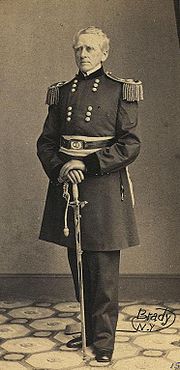 |
Dix, John Adams John Adams Dix John Adams Dix was an American politician from New York. He served as Secretary of the Treasury, U.S. Senator, and the 24th Governor of New York. He was also a Union major general during the Civil War.-Early life and career:... |
Major General, USV (May 16, 1861) |
Resigned November 30, 1865 U.S. Senator from New York New York New York is a state in the Northeastern region of the United States. It is the nation's third most populous state. New York is bordered by New Jersey and Pennsylvania to the south, and by Connecticut, Massachusetts and Vermont to the east... (1845-1849) Secretary of the Treasury United States Secretary of the Treasury The Secretary of the Treasury of the United States is the head of the United States Department of the Treasury, which is concerned with financial and monetary matters, and, until 2003, also with some issues of national security and defense. This position in the Federal Government of the United... (1861) U.S. minister to France United States Ambassador to France This article is about the United States Ambassador to France. There has been a United States Ambassador to France since the American Revolution. The United States sent its first envoys to France in 1776, towards the end of the four-centuries-old Bourbon dynasty... (1866-1869) Governor of New York Governor of New York The Governor of the State of New York is the chief executive of the State of New York. The governor is the head of the executive branch of New York's state government and the commander-in-chief of the state's military and naval forces. The officeholder is afforded the courtesy title of His/Her... (1873-1874) Highest-ranking volunteer officer |
||||
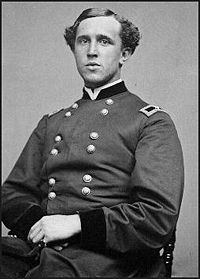 |
Dodge, Charles Cleveland | Brigadier General, USV (November 29, 1862) |
Resigned June 12, 1863 | ||||
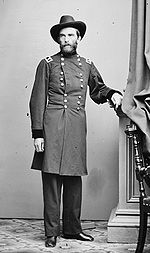 |
Dodge, Grenville Mellen Grenville M. Dodge Grenville Mellen Dodge was a Union army officer on the frontier and during the Civil War, a U.S. Congressman, businessman, and railroad executive who helped construct the Transcontinental Railroad.... |
Major General, USV (June 7, 1864) |
U.S. Congressman from Iowa Iowa Iowa is a state located in the Midwestern United States, an area often referred to as the "American Heartland". It derives its name from the Ioway people, one of the many American Indian tribes that occupied the state at the time of European exploration. Iowa was a part of the French colony of New... (1867-1869) Commander-in-chief, MOLLUS (1907-1909) |
||||
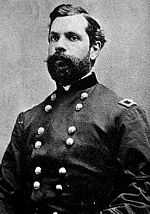 |
Doolittle, Charles C. Charles Doolittle Charles Camp Doolittle was a store clerk, general in the Union Army during the American Civil War, and a bank cashier.-Biography:Doolittle was born in Burlington, Vermont, the son of Matthew Doolittle... |
Brigadier General, USV (January 27, 1865) |
Major General, USV (March 13, 1865) |
||||
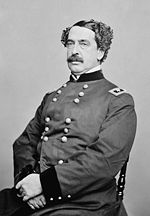 |
Doubleday, Abner Abner Doubleday Abner Doubleday was a career United States Army officer and Union general in the American Civil War. He fired the first shot in defense of Fort Sumter, the opening battle of the war, and had a pivotal role in the early fighting at the Battle of Gettysburg. Gettysburg was his finest hour, but his... |
Lieutenant Colonel, USA (September 20, 1863) Major General, USV (November 29, 1862) |
Major General, USA (March 13, 1865) |
USMA, 1842 Aimed first cannon to return fire from Fort Sumter Fort Sumter Fort Sumter is a Third System masonry coastal fortification located in Charleston Harbor, South Carolina. The fort is best known as the site upon which the shots initiating the American Civil War were fired, at the Battle of Fort Sumter.- Construction :... |
|||
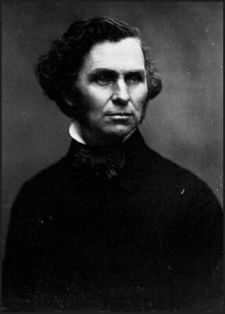 |
Dow, Neal | Brigadier General, USV (April 28, 1862) |
Resigned November 30, 1864 | ||||
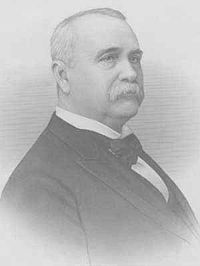 |
Drake, Francis Marion Francis M. Drake Francis Marion Drake was an American politician who became the 16th Governor of Iowa.-Biography:Drake was born in Rushville, Illinois, the son of John Adams Drake and Harriet Jane O'Neal. He later moved to Centerville, Iowa... |
Lieutenant Colonel, USV (October 4, 1862) |
Brigadier General, USV (February 22, 1865) |
Governor of Iowa (1896-1898) | |||
| Draper, William Francis William F. Draper William Franklin Draper was an American businessman, industrialist, and soldier who served as a U.S. Representative from Massachusetts.-Biography:Draper was born in Lowell, Massachusetts on April 9, 1842... |
Lieutenant Colonel, USV (August 9, 1864) |
Brigadier General, USV (March 13, 1865) |
U.S. Congressman from Massachusetts Massachusetts The Commonwealth of Massachusetts is a state in the New England region of the northeastern United States of America. It is bordered by Rhode Island and Connecticut to the south, New York to the west, and Vermont and New Hampshire to the north; at its east lies the Atlantic Ocean. As of the 2010... (1893-1897) U.S. Ambassador to Italy United States Ambassador to Italy Since 1840, the United States has had diplomatic representation in the Italian Republic and its predecessor nation, the Kingdom of Italy, with a break in relations from 1941 to 1944 while Italy and the U.S. were at war during World War II. The U.S. Mission to Italy is headed by the Embassy of the... (1897-1900) |
||||
| Duffié, Alfred Napoleon Alexander Alfred N. Duffié Alfred Napoléon Alexander Duffié was a French-American soldier and diplomat who served in the Crimean War and the American Civil War.-Early life and career:Duffié was born in Paris... (aka. Duffie, Alfred Nattie) |
Brigadier General, USV (June 23, 1863) |
||||||
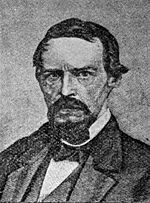 |
Dumont, Ebenezer Ebenezer Dumont Ebenezer Dumont was a U.S. Representative from Indiana, as well as a general in the Union Army during the American Civil War.-Biography:... |
Brigadier General, USV (September 3, 1861) |
Resigned February 28, 1863 U.S. Congressman from Indiana Indiana Indiana is a US state, admitted to the United States as the 19th on December 11, 1816. It is located in the Midwestern United States and Great Lakes Region. With 6,483,802 residents, the state is ranked 15th in population and 16th in population density. Indiana is ranked 38th in land area and is... (1863-1867) |
||||
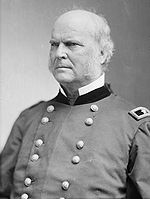 |
Dunn, William McKee William M. Dunn William McKee Dunn was a U.S. Representative from Indiana and the Judge Advocate General of the United States Army.-Early life and career:... |
Lieutenant Colonel, USA (June 22, 1864) |
Brigadier General, USA (March 13, 1865) |
U.S. Congressman from Indiana Indiana Indiana is a US state, admitted to the United States as the 19th on December 11, 1816. It is located in the Midwestern United States and Great Lakes Region. With 6,483,802 residents, the state is ranked 15th in population and 16th in population density. Indiana is ranked 38th in land area and is... (1859-1863) |
|||
| Duryée, Abram Abram Duryée Abram Duryée was a Union Army general during the American Civil War, the commander of one of the most famous Zouave regiments, the 5th New York Volunteer Infantry. After the war he was New York City Police Commissioner.-Birth and early years:... |
Brigadier General, USV (August 31, 1861) |
Major General, USV (March 13, 1865) |
Resigned January 5, 1863 | ||||
| Dutton, Arthur Henry | Captain, USA (October 2, 1863) Colonel, USV (September 5, 1862) |
Colonel, USA (May 26, 1864) Brigadier General, USV (May 16, 1864) |
USMA, 1861 DOW, Battle of Proctor's Creek Battle of Proctor's Creek The Battle of Proctor's Creek, also known as Drewry's Bluff or Fort Darling, was fought May 12–16, 1864, in Chesterfield County, Virginia, during the Bermuda Hundred Campaign of the American Civil War... (w. May 16, 1864, d. June 5, 1864) |
||||
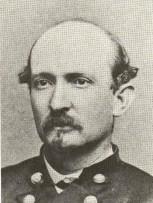 |
Duval, Isaac Hardin Isaac H. Duval Isaac Harding Duval was an adventurer and businessman prior to becoming a brigadier general in the Union Army during the American Civil War. He was a postbellum U.S. Representative from West Virginia in the 41st United States Congress.-Early life and career:Duval was born in Wellsburg, West... |
Brigadier General, USV (September 24, 1864) |
Major General, USV (March 13, 1865) |
U.S. Congressman from West Virginia West Virginia West Virginia is a state in the Appalachian and Southeastern regions of the United States, bordered by Virginia to the southeast, Kentucky to the southwest, Ohio to the northwest, Pennsylvania to the northeast and Maryland to the east... (1869-1871) |
|||
| Dwight, William William Dwight William Dwight, Jr. , was a general in the Union Army during the American Civil War.-Early life:William Dwight was born July 14, 1831 in Springfield, Massachusetts... |
Brigadier General, USV (November 29, 1862) |
USMA (class of 1853), discharged January 31, 1853 | |||||
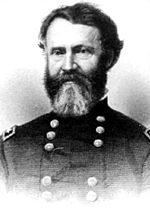 |
Dyer, Alexander Brydie Alexander Brydie Dyer Alexander Brydie Dyer was an American soldier in a variety of 19th century wars, serving most notably as a general and chief of ordnance for the Union Army during the American Civil War.-Biography:... |
Brigadier General, USA (September 12, 1864) |
Major General, USA (March 13, 1865) |
USMA, 1837 Chief of Ordnance (1864-1874) |
E
| Image | Name | Substantive Rank | Brevet Rank | Eaton, Amos Beebe Amos Beebe Eaton Amos Beebe Eaton was a career officer in the United States Army, serving as a general for the Union during the American Civil War.-Biography:... | Brigadier General, USA (June 29, 1864) |
Major General, USA (March 13, 1865) |
USMA, 1826 Commissary General of Subsistence (1864-1874) |
|---|---|---|---|---|---|---|---|
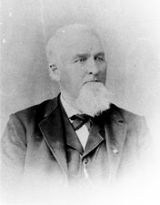 |
Edgerton, Alonzo Jay Alonzo J. Edgerton Alonzo Jay Edgerton was an American politician, who graduated from Wesleyan University in 1850, and there became a member of the Mystical Seven. After residing in Mississippi and Illinois for periods of time, Edgerton settled in Mantorville in 1855 and was admitted to the bar. In 1859 he was... |
Colonel, USV (February 15, 1864) |
Brigadier General, USV (March 13, 1865) |
U.S. Senator from Minnesota Minnesota Minnesota is a U.S. state located in the Midwestern United States. The twelfth largest state of the U.S., it is the twenty-first most populous, with 5.3 million residents. Minnesota was carved out of the eastern half of the Minnesota Territory and admitted to the Union as the thirty-second state... (1881) |
|||
| Edwards, John John Edwards (Arkansas) John Edwards was a U.S. Representative from Arkansas.Born in Louisville, Kentucky, Edwards received a limited schooling.He studied law and was admitted to the bar.... |
Brigadier General (September 24, 1864) |
U.S. Congressman from Arkansas Arkansas Arkansas is a state located in the southern region of the United States. Its name is an Algonquian name of the Quapaw Indians. Arkansas shares borders with six states , and its eastern border is largely defined by the Mississippi River... (1871-February 8, 1872) Removed from seat when election was successfully contested |
|||||
| Edwards, Oliver Oliver Edwards Oliver Edwards was a machine company executive, an inventor, and a volunteer officer in the Union Army during the American Civil War.... |
Brigadier General, USV (May 19, 1865) |
Major General, USV (April 5, 1865) |
|||||
| Egan, Thomas Washington Thomas W. Egan Thomas Wilberforce Egan was a Union Army officer who led the Mozart Regiment during most of the American Civil War, later becoming a general.-Early life :... |
Brigadier General, USV (September 3, 1864) |
Major General, USV (October 27, 1864) |
|||||
| Ekin, James A. James A. Ekin James Adams Ekin was a Union Army general in the American Civil War. He achieved fame as a member of the military commission trying the conspirators involved with the assassination of President Abraham Lincoln.... |
Lieutenant Colonel, USA (July 29, 1865) Colonel, USV August 2, 1864) |
Brigadier General, USA (March 13, 1865) Brigadier General, USV (March 8, 1865) |
Commissioner on Lincoln assassination trial Abraham Lincoln assassination The assassination of United States President Abraham Lincoln took place on Good Friday, April 14, 1865, as the American Civil War was drawing to a close. The assassination occurred five days after the commanding General of the Army of Northern Virginia, Robert E. Lee, and his battered Army of... |
||||
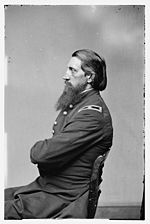 |
Ellet, Alfred Washington Alfred W. Ellet Alfred Washington Ellet was a civil engineer and a brigadier general in the Union Army who commanded the United States Ram Fleet during the American Civil War.-Biography:... |
Brigadier General, USV (November 1, 1862) |
Resigned, December 31, 1864 Brother of Charles Ellet, Jr. Charles Ellet, Jr. Charles Ellet, Jr. was a civil engineer and a colonel during the American Civil War, mortally wounded at the Battle of Memphis.-Biography:Ellet was born in Bucks County, Pennsylvania, brother of Alfred W... Uncle of Charles Rivers Ellet |
||||
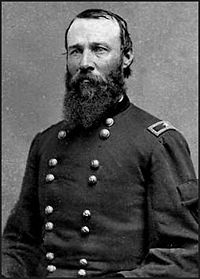 |
Elliott, Washington Lafayette Washington Lafayette Elliott Washington Lafayette Elliott was a Brigadier General in the Union Army during the American Civil War. He led a division of IV Corps at the Battle of Nashville in 1864. In 1866, he was awarded the honorary grade of brevet major general, U.S. Army.-Early life and career:Elliott was born on March... |
Major, USA (November 5, 1861) Brigadier General, USV (June 11, 1862) |
Major General, USA (March 13, 1865) Major General, USV (March 13, 1865) |
USMA (class of 1845), left in 1844 | |||
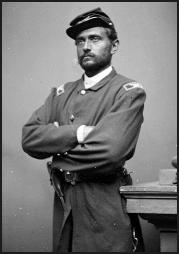 |
Ellis, Augustus van Horne | Colonel, USV (September 5, 1862) |
Brigadier General, USV (July 2, 1863) |
KIA, Battle of Gettysburg Battle of Gettysburg The Battle of Gettysburg , was fought July 1–3, 1863, in and around the town of Gettysburg, Pennsylvania. The battle with the largest number of casualties in the American Civil War, it is often described as the war's turning point. Union Maj. Gen. George Gordon Meade's Army of the Potomac... (July 2, 1863) Last brevet brigadier general commission issued (February 20, 1869) |
|||
| Elstner, George Ruter | Lieutenant Colonel, USV (July 1, 1863) |
Brigadier General, USV (August 8. 1864) |
KIA, Battle of Utoy Creek Battle of Utoy Creek The Battle of Utoy Creek was fought August 4 –7, 1864, during the Atlanta Campaign of the American Civil War. Maj. Gen. William T. Sherman's Union armies had partially encircled the city of Atlanta, Georgia, which was being held by Confederate forces under the command of General John Bell Hood... (August 8, 1864) |
||||
 |
Emory, William Helmsley William H. Emory William Hemsley Emory was an United States Army officer and surveyor of Texas.-Early life and career:... |
Colonel, USA (October 27, 1863) Major General, USV (September 25, 1865) |
Major General, USA (March 13, 1865) |
USMA, 1831 Namesake of Emory Peak Emory Peak Emory Peak, located in Big Bend National Park, is the highest peak in the Chisos Mountains. It is the most prominent peak in Texas and the county high point for Brewster County. The peak is named for William H. Emory, the chief surveyor of the U.S. Boundary Survey team of 1852... |
|||
| Enochs, William Henry William H. Enochs William Henry Enochs was a U.S. Representative from Ohio.Born near Middleburg, Ohio, Enochs attended the common schools and Ohio University at Athens.Enlisted as a private in Company B, 2nd Ohio Infantry, April 17, 1861.... |
Colonel, USV (December 23, 1864) |
Brigadier General, USV (March 13, 1865) |
Mustered out July 21, 1865 U.S. Congressman from Ohio Ohio Ohio is a Midwestern state in the United States. The 34th largest state by area in the U.S.,it is the 7th‑most populous with over 11.5 million residents, containing several major American cities and seven metropolitan areas with populations of 500,000 or more.The state's capital is Columbus... (1891-1893) |
||||
| Estes, Llewellyn Garrish | Major, USV (February 2, 1865) |
Brigadier General, USV (March 13, 1865) |
CMOH for leading a charge over a burning bridge crossing the Flint River Flint River (Georgia) The Flint River is a river in the U.S. state of Georgia. The river drains of western Georgia, flowing south from the upper Piedmont region south of Atlanta to the wetlands of the Gulf Coastal Plain in the southwestern corner of the state. Along with the Apalachicola and the Chattahoochee rivers,... (August 30, 1864) |
||||
| Estey, George Peabody | Brigadier General, USV (June 26, 1865) |
||||||
| Eustis, Henry Lawrence | Brigadier General (September 12, 1863) |
USMA, 1842 Resigned, June 27, 1864 |
|||||
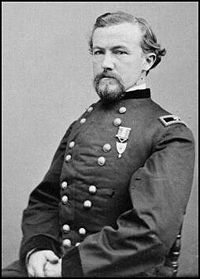 |
Ewing, Charles Charles Ewing (General) Charles Ewing, was an attorney and Union Army general during the American Civil War. He was the son of Interior Secretary Thomas Ewing, the brother of Thomas Ewing, Jr. and Hugh Boyle Ewing, and the foster brother & brother-in-law of William T. Sherman... |
Captain, USA (May 14, 1861) Brigadier General, USV (March 8, 1865) |
Colonel, USA (March 13, 1865) |
Son of Thomas Ewing Thomas Ewing Thomas Ewing, Sr. was a National Republican and Whig politician from Ohio. He served in the U.S. Senate as well as serving as the Secretary of the Treasury and the first Secretary of the Interior.-Biography:... Brother of Thomas Ewing, Jr. Thomas Ewing, Jr. Thomas Ewing, Jr. was an attorney, the first chief justice of Kansas and leading free state advocate, Union Army general during the American Civil War, and two-term United States Congressman from Ohio, 1877-1881. He narrowly lost the 1880 campaign for Ohio Governor.-Early life and career:Ewing... Brother of Hugh Boyle Ewing Hugh Boyle Ewing Hugh Boyle Ewing, , was a diplomat, author, attorney, and Union Army general during the American Civil War. He was a member of the prestigious Ewing family, son of Thomas Ewing, the eldest brother of Thomas Ewing, Jr. and Charles Ewing, and the foster brother and brother-in-law of William T. Sherman... Brother-in-law of William Tecumseh Sherman |
|||
| Ewing, Hugh Boyle Hugh Boyle Ewing Hugh Boyle Ewing, , was a diplomat, author, attorney, and Union Army general during the American Civil War. He was a member of the prestigious Ewing family, son of Thomas Ewing, the eldest brother of Thomas Ewing, Jr. and Charles Ewing, and the foster brother and brother-in-law of William T. Sherman... |
Brigadier General, USV (November 29, 1862) |
Major General, USV (March 13, 1865) |
USMA, class of 1848, never graduated U.S. minister to Holland United States Ambassador to the Netherlands The United States diplomatic mission to the Netherlands consists of the embassy located in The Hague and a consular office located in Amsterdam.In 1782, John Adams was appointed America's first Minister Plenipotentiary to Holland... (1866-1870) Son of Thomas Ewing Thomas Ewing Thomas Ewing, Sr. was a National Republican and Whig politician from Ohio. He served in the U.S. Senate as well as serving as the Secretary of the Treasury and the first Secretary of the Interior.-Biography:... Brother of Thomas Ewing, Jr. Thomas Ewing, Jr. Thomas Ewing, Jr. was an attorney, the first chief justice of Kansas and leading free state advocate, Union Army general during the American Civil War, and two-term United States Congressman from Ohio, 1877-1881. He narrowly lost the 1880 campaign for Ohio Governor.-Early life and career:Ewing... Brother of Charles Ewing Charles Ewing (General) Charles Ewing, was an attorney and Union Army general during the American Civil War. He was the son of Interior Secretary Thomas Ewing, the brother of Thomas Ewing, Jr. and Hugh Boyle Ewing, and the foster brother & brother-in-law of William T. Sherman... Brother-in-law of William Tecumseh Sherman |
||||
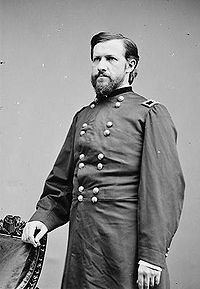 |
Ewing, Thomas Jr. Thomas Ewing, Jr. Thomas Ewing, Jr. was an attorney, the first chief justice of Kansas and leading free state advocate, Union Army general during the American Civil War, and two-term United States Congressman from Ohio, 1877-1881. He narrowly lost the 1880 campaign for Ohio Governor.-Early life and career:Ewing... |
Brigadier General, USV (March 13, 1863) |
Major General, USV (March 13, 1865) |
Resigned February 23, 1865 U.S. Congressman from Ohio Ohio Ohio is a Midwestern state in the United States. The 34th largest state by area in the U.S.,it is the 7th‑most populous with over 11.5 million residents, containing several major American cities and seven metropolitan areas with populations of 500,000 or more.The state's capital is Columbus... (1877-1881) Son of Thomas Ewing Thomas Ewing Thomas Ewing, Sr. was a National Republican and Whig politician from Ohio. He served in the U.S. Senate as well as serving as the Secretary of the Treasury and the first Secretary of the Interior.-Biography:... Brother of Charles Ewing Charles Ewing (General) Charles Ewing, was an attorney and Union Army general during the American Civil War. He was the son of Interior Secretary Thomas Ewing, the brother of Thomas Ewing, Jr. and Hugh Boyle Ewing, and the foster brother & brother-in-law of William T. Sherman... Brother of Hugh Boyle Ewing Hugh Boyle Ewing Hugh Boyle Ewing, , was a diplomat, author, attorney, and Union Army general during the American Civil War. He was a member of the prestigious Ewing family, son of Thomas Ewing, the eldest brother of Thomas Ewing, Jr. and Charles Ewing, and the foster brother and brother-in-law of William T. Sherman... Brother-in-law of William Tecumseh Sherman |
F
| Image | Name | Substantive Rank | Brevet Brevet (military) In many of the world's military establishments, brevet referred to a warrant authorizing a commissioned officer to hold a higher rank temporarily, but usually without receiving the pay of that higher rank except when actually serving in that role. An officer so promoted may be referred to as being... Rank | Fairchild, Lucius Lucius Fairchild Lucius Fairchild was an American politician, army general, and diplomat. He served as the tenth Governor of Wisconsin and as U.S. Minister to Spain.-Military career:... | Captain, USA Brigadier General, USV (October 13, 1863) |
Resigned November, 1863 Governor of Wisconsin Governor of Wisconsin The Governor of Wisconsin is the highest executive authority in the government of the U.S. state of Wisconsin. The position was first filled by Nelson Dewey on June 7, 1848, the year Wisconsin became a state... (1866-1872) U.S. minister to Spain United States Ambassador to Spain -Ambassadors:*John Jay**Appointed: September 29, 1779**Title: Minister Plenipotentiary**Presented credentials:**Terminated mission: ~May 20, 1782*William Carmichael**Appointed: April 20, 1790**Title: Chargé d'Affaires... (1880-1881) Commander-in-chief, GAR (1886-1887) Commander-in-chief, MOLLUS (1893-1895) |
|
|---|---|---|---|---|---|---|---|
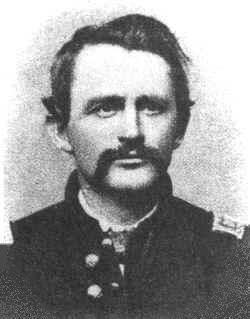 |
Farnsworth, Elon John Elon J. Farnsworth Elon John Farnsworth was a Union Army cavalry general in the American Civil War, killed at the Battle of Gettysburg.-Early life and career:... |
Brigadier General, USV (June 29, 1863) |
KIA, Battle of Gettysburg Battle of Gettysburg The Battle of Gettysburg , was fought July 1–3, 1863, in and around the town of Gettysburg, Pennsylvania. The battle with the largest number of casualties in the American Civil War, it is often described as the war's turning point. Union Maj. Gen. George Gordon Meade's Army of the Potomac... (July 3, 1863) Nephew of John Franklin Farnsworth John F. Farnsworth John Franklin Farnsworth was a seven-term U.S. Representative from Illinois and a general in the Union Army during the American Civil War.-Biography:... |
||||
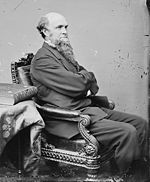 |
Farnsworth, John Franklin John F. Farnsworth John Franklin Farnsworth was a seven-term U.S. Representative from Illinois and a general in the Union Army during the American Civil War.-Biography:... |
Brigadier General, USV (November 29, 1862) |
Resigned March 4, 1863 U.S. Congressman from Illinois Illinois Illinois is the fifth-most populous state of the United States of America, and is often noted for being a microcosm of the entire country. With Chicago in the northeast, small industrial cities and great agricultural productivity in central and northern Illinois, and natural resources like coal,... (1857-1861, 1863-1873) Uncle of Elon John Farnsworth Elon J. Farnsworth Elon John Farnsworth was a Union Army cavalry general in the American Civil War, killed at the Battle of Gettysburg.-Early life and career:... |
||||
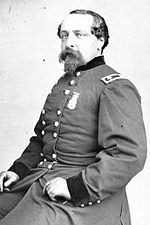 |
Ferrero, Edward Edward Ferrero Edward Ferrero was one of the leading dance instructors, choreographers, and ballroom operators in the United States. He also served as a Union Army general in the American Civil War, best remembered for his role in the Battle of the Crater in 1864.-Early life and career:Ferrero was born in... |
Brigadier General, USV (May 6, 1863) |
Major General, USV (December, 1864) |
Original appointment as Brigadier General, USV (September 10, 1862) expired March 4, 1863 | |||
 |
Ferry, Orris S. Orris S. Ferry Orris Sanford Ferry was a Republican American lawyer and politician from Connecticut who served in the United States House of Representatives and the United States Senate. He was also a Brigadier General in the Union Army during the American Civil War.-Early life:Ferry was born on August 15, 1823... |
Brigadier General, USV (March 17, 1862) |
Major General, USV (May 23, 1865) |
U.S. Congressman from Connecticut Connecticut Connecticut is a state in the New England region of the northeastern United States. It is bordered by Rhode Island to the east, Massachusetts to the north, and the state of New York to the west and the south .Connecticut is named for the Connecticut River, the major U.S. river that approximately... (1859-1861) U.S. Senator from Connecticut (1867-1875) |
|||
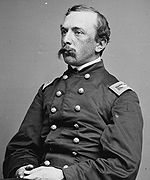 |
Fessenden, Francis Francis Fessenden Francis Fessenden was a lawyer, politician, and soldier from the state of Maine who served as a general in the Union Army during the American Civil War... |
Captain, USA Major General, USV (November 9, 1865) |
Son of Secretary of the Treasury United States Secretary of the Treasury The Secretary of the Treasury of the United States is the head of the United States Department of the Treasury, which is concerned with financial and monetary matters, and, until 2003, also with some issues of national security and defense. This position in the Federal Government of the United... William Pitt Fessenden Brother of James Deering Fessenden James Deering Fessenden James Deering Fessenden was a lawyer, politician, and soldier from the state of Maine who served as a general in the Union Army during the American Civil War. Primarily a staff officer and operations planner until the latter stages of the war, he commanded an infantry brigade in the Western... |
||||
| Fessenden, James Deering James Deering Fessenden James Deering Fessenden was a lawyer, politician, and soldier from the state of Maine who served as a general in the Union Army during the American Civil War. Primarily a staff officer and operations planner until the latter stages of the war, he commanded an infantry brigade in the Western... |
Brigadier General, USV (August 8, 1864) |
Major General, USV (March 13, 1865) |
Son of Secretary of the Treasury William Pitt Fessenden Brother of Francis Fessenden Francis Fessenden Francis Fessenden was a lawyer, politician, and soldier from the state of Maine who served as a general in the Union Army during the American Civil War... |
||||
| Finley, Clement Alexander Clement Finley Clement Alexander Finley , was the 10th Surgeon General of the United States Army, May 15, 1861 – April 14, 1862.-Early life:... |
Colonel, USA (May 15, 1861) |
Brigadier General, USA (March 13, 1865) |
Surgeon General (1861-1862) Retired April 14, 1862 |
||||
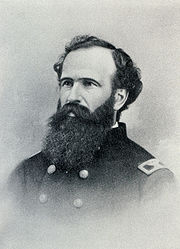 |
Fisher, Benjamin Franklin | Colonel, USA | Brigadier General, USV (March 13, 1865) |
Chief Signal Officer (1864-1865) | |||
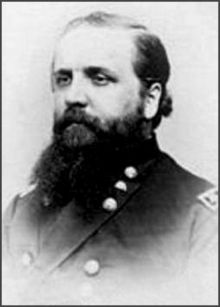 |
Fisk, Clinton Bowen Clinton B. Fisk Clinton Bowen Fisk , for whom Fisk University is named, was a senior officer during Reconstruction in the Bureau of Refugees, Freedmen and Abandoned Lands. He endowed Fisk University with $30,000... |
Brigadier General, USV (November 24, 1862) |
Major General, USV (March 13, 1865) |
||||
| Fletcher, Thomas Clement Thomas Clement Fletcher Thomas Clement Fletcher was the 18th Governor of Missouri during the latter stages of the American Civil War and the early part of Reconstruction. He was the first Missouri governor to be born in the state.... |
Colonel, USV | Brigadier General, USV (March 13, 1865) |
Governor of Missouri (1865-1869) | ||||
 |
Force, Manning Ferguson Manning Force Manning Ferguson Force was a lawyer, judge and soldier from Ohio. He became known as the commander of the 20th Ohio Volunteer Infantry in the Union Army during the American Civil War, and was a recipient of the Army Medal of Honor for gallantry in action.-Early life and career:Manning F... |
Brigadier General, USV (August 11, 1863) |
Major General, USV | CMOH, Battle of Atlanta Battle of Atlanta The Battle of Atlanta was a battle of the Atlanta Campaign fought during the American Civil War on July 22, 1864, just southeast of Atlanta, Georgia. Continuing their summer campaign to seize the important rail and supply center of Atlanta, Union forces commanded by William T. Sherman overwhelmed... (July 22, 1864) Brother-in-law of John Pope John Pope John Pope is the name of:*John Pope , U.S. soldier, traveler, and author*John Pope , U.S. politician, senator for Kentucky, and governor of Arkansas Territory... |
|||
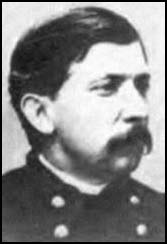 |
Forsyth, James W. James W. Forsyth James William Forsyth was a U.S. Army officer and general. He was primarily a Union staff officer during the American Civil War and cavalry regimental commander during the Indian Wars.-Early life:... |
Captain, USA (October 24, 1861) Brigadier General, USV (March 19, 1865) |
Brigadier General, USA (March 13, 1865) |
USMA, 1856 | |||
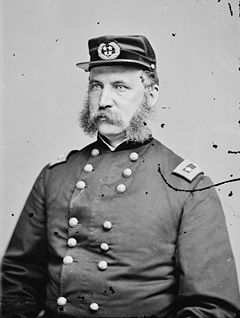 |
Foster, John Gray John G. Foster John Gray Foster was a career military officer in the United States Army and a Union general during the American Civil War whose most distinguished services were in North and South Carolina. A postbellum expert in underwater demolition, he wrote the definitive treatise on the subject.-Early... |
Captain, USA Major General, USV (July 18, 1862) |
Major General, USA (March 13, 1865) |
USMA, 1846 | |||
| Foster, Robert Sanford Robert Sanford Foster Robert Sanford Foster was a Union general during the American Civil War. He played a prominent role in the siege of Petersburg and the Appomattox Campaign.-Biography:... |
Brigadier General, USV (June 12, 1863) |
Major General, USV | Commissioner on Lincoln assassination trial Abraham Lincoln assassination The assassination of United States President Abraham Lincoln took place on Good Friday, April 14, 1865, as the American Civil War was drawing to a close. The assassination occurred five days after the commanding General of the Army of Northern Virginia, Robert E. Lee, and his battered Army of... |
||||
| Franchot, Richard Hansen Richard Franchot Richard Franchot was a U.S. Representative from New York and then an officer in the Union Army during the American Civil War... |
Colonel, USV (August 23, 1862) |
Brigadier General, USV (March 13, 1865) |
U.S. Congressman from New York New York New York is a state in the Northeastern region of the United States. It is the nation's third most populous state. New York is bordered by New Jersey and Pennsylvania to the south, and by Connecticut, Massachusetts and Vermont to the east... (1861-1863) |
||||
| Francine, Louis Raymond | Colonel, USV | Brigadier General, USV (July 2, 1863) |
DOW, Battle of Gettysburg Battle of Gettysburg The Battle of Gettysburg , was fought July 1–3, 1863, in and around the town of Gettysburg, Pennsylvania. The battle with the largest number of casualties in the American Civil War, it is often described as the war's turning point. Union Maj. Gen. George Gordon Meade's Army of the Potomac... (w. July 2, 1863, d. July 18, 1863) |
||||
 |
Franklin, William Buel William B. Franklin William Buel Franklin was a career United States Army officer and a Union Army general in the American Civil War. He rose to the rank of a corps commander in the Army of the Potomac, fighting in several notable early battles in the Eastern Theater.-Early life:William B. Franklin was born in York,... |
Colonel, USA (May 14, 1861) Major General, USV (July 4, 1862) |
USMA, 1843 | ||||
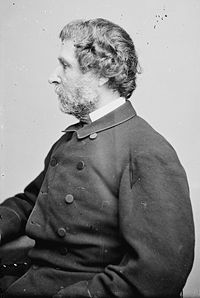 |
Frémont, John Charles John C. Frémont John Charles Frémont , was an American military officer, explorer, and the first candidate of the anti-slavery Republican Party for the office of President of the United States. During the 1840s, that era's penny press accorded Frémont the sobriquet The Pathfinder... |
Major General, USA (May 14,1861) |
Resigned June 4, 1864 U.S. Senator from California California California is a state located on the West Coast of the United States. It is by far the most populous U.S. state, and the third-largest by land area... (1850-1851) Territorial Governor of Arizona (1878-1887) Son-in-law of Senator Thomas Hart Benton |
||||
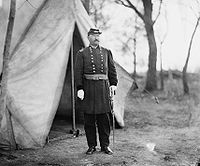 |
French, William H. William H. French William Henry French was a career United States Army officer and a Union Army General in the American Civil War. He rose to temporarily command a corps within the Army of the Potomac, but was relieved of active field duty following poor performance during the Mine Run Campaign in late 1863.-Early... |
Colonel, USA Major General, USV (November 29, 1862) |
USMA, 1837 Mustered out of volunteer service May 6, 1864 |
||||
 |
Fry, James Barnet James Barnet Fry James Barnet Fry was an American soldier and prolific author of historical books.-Biography:He was born in Carrollton, Illinois. He graduated from West Point in 1847 and served for a time as assistant instructor of artillery there. He was stationed successively in Oregon, Louisiana, and Texas, and... |
Brigadier General, USA (April 21, 1864) |
Major General, USA | USMA, 1847 Provost Marshal General (1863-1866) |
|||
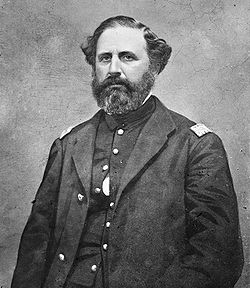 |
Fry, Speed Smith Speed S. Fry Speed Smith Fry was a lawyer, judge, and a United States Army officer during the Mexican-American War and American Civil War.-Early life:... |
Brigadier General, USV (March 21, 1862) |
|||||
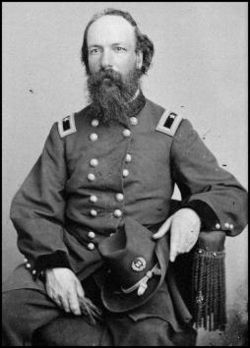 |
Fuller, John Wallace | Brigadier General, USV (January 5, 1864) |
Major General, USV (March 13, 1865) |
G
| Image | Name | Substantive Rank | Brevet Brevet (military) In many of the world's military establishments, brevet referred to a warrant authorizing a commissioned officer to hold a higher rank temporarily, but usually without receiving the pay of that higher rank except when actually serving in that role. An officer so promoted may be referred to as being... Rank | Gamble, William William Gamble (USA) William Gamble was a civil engineer and a Union cavalry officer in the American Civil War.-Early life:... | Brigadier General, USV (September 25, 1865) |
||
|---|---|---|---|---|---|---|---|
| Gardiner, Alexander Alexander Gardiner Alexander Gardiner was an American lawyer and New Hampshire soldier who died of wounds sustained at the Battle of Opequon in the American Civil War. He was posthumously brevetted a brigadier general.-References:... |
Colonel, USV | Brigadier General, USV (September 19, 1864) |
DOW, Battle of Opequon Battle of Opequon The Battle of Opequon, more commonly known as the Third Battle of Winchester, was fought in Winchester, Virginia, on September 19, 1864, during the Valley Campaigns of 1864 in the American Civil War.... (w. September 19, 1864, d. October 7, 1864) |
||||
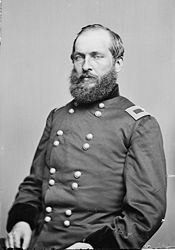 |
Garfield, James Abram | Major General, USV (September 19, 1863) |
Resigned December 5, 1863 U.S. Congressman from Ohio Ohio Ohio is a Midwestern state in the United States. The 34th largest state by area in the U.S.,it is the 7th‑most populous with over 11.5 million residents, containing several major American cities and seven metropolitan areas with populations of 500,000 or more.The state's capital is Columbus... (1863-1881) 20th President of the United States President of the United States The President of the United States of America is the head of state and head of government of the United States. The president leads the executive branch of the federal government and is the commander-in-chief of the United States Armed Forces.... (1881) Second President to die by assassination |
||||
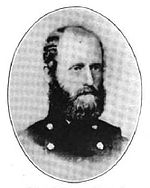 |
Garrard, Kenner Kenner Garrard Kenner Garrard was a brigadier general in the Union Army during the American Civil War. A member of one of Ohio's most prominent military families, he performed well at the Battle of Gettysburg, and then led a cavalry division in the army of Major General William T. Sherman during the Atlanta... |
First Lieutenant, USA Brigadier General, USV (July 23, 1863) |
Major General, USA (March 13, 1863) Major General, USV (December 16, 1864) |
USMA, 1851 First cousin (once removed) of Theophilus Toulmin Garrard Theophilus T. Garrard Theophilus Toulmin Garrard was a politician, Union general in the American Civil War, farmer, and businessman.-Early life and career:... |
|||
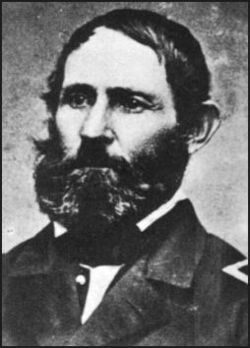 |
Garrard, Theophilus Toulmin Theophilus T. Garrard Theophilus Toulmin Garrard was a politician, Union general in the American Civil War, farmer, and businessman.-Early life and career:... |
Brigadier General, USV (November 29, 1862) |
Mustered out April 4, 1864 First cousin (once removed) of Kenner Garrard Kenner Garrard Kenner Garrard was a brigadier general in the Union Army during the American Civil War. A member of one of Ohio's most prominent military families, he performed well at the Battle of Gettysburg, and then led a cavalry division in the army of Major General William T. Sherman during the Atlanta... |
||||
 |
Geary, John White John W. Geary John White Geary was an American lawyer, politician, Freemason, and a Union general in the American Civil War... |
Brigadier General, USV (April 25, 1862) |
Major General, USV (January 12, 1865) |
Territorial Governor of Kansas Governor of Kansas The Governor of the State of Kansas is the head of state for the State of Kansas, United States. Under the Kansas Constitution, the Governor is also the head of government, serving as the chief executive of the Kansas executive branch, of the government of Kansas. The Governor is the... (1856-1857) Governor of Pennsylvania (1867-1873) |
|||
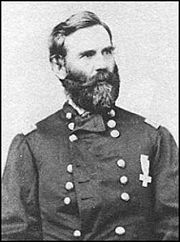 |
Getty, George Washington George W. Getty George Washington Getty was a career military officer in the United States Army, most noted for his role as a division commander in the Army of the Potomac during the final full year of the American Civil War.... |
Captain, USA Brigadier General, USV (September 25, 1862) |
Major General, USA (March 13, 1865) Major General, USV (August, 1864) |
USMA, 1840 | |||
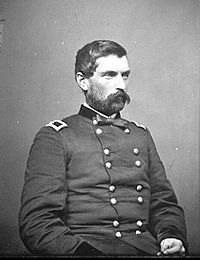 |
Gibbon, John John Gibbon John Gibbon was a career United States Army officer who fought in the American Civil War and the Indian Wars.-Early life:... |
Captain, USA Major General, USV (June 7, 1864) |
Major General, USA (March 13, 1865) |
USMA, 1847 Commander-in-chief, MOLLUS (1895-1896) |
|||
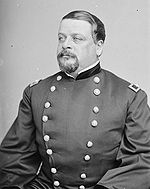 |
Gibbs, Alfred Alfred Gibbs Alfred Gibbs was a career officer in the United States Army who served as a brigadier general in the Union Army during the American Civil War... |
Captain, USA Brigadier General, USV (October 19, 1864) |
Major General, USA Major General, USV |
USMA, 1846 | |||
| Giesy, Henry Hensel | Major, USV | Brigadier General, USV (May 29, 1864) |
DOW, Battle of Dallas Battle of Dallas The Battle of Dallas was a series of engagements during the Atlanta Campaign of the American Civil War. They occurred between May 26 and June 4, 1864, in and around Dallas, Georgia, between Lt. General William J. Hardee's Confederate corps and the Union defense line, held by the XV Corps under Maj.... (w. May 28, 1864, d. May 29, 1864) |
||||
 |
Gilbert, Charles Champion Charles Champion Gilbert Charles Champion Gilbert was a United States Army officer during the Mexican-American War and the American Civil War.-Early life:... |
Major, USA (July, 1863) Brigadier General, USV (September 4, 1862) |
Colonel, USA | USMA, 1846 Appointment expired, March 4, 1863 Assigned to duty as "acting" Major General (August, 1862) by Horatio Gouverneur Wright Horatio Wright Horatio Gouverneur Wright was an engineer and general in the Union Army during the American Civil War. After the war, he was involved in a number of engineering projects, including the Brooklyn Bridge and the completion of the Washington Monument, and served as Chief of Engineers for the U.S... |
|||
| Gilbert, James Isham James Isham Gilbert James Isham Gilbert was a Union general during the American Civil War. He served with distinction in the Western theaters of the war as a regimental and brigade commander.-Early life:... |
Brigadier General, USV (February 9, 1865) |
Major General, USV | |||||
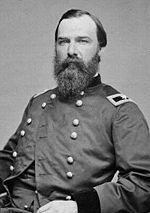 |
Gillem, Alvan Cullem Alvan Cullem Gillem Alvan Cullem Gillem was a general in the Union Army during the American Civil War. Although Southern-born, he remained loyal to the Federal government and fought in several battles in the Western Theater before commanding occupation troops in Mississippi and Arkansas during Reconstruction... |
Captain, USA (July 12, 1861) Major General, USV (November 3, 1865) |
Major General, USA (April 12, 1865) |
USMA, 1851 | |||
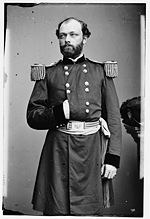 |
Gillmore, Quincy Adams Quincy Adams Gillmore Quincy Adams Gillmore was an American civil engineer, author, and a general in the Union Army during the American Civil War. He was noted for his actions in the Union victory at Fort Pulaski, where his modern rifled artillery readily pounded the fort's exterior stone walls, an action that... |
Major, USA (June 1, 1863) Major General, USV (July 10, 1863) |
Brigadier General, USA (March 13, 1865) |
USMA, 1851 | |||
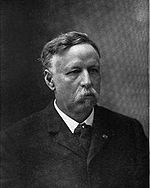 |
Gobin, John Peter Shindel John P. S. Gobin John Peter Shindel Gobin was an officer in the Union Army during the Civil War, and the Lieutenant Governor of Pennsylvania from 1899 to 1903.-Biography:... |
Colonel, USV | Brigadier General, USV (March 13, 1865) |
Commander-in-Chief, GAR (1897) | |||
| Gordon, George Henry George Henry Gordon George Henry Gordon was an American lawyer and a Union general in the American Civil War.-Early life:... |
Brigadier General, USV (June 9, 1862) |
Major General, USV (March 13, 1865) |
USMA, 1846 | ||||
| Gorman, Willis A. Willis A. Gorman Willis Arnold Gorman was an American lawyer, soldier, politician, and a general in the Union Army during the American Civil War.-Biography:... |
Brigadier General, USV (September 7, 1861) |
Mustered out May 4, 1864 Territorial Governor of Minnesota Governor of Minnesota The Governor of Minnesota is the chief executive of the U.S. state of Minnesota, leading the state's executive branch. Forty different people have been governors of the state, though historically there were also three governors of Minnesota Territory. Alexander Ramsey, the first territorial... (1853-1857) |
|||||
| Gowen, George Washington | Colonel, USV | Brigadier General, USV (April 2, 1865) |
KIA, Fall of Petersburg (April 2, 1865) | ||||
| Graham, Charles Kinnaird Charles K. Graham Charles Kinnaird Graham was a sailor in the antebellum United States Navy, attorney, and later a brigadier general in the Union Army during the American Civil War. As a civil engineer, he helped plan and lay out Central Park in New York City.-Early years and education:Graham was born in New York... |
Brigadier General, USV (November 29, 1862) |
Major General, USV (March 13, 1865) |
|||||
| Graham, Lawrence Pike | Colonel, USA (1864) Brigadier General, USV (August, 1861) |
Brigadier General, USA (March 13, 1865) |
|||||
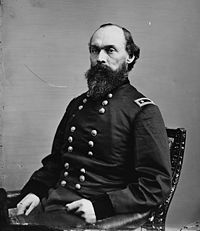 |
Granger, Gordon Gordon Granger Gordon Granger was a career U.S. army officer and a Union general during the American Civil War. He distinguished himself at the Battle of Chickamauga.-Early life & Mexico:... |
Major General, USV (September 17, 1862) |
Major General, USA (March 13, 1865) |
USMA, 1845 | |||
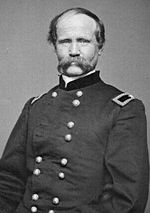 |
Granger, Robert Seaman Robert S. Granger Robert Seaman Granger was a career officer in the United States Army, reaching the brevet rank of major general in the Union Army during the American Civil War.-Biography:... |
Major, USA (September, 1861) Brigadier General, USV (October, 1862) |
Major General, USA | USMA, 1838 | |||
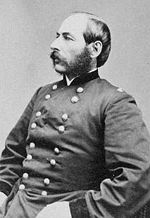 |
Grant, Lewis Addison Lewis A. Grant Lewis Addison Grant was a teacher, lawyer, soldier in the Union Army during the American Civil War, and later Assistant U.S. Secretary of War... |
Brigadier General, USV (April 27, 1864) |
CMOH, Battle of Salem Church Battle of Salem Church The Battle of Salem Church, also known as the Battle of Banks' Ford, took place on May 3–4, 1863, in Spotsylvania County, Virginia, as part of the Chancellorsville Campaign of the American Civil War.... (May, 3, 1863) |
||||
 |
Grant, Ulysses Simpson Ulysses S. Grant Ulysses S. Grant was the 18th President of the United States as well as military commander during the Civil War and post-war Reconstruction periods. Under Grant's command, the Union Army defeated the Confederate military and ended the Confederate States of America... (b. Grant, Hiram Ulysses) |
Lieutenant General Lieutenant General (United States) In the United States Army, the United States Air Force and the United States Marine Corps, lieutenant general is a three-star general officer rank, with the pay grade of O-9. Lieutenant general ranks above major general and below general... , USA (March 4, 1864) |
USMA, 1843 Received the Thanks of Congress Thanks of Congress The Thanks of Congress are a series of formal resolutions passed by the United States Congress originally to extend the government's formal thanks for significant victories or impressive actions by American military commanders and their troops. Although it began during the American Revolutionary... (December 17, 1863) Received the Congressional Gold Medal (December 17, 1863) First full-grade Lieutenant General Lieutenant General (United States) In the United States Army, the United States Air Force and the United States Marine Corps, lieutenant general is a three-star general officer rank, with the pay grade of O-9. Lieutenant general ranks above major general and below general... since George Washington George Washington George Washington was the dominant military and political leader of the new United States of America from 1775 to 1799. He led the American victory over Great Britain in the American Revolutionary War as commander-in-chief of the Continental Army from 1775 to 1783, and presided over the writing of... First General General (United States) In the United States Army, United States Air Force, and United States Marine Corps, general is a four-star general officer rank, with the pay grade of O-10. General ranks above lieutenant general and below General of the Army or General of the Air Force; the Marine Corps does not have an... since George Washington (July 25, 1866) General-in-Chief Commanding General of the United States Army Prior to the institution of the Chief of Staff of the United States Army in 1903, there was generally a single senior-most officer in the army. From 1783, he was known simply as the Senior Officer of the United States Army, but in 1821, the title was changed to Commanding General of the United... (1864-1869) 18th President of the United States President of the United States The President of the United States of America is the head of state and head of government of the United States. The president leads the executive branch of the federal government and is the commander-in-chief of the United States Armed Forces.... (1869-1877) |
||||
| Green, William Nelson, Jr. | Lieutenant Colonel, USV | Brigadier General, USV (Aril 9, 1864) |
DOW, Battle of Pleasant Hill Battle of Pleasant Hill The Battle of Pleasant Hill was fought on April 9, 1864, during the Red River Campaign of the American Civil War, near Pleasant Hill, Louisiana, between Union forces led by Maj. Gen. Nathaniel P. Banks and Confederate forces, led by Maj. Gen... (w. April 9, 1864, d. May 13, 1864) |
||||
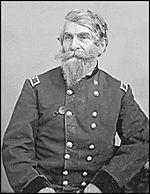 |
Greene, George Sears George S. Greene George Sears Greene was a civil engineer and a Union general during the American Civil War. He was part of the Greene family of Rhode Island, which had a distinguished military record for the United States. His greatest contribution during the war was his defense of the Union right flank at Culp's... |
Brigadier General, USV (April 28, 1862) |
USMA, 1823 | ||||
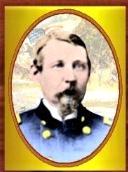 |
Greene, Oliver Duff Oliver Duff Greene Oliver Duff Greene was a Union officer who received the Medal of Honor on Dec 13, 1893 for his action at the Battle of Antietam on September 16, 1862. Born in Scott, New York, Greene graduated from West Point in 1854, receiving his commission in the artillery branch... |
Major, USA Lieutenant Colonel, USV |
Brigadier General, USA (March 13, 1865) |
USMA, 1854 CMOH, Battle of Antietam Battle of Antietam The Battle of Antietam , fought on September 17, 1862, near Sharpsburg, Maryland, and Antietam Creek, as part of the Maryland Campaign, was the first major battle in the American Civil War to take place on Northern soil. It was the bloodiest single-day battle in American history, with about 23,000... (September 17, 1862) |
|||
 |
Gregg, David McMurtrie David McMurtrie Gregg David McMurtrie Gregg was a farmer, diplomat, and a Union cavalry general in the American Civil War.-Early life and career:... |
Captain, USA (1861) Brigadier General, USV (November 29, 1862) |
USMA, 1855 Resigned February 3, 1865 Commander-in-chief, MOLLUS (1903-1905) Cousin of Pennsylvania Governor Andrew Gregg Curtin |
||||
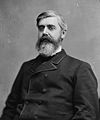 |
Gresham, Walter Quintin Walter Q. Gresham Walter Quintin Gresham was an American statesman and jurist. He served as United States Postmaster General, as a judge on the United States Courts of Appeals, was a two-time candidate for the Republican presidential nomination and was Secretary of State, and Secretary of the Treasury... |
Brigadier General, USV (August 11, 1883) |
Major General, USV (March 13, 1865) |
Resigned due to wounds, 1863 Postmaster General United States Postmaster General The United States Postmaster General is the Chief Executive Officer of the United States Postal Service. The office, in one form or another, is older than both the United States Constitution and the United States Declaration of Independence... (1883-1884) Secretary of the Treasury United States Secretary of the Treasury The Secretary of the Treasury of the United States is the head of the United States Department of the Treasury, which is concerned with financial and monetary matters, and, until 2003, also with some issues of national security and defense. This position in the Federal Government of the United... (1884) Secretary of State United States Secretary of State The United States Secretary of State is the head of the United States Department of State, concerned with foreign affairs. The Secretary is a member of the Cabinet and the highest-ranking cabinet secretary both in line of succession and order of precedence... (1893-1895) |
|||
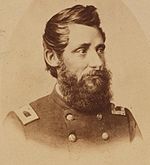 |
Grierson, Benjamin Henry Benjamin Grierson Benjamin Henry Grierson was a music teacher and then a career officer in the United States Army. He was a cavalry general in the volunteer Union Army during the American Civil War and later led troops in the American Old West... |
Major General, USV (May 27, 1865) |
|||||
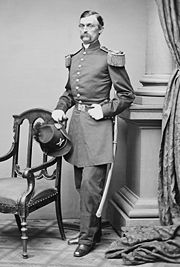 |
Griffin, Charles | Captain, USA Major General, USV (April 2, 1865) |
Major General, USA (March 13, 1865) |
USMA, 1847 Brother-in-law of Samuel Sprigg Samuel S. Carroll Samuel Spriggs "Red" Carroll was a career officer in the United States Army who rose to the rank of brigadier general during the American Civil War... |
|||
| Griffin, Simon Goodell Simon Goodell Griffin Simon Goodell Griffin was an American soldier, legislator, farmer and teacher.-Pre-War:Simon G. Griffin was born at Nelson, New Hampshire in 1824. Griffin was a farmer and a teacher at first... |
Brigadier General, USV (May 12, 1864) |
Major General, USV (April 2, 1865) |
|||||
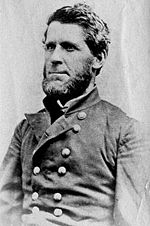 |
Grose, William William Grose William Grose was a lawyer, politician, author, and brigadier general in the Union Army during the American Civil War... |
Brigadier General, USV (July 30, 1864) |
Major General, USV (August 13, 1865) |
||||
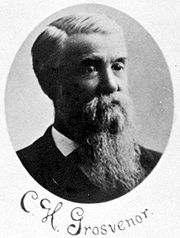 |
Grosvenor, Charles Henry | Colonel, USV | Brigadier General, USV (March 13, 1865) |
U.S. Congressman from Ohio Ohio Ohio is a Midwestern state in the United States. The 34th largest state by area in the U.S.,it is the 7th‑most populous with over 11.5 million residents, containing several major American cities and seven metropolitan areas with populations of 500,000 or more.The state's capital is Columbus... (1885-1891, 1893-1907) |
|||
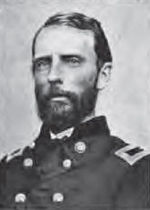 |
Grover, Cuvier | Captain, USA Brigadier General, USV (April 14, 1862) |
Major General, USA Major General, USV |
USMA, 1850 | |||
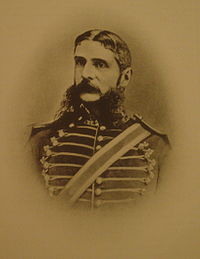 |
Grubb, Edward Burd, Jr. | Colonel, USV (March 1863) |
Brigadier General, USV (March 13, 1865) |
U.S. minister to Spain United States Ambassador to Spain -Ambassadors:*John Jay**Appointed: September 29, 1779**Title: Minister Plenipotentiary**Presented credentials:**Terminated mission: ~May 20, 1782*William Carmichael**Appointed: April 20, 1790**Title: Chargé d'Affaires... (1890-1892) |
H
| Image | Name | Substantive Rank | Brevet Brevet (military) In many of the world's military establishments, brevet referred to a warrant authorizing a commissioned officer to hold a higher rank temporarily, but usually without receiving the pay of that higher rank except when actually serving in that role. An officer so promoted may be referred to as being... Rank | Hackleman, Pleasant Adam Pleasant A. Hackleman Pleasant Adam Hackleman was a lawyer, politician and Union general who was killed during the American Civil War.... | Brigadier General, USV (April 20, 1862) |
KIA, Battle of Corinth (October 3, 1862) | |
|---|---|---|---|---|---|---|---|
 |
Halleck, Henry Wager Henry Wager Halleck Henry Wager Halleck was a United States Army officer, scholar, and lawyer. A noted expert in military studies, he was known by a nickname that became derogatory, "Old Brains." He was an important participant in the admission of California as a state and became a successful lawyer and land developer... |
Major General, USA (August 19, 1861) |
General-in-Chief Commanding General of the United States Army Prior to the institution of the Chief of Staff of the United States Army in 1903, there was generally a single senior-most officer in the army. From 1783, he was known simply as the Senior Officer of the United States Army, but in 1821, the title was changed to Commanding General of the United... , U.S. Army (July 23, 1862-March 12, 1864) Chief of staff, U.S. Army (March 12, 1864-May, 1865) |
||||
| Hamblin, Joseph Eldridge Joseph Eldridge Hamblin Joseph Eldridge Hamblin was an American general during the Civil War, who led a regiment and then a brigade in the Army of the Potomac.-Biography:... |
Brigadier General, USV (May 19, 1865) |
Major General, USV (March 13, 1865) |
|||||
 |
Hamilton, Andrew J. Andrew J. Hamilton Andrew Jackson Hamilton was a United States politician during the third quarter of the 19th century. He was a lawyer, state representative, military governor of Texas, as well as the 11th Governor of Texas during Reconstruction.-Early life:Hamilton was born in Huntsville, Alabama on January 28, 1815... |
Brigadier General, USV (September 18, 1863) |
First appointment as Brigadier General (November 14, 1862) never ratified Reconstruction Governor of Texas Governor of Texas The governor of Texas is the head of the executive branch of Texas's government and the commander-in-chief of the state's military forces. The governor has the power to either approve or veto bills passed by the Texas Legislature, and to convene the legislature... (June, 1865-August, 1866) |
||||
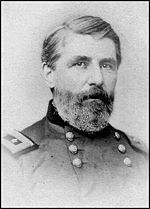 |
Hamilton, Charles Smith Charles Smith Hamilton Charles Smith Hamilton was a career United States Army officer who fought with distinction during the Mexican-American War. He also served as a Union Army general during the early part of the American Civil War.... |
Major General, USV (September 19, 1862) |
USMA, 1843 Resigned, April 13, 1863 |
||||
| Hamilton, Schuyler Schuyler Hamilton Schuyler Hamilton was an American soldier, a grandson of Alexander Hamilton. He was born in New York, graduated at West Point in 1841, served with great gallantry in the Mexican War, and was brevetted first lieutenant in 1846 and captain in 1847. From the latter year until 1854 he was... |
Colonel, USA Brigadier General, USV (November 12, 1861) |
USMA, 1841 Grandson of Alexander Hamilton Alexander Hamilton Alexander Hamilton was a Founding Father, soldier, economist, political philosopher, one of America's first constitutional lawyers and the first United States Secretary of the Treasury... Brother-in-law of Henry W. Halleck Henry Wager Halleck Henry Wager Halleck was a United States Army officer, scholar, and lawyer. A noted expert in military studies, he was known by a nickname that became derogatory, "Old Brains." He was an important participant in the admission of California as a state and became a successful lawyer and land developer... ; later brother-in-law to George Washington Cullum George Washington Cullum George Washington Cullum was an American soldier, engineer and writer. He served as a general in the Union Army during the American Civil War, primarily serving in the Western Theater.-Birth and early years:... Nominated Major General, USV (September 17, 1862), never confirmed due to illness Resigned February 27, 1863 |
|||||
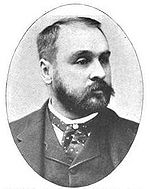 |
Hamlin, Charles Charles Hamlin (general) Charles Hamlin was a Union Army major during the American Civil War who was awarded the honorary grade of brevet brigadier general United States Volunteers, to rank from March 13, 1865, by U.S. Senate confirmation on March 12, 1866... |
Major, USV | Brigadier General, USV (March 13, 1865) |
Son of Vice President Vice President of the United States The Vice President of the United States is the holder of a public office created by the United States Constitution. The Vice President, together with the President of the United States, is indirectly elected by the people, through the Electoral College, to a four-year term... Hannibal Hamlin Hannibal Hamlin Hannibal Hamlin was the 15th Vice President of the United States , serving under President Abraham Lincoln during the American Civil War... Brother of Cyrus Hamlin Cyrus Hamlin (general) Cyrus Hamlin was an attorney, politician, and a general in the Union Army during the American Civil War.-Early life:... |
|||
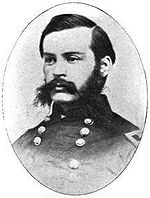 |
Hamlin, Cyrus Cyrus Hamlin (general) Cyrus Hamlin was an attorney, politician, and a general in the Union Army during the American Civil War.-Early life:... |
Colonel, USA (February 12, 1863) Brigadier General, USV (December 13, 1864) |
Major General, USV (March 13, 1865) |
Son of Vice President Vice President of the United States The Vice President of the United States is the holder of a public office created by the United States Constitution. The Vice President, together with the President of the United States, is indirectly elected by the people, through the Electoral College, to a four-year term... Hannibal Hamlin Hannibal Hamlin Hannibal Hamlin was the 15th Vice President of the United States , serving under President Abraham Lincoln during the American Civil War... Brother of Charles Hamlin Charles Hamlin (general) Charles Hamlin was a Union Army major during the American Civil War who was awarded the honorary grade of brevet brigadier general United States Volunteers, to rank from March 13, 1865, by U.S. Senate confirmation on March 12, 1866... |
|||
| Hammond, John John Hammond (New York) John Hammond was an American manufacturer, Union Army general and politician from New York.-Life:... |
Colonel, USV | Brigadier General, USV (March 13, 1865) |
U.S. Congressman from New York New York New York is a state in the Northeastern region of the United States. It is the nation's third most populous state. New York is bordered by New Jersey and Pennsylvania to the south, and by Connecticut, Massachusetts and Vermont to the east... (1879-1883) |
||||
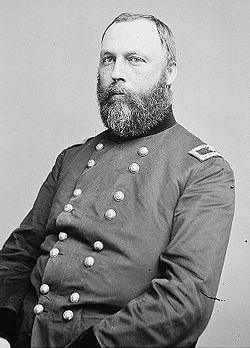 |
Hammond, William Alexander William Alexander Hammond William Alexander Hammond, M.D. was an American neurologist and the 11th Surgeon General of the U.S. Army... |
Brigadier General, USA (April 25, 1862) |
Surgeon General (1862-1864) Dismissed from service, August 18, 1864 |
||||
| Hancock, Winfield Scott Winfield Scott Hancock Winfield Scott Hancock was a career U.S. Army officer and the Democratic nominee for President of the United States in 1880. He served with distinction in the Army for four decades, including service in the Mexican-American War and as a Union general in the American Civil War... |
Brigadier General, USA (August 12, 1864) Major General, USV (November 29, 1862) |
USMA, 1844 Received the Thanks of Congress Thanks of Congress The Thanks of Congress are a series of formal resolutions passed by the United States Congress originally to extend the government's formal thanks for significant victories or impressive actions by American military commanders and their troops. Although it began during the American Revolutionary... (April 21, 1866) Commander-in-chief, MOLLUS (1879-1886) |
|||||
| Hardie, James Allen James Allen Hardie James Allen Hardie was an American soldier, serving in a number of important administrative positions in the Union Army during the American Civil War.-Early life:... |
Colonel, USA (March, 1864) |
Major General, USA (March 13, 1865) |
USMA, 1843 Appointed Brigadier General, USV (November 29, 1862), appointment revoked January 22, 1863 |
||||
| Hardin, Martin Davis Martin Davis Hardin Martin Davis Hardin was a brigadier general in the Union Army during the American Civil War.Martin D. Hardin was born in Jacksonville, Illinois. He was a family friend and protege of Abraham Lincoln... |
Major, USA Brigadier General, USV (July 2, 1864) |
Brigadier General, USA | USMA, 1859 | ||||
| Harding, Abner Clark | Brigadier General, USV (March 13, 1863) |
Resigned June, 1863 U.S. Congressman from Illinois Illinois Illinois is the fifth-most populous state of the United States of America, and is often noted for being a microcosm of the entire country. With Chicago in the northeast, small industrial cities and great agricultural productivity in central and northern Illinois, and natural resources like coal,... (1865-1869) |
|||||
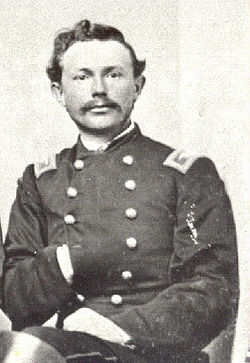 |
Harker, Charles Garrison Charles Garrison Harker Charles Garrison Harker was a brigadier general in the Union Army during the American Civil War. He was killed in action at the Battle of Kennesaw Mountain in northern Georgia during the Atlanta Campaign... |
Brigadier General, USV (April 10, 1864) |
USMA, 1858 KIA, Battle of Kennesaw Mountain Battle of Kennesaw Mountain The Battle of Kennesaw Mountain was fought on June 27, 1864, during the Atlanta Campaign of the American Civil War. It was the most significant frontal assault launched by Union Maj. Gen. William T. Sherman against the Confederate Army of Tennessee under Gen. Joseph E... (June 26, 1864) |
||||
| Harland, Edward Edward Harland (general) Edward Harland was a Union general during the American Civil War. He was associated with early battles of the IX Corps as well as Union involvement in North Carolina and the Tidewater region of Virginia.-Early life:... |
Brigadier General, USV (November 29, 1862) |
||||||
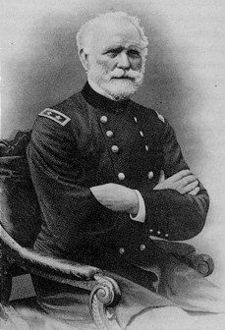 |
Harney, William Selby William S. Harney William Selby Harney was a cavalry officer in the U.S. Army during the Mexican-American War and the Indian Wars. He was born in what is today part of Nashville, Tennessee but at the time was known as Haysborough.... |
Brigadier General, USA (June 14, 1858) |
Major General, USA (March 13, 1865) |
||||
| Harriman, Walter Walter Harriman (governor) Walter Harriman was an American preacher, merchant, soldier, and politician who served two terms as the Governor of New Hampshire. He was a brevet brigadier general in the Union Army during the American Civil War.... |
Colonel, USV | Brigadier General, USV (March 13, 1865) |
Governor of New Hampshire Governor of New Hampshire The Governor of the State of New Hampshire is the supreme executive magistrate of the U.S. state of New Hampshire.The governor is elected at the biennial state general election in November of even-numbered years. New Hampshire is one of only two states, along with bordering Vermont, to hold... (1867-1869) |
||||
| Harris, Andrew Lintner Andrew L. Harris Andrew Lintner Harris was one of the heroes of the Battle of Gettysburg and the last Civil War general to serve as a governor in the U.S., serving as the 44th Governor of Ohio.-Biography:Harris was born in Milford Township, Butler County, Ohio, and was educated in the local schools... |
Colonel, USV | Brigadier General, USV (March 13, 1865) |
Governor of Ohio (1906-1909) | ||||
| Harris, Thomas Maley Thomas Maley Harris Thomas Maley Harris was a physician and Union general during the Civil War.Born and raised in Harrisville, Virginia , Harris originally set out to be a teacher, but changed career paths to study medicine... |
Brigadier General, USV (March 29, 1865) |
Commissioner on Lincoln assassination trial Abraham Lincoln assassination The assassination of United States President Abraham Lincoln took place on Good Friday, April 14, 1865, as the American Civil War was drawing to a close. The assassination occurred five days after the commanding General of the Army of Northern Virginia, Robert E. Lee, and his battered Army of... |
|||||
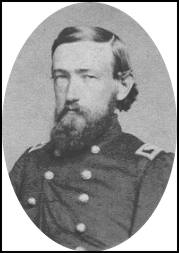 |
Harrison, Benjamin Benjamin Harrison Benjamin Harrison was the 23rd President of the United States . Harrison, a grandson of President William Henry Harrison, was born in North Bend, Ohio, and moved to Indianapolis, Indiana at age 21, eventually becoming a prominent politician there... |
Colonel, USV | Brigadier General, USV (January 23, 1865) |
U.S. Senator from Indiana Indiana Indiana is a US state, admitted to the United States as the 19th on December 11, 1816. It is located in the Midwestern United States and Great Lakes Region. With 6,483,802 residents, the state is ranked 15th in population and 16th in population density. Indiana is ranked 38th in land area and is... (1881-1887) 23rd President of the United States President of the United States The President of the United States of America is the head of state and head of government of the United States. The president leads the executive branch of the federal government and is the commander-in-chief of the United States Armed Forces.... (1889-1893) |
|||
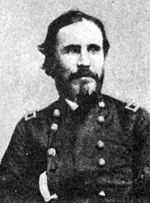 |
Harrow, William William Harrow William Harrow was an Indiana lawyer and a controversial Union general in the American Civil War.-Early life and career:... |
Brigadier General, USV (November 29, 1862) |
Relieved, September 1864 Resigned, April 7, 1865 |
||||
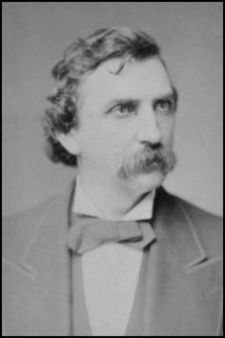 |
Hartranft, John F. John F. Hartranft John Frederick Hartranft was the 17th Governor of Pennsylvania from 1873 to 1879 and a Union Major General who received the Medal of Honor for his actions during the American Civil War.-Early life and career:... |
Brigadier General, USV (May 12, 1864) |
Major General, USV (March 28, 1865) |
CMOH, First Battle of Bull Run First Battle of Bull Run First Battle of Bull Run, also known as First Manassas , was fought on July 21, 1861, in Prince William County, Virginia, near the City of Manassas... Provost Marshal Provost Marshal The Provost Marshal is the officer in the armed forces who is in charge of the military police .There may be a Provost Marshal serving at many levels of the hierarchy and he may also be the public safety officer of a military installation, responsible for the provision of fire, gate security, and... , Lincoln Assassination trial Commander-in-chief, GAR (1875-1877) Governor of Pennsylvania (1873-1879) |
|||
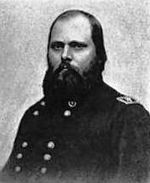 |
Hartsuff, George Lucas | Lieutenant Colonel, USA Major General, USV (November 19, 1862) |
Major General, USA | USMA, 1852 | |||
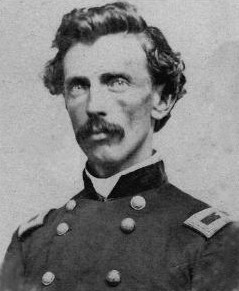 |
Hascall, Milo Smith Milo Smith Hascall Milo Smith Hascall was an American soldier, banker, and real estate executive who served as a general in the Union Army during the American Civil War.-Early life and career:... |
Brigadier General, USV (April 25, 1862) |
USMA, 1852 Recommended for promotion to Major General, USV, September 12, 1864; no action taken Resigned, October 27, 1864 |
||||
| Haskin, Joseph Abel | Lieutenant Colonel, USA Brigadier General, USV (August 5, 1864) |
Brigadier General, USA (March 13, 1865) |
USMA, 1839 | ||||
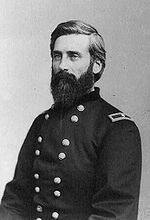 |
Hatch, Edward Edward Hatch Edward Hatch was a career American soldier who served as a general in the Union Army during the American Civil War... |
Brigadier General, USV (April 27, 1864) |
Major General, USV | ||||
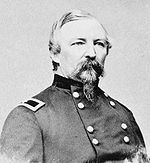 |
Hatch, John Porter John Porter Hatch John Porter Hatch was a career American soldier who served as general in the Union Army during the American Civil War. He received a Medal of Honor for gallantry in action at the September 1862 Battle of South Mountain during the Maryland Campaign.-Early life and career:Hatch was born in Oswego, N... |
Major, USA (1863) Brigadier General, USV (September 28, 1861) |
Brigadier General, USA Major General, USV |
USMA, 1845 CMOH, Battle of South Mountain Battle of South Mountain The Battle of South Mountain was fought September 14, 1862, as part of the Maryland Campaign of the American Civil War. Three pitched battles were fought for possession of three South Mountain passes: Crampton's, Turner's, and Fox's Gaps. Maj. Gen. George B... |
|||
 |
Haupt, Herman Herman Haupt Herman Haupt was an American civil engineer and railroad construction engineer and executive. As a Union Army General in the American Civil War, he revolutionized military transportation in the United States and was one of the unsung heroes of the war.-Early life:Haupt, whose first name was... |
Colonel, USA (April 27, 1862) Brigadier General, USV (September 5, 1862) |
USMA, 1835 Refused commission as Brigadier General, resigned September 14, 1863 |
||||
| Hawkins, Isaac Roberts Isaac Roberts Hawkins Isaac Roberts Hawkins was an American politician and a member of the United States House of Representatives for Tennessee's 7th congressional district.-Biography:... |
Lieutenant Colonel, USV | Brigadier General, USV (March 13,1865) |
U.S. Congressman from Tennessee Tennessee Tennessee is a U.S. state located in the Southeastern United States. It has a population of 6,346,105, making it the nation's 17th-largest state by population, and covers , making it the 36th-largest by total land area... (1866-1871) |
||||
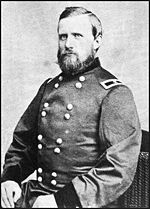 |
Hawkins, John Parker John Parker Hawkins John Parker Hawkins was a Union Army brigadier general of volunteers during the American Civil War. In 1866, after being mustered out of the Union Army volunteer force, he was appointed to the brevet grade of major general of volunteers to rank from March 13, 1865.-Biography:Hawkins was born in... |
Captain, USA Brigadier General, USV (April 13, 1863) |
Major General, USA (March 13, 1865) Major General, USV (March 13, 1865) |
USMA, 1852 Brother-in-law of E.R.S. Canby Edward Canby Edward Richard Sprigg Canby was a career United States Army officer and a Union general in the American Civil War, Reconstruction era, and the Indian Wars... |
|||
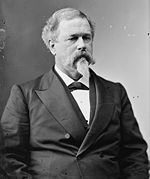 |
Hawley, Joseph Roswell Joseph Roswell Hawley Joseph Roswell Hawley was the 42nd Governor of Connecticut, a U.S. politician in the Republican and Free Soil parties, a Civil War general, and a journalist and newspaper editor. He served two terms in the United States House of Representatives and was a four-term U.S... |
Brigadier General, USV (September 13, 1864) |
Major General, USV (March 13, 1865) |
Governor of Connecticut (1866-1867) U.S. Congressman from Connecticut Connecticut Connecticut is a state in the New England region of the northeastern United States. It is bordered by Rhode Island to the east, Massachusetts to the north, and the state of New York to the west and the south .Connecticut is named for the Connecticut River, the major U.S. river that approximately... (1872-1875, 1879-1881) U.S. Senator from Connecticut (1881-1905) |
|||
| Hayes, Joseph | Brigadier General, USV (May 12, 1864) |
Major General, USV (March 13, 1865) |
|||||
| Hayes, Philip Cornelius Philip C. Hayes Philip Cornelius Hayes was a U.S. Representative from Illinois, as well as an officer in the Union Army during the American Civil War.-Biography:... |
Lieutenant Colonel, USV | Brigadier General, USV {March 13, 1865) |
U.S. Congressman from Illinois (1877-1881) | ||||
 |
Hayes, Rutherford Birchard Rutherford B. Hayes Rutherford Birchard Hayes was the 19th President of the United States . As president, he oversaw the end of Reconstruction and the United States' entry into the Second Industrial Revolution... |
Brigadier General, USV (October 19, 1864) |
Major General, USV (March 13, 1865) |
Resigned commission, June, 1865 U.S. Congressman from Ohio Ohio Ohio is a Midwestern state in the United States. The 34th largest state by area in the U.S.,it is the 7th‑most populous with over 11.5 million residents, containing several major American cities and seven metropolitan areas with populations of 500,000 or more.The state's capital is Columbus... (1865-1867) Governor of Ohio (1868-1872, 1876-1877) 19th President of the United States (1877-1881) Commander-in-chief, MOLLUS (1886, 1888-1893) |
|||
| Haynie, Isham N. Isham N. Haynie Isham Nicholas Haynie was a lawyer, politician, soldier and officer in the Union Army during the American Civil War. He was colonel of the 48th Illinois Volunteer Infantry Regiment at the battles of Fort Donelson and Shiloh.-Early life:... |
Brigadier General, USV (November 29, 1862) |
Commission never confirmed by Senate, expired March 4, 1863 Resigned, March 6, 1863 |
|||||
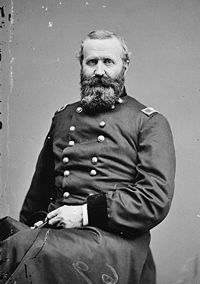 |
Hays, Alexander Alexander Hays Alexander Hays was a Union Army general in the American Civil War, killed in the Battle of the Wilderness.-Early life and career:... |
Captain, USA Brigadier General, USV (September 29, 1862) |
Colonel, USA Major General, USV (May 5, 1864) |
USMA, 1844 KIA, Battle of the Wilderness Battle of the Wilderness The Battle of the Wilderness, fought May 5–7, 1864, was the first battle of Lt. Gen. Ulysses S. Grant's 1864 Virginia Overland Campaign against Gen. Robert E. Lee and the Confederate Army of Northern Virginia. Both armies suffered heavy casualties, a harbinger of a bloody war of attrition by... (May 5, 1864) |
|||
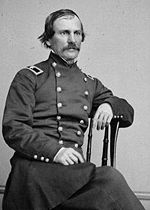 |
Hays, William William Hays (general) William Hays was a career officer in the United States Army, serving as a Union Army general during the American Civil War.-Early life:... |
Major, USA (1863) Brigadier General, USV (December 27, 1862) |
USMA, 1840 Relieved of duty, April 6, 1865 |
||||
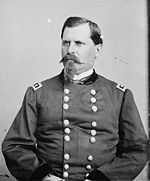 |
Hazen, William Babcock William Babcock Hazen William Babcock Hazen was a career United States Army officer who served in the Indian Wars, as a Union general in the American Civil War, and as Chief Signal Officer of the U.S. Army... |
Colonel, USA Major General, USV (December 13, 1864) |
Major General, USA | USMA, 1856 | |||
| Heckman, Charles Adam Charles Adam Heckman Charles A. Heckman was a brigadier general in the Union Army during the American Civil War. He fought in many of the early battles in North Carolina and later served in the Army of the James during the siege of Petersburg.-Biography:... |
Brigadier General, USV (November 29, 1862) |
Relieved, March 23, 1865 Resigned, May 25, 1865 |
|||||
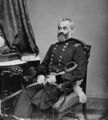 |
Heintzelman, Samuel P. Samuel P. Heintzelman Samuel Peter Heintzelman was a United States Army General. He served in the Seminole War, the Mexican-American War, the Yuma War, the Cortina Troubles, and the American Civil War, rising to the command of a corps.... |
Colonel, USA (May 14, 1861) Major General, USV (May 5, 1862) |
USMA, 1826 | ||||
| Henderson, Thomas Jefferson Thomas J. Henderson (politician) Thomas Jefferson Henderson was a U.S. Representative from Illinois.Born in Brownsville, Tennessee, Henderson moved with his parents to Illinois at the age of eleven. He served as clerk of the Board of Commissioners of Stark County, Illinois from 1847 to 1849. and as clerk of the court of Stark... |
Colonel, USV | Brigadier General, USV (November 30, 1864) |
U.S. Congressman from Illinois (1875-1895) | ||||
 |
Henry, Guy Vernor | First Lieutenant, USA Colonel, USV |
Brigadier General, USV (October 28, 1864) |
USMA, 1861 CMOH, Battle of Cold Harbor Battle of Cold Harbor The Battle of Cold Harbor was fought from May 31 to June 12, 1864 . It was one of the final battles of Union Lt. Gen. Ulysses S. Grant's Overland Campaign during the American Civil War, and is remembered as one of American history's bloodiest, most lopsided battles... |
|||
| Henry, William Wirt William W. Henry William Wirt Henry was a manufacturer and a general in the Union Army during the American Civil War. He was a recipient of the Medal of Honor for gallantry in action.-Early life:... |
Colonel, USV | Brigadier General, USV (March 7, 1865) |
CMOH, Battle of Cedar Creek Battle of Cedar Creek The Battle of Cedar Creek, or Battle of Belle Grove, October 19, 1864, was one of the final, and most decisive, battles in the Valley Campaigns of 1864 during the American Civil War. The final Confederate invasion of the North, led by Lt. Gen. Jubal A. Early, was effectively ended... |
||||
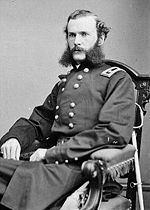 |
Herron, Francis Jay | Major General, USV (November 29, 1862) |
Youngest Major General CMOH, Battle of Pea Ridge Battle of Pea Ridge The Battle of Pea Ridge was a land battle of the American Civil War, fought on March 6–8, 1862, at Pea Ridge in northwest Arkansas, near Garfield. In the battle, Union forces led by Brig. Gen. Samuel R. Curtis defeated Confederate troops under Maj. Gen. Earl Van Dorn. The outcome of the... |
||||
| Hill, Sylvester Gardner Sylvester G. Hill Sylvester Gardner Hill was an officer in the Union Army during the American Civil War. He served as a brigade commander during the Red River Campaign and battle of Nashville where he was killed in action.-Early life:... |
Colonel, USV | Brigadier General, USV (December 15, 1864) |
KIA, Battle of Nashville Battle of Nashville The Battle of Nashville was a two-day battle in the Franklin-Nashville Campaign that represented the end of large-scale fighting in the Western Theater of the American Civil War. It was fought at Nashville, Tennessee, on December 15–16, 1864, between the Confederate Army of Tennessee under... (December 15, 1864) |
||||
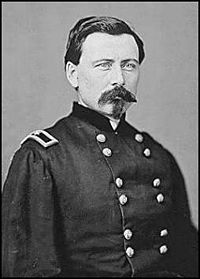 |
Hinks, Edward Winslow Edward Winslow Hinks Edward Winslow Hinks was a career United States Army officer who served as a brigadier general during the American Civil War.-Early life:... (b. Hincks, Edward Winslow; aka Hinks, Edward Ward) |
Second Lieutenant, USA (April 26, 1861) Brigadier General, USV (November 29, 1862) |
Brigadier General, USA (March 2, 1867) Major General, USV (March 13, 1865) |
Resigned regular Army commission June 4, 1861, returned to regular service after the war | |||
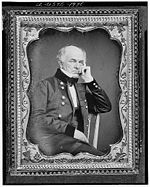 |
Hitchcock, Ethan Allen Ethan A. Hitchcock (general) Ethan Allen Hitchcock was a career United States Army officer and author who had War Department assignments in Washington, D.C., during the American Civil War, in which he served as a major general.-Early life:... |
Colonel, USA Major General, USV (February 10, 1862) |
Brigadier General, USV (1848) |
USMA, 1817 Grandson of Ethan Allen Ethan Allen Ethan Allen was a farmer, businessman, land speculator, philosopher, writer, and American Revolutionary War patriot, hero, and politician. He is best known as one of the founders of the U.S... |
|||
| Hobart, Harrison Carroll Harrison Carroll Hobart Harrison Carroll Hobart was a Union Army officer during the American Civil War and a lawyer and politician in the state of Wisconsin.-Biography:... |
Colonel, USV | Brigadier General, USV (January 12, 1865) |
Involved in Libby Prison Escape Libby Prison Escape The Libby Prison Escape was one of the most famous prison breaks during the American Civil War. Overnight between February 9 and February 10, 1864, more than 100 imprisoned Union soldiers broke out of their prisoner of war building at Libby Prison in Richmond, Virginia.Of the 109 escapees, 59... , February 10, 1864 |
||||
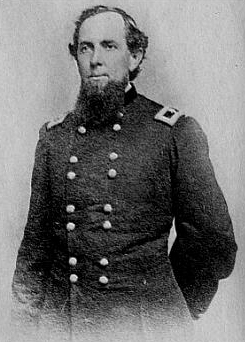 |
Hobson, Edward H. Edward H. Hobson Edward Henry Hobson was a merchant, banker, politician, tax collector, railroad executive, and an officer in the United States Army in the Mexican-American War and American Civil War. He is most known for his determined pursuit of the Confederates during Morgan's Raid.-Early life and career:Hobson... |
Brigadier General, USV (November 29, 1862) |
|||||
| Hoffman, William William Hoffman (U.S. Army) William Hoffman was a 19th century officer in the United States Army. The West Point graduate was involved in the Black Hawk War, Seminole Wars, Mexican-American War and the American Civil War. During the Civil War he served as the Commissary-General of Prisoners and set policy for the treatment... |
Colonel, USA | Major General, USA (March 13, 1865) |
USMA, 1829 Commissary-General of Prisoners |
||||
 |
Holt, Joseph Joseph Holt General Joseph Holt was a leading member of the Buchanan administration and was Judge Advocate General of the United States Army, most notably during the Lincoln assassination trials.-Early life:... |
Brigadier General, USA (June 22, 1864) |
Postmaster General United States Postmaster General The United States Postmaster General is the Chief Executive Officer of the United States Postal Service. The office, in one form or another, is older than both the United States Constitution and the United States Declaration of Independence... (1859-1860) Secretary of War United States Secretary of War The Secretary of War was a member of the United States President's Cabinet, beginning with George Washington's administration. A similar position, called either "Secretary at War" or "Secretary of War," was appointed to serve the Congress of the Confederation under the Articles of Confederation... (1861-1862) Judge Advocate General Judge Advocate General's Corps, U.S. Army The Judge Advocate General's Corps of the United States Army is composed of Army officers who are also lawyers and who provide legal services to the Army at all levels of command. The Judge Advocate General's Legal Service includes judge advocates, warrant officers, paralegal noncommissioned... Presiding judge on the Lincoln assassination trial |
||||
 |
Hooker, Joseph Joseph Hooker Joseph Hooker was a career United States Army officer, achieving the rank of major general in the Union Army during the American Civil War. Although he served throughout the war, usually with distinction, Hooker is best remembered for his stunning defeat by Confederate General Robert E... |
Brigadier General, USA (September 20, 1862) Major General, USV (May 5, 1862) |
USMA, 1837 Received Thanks of Congress Thanks of Congress The Thanks of Congress are a series of formal resolutions passed by the United States Congress originally to extend the government's formal thanks for significant victories or impressive actions by American military commanders and their troops. Although it began during the American Revolutionary... (January 28, 1864) |
||||
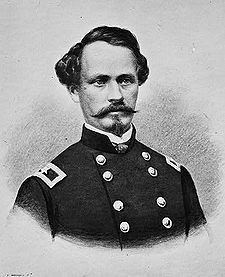 |
Hovey, Alvin P. Alvin P. Hovey Alvin Peterson Hovey was a Union general during the American Civil War, an Indiana Supreme Court justice, congressman, and the 21st Governor of Indiana from 1889 to 1891. During the war he played an important role in several battles and uncovered a secret plot for an uprising in Indiana... |
Brigadier General, USV (April 28, 1862) |
Major General, USV (June 4, 1864) |
U.S. minister to Peru United States Ambassador to Peru The following is a list of United States Ambassadors, or other Chiefs of Mission, to Peru. The title given by the United States State Department to this position is currently Ambassador Extraordinary and Minister Plenipotentiary.-See also:... (1866-1870) U.S. Congressman (1887-1889) Governor of Indiana Governor of Indiana The Governor of Indiana is the chief executive of the state of Indiana. The governor is elected to a four-year term, and responsible for overseeing the day-to-day management of the functions of many agencies of the Indiana state government. The governor also shares power with other statewide... (1889-1891) |
|||
| Hovey, Charles Edward Charles Edward Hovey Charles Edward Hovey was an educator, college president, pension lobbyist and a brevet major general in the United States Army during the American Civil War.-Biography:... |
Brigadier General, USV (September 5, 1862) |
Major General, USV (March 13, 1865) |
Commission never confirmed, expired March 4, 1863 Resigned due to wounds, May, 1863 |
||||
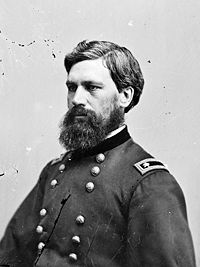 |
Howard, Oliver Otis | Brigadier General, USA (December 21, 1864) Major General, USV (November 29, 1862) |
USMA, 1854 CMOH, Battle of Fair Oaks Received Thanks of Congress Thanks of Congress The Thanks of Congress are a series of formal resolutions passed by the United States Congress originally to extend the government's formal thanks for significant victories or impressive actions by American military commanders and their troops. Although it began during the American Revolutionary... (January 28, 1864) Commissioner of the Freedmen's Bureau (1865-1871) Superintendent, USMA (1881-1882) |
||||
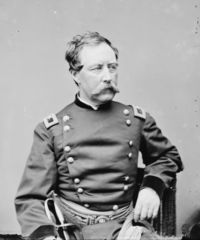 |
Howe, Albion Parris Albion P. Howe Albion Parris Howe was a Union Army general in the American Civil War. Howe's contentious relationships with superior officers in the Army of the Potomac eventually led to his being deprived of division command.... |
Captain, USA (1855) Brigadier General, USV (June 22, 1862) |
Major General, USA (March 13, 1865) Major General, USV (March 13, 1865) |
USMA, 1841 Commissioner on Lincoln assassination trail |
|||
| Howell, Joshua B. Joshua B. Howell Joshua B. Howell was a Union Army officer during the American Civil War. He served in Southeast Virginia and the Carolinas. He was mortally wounded late in the war following a horse riding accident.-Early life:... |
Brigadier General, USV (September 12, 1864) |
Posthumous promotion Died in riding accident, September 12, 1864 |
|||||
 |
Hoyt, Henry Martyn, Sr. Henry M. Hoyt Henry Martyn Hoyt, Sr. was the 18th Governor of Pennsylvania from 1879 to 1883, as well as a general in the Union army during the American Civil War.-Early life and career:... |
Colonel, USV | Brigadier General, USV (March 13, 1865) |
Governor of Pennsylvania (1879-1883) | |||
| Hubbard, Lucius Frederick Lucius Frederick Hubbard Lucius Frederick Hubbard was an American politician. He served as the ninth Governor of Minnesota from January 10, 1882 to January 5, 1887. He was a Republican.... |
Colonel, USV | Brigadier General, USV (December 16, 1864) |
Governor of Minnesota Governor of Minnesota The Governor of Minnesota is the chief executive of the U.S. state of Minnesota, leading the state's executive branch. Forty different people have been governors of the state, though historically there were also three governors of Minnesota Territory. Alexander Ramsey, the first territorial... (1882-1887) |
||||
| Hubbard, Thomas Hamlin Thomas Hamlin Hubbard Thomas Hamlin Hubbard was a Union Army colonel from Maine during the Civil War who was awarded the honorary grade of brevet brigadier general, United States Volunteers, for meritorious service... |
Colonel, USV (June 2, 1864) |
Brigadier General, USV (March 13, 1865) |
Commander-in-chief, MOLLUS (1913-1915) Son of Governor of Maine Governor of Maine The governor of Maine is the chief executive of the State of Maine. Before Maine was admitted to the Union in 1820, Maine was part of Massachusetts and the governor of Massachusetts was chief executive.... John Hubbard |
||||
| Humphrey, Thomas William | Colonel, USV | Brigadier General, USV (June 10, 1864) |
KIA, Battle of Brice's Crossroads Battle of Brice's Crossroads The Battle of Brice's Crossroads was fought on June 10, 1864, near Baldwyn in Lee County, Mississippi, during the American Civil War. It pitted a 4,787-man contingent led by Confederate Major General Nathan Bedford Forrest against an 8,100-strong Union force led by Brigadier General Samuel D. Sturgis... (June 10, 1864) |
||||
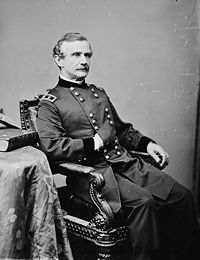 |
Humphreys, Andrew Atkinson Andrew A. Humphreys Andrew Atkinson Humphreys , was a career United States Army officer, civil engineer, and a Union General in the American Civil War. He served in senior positions in the Army of the Potomac, including division command, chief of staff, and corps command, and was Chief Engineer of the U.S... |
Colonel, USA Major General, USV (July 8, 1863) |
Major General, USA | USMA, 1831 | |||
 |
Hunt, Henry Jackson Henry Jackson Hunt Henry Jackson Hunt was Chief of Artillery in the Army of the Potomac during the American Civil War. Considered by his contemporaries the greatest artillery tactician and strategist of the war, he was a master of the science of gunnery and rewrote the manual on the organization and use of artillery... |
Lieutenant Colonel, USA Brigadier General, USV (September 15, 1862) |
Major General, USA (March 13, 1865) Major General, USV (1863) |
USMA, 1839 Brother of Lewis Cass Hunt Son-in-law of René Edward De Russy René Edward De Russy René Edward De Russy was an engineer, military educator, and career United States Army officer who was responsible for erecting many Eastern United States coastal fortifications... Brother-in-law of John Parker Hawkins John Parker Hawkins John Parker Hawkins was a Union Army brigadier general of volunteers during the American Civil War. In 1866, after being mustered out of the Union Army volunteer force, he was appointed to the brevet grade of major general of volunteers to rank from March 13, 1865.-Biography:Hawkins was born in... and Gustavus Adolphus De Russy |
|||
| Hunt, Lewis Cass | Major, USA (1863)Brigadier General, USV (November 29, 1862) |
Brigadier General, USA (1865) |
USMA, 1847 Brother of Henry Jackson Hunt Henry Jackson Hunt Henry Jackson Hunt was Chief of Artillery in the Army of the Potomac during the American Civil War. Considered by his contemporaries the greatest artillery tactician and strategist of the war, he was a master of the science of gunnery and rewrote the manual on the organization and use of artillery... Son-in-law of René Edward De Russy René Edward De Russy René Edward De Russy was an engineer, military educator, and career United States Army officer who was responsible for erecting many Eastern United States coastal fortifications... Brother-in-law of John Parker Hawkins John Parker Hawkins John Parker Hawkins was a Union Army brigadier general of volunteers during the American Civil War. In 1866, after being mustered out of the Union Army volunteer force, he was appointed to the brevet grade of major general of volunteers to rank from March 13, 1865.-Biography:Hawkins was born in... and Gustavus Adolphus De Russy |
||||
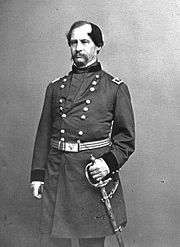 |
Hunter, David David Hunter David Hunter was a Union general in the American Civil War. He achieved fame by his unauthorized 1862 order emancipating slaves in three Southern states and as the president of the military commission trying the conspirators involved with the assassination of President Abraham Lincoln.-Early... |
Colonel, USA Major General, USV (August 13, 1861) |
Major General, USA | USMA, 1822 Presiding Commissioner on Lincoln assassination trial Abraham Lincoln assassination The assassination of United States President Abraham Lincoln took place on Good Friday, April 14, 1865, as the American Civil War was drawing to a close. The assassination occurred five days after the commanding General of the Army of Northern Virginia, Robert E. Lee, and his battered Army of... |
|||
| Hunter, Morton Craig Morton C. Hunter Morton Craig Hunter was a U.S. Representative from Indiana.-Biography:Morton Hunter was born in Versailles, Indiana and knew the hardships of growing up in a pioneer home. His father John Hunter was a soldier in the War of 1812 and his Irish immigrant grandfather served in the Revolutionary war... |
Colonel, USV | Brigadier General, USV (March 13, 1865) |
U.S. Congressman from Indiana Indiana Indiana is a US state, admitted to the United States as the 19th on December 11, 1816. It is located in the Midwestern United States and Great Lakes Region. With 6,483,802 residents, the state is ranked 15th in population and 16th in population density. Indiana is ranked 38th in land area and is... (1867-1869, 1873-1879) |
||||
| Hurlbut, Stephen A. Stephen A. Hurlbut Stephen Augustus Hurlbut , was a politician, diplomat, and commander of the U.S. Army of the Gulf in the American Civil War.-Biography:... |
Major General, USV (September 17, 1862) |
Mustered out of service for alleged corruption, June 20, 1865 First commander-in-chief, GAR (1866-1868) U.S. minister to Colombia United States Ambassador to Colombia The following is a list of Ambassadors of the United States, or other chiefs of mission, to Colombia and its predecessor states. The title given by the United States State Department to this position is currently Ambassador Extraordinary and Minister Plenipotentiary.- Gran Colombia:The following... (1869-1872) U.S. Congressman from Illinois (1873-1877) U.S. minister to Peru (1881-1882) |
|||||
| Hyde, Thomas Worcester Thomas W. Hyde Thomas Worcester Hyde was a Union Army colonel who subsequently received brevets of brigadier general of volunteers and major general of volunteers in the American Civil War, a state senator from Maine, and the founder of Bath Iron Works, one of the major shipyards in the United States... |
Colonel, USV | Major General, USV (April 2, 1865) |
CMOH, Battle of Antietam Battle of Antietam The Battle of Antietam , fought on September 17, 1862, near Sharpsburg, Maryland, and Antietam Creek, as part of the Maryland Campaign, was the first major battle in the American Civil War to take place on Northern soil. It was the bloodiest single-day battle in American history, with about 23,000... |
I
| Image | Name | Substantive Rank | Brevet Brevet (military) In many of the world's military establishments, brevet referred to a warrant authorizing a commissioned officer to hold a higher rank temporarily, but usually without receiving the pay of that higher rank except when actually serving in that role. An officer so promoted may be referred to as being... Rank | Ingalls, Rufus Rufus Ingalls Rufus Ingalls was an American military general who served as the 16th Quartermaster General of the United States Army.-Early life and career:... | Major, USA (1862) Brigadier General, USV (May 23, 1863) |
Major General, USA Major General, USV |
USMA, 1843 |
|---|---|---|---|---|---|---|---|
| Irvine, William William Irvine (lawyer) William Irvine was an American lawyer, soldier, and politician from Corning, New York. He was elected to the United States House of Representatives in 1858 as a Republican in New York's 28th district. He served only one term . At the start of the Civil War he entered the army as Lt... |
Lieutenant Colonel, USV | Brigadier General, USV (March 13, 1865) |
U.S. Congressman from New York New York New York is a state in the Northeastern region of the United States. It is the nation's third most populous state. New York is bordered by New Jersey and Pennsylvania to the south, and by Connecticut, Massachusetts and Vermont to the east... (1859-1861) |
J
| Image | Name | Substantive Rank | Brevet Brevet (military) In many of the world's military establishments, brevet referred to a warrant authorizing a commissioned officer to hold a higher rank temporarily, but usually without receiving the pay of that higher rank except when actually serving in that role. An officer so promoted may be referred to as being... Rank | Jackson, Conrad Feger Conrad Feger Jackson Conrad Feger Jackson was a businessman and soldier from the state of Pennsylvania who served as a general in the Union Army during the American Civil War. He was killed in action during the Battle of Fredericksburg.-Early life and career:Jackson was born in Alsace Township in Berks County,... | Brigadier General, USV (July 17, 1862) |
KIA, Battle of Fredericksburg Battle of Fredericksburg The Battle of Fredericksburg was fought December 11–15, 1862, in and around Fredericksburg, Virginia, between General Robert E. Lee's Confederate Army of Northern Virginia and the Union Army of the Potomac, commanded by Maj. Gen. Ambrose E. Burnside... (December 13, 1862) |
|
|---|---|---|---|---|---|---|---|
| Jackson, James Streshly James S. Jackson James Streshly Jackson was a U.S. Representative from Kentucky and a brigadier general in the Union Army during the American Civil War.-Biography:... |
Brigadier General, USV (July 19, 1862) |
U.S. Congressman from Kentucky Kentucky The Commonwealth of Kentucky is a state located in the East Central United States of America. As classified by the United States Census Bureau, Kentucky is a Southern state, more specifically in the East South Central region. Kentucky is one of four U.S. states constituted as a commonwealth... (1861) KIA, Battle of Perryville Battle of Perryville The Battle of Perryville, also known as the Battle of Chaplin Hills, was fought on October 8, 1862, in the Chaplin Hills west of Perryville, Kentucky, as the culmination of the Confederate Heartland Offensive during the American Civil War. Confederate Gen. Braxton Bragg's Army of Mississippi won a... (October 8, 1862) |
|||||
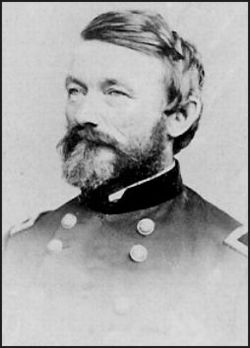 |
Jackson, Nathaniel James Nathaniel J. Jackson Nathaniel James Jackson was an American machinist and soldier. He served as a general in the Union Army during the American Civil War, in which he was wounded three times. After the war Jackson operated a mine.... |
Brigadier General, USV (September 24, 1862) |
Major General, USV | ||||
| Jackson, Richard Henry | Captain, USA (1862) Brigadier General, USV (May 19, 1865) |
Brigadier General, USA Major General, USV |
|||||
| Jacobs, Ferris, Jr. Ferris Jacobs, Jr. Ferris Jacobs, Jr. was a United States Representative from New York.-Biography:Born in Delhi, Delaware County, N.Y., attended Delaware Academy, Delhi, N.Y., and Delaware Literary Institute, Franklin, N.Y.; was graduated from Williams College, Williamstown, Massachusetts, in 1856; studied law; was... |
Lieutenant Colonel, USV | Brigadier General, USV (March 13, 1865) |
U.S. Congressman from New York New York New York is a state in the Northeastern region of the United States. It is the nation's third most populous state. New York is bordered by New Jersey and Pennsylvania to the south, and by Connecticut, Massachusetts and Vermont to the east... (1881-1883) |
||||
| Jameson, Charles Davis Charles Davis Jameson Charles Davis Jameson was an American Civil War general and Democratic Party candidate for Governor of Maine... |
Brigadier General, USV (September 3, 1861) |
d. November 6, 1862 of illness | |||||
| Johnson, Andrew Andrew Johnson Andrew Johnson was the 17th President of the United States . As Vice-President of the United States in 1865, he succeeded Abraham Lincoln following the latter's assassination. Johnson then presided over the initial and contentious Reconstruction era of the United States following the American... |
Brigadier General, USV (March 4, 1862) |
U.S. Congressman from Tennessee Tennessee Tennessee is a U.S. state located in the Southeastern United States. It has a population of 6,346,105, making it the nation's 17th-largest state by population, and covers , making it the 36th-largest by total land area... (1843-1853) Governor of Tennessee (1853-1857, 1875) U.S. Senator from Tennessee (1857-1862) Military Governor of Tennessee (1862-1864) 16th Vice President of the United States Vice President of the United States The Vice President of the United States is the holder of a public office created by the United States Constitution. The Vice President, together with the President of the United States, is indirectly elected by the people, through the Electoral College, to a four-year term... (1865) 17th President of the United States President of the United States The President of the United States of America is the head of state and head of government of the United States. The president leads the executive branch of the federal government and is the commander-in-chief of the United States Armed Forces.... (1865-1869) |
|||||
| Johnson, Robert | Colonel, USV | Brigadier General, USV (March 13, 1865) |
Son of President Andrew Johnson Andrew Johnson Andrew Johnson was the 17th President of the United States . As Vice-President of the United States in 1865, he succeeded Abraham Lincoln following the latter's assassination. Johnson then presided over the initial and contentious Reconstruction era of the United States following the American... |
||||
| Johnson, Richard W. Richard W. Johnson Richard W. Johnson was an American soldier, born in Kentucky.-Early career:He graduated at West Point in 1849 and up to the time of the Civil War was employed chiefly on frontier service. In 1861 he was commissioned colonel in the 3rd Kentucky Cavalry and soon afterward became a brigadier general... |
Brigadier General, USV (October 11, 1861) |
Major General, USA Major General, USV |
USMA, 1849 | ||||
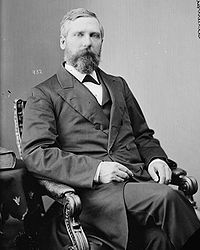 |
Jones, John Sills John S. Jones John Sills Jones was a U.S. Representative from Ohio.-Biography:Born near St. Paris, Champaign County, Ohio, Jones attended the public schools.... |
Colonel, USV | Brigadier General, USV (June 27, 1865) |
U.S. Congressman from Ohio Ohio Ohio is a Midwestern state in the United States. The 34th largest state by area in the U.S.,it is the 7th‑most populous with over 11.5 million residents, containing several major American cities and seven metropolitan areas with populations of 500,000 or more.The state's capital is Columbus... (1877-1879) |
|||
 |
Jones, Patrick Henry Patrick Henry Jones Patrick Henry Jones was an American lawyer, public servant and postmaster of New York City during the mid-to late 19th century. In 1878, he was involved in the Alexander T. Stewart bodysnatching case when he was contacted by the kidnappers to act as an intermediary between themselves and the... |
Brigadier General, USV (December 6, 1864) |
|||||
| Judah, Henry Moses Henry M. Judah Henry Moses Judah was a career officer in the United States Army, serving during the Mexican-American War and American Civil War... |
Major, USA (June 30, 1862) Brigadier General, USV (March 21, 1862) |
USMA, 1843 |
K
| Image | Name | Substantive Rank | Brevet Brevet (military) In many of the world's military establishments, brevet referred to a warrant authorizing a commissioned officer to hold a higher rank temporarily, but usually without receiving the pay of that higher rank except when actually serving in that role. An officer so promoted may be referred to as being... Rank | Kane, Thomas Leiper Thomas L. Kane Thomas Leiper Kane was an American attorney, abolitionist, and military officer who was influential in the western migration of the Latter-day Saint movement and served as a Union Army colonel and general of volunteers in the American Civil War... | Brigadier General, USV (September 7, 1862) |
Major General, USV (March 13, 1865) |
Resigned November, 1863 |
|---|---|---|---|---|---|---|---|
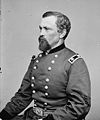 |
Kautz, August Valentin August Kautz August Valentine Kautz was a German-American soldier and Union Army cavalry officer during the American Civil War. He was the author of several army manuals on duties and customs eventually adopted by the U.S. military.-Early life and career:Born in Ispringen, Baden, Germany, Kautz immigrated with... |
Captain, USA (May, 1861) Brigadier General, USV (May 7, 1864) |
Major General, USA (March 13, 1865) Major General, USV (March 13, 1865) |
USMA, 1852 Commissioner, Lincoln assassination trial Abraham Lincoln assassination The assassination of United States President Abraham Lincoln took place on Good Friday, April 14, 1865, as the American Civil War was drawing to a close. The assassination occurred five days after the commanding General of the Army of Northern Virginia, Robert E. Lee, and his battered Army of... |
|||
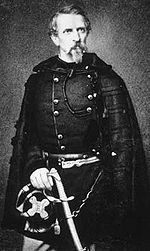 |
Kearny, Philip Philip Kearny Philip Kearny, Jr., was a United States Army officer, notable for his leadership in the Mexican-American War and American Civil War. He was killed in action in the 1862 Battle of Chantilly.-Early life and career:... |
Brigadier General, USV (May 17, 1861) |
KIA, Battle of Chantilly Battle of Chantilly The Battle of Chantilly took place on September 1, 1862, in Fairfax County, Virginia, as the concluding battle of the Northern Virginia Campaign of the American Civil War. Thomas J... (September 1, 1862) |
||||
 |
Keifer, Joseph Warren J. Warren Keifer Joseph Warren Keifer was a brigadier general in the Union Army during the American Civil War and a prominent U.S. politician during the 1880s. He served in the United States House of Representatives as a Republican from Ohio from 1877 to 1885 and from 1905 to 1911... |
Colonel, USV | Major General, USV (April 9, 1865) |
U.S. Congressman from Ohio Ohio Ohio is a Midwestern state in the United States. The 34th largest state by area in the U.S.,it is the 7th‑most populous with over 11.5 million residents, containing several major American cities and seven metropolitan areas with populations of 500,000 or more.The state's capital is Columbus... (1877-1885, 1905-1911) Speaker of the House Speaker of the United States House of Representatives The Speaker of the United States House of Representatives, or Speaker of the House, is the presiding officer of the United States House of Representatives... (1881-1883) |
|||
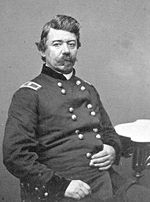 |
Keim, William High William High Keim William High Keim was a Republican member of the U.S. House of Representatives from Pennsylvania, as well as a general in the Union Army during the American Civil War.-Early life and career:... |
Brigadier General, USV (September 20, 1861) |
Died of illness, May 18, 1862 | ||||
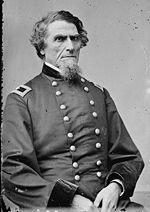 |
Kelley, Benjamin Franklin Benjamin Franklin Kelley Benjamin Franklin Kelley was an American soldier who served as a brigadier general in the Union Army during the American Civil War. He played a prominent role in several military campaigns in West Virginia and Maryland.... |
Brigadier General, USV (May 17, 1861) |
Major General, USV (August 5, 1864) |
||||
| Kenly, John Reese John Reese Kenly John Reese Kenly was an American lawyer, and a Union general in the American Civil War.-Biography:... |
Brigadier General, USV (August 22, 1862) |
Major General, USV (March 13, 1865) |
|||||
| Kennedy, Robert Patterson Robert P. Kennedy Robert Patterson Kennedy was a U.S. Representative from Ohio, as well as an officer in the Union Army during the American Civil War.-Biography:... |
Colonel, USV (April 14, 1865) |
Brigadier General, USV (March 13, 1865) |
U.S. Congressman from Ohio Ohio Ohio is a Midwestern state in the United States. The 34th largest state by area in the U.S.,it is the 7th‑most populous with over 11.5 million residents, containing several major American cities and seven metropolitan areas with populations of 500,000 or more.The state's capital is Columbus... (1887-1891) |
||||
| Ketcham, John H. John H. Ketcham John Henry Ketcham was a United States Representative from New York for over 33 years. He also served as a general in the Union Army during the American Civil War.-Biography:... |
Brigadier General, USV (October 23, 1865) |
Major General, USV (March 13, 1865) |
U.S. Congressman from New York New York New York is a state in the Northeastern region of the United States. It is the nation's third most populous state. New York is bordered by New Jersey and Pennsylvania to the south, and by Connecticut, Massachusetts and Vermont to the east... (1865-1873, 1877-1893, 1897-1906) |
||||
| Ketchum, William Scott William Scott Ketchum William Scott Ketchum , U. S. Army officer before and during the American Civil War.William Scott Ketchum was born on July 7, 1813 in Norwalk, Connecticut. Graduated from the United States Military Academy, at West Point, New York in 1834. He served in the Seminole Wars and on the Western... |
Colonel, USA (1864) Brigadier General, USV (February 3, 1862) |
Major General, USA (March 13, 1865) |
USMA, 1834 | ||||
 |
Keyes, Erasmus Darwin Erasmus D. Keyes Erasmus Darwin Keyes was a businessman, banker, and military general, noted for leading the IV Corps of the Union Army of the Potomac during the first half of the American Civil War.-Early life and career:... |
Colonel, USA (1861) Major General, USV (May 5, 1862) |
Brigadier General, USA | USMA, 1832 Resigned, May 6, 1864 |
|||
| Kiernan, James Lawlor | Brigadier General, USV (August 1, 1863) |
Resigned August 3, 1864 | |||||
 |
Kilpatrick, Hugh Judson Hugh Judson Kilpatrick Hugh Judson Kilpatrick was an officer in the Union Army during the American Civil War, achieving the rank of brevet major general. He was later the United States Minister to Chile, and a failed political candidate for the U.S... |
Major General, USV (June 18, 1865) |
Major General, USA (March 13, 1865) |
USMA, 1861 U.S. minister to Chile United States Ambassador to Chile The following is a list of Ambassadors that the United States has sent to Chile. The current title given by the United States State Department to this position is Ambassador Extraordinary and Minister Plenipotentiary.-See also:*Chile – United States relations... (1866-1870, 1881) |
|||
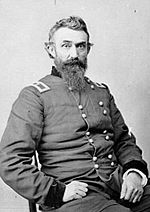 |
Kimball, Nathan Nathan Kimball Nathan Kimball was a physician, politician, postmaster, and military officer, serving as a general in the Union army during the American Civil War... |
Brigadier General, USV (April 16, 1862) |
Major General, USV (February 1, 1865) |
||||
| King, John Haskell | Colonel, USA (1865) Brigadier General, USV (November 29, 1862) |
Major General, USA (March 13, 1865) Major General, USV (May 31, 1865) |
|||||
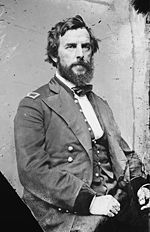 |
King, Rufus | Brigadier General, USV (May 17, 1861) |
USMA, 1833 Resigned October 1863 U.S. minister to the Papal States Papal States The Papal State, State of the Church, or Pontifical States were among the major historical states of Italy from roughly the 6th century until the Italian peninsula was unified in 1861 by the Kingdom of Piedmont-Sardinia .The Papal States comprised territories under... (1863-1867) Appointed minister in 1861, took a leave of absence Leave of absence Leave of absence is a term used to describe a period of time that one is to be away from his/her primary job, while maintaining the status of employee... to join the Army |
||||
| Kirby, Dennis Thomas | Lieutenant Colonel, USV | Brigadier General, USV (March 13, 1865) |
CMOH, Siege of Vicksburg (May 22, 1863) | ||||
| Kirby, Edmund Edmund Kirby (army officer) Edmund Kirby was a US Army officer who was killed in the American Civil War.He was born in Brownville, New York to Colonel Edmund Kirby, an army paymaster, and Eliza Brown, a daughter of US major general Jacob Brown. Through his father he was a cousin of Confederate general Edmund Kirby Smith... |
First Lieutenant, USA (1861) Brigadier General, USV (May 28, 1863) |
USMA, 1861 DOW, Battle of Fredericksburg Battle of Fredericksburg The Battle of Fredericksburg was fought December 11–15, 1862, in and around Fredericksburg, Virginia, between General Robert E. Lee's Confederate Army of Northern Virginia and the Union Army of the Potomac, commanded by Maj. Gen. Ambrose E. Burnside... (w. May 3, 1863, d. May 28, 1863) |
|||||
| Kirk, Edward Needles Edward N. Kirk Edward Needles Kirk was a Quaker school teacher, attorney, and then a brigadier general in the Union Army during the American Civil War.-Early life and career:... |
Brigadier General, USV (November 29, 1862) |
DOW, Battle of Stones River Battle of Stones River The Battle of Stones River or Second Battle of Murfreesboro , was fought from December 31, 1862, to January 2, 1863, in Middle Tennessee, as the culmination of the Stones River Campaign in the Western Theater of the American Civil War... (w. December 31, 1862, d. July 21, 1863) |
|||||
| Kitching, John Howard J. Howard Kitching John Howard Kitching , often referred to as J. Howard Kitching, was an officer in the Union Army during the American Civil War. He served in the cavalry, artillery and infantry in the Army of the Potomac and Army of the Shenandoah... |
Colonel, USV (April 26, 1863) |
Brigadier General, USV (August 1, 1864) |
DOW, Battle of Cedar Creek Battle of Cedar Creek The Battle of Cedar Creek, or Battle of Belle Grove, October 19, 1864, was one of the final, and most decisive, battles in the Valley Campaigns of 1864 during the American Civil War. The final Confederate invasion of the North, led by Lt. Gen. Jubal A. Early, was effectively ended... (w. October 19, 1864, d. January 10, 1865) |
||||
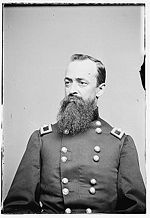 |
Knipe, Joseph Farmer | Brigadier General, USV (November 29, 1862) |
|||||
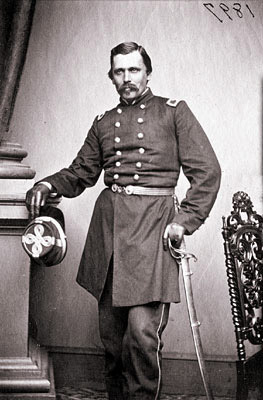 |
Krzyzanowski, Wladimir | Colonel, USV (1861) |
Brigadier General, USV (March 2, 1865) |
First cousin of Frédéric Chopin Frédéric Chopin Frédéric François Chopin was a Polish composer and virtuoso pianist. He is considered one of the great masters of Romantic music and has been called "the poet of the piano".... Appointment as Brigadier General, USV (November 29, 1862) expired March 4, 1863, but served at that rank most of the war |
L
| Image | Name | Substantive Rank | Brevet Brevet (military) In many of the world's military establishments, brevet referred to a warrant authorizing a commissioned officer to hold a higher rank temporarily, but usually without receiving the pay of that higher rank except when actually serving in that role. An officer so promoted may be referred to as being... Rank | Lander, Frederick West Frederick W. Lander Frederick West Lander was a transcontinental United States explorer, general in the Union Army during the American Civil War, and a prolific poet.-Birth and early years:... | Brigadier General, USV (May 17, 1861) |
Died of illness, March 2, 1862 | |
|---|---|---|---|---|---|---|---|
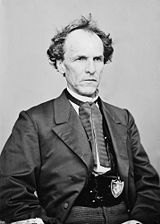 |
Lane, James H. | Brigadier General, USV (December 18, 1861) |
U.S. Congressman from Indiana Indiana Indiana is a US state, admitted to the United States as the 19th on December 11, 1816. It is located in the Midwestern United States and Great Lakes Region. With 6,483,802 residents, the state is ranked 15th in population and 16th in population density. Indiana is ranked 38th in land area and is... (1853-1855) U.S. Senator from Kansas Kansas Kansas is a US state located in the Midwestern United States. It is named after the Kansas River which flows through it, which in turn was named after the Kansa Native American tribe, which inhabited the area. The tribe's name is often said to mean "people of the wind" or "people of the south... (1861-1866) Commission cancelled March 21, 1862 Reinstated April 11, 1862 |
||||
| Latham, George Robert George R. Latham George Robert Latham was a nineteenth century politician and lawyer from Virginia and West Virginia and colonel of Company B of the 2nd West Virginia Volunteer Infantry during the Civil War.-Biography:... |
Colonel, USV | Brigadier General, USV (March 13, 1865) |
U.S. Congressman from West Virginia West Virginia West Virginia is a state in the Appalachian and Southeastern regions of the United States, bordered by Virginia to the southeast, Kentucky to the southwest, Ohio to the northwest, Pennsylvania to the northeast and Maryland to the east... (1865-1867) |
||||
| Lauman, Jacob G. | Brigadier General, USV (March 21, 1862) |
Major General, USV (March 13,1865) |
Relieved of duty, July 15, 1863 | ||||
| Lawler, Michael Kelly Michael Kelly Lawler Michael Kelly Lawler was an officer in the United States Army in both the Mexican War and the Civil War... |
Brigadier General, USV (November 29, 1862) |
Major General, USV (March 13, 1865) |
|||||
| Lawrence, Albert Gallatin | Captain, USV | Brigadier General, USV (March 25, 1865) |
U.S. minister to Costa Rica United States Ambassador to Costa Rica The following is a list of United States Ambassadors, or other Chiefs of Mission, to Costa Rica. The title given by the United States State Department to this position is currently Ambassador Extraordinary and Minister Plenipotentiary.-See also:... (1867-1868) Son-in-law of Brigadier General Joseph Pannell Taylor Joseph Pannell Taylor Joseph Pannell Taylor was a career United States Army officer and Union general in the American Civil War.-Early life:... and President Zachary Taylor Zachary Taylor Zachary Taylor was the 12th President of the United States and an American military leader. Initially uninterested in politics, Taylor nonetheless ran as a Whig in the 1848 presidential election, defeating Lewis Cass... Brother-in-law of John McLean Taylor |
||||
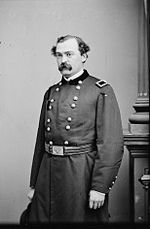 |
Ledlie, James H. James H. Ledlie James Hewett Ledlie was a civil engineer for American railroads and a general in the Union Army during the American Civil War. He is best known for his dereliction of duty at the Battle of the Crater during the Siege of Petersburg.-Early life:Ledlie was born in Utica, New York... |
Brigadier General, USV (October 27, 1863) |
Original appointment as Brigadier General, USV (December 24, 1862) expired March 4, 1863 Relieved of command, July, 1864 Resigned January 23, 1865 |
||||
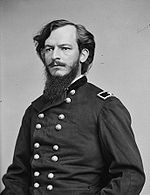 |
Lee, Albert Lindley Albert Lindley Lee Albert Lindley Lee was a lawyer, Kansas State Supreme Court Judge, and Union general in the American Civil War.-Early life and career:... |
Brigadier General, USV (November 29, 1862) |
Resigned May 4, 1865 | ||||
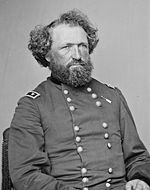 |
Leggett, Mortimer Dormer Mortimer Dormer Leggett Mortimer Dormer Leggett was a lawyer, school administrator, professor, and major general in the Union Army during the American Civil War.-Early life:... |
Major General, USV (August 21, 1865) |
|||||
| Lightburn, Joseph Andrew Jackson Joseph Andrew Jackson Lightburn Joseph Andrew Jackson Lightburn was a farmer, soldier and Baptist Minister, most famous for his service as a Union general during the American Civil War.-Early life:... |
Brigadier General, USV (March 16, 1863) |
||||||
| Littlejohn, DeWitt Clinton | Colonel, USV | Brigadier General, USV (March 13, 1865) |
U.S. Congressman from New York New York New York is a state in the Northeastern region of the United States. It is the nation's third most populous state. New York is bordered by New Jersey and Pennsylvania to the south, and by Connecticut, Massachusetts and Vermont to the east... (1863-1865) |
||||
| Lockwood, Henry Hayes Henry Hayes Lockwood Henry Hayes Lockwood was an American soldier and authority on military tactics.-Early life:Lockwood was born in Kent County, Delaware, Delaware. He graduated from the United States Military Academy in 1836, served in the Seminole Wars as a lieutenant in the Second Artillery, and resigned his... |
Brigadier General, USV (August 8, 1861) |
USMA, 1836 | |||||
 |
Logan, John Alexander "Black Jack" John A. Logan John Alexander Logan was an American soldier and political leader. He served in the Mexican-American War and was a general in the Union Army in the American Civil War. He served the state of Illinois as a state senator, congressman and senator and was an unsuccessful candidate for Vice President... |
Major General, USV (November 29, 1862) |
Commander-in-chief, GAR (1868-1871) U.S. Congressman from Illinois Illinois Illinois is the fifth-most populous state of the United States of America, and is often noted for being a microcosm of the entire country. With Chicago in the northeast, small industrial cities and great agricultural productivity in central and northern Illinois, and natural resources like coal,... (1859-1861, 1867-1871) U.S. Senator from Illinois Illinois Illinois is the fifth-most populous state of the United States of America, and is often noted for being a microcosm of the entire country. With Chicago in the northeast, small industrial cities and great agricultural productivity in central and northern Illinois, and natural resources like coal,... (1871-1877, 1879-1886) |
||||
| Long, Eli Eli Long Eli Long was a General in the Union Army during the American Civil War.-Early life:Long was born on June 16, 1837 in Woodford County, Kentucky, and graduated from the Kentucky Military Institute in 1855. In 1856, he was appointed second lieutenant in the 1st U.S... |
Captain, USA (May 24, 1861) Brigadier General, USV (August 18, 1864) |
Major General, USA Major General, USV |
|||||
| Love, George Maltby George M. Love George Maltby Love was a colonel in the Union Army and a Medal of Honor recipient for his actions in the American Civil War.-Civil War:Civil War Union Brevet Brigadier General, Congressional Medal of Honor Recipient... |
Colonel, USV | Brigadier General, USV (March 7, 1865) |
CMOH, Battle of Cedar Creek Battle of Cedar Creek The Battle of Cedar Creek, or Battle of Belle Grove, October 19, 1864, was one of the final, and most decisive, battles in the Valley Campaigns of 1864 during the American Civil War. The final Confederate invasion of the North, led by Lt. Gen. Jubal A. Early, was effectively ended... (October 19, 1864) |
||||
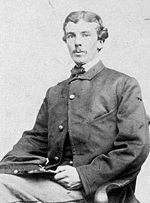 |
Lowell, Charles Russell Charles Russell Lowell Charles Russell Lowell, Jr. was a railroad executive, foundryman, and general in the Union Army during the American Civil War. He was mortally wounded at the Battle of Cedar Creek and was mourned by a number of leading generals... |
Brigadier General, USV (October 19, 1864) |
KIA, Battle of Cedar Creek Battle of Cedar Creek The Battle of Cedar Creek, or Battle of Belle Grove, October 19, 1864, was one of the final, and most decisive, battles in the Valley Campaigns of 1864 during the American Civil War. The final Confederate invasion of the North, led by Lt. Gen. Jubal A. Early, was effectively ended... (October 19, 1864) |
||||
| Lucas, Thomas John | Brigadier General, USV (November 10, 1864) |
Major General, USV (March 26, 1865) |
|||||
 |
Lyon, Nathaniel Nathaniel Lyon Nathaniel Lyon was the first Union general to be killed in the American Civil War and is noted for his actions in the state of Missouri at the beginning of the conflict.... |
Captain, USA Brigadier General, USV (May 17, 1861) |
USMA, 1841 KIA, Battle of Wilson's Creek Battle of Wilson's Creek The Battle of Wilson's Creek, also known as the Battle of Oak Hills, was fought on August 10, 1861, near Springfield, Missouri, between Union forces and the Missouri State Guard, early in the American Civil War. It was the first major battle of the war west of the Mississippi River and is sometimes... (August 10, 1861) First Union general killed during the war Received the Thanks of Congress Thanks of Congress The Thanks of Congress are a series of formal resolutions passed by the United States Congress originally to extend the government's formal thanks for significant victories or impressive actions by American military commanders and their troops. Although it began during the American Revolutionary... (December 24, 1861) |
||||
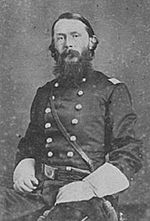 |
Lytle, William Haines William Haines Lytle William Haines Lytle was a politician in Ohio, renowned poet, and military officer in the United States Army during both the Mexican-American War and American Civil War, where he was killed in action as a brigadier general.-Biography:Lytle was born in Cincinnati, Ohio, the scion of a leading area... |
Brigadier General, USV (November 29, 1862) |
KIA, Battle of Chickamauga Battle of Chickamauga The Battle of Chickamauga, fought September 19–20, 1863, marked the end of a Union offensive in southeastern Tennessee and northwestern Georgia called the Chickamauga Campaign... (September 20, 1863) |
M
| Image | Name | Substantive Rank | Brevet Brevet (military) In many of the world's military establishments, brevet referred to a warrant authorizing a commissioned officer to hold a higher rank temporarily, but usually without receiving the pay of that higher rank except when actually serving in that role. An officer so promoted may be referred to as being... Rank | McArthur, John John McArthur John McArthur was a Union general during the American Civil War. McArthur became one of the ablest Federal commanders in the Western Theater.-Early life:... | Brigadier General, USV (March 21, 1862) |
Major General, USV | |
|---|---|---|---|---|---|---|---|
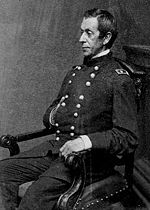 |
McCall, George Archibald George A. McCall George Archibald McCall was a United States Army officer who became a brigadier general and prisoner of war during the American Civil War. He was also a naturalist.-Biography:... |
Brigadier General, USV (May 15, 1861) |
USMA, 1822 Resigned March 31, 1863 |
||||
| McCleery, James James McCleery James McCleery was a U.S. Representative from Louisiana.Born in Mecca Township, Trumbull County, Ohio, McCleery attended Oberlin College in 1859 and 1860.He served in the Union Army during the American Civil War... |
Major, USV (1865) |
Brigadier General, USV (March 13, 1865) |
U.S. Congressman from Louisiana Louisiana Louisiana is a state located in the southern region of the United States of America. Its capital is Baton Rouge and largest city is New Orleans. Louisiana is the only state in the U.S. with political subdivisions termed parishes, which are local governments equivalent to counties... (1871) |
||||
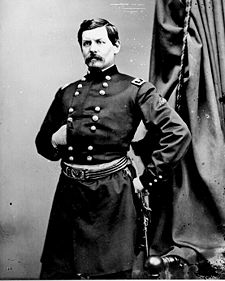 |
McClellan, George Brinton George B. McClellan George Brinton McClellan was a major general during the American Civil War. He organized the famous Army of the Potomac and served briefly as the general-in-chief of the Union Army. Early in the war, McClellan played an important role in raising a well-trained and organized army for the Union... |
Major General, USA (May 14, 1861) |
USMA, 1846 General-in-Chief Commanding General of the United States Army Prior to the institution of the Chief of Staff of the United States Army in 1903, there was generally a single senior-most officer in the army. From 1783, he was known simply as the Senior Officer of the United States Army, but in 1821, the title was changed to Commanding General of the United... (November 1, 1861-July 22, 1862) Relieved of duty November 7, 1862 Resigned November 8, 1864 Governor of New Jersey Governor of New Jersey The Office of the Governor of New Jersey is the executive branch for the U.S. state of New Jersey. The office of Governor is an elected position, for which elected officials serve four year terms. While individual politicians may serve as many terms as they can be elected to, Governors cannot be... (1878-1881) |
||||
 |
McClernand, John Alexander John Alexander McClernand John Alexander McClernand was an American lawyer and politician, and a Union general in the American Civil War. He was a classic case of the politician-in-uniform coming into conflict with career Army officers, graduates of the United States Military Academy. He was a prominent Democratic... |
Major General, USV (May 21, 1862) |
Resigned November 30, 1864 U.S. Congressman from Illinois Illinois Illinois is the fifth-most populous state of the United States of America, and is often noted for being a microcosm of the entire country. With Chicago in the northeast, small industrial cities and great agricultural productivity in central and northern Illinois, and natural resources like coal,... (1843-1851, 1859-1861) |
||||
| McConihe, John | Colonel, USV | Brigadier General, USV (June 1, 1864) |
KIA, Battle of Cold Harbor Battle of Cold Harbor The Battle of Cold Harbor was fought from May 31 to June 12, 1864 . It was one of the final battles of Union Lt. Gen. Ulysses S. Grant's Overland Campaign during the American Civil War, and is remembered as one of American history's bloodiest, most lopsided battles... (June 1, 1864) |
||||
 |
McCook, Alexander McDowell Alexander McDowell McCook Alexander McDowell McCook was a career United States Army officer and a Union general in the American Civil War.-Early life:... |
Major General, USV (July 17, 1862) |
Highest-ranking of the fourteen "Fighting McCooks Fighting McCooks The Fighting McCooks were members of a family of Ohioans who reached prominence as officers in the Union Army during the American Civil War. Two brothers, Daniel and John McCook, and thirteen of their sons were actively involved in the army, making the family one of the most prolific in American... " Brother of Daniel McCook, Jr. Daniel McCook, Jr. Daniel McCook, Jr. , one of the famed Fighting McCooks, was a brigade commander in the Union Army who was mortally wounded in the Battle of Kennesaw Mountain, Georgia, during the American Civil War.-Early life:... , Edwin Stanton McCook Edwin Stanton McCook Edwin Stanton McCook was a Union Army general during the American Civil War and a postbellum politician in the Dakota Territory. He was assassinated in office while serving as acting governor.-Biography:... , and Robert Latimer McCook Robert Latimer McCook Robert Latimer McCook was a general in the Union Army during the American Civil War who was killed by Confederate partisans in Alabama.-Birth and early years:... Cousin of Anson George McCook Anson G. McCook Anson George McCook was a brevet brigadier general in the Union Army during the American Civil War, attorney, and three-term postbellum U.S. Congressman from New York... and Edward Moody McCook Edward M. McCook Edward Moody McCook was a lawyer, politician, distinguished Union cavalry general in the American Civil War, American diplomat, and Governor of the Territory of Colorado. He was a member of the famed "Fighting McCook" family of Ohio... |
||||
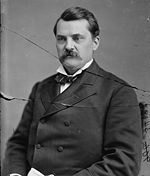 |
McCook, Anson George Anson G. McCook Anson George McCook was a brevet brigadier general in the Union Army during the American Civil War, attorney, and three-term postbellum U.S. Congressman from New York... |
Colonel, USV | Brigadier General, USV (March 13, 1865) |
U.S. Congressman from New York New York New York is a state in the Northeastern region of the United States. It is the nation's third most populous state. New York is bordered by New Jersey and Pennsylvania to the south, and by Connecticut, Massachusetts and Vermont to the east... (1877-1883) Secretary of the United States Senate Secretary of the United States Senate The Secretary of the Senate is an elected officer of the United States Senate. The Secretary supervises an extensive array of offices and services to expedite the day-to-day operations of that body... (1883-1893) Brother of Edward Moody McCook Edward M. McCook Edward Moody McCook was a lawyer, politician, distinguished Union cavalry general in the American Civil War, American diplomat, and Governor of the Territory of Colorado. He was a member of the famed "Fighting McCook" family of Ohio... Cousin of Alexander McDowell McCook Alexander McDowell McCook Alexander McDowell McCook was a career United States Army officer and a Union general in the American Civil War.-Early life:... , Daniel McCook, Jr. Daniel McCook, Jr. Daniel McCook, Jr. , one of the famed Fighting McCooks, was a brigade commander in the Union Army who was mortally wounded in the Battle of Kennesaw Mountain, Georgia, during the American Civil War.-Early life:... , Edwin Stanton McCook Edwin Stanton McCook Edwin Stanton McCook was a Union Army general during the American Civil War and a postbellum politician in the Dakota Territory. He was assassinated in office while serving as acting governor.-Biography:... , and Robert Latimer McCook Robert Latimer McCook Robert Latimer McCook was a general in the Union Army during the American Civil War who was killed by Confederate partisans in Alabama.-Birth and early years:... |
|||
| McCook, Daniel, Jr. Daniel McCook, Jr. Daniel McCook, Jr. , one of the famed Fighting McCooks, was a brigade commander in the Union Army who was mortally wounded in the Battle of Kennesaw Mountain, Georgia, during the American Civil War.-Early life:... |
Brigadier General, USV (July 16, 1864) |
DOW, Battle of Kennesaw Mountain Battle of Kennesaw Mountain The Battle of Kennesaw Mountain was fought on June 27, 1864, during the Atlanta Campaign of the American Civil War. It was the most significant frontal assault launched by Union Maj. Gen. William T. Sherman against the Confederate Army of Tennessee under Gen. Joseph E... (w. June 27, 1864, d. July 17, 1864) Brother of Alexander McDowell McCook Alexander McDowell McCook Alexander McDowell McCook was a career United States Army officer and a Union general in the American Civil War.-Early life:... , Edwin Stanton McCook Edwin Stanton McCook Edwin Stanton McCook was a Union Army general during the American Civil War and a postbellum politician in the Dakota Territory. He was assassinated in office while serving as acting governor.-Biography:... , and Robert Latimer McCook Robert Latimer McCook Robert Latimer McCook was a general in the Union Army during the American Civil War who was killed by Confederate partisans in Alabama.-Birth and early years:... Cousin of Anson George McCook Anson G. McCook Anson George McCook was a brevet brigadier general in the Union Army during the American Civil War, attorney, and three-term postbellum U.S. Congressman from New York... and Edward Moody McCook Edward M. McCook Edward Moody McCook was a lawyer, politician, distinguished Union cavalry general in the American Civil War, American diplomat, and Governor of the Territory of Colorado. He was a member of the famed "Fighting McCook" family of Ohio... |
|||||
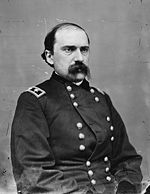 |
McCook, Edward Moody Edward M. McCook Edward Moody McCook was a lawyer, politician, distinguished Union cavalry general in the American Civil War, American diplomat, and Governor of the Territory of Colorado. He was a member of the famed "Fighting McCook" family of Ohio... |
First Lieutenant, USA (May 8, 1861) Brigadier General, USV (April 27, 1864) |
Brigadier General, USA Major General, USV |
U.S. minister to Hawai'i United States Minister to Hawaii The Minister to Hawaii was an office of the United States Department of State to the Kingdom of Hawaii during the period of 1810 to 1898. Appointed by the President of the United States with the consent of Congress, the Minister to Hawaii was equivalent in rank to the present-day ambassador of the... (1866-1868) Territorial Governor of Colorado Governor of Colorado The Governor of Colorado is the head of the executive branch of Colorado's government and the commander-in-chief of the state's military forces. The governor has a duty to enforce state laws, and the power to either approve or veto bills passed by the Colorado General Assembly, to convene the... (1869-1873, 1874-1875) Brother of Anson George McCook Anson G. McCook Anson George McCook was a brevet brigadier general in the Union Army during the American Civil War, attorney, and three-term postbellum U.S. Congressman from New York... Cousin of Alexander McDowell McCook Alexander McDowell McCook Alexander McDowell McCook was a career United States Army officer and a Union general in the American Civil War.-Early life:... , Daniel McCook, Jr. Daniel McCook, Jr. Daniel McCook, Jr. , one of the famed Fighting McCooks, was a brigade commander in the Union Army who was mortally wounded in the Battle of Kennesaw Mountain, Georgia, during the American Civil War.-Early life:... , Edwin Stanton McCook Edwin Stanton McCook Edwin Stanton McCook was a Union Army general during the American Civil War and a postbellum politician in the Dakota Territory. He was assassinated in office while serving as acting governor.-Biography:... , and Robert Latimer McCook Robert Latimer McCook Robert Latimer McCook was a general in the Union Army during the American Civil War who was killed by Confederate partisans in Alabama.-Birth and early years:... |
|||
| McCook, Edwin Stanton Edwin Stanton McCook Edwin Stanton McCook was a Union Army general during the American Civil War and a postbellum politician in the Dakota Territory. He was assassinated in office while serving as acting governor.-Biography:... |
Colonel, USV | Major General, USV (March 13, 1865) |
Brother of Alexander McDowell McCook Alexander McDowell McCook Alexander McDowell McCook was a career United States Army officer and a Union general in the American Civil War.-Early life:... , Daniel McCook, Jr. Daniel McCook, Jr. Daniel McCook, Jr. , one of the famed Fighting McCooks, was a brigade commander in the Union Army who was mortally wounded in the Battle of Kennesaw Mountain, Georgia, during the American Civil War.-Early life:... , and Robert Latimer McCook Robert Latimer McCook Robert Latimer McCook was a general in the Union Army during the American Civil War who was killed by Confederate partisans in Alabama.-Birth and early years:... Cousin of Anson George McCook Anson G. McCook Anson George McCook was a brevet brigadier general in the Union Army during the American Civil War, attorney, and three-term postbellum U.S. Congressman from New York... and Edward Moody McCook Edward M. McCook Edward Moody McCook was a lawyer, politician, distinguished Union cavalry general in the American Civil War, American diplomat, and Governor of the Territory of Colorado. He was a member of the famed "Fighting McCook" family of Ohio... |
||||
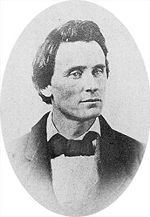 |
McCook, Robert Latimer Robert Latimer McCook Robert Latimer McCook was a general in the Union Army during the American Civil War who was killed by Confederate partisans in Alabama.-Birth and early years:... |
Brigadier General, USV (March 21, 1862) |
DOW sustained near Huntsville, Alabama Huntsville, Alabama Huntsville is a city located primarily in Madison County in the central part of the far northern region of the U.S. state of Alabama. Huntsville is the county seat of Madison County. The city extends west into neighboring Limestone County. Huntsville's population was 180,105 as of the 2010 Census.... (w. August 5, 1862, d. August 6, 1862) Brother of Alexander McDowell McCook Alexander McDowell McCook Alexander McDowell McCook was a career United States Army officer and a Union general in the American Civil War.-Early life:... , Daniel McCook, Jr. Daniel McCook, Jr. Daniel McCook, Jr. , one of the famed Fighting McCooks, was a brigade commander in the Union Army who was mortally wounded in the Battle of Kennesaw Mountain, Georgia, during the American Civil War.-Early life:... , and Edwin Stanton McCook Edwin Stanton McCook Edwin Stanton McCook was a Union Army general during the American Civil War and a postbellum politician in the Dakota Territory. He was assassinated in office while serving as acting governor.-Biography:... Cousin of Anson George McCook Anson G. McCook Anson George McCook was a brevet brigadier general in the Union Army during the American Civil War, attorney, and three-term postbellum U.S. Congressman from New York... and Edward Moody McCook Edward M. McCook Edward Moody McCook was a lawyer, politician, distinguished Union cavalry general in the American Civil War, American diplomat, and Governor of the Territory of Colorado. He was a member of the famed "Fighting McCook" family of Ohio... |
||||
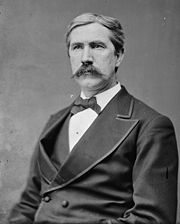 |
MacDougall, Clinton Dugald Clinton D. MacDougall Clinton Dugald MacDougall was a United States Representative from New York.-Biography:Born near Glasgow, Scotland, he immigrated to Canada in 1842 with his parents, who later settled in Auburn, New York. He pursued an academic course, studied law, and engaged in banking from 1856 to 1869... |
Colonel, USV (January 3, 1863) |
Brigadier General, USV (February 26, 1865) |
U.S. Congressman from New York New York New York is a state in the Northeastern region of the United States. It is the nation's third most populous state. New York is bordered by New Jersey and Pennsylvania to the south, and by Connecticut, Massachusetts and Vermont to the east... (1873-1877) |
|||
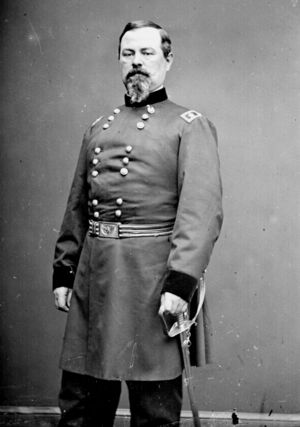 |
McDowell, Irvin Irvin McDowell Irvin McDowell was a career American army officer. He is best known for his defeat in the First Battle of Bull Run, the first large-scale battle of the American Civil War.-Early life:... |
Brigadier General, USA (May 14, 1861) Major General, USV (March 14, 1862) |
USMA, 1838 | ||||
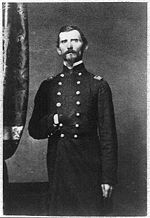 |
McGinnis, George Francis George Francis McGinnis George Francis McGinnins was a volunteer soldier during the Mexican-American War and a Union general during the American Civil War.-Early life:... |
Brigadier General, USV (November 29, 1862) |
|||||
| McIntosh, John Baillie John Baillie McIntosh John Baillie McIntosh , although born in Florida, served as a Union Army brigadier general in the American Civil War. His brother, James M... |
Second Lieutenant, USA (1861) Brigadier General, USV (July 21, 1864) |
Major General, USA (March 13, 1865) Major General, USV (March 13, 1865) |
Brother of General James McQueen McIntosh James M. McIntosh James McQueen McIntosh was a career American soldier who served as a brigadier general in the Confederate Army during the Civil War... , CSA |
||||
| McKean, Thomas Jefferson Thomas J. McKean Thomas Jefferson McKean was an American engineer, soldier, politician, and farmer. A West Point graduate, he fought in the U.S. Army during the Seminole Wars, in the Mexican–American War, and he served as a general in the Union Army during the American Civil War.-Early life and career:Thomas J... |
Brigadier General, USV (November 21, 1861) |
Major General, USV (March 13, 1865) |
USMA, 1831 | ||||
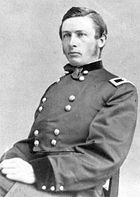 |
Mackenzie, Ranald Slidell Ranald S. Mackenzie Ranald Slidell Mackenzie was a career United States Army officer and general in the Union Army during the American Civil War, described by General Ulysses S. Grant as its most promising young officer... |
Captain, USA Brigadier General, USV (1864) |
Brigadier General, USA Major General, USV |
USMA, 1862 Nephew of Confederate diplomat John Slidell John Slidell John Slidell was an American politician, lawyer and businessman. A native of New York, Slidell moved to Louisiana as a young man and became a staunch defender of southern rights as a U.S. Representative and Senator... |
|||
| McKinstry, Justus | Brigadier General, USV (September 2, 1861) |
USMA, 1838 Dismissed from service for corruption, January 28, 1863 |
|||||
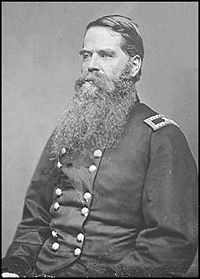 |
McLean, Nathaniel Collins Nathaniel McLean Nathaniel Collins McLean , was a lawyer, farmer, and Union general during the American Civil War.-Early life and career:... |
Brigadier General, USV (November 29, 1862) |
Resigned April 20, 1865 | ||||
| McMahon, Martin Thomas Martin T. McMahon Martin Thomas McMahon was an American jurist and a Union Army general during the American Civil War. He was awarded the United States military's highest decoration, the Medal of Honor, for his actions at the Battle of White Oak Swamp. After the war, he held various legal and judicial positions in... |
Colonel, USV | Major General, USV (March 13, 1865) |
CMOH, Battle of White Oak Swamp Battle of White Oak Swamp The Battle of White Oak Swamp took place on June 30, 1862 in Henrico County, Virginia as part of the Seven Days Battles of the American Civil War. As the Union Army of the Potomac retreated southeast toward the James River, its rearguard under Maj. Gen. William B. Franklin stopped Maj. Gen. Thomas J... (June 30, 1862) U.S. minister to Paraguay United States Ambassador to Paraguay The following is a list of United States Ambassadors, or other chiefs of mission, to Paraguay. The title given by the United States State Department to this position is currently Ambassador Extraordinary and Minister Plenipotentiary.-See also:... (1868-1869) |
||||
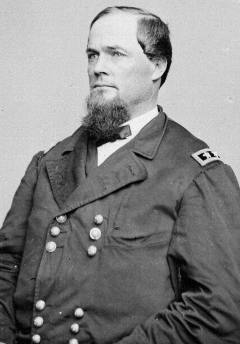 |
McMillan, James Winning James W. McMillan James Winning McMillan was an American soldier who fought during the Mexican–American War and served as a Union Army general during the American Civil War.-Early life and career:... |
Brigadier General, USV (November 29, 1862) |
Major General, USV (March 5, 1865) |
Resigned May 15, 1865 | |||
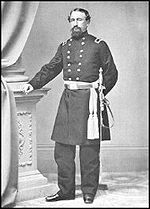 |
McNeil, John John McNeil John McNeil was a general in the Union Army during the American Civil War. He was most noted for his role in the Palmyra Massacre and other acts of alleged brutality.-Early life and career:... |
Brigadier General, USV (November 29, 1862) |
Major General, USV (April 12, 1865) |
Resigned April 12, 1865 | |||
| McNulta, John John McNulta John Mcnulta was a U.S. Representative from Illinois.Born in New York City, Mcnulta pursued an academic course.Visited the West Indies and Europe.... |
Colonel, USV | Brigadier General, USV (March 13, 1865) |
U.S. Congressman from Illinois Illinois Illinois is the fifth-most populous state of the United States of America, and is often noted for being a microcosm of the entire country. With Chicago in the northeast, small industrial cities and great agricultural productivity in central and northern Illinois, and natural resources like coal,... (1873-1875) |
||||
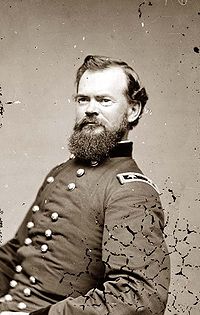 |
McPherson, James Birdseye James B. McPherson James Birdseye McPherson was a career United States Army officer who served as a General in the Union Army during the American Civil War... |
Brigadier General, USA (August 1, 1863) Major General, USV (October 8, 1862) |
USMA, 1853 KIA, Battle of Atlanta Battle of Atlanta The Battle of Atlanta was a battle of the Atlanta Campaign fought during the American Civil War on July 22, 1864, just southeast of Atlanta, Georgia. Continuing their summer campaign to seize the important rail and supply center of Atlanta, Union forces commanded by William T. Sherman overwhelmed... (July 22, 1864) Only Union Army commander to be killed in action |
||||
| Maltby, Jasper Adalmorn Jasper A. Maltby Jasper Adalmorn Maltby was a general in the Union Army during the American Civil War. He participated in two important campaigns in the Western Theater, including the Vicksburg Campaign in 1863... |
Brigadier General, USV (August 4, 1863) |
||||||
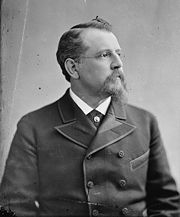 |
Manderson, Charles Frederick Charles F. Manderson Charles Frederick Manderson was a United States Senator from Nebraska from 1883 to 1895.-Biography:Born in Philadelphia, Pennsylvania, he attended school there and then moved to Canton, Ohio, in 1856, where he studied law... |
Colonel, USV | Brigadier General, USV (March 13, 1865) |
U.S. Senator from Nebraska Nebraska Nebraska is a state on the Great Plains of the Midwestern United States. The state's capital is Lincoln and its largest city is Omaha, on the Missouri River.... (1883-1895) |
|||
| Mansfield, Joseph King Fenno Joseph K. Mansfield Joseph King Fenno Mansfield was a career United States Army officer, civil engineer, and a Union general in the American Civil War, mortally wounded at the Battle of Antietam.-Early life:... |
Brigadier General, USA (May 6, 1861) Major General, USV (July 18, 1862) |
USMA, 1822 DOW, Battle of Antietam Battle of Antietam The Battle of Antietam , fought on September 17, 1862, near Sharpsburg, Maryland, and Antietam Creek, as part of the Maryland Campaign, was the first major battle in the American Civil War to take place on Northern soil. It was the bloodiest single-day battle in American history, with about 23,000... (w. September 17, 1862, d. September 18, 1862) |
|||||
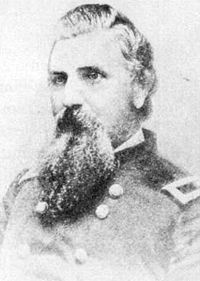 |
Manson, Mahlon Dickerson Mahlon Dickerson Manson Mahlon Dickerson Manson was a druggist, Indiana politician, and a Union general in the American Civil War.-Biography:... |
Brigadier General, USV (March 24, 1862) |
Resigned due to wounds, December 21, 1864 U.S. Congressman from Indiana Indiana Indiana is a US state, admitted to the United States as the 19th on December 11, 1816. It is located in the Midwestern United States and Great Lakes Region. With 6,483,802 residents, the state is ranked 15th in population and 16th in population density. Indiana is ranked 38th in land area and is... (1871-1873) |
||||
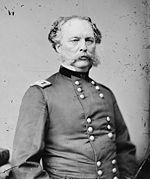 |
Marcy, Randolph Barnes Randolph B. Marcy Randolph Barnes Marcy was a career officer in the United States Army, achieving the rank of Brigadier General before retiring in 1881. Although beginning in 1861 his responsibilities were those of a brigadier general, the U.S... |
Colonel, USA (August 9, 1861) Brigadier General, USV (September 28, 1861) |
Major General, USA (March 13, 1865) Brigadier General, USA (March 13, 1865) |
USMA, 1832 Inspector General Inspector General An Inspector General is an investigative official in a civil or military organization. The plural of the term is Inspectors General.-Bangladesh:... , U.S. Army (1861-1881) Volunteer appointment expired March 4, 1863 Father-in-law of George Brinton McClellan George B. McClellan George Brinton McClellan was a major general during the American Civil War. He organized the famous Army of the Potomac and served briefly as the general-in-chief of the Union Army. Early in the war, McClellan played an important role in raising a well-trained and organized army for the Union... |
|||
| Marsh, Charles Carroll C. Carroll Marsh Charles Carroll Marsh was a Union Army officer during the American Civil War. He served with distinction early in the war at the battles of Fort Donelson and Shiloh. He is commonly referred to as "C. Carrol Marsh" in official reports.-Early life:... |
Brigadier General, USV (November 29, 1862) |
Appointment withrawn Resigned April 22, 1863 |
|||||
 |
Marston, Gilman | Brigadier General, USV (November 29, 1862) |
Resigned April 20, 1865 U.S. Congressman from New Hampshire New Hampshire New Hampshire is a state in the New England region of the northeastern United States of America. The state was named after the southern English county of Hampshire. It is bordered by Massachusetts to the south, Vermont to the west, Maine and the Atlantic Ocean to the east, and the Canadian... (1859-1863, 1865-1867) U.S. Senator from New Hampshire (1889) |
||||
| Martin, James Stewart | Colonel, USV (September 18, 1862) |
Brigadier General, USV (February 28, 1865) |
U.S. Congressman from Illinois Illinois Illinois is the fifth-most populous state of the United States of America, and is often noted for being a microcosm of the entire country. With Chicago in the northeast, small industrial cities and great agricultural productivity in central and northern Illinois, and natural resources like coal,... (1873-1875) |
||||
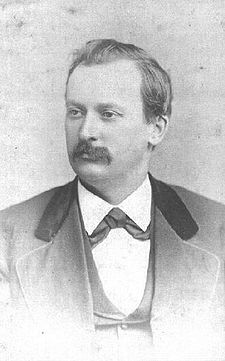 |
Martin, John Alexander John Martin (Governor of Kansas) John Alexander Martin was the tenth Governor of Kansas.Martin was born in Brownsville, Pennsylvania, a son of James and Jane Montgomery Martin. His father was a native of Maryland, and his mother a native of Pennsylvania. He was of Scots-Irish extraction, and the family was related to General... |
Colonel, USV (November 1, 1862) |
Brigadier General, USV (March 13, 1865) |
Mustered out November 17, 1864 Governor of Kansas Governor of Kansas The Governor of the State of Kansas is the head of state for the State of Kansas, United States. Under the Kansas Constitution, the Governor is also the head of government, serving as the chief executive of the Kansas executive branch, of the government of Kansas. The Governor is the... (1885-1889) |
|||
| Martindale, John Henry John H. Martindale John Henry Martindale was an American lawyer, Union Army general, and politician.-Early life:Martindale was born in Sandy Hill, Washington County, New York, the son of Congressman Henry C. Martindale and Minerva Hitchcock Martindale. He entered the United States Military Academy at West Point in... |
Brigadier General, USV (August 9, 1861) |
Major General, USV (March 13, 1865) |
USMA, 1835 Resigned September 13, 1864 |
||||
| Mason, John Sanford John S. Mason John Sanford Mason was a career officer in the United States Army who served as a general in the Union Army during the American Civil War.-Early life and career:... |
Major, USA (1864) Brigadier General, USV (November 29, 1862) |
Brigadier General, USA (1865) |
USMA, 1847 | ||||
| Matthies, Charles Leopold Charles L. Matthies Charles Leopold Matthies was a Prussian soldier, revolutionary and Union Army officer during the American Civil War, rising to the rank of brigadier general.-Biography:... (b. Matthies, Karl Leopold) |
Brigadier General, USV (November 29, 1862) |
First officer to muster a company Company (military unit) A company is a military unit, typically consisting of 80–225 soldiers and usually commanded by a Captain, Major or Commandant. Most companies are formed of three to five platoons although the exact number may vary by country, unit type, and structure... of volunteers for U.S. service (January 9, 1861) Resigned May 16, 1864 |
|||||
 |
Meade, George Gordon | Major General, USA (August 18, 1864) |
USMA, 1835 Received the Thanks of Congress Thanks of Congress The Thanks of Congress are a series of formal resolutions passed by the United States Congress originally to extend the government's formal thanks for significant victories or impressive actions by American military commanders and their troops. Although it began during the American Revolutionary... (January 28, 1864) |
||||
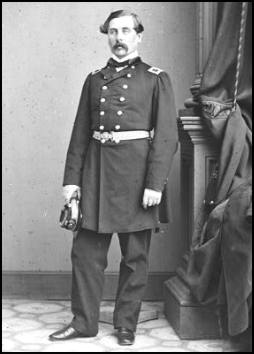 |
Meagher, Thomas Francis Thomas Francis Meagher -Young Ireland:Meagher returned to Ireland in 1843, with undecided plans for a career in the Austrian army, a tradition among a number of Irish families. In 1844 he traveled to Dublin with the intention of studying for the bar. He became involved in the Repeal Association, which worked for repeal... |
Brigadier General, USV (February 3, 1862) |
Resigned May 14, 1863, resignation rejected Resigned May 15, 1865 |
||||
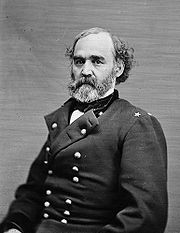 |
Meigs, Montgomery Cunningham Montgomery C. Meigs Montgomery Cunningham Meigs was a career United States Army officer, civil engineer, construction engineer for a number of facilities in Washington, D.C., and Quartermaster General of the U.S. Army during and after the American Civil War.... |
Brigadier General, USA (May 15, 1861) |
Major General, USA (July 5, 1864) |
USMA, 1836 Quartermaster General (1861-1882) |
|||
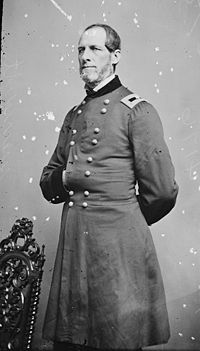 |
Meredith, Solomon Solomon Meredith Solomon Meredith was a prominent Indiana farmer, politician, and lawman who was a controversial Union Army general in the American Civil War... |
Brigadier General, USV (October 6, 1862) |
Major General, USV (August 14, 1865) |
||||
| Meredith, Sullivan Amory | Brigadier General, USV (November 29, 1862) |
||||||
 |
Merritt, Wesley Wesley Merritt Wesley Merritt was a general in the United States Army during the American Civil War and the Spanish-American War. He is noted for distinguished service in the cavalry.-Early life:... |
Captain, USA (1862) Major General, USV (April 1, 1865) |
Major General, USA (1865) |
USMA, 1860 Superintendent, USMA (1882-1887) Military Governor of the Philippines Governor-General of the Philippines The Governor-General of the Philippines was the title of the government executive during the colonial period of the Philippines, governed mainly by Spain and the United States, and briefly by Great Britain, from 1565 to 1935.... (1898) |
|||
 |
Miles, Nelson Appleton Nelson A. Miles Nelson Appleton Miles was a United States soldier who served in the American Civil War, Indian Wars, and the Spanish-American War.-Early life:Miles was born in Westminster, Massachusetts, on his family's farm... |
Major General, USV (October 21, 1865) |
CMOH, Battle of Chancellorsville Battle of Chancellorsville The Battle of Chancellorsville was a major battle of the American Civil War, and the principal engagement of the Chancellorsville Campaign. It was fought from April 30 to May 6, 1863, in Spotsylvania County, Virginia, near the village of Chancellorsville. Two related battles were fought nearby on... (May 2-3, 1863) Last General-in-Chief Commanding General of the United States Army Prior to the institution of the Chief of Staff of the United States Army in 1903, there was generally a single senior-most officer in the army. From 1783, he was known simply as the Senior Officer of the United States Army, but in 1821, the title was changed to Commanding General of the United... (1895-1902); position replaced with Chief of Staff Chief of Staff of the United States Army The Chief of Staff of the Army is a statutory office held by a four-star general in the United States Army, and is the most senior uniformed officer assigned to serve in the Department of the Army, and as such is the principal military advisor and a deputy to the Secretary of the Army; and is in... upon his retirement Military Governor of Puerto Rico Governor of Puerto Rico The Governor of Puerto Rico is the Head of Government of the Commonwealth of Puerto Rico. Since 1948, the Governor has been elected by the people of Puerto Rico... (1898) Commander-in-chief, MOLLUS (1919-1925) Last surviving Major General (d. May 15, 1925) |
||||
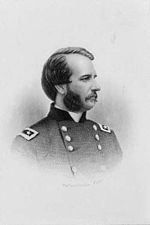 |
Miller, John Franklin | Brigadier General, USV (January 5, 1864) |
Major General, USV (March 13, 1865) |
U.S. Senator from California California California is a state located on the West Coast of the United States. It is by far the most populous U.S. state, and the third-largest by land area... (1881-1886) |
|||
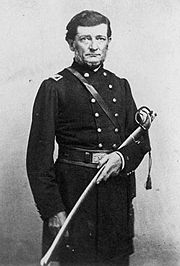 |
Miller, Stephen Stephen Miller Stephen Miller was an American Republican politician. He was the first Civil War veteran to serve as Minnesota Governor. He was the fourth Governor of Minnesota.-Early years and business entrepreneur:... |
Brigadier General, USV (October 26, 1863) |
Resigned January 18, 1864 Governor of Minnesota Governor of Minnesota The Governor of Minnesota is the chief executive of the U.S. state of Minnesota, leading the state's executive branch. Forty different people have been governors of the state, though historically there were also three governors of Minnesota Territory. Alexander Ramsey, the first territorial... (1864-1865) |
||||
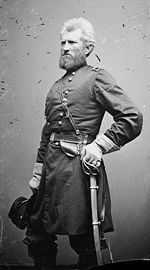 |
Milroy, Robert Huston Robert H. Milroy Robert Huston Milroy was a lawyer, judge, and a Union Army general in the American Civil War, most noted for his defeat at the Second Battle of Winchester in 1863.-Early life:... |
Major General, USV (November 29, 1862) |
|||||
| Mindil, George Washington | Colonel, USV | Major General, USV (March 13, 1865) |
CMOH, Battle of Williamsburg Battle of Williamsburg The Battle of Williamsburg, also known as the Battle of Fort Magruder, took place on May 5, 1862, in York County, James City County, and Williamsburg, Virginia, as part of the Peninsula Campaign of the American Civil War... (May 5, 1862) |
||||
| Mitchel, Ormsby MacKnight Ormsby M. Mitchel Ormsby MacKnight Mitchel was an American astronomer and major general in the American Civil War.... |
Major General, USV (April 11, 1862) |
USMA, 1829 Died of yellow fever Yellow fever Yellow fever is an acute viral hemorrhagic disease. The virus is a 40 to 50 nm enveloped RNA virus with positive sense of the Flaviviridae family.... , October 30, 1862 |
|||||
| Mitchell, John Grant John G. Mitchell (general) John Grant Mitchell was an Ohio lawyer and a general in the Union Army during the American Civil War. He was active in several important campaigns and battles in the Western Theater, including the Chickamauga, Atlanta, and Franklin-Nashville and Carolinas campaigns... |
Brigadier General, USV (January 12, 1865) |
Major General, USV (March 13, 1865) |
Resigned July 3, 1865 | ||||
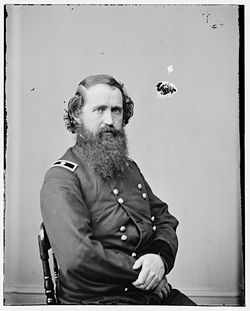 |
Mitchell, Robert Byington Robert Byington Mitchell Robert Byington Mitchell was a brigadier general in the Union Army during the American Civil War and the Governor of the New Mexico Territory from 1866 to 1869.-Early life and career:... |
Brigadier General, USV (April 8, 1862) |
Territorial Governor of New Mexico (1866-1869) | ||||
| Montgomery, William Reading | Brigadier General, USV (May 17, 1861) |
USMA, 1825 Resigned April 4, 1864 |
|||||
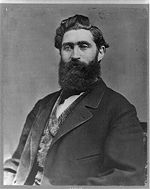 |
Moonlight, Thomas Thomas Moonlight Thomas Moonlight was a United States politician and general.-Birth:Thomas was baptised on 30 September 1833 in St Vigeans, Angus, Scotland with birth record number 319/0040 0169... |
Colonel, USV | Brigadier General, USV (February 13, 1865) |
Territorial Governor of Wyoming (1887-1889) U.S. minister to Bolivia United States Ambassador to Bolivia The following is a list of United States Ambassadors, or other Chiefs of Mission, to Bolivia. The title given by the United States State Department to this position is currently Ambassador Extraordinary and Minister Plenipotentiary.-See also:... (1894-1898) |
|||
| Moore, Jesse Hale Jesse Hale Moore Jesse Hale Moore was a U.S. Representative from Illinois.Born near Lebanon, St. Clair County, Illinois, Moore graduated from McKendree College, Lebanon, Illinois, in 1842.... |
Colonel, USV (September 13, 1862) |
Brigadier General, USV (May 15, 1865) |
U.S. Congressman from Illinois Illinois Illinois is the fifth-most populous state of the United States of America, and is often noted for being a microcosm of the entire country. With Chicago in the northeast, small industrial cities and great agricultural productivity in central and northern Illinois, and natural resources like coal,... (1869-1873) |
||||
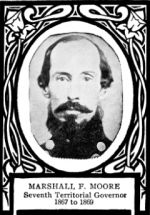 |
Moore, Marshall Frank Marshall F. Moore Marshall F. Moore was the 7th Governor of Washington Territory.He served during the Civil War under George McClellan in Virginia and under Sherman. He was at Rich Mountain, Shiloh, Chickamauga, Jonesboro and Missionary Ridge. He rose to the rank of breveted major general on March 13, 1865. He... |
Colonel, USV | Major General, USV (March 13, 1865) |
Territorial Governor of Washington (1867-1869) | |||
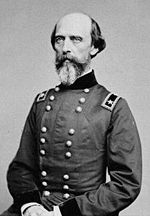 |
Morell, George Webb George W. Morell George Webb Morell was a civil engineer, lawyer, farmer, and a Union general in the American Civil War.-Early life:... |
Brigadier General, USV (August 9, 1861) |
USMA, 1835 Appointment as Major General, USV (July 4, 1862) expired March 4, 1863 Mustered out December 15, 1864 |
||||
| Morgan, Charles Hale | Captain, USA (August 5, 1861) Brigadier General, USV (May 21, 1865) |
USMA, 1857 | |||||
 |
Morgan, Edwin Denison Edwin D. Morgan Edwin Denison Morgan was the 21st Governor of New York from 1859 to 1862 and served in the United States Senate from 1863 to 1869. He was the first and longest-serving chairman of the Republican National Committee... |
Major General, USV (September 28, 1861) |
Resigned January 1, 1863 First (and longest-sitting) Chairman of the Republican National Committee Republican National Committee The Republican National Committee is an American political committee that provides national leadership for the Republican Party of the United States. It is responsible for developing and promoting the Republican political platform, as well as coordinating fundraising and election strategy. It is... (1856-1864, 1872-1876) Governor of New York Governor of New York The Governor of the State of New York is the chief executive of the State of New York. The governor is the head of the executive branch of New York's state government and the commander-in-chief of the state's military and naval forces. The officeholder is afforded the courtesy title of His/Her... (1859-1862) U.S. Senator from New York New York New York is a state in the Northeastern region of the United States. It is the nation's third most populous state. New York is bordered by New Jersey and Pennsylvania to the south, and by Connecticut, Massachusetts and Vermont to the east... (1863-1869) |
||||
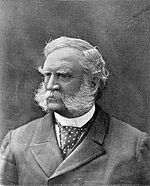 |
Morgan, George Washington George W. Morgan George Washington Morgan was an American soldier, lawyer, politician, and diplomat. He fought in the Texas Revolution and the Mexican-American War, and was a general in the Union Army during the American Civil War... |
Brigadier General, USV (November 21, 1861) |
Brigadier General, USA (1848) |
USMA (class of 1845), resigned 1843 Resigned volunteer commission June 8, 1863 U.S. minister to Portugal United States Ambassador to Portugal This is a list of Ambassadors of the United States to Portugal.Bilateral diplomatic relations between the United States and Portugal date from the earliest years of the United States. Following the Revolutionary War, Portugal was the first neutral country to recognize the United States. On February... (1858-1861) U.S. Congressman from Ohio Ohio Ohio is a Midwestern state in the United States. The 34th largest state by area in the U.S.,it is the 7th‑most populous with over 11.5 million residents, containing several major American cities and seven metropolitan areas with populations of 500,000 or more.The state's capital is Columbus... (1869-1869, 1871-1873) |
|||
| Morgan, James Dada James D. Morgan James Dada Morgan was a merchant sailor, soldier, businessman, and a Union general during the American Civil War. He commanded a division of infantry in some of the final campaigns in the Western Theater.... |
Brigadier General, USV (July 17, 1862) |
Major General, USV (March 19, 1865) |
|||||
| Morris, William Hopkins | Brigadier General, USV (November 29, 1862) |
Major General, USV (March 13, 1865) |
USMA, 1851 | ||||
| Morton, James St. Clair James St. Clair Morton James St. Clair Morton was an American soldier, engineer and writer. He served as a general in the Union Army during the American Civil War, primarily serving in the Western Theater.-Early Life and Career:... |
Major, USA (July 3, 1863) Brigadier General, USV (November 29, 1862) |
USMA, 1851 Resigned volunteer commission November 7, 1863 KIA, Siege of Petersburg Siege of Petersburg The Richmond–Petersburg Campaign was a series of battles around Petersburg, Virginia, fought from June 9, 1864, to March 25, 1865, during the American Civil War... (July 17, 1864) |
|||||
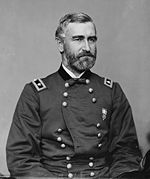 |
Mott, Gershom Gershom Mott Gershom Mott was a United States Army officer and a General in the Union Army, a commander in the Eastern Theater of the American Civil War.-Early life:... |
Major General, USV (May 26, 1865) |
|||||
 |
Mower, Joseph Anthony Joseph A. Mower Joseph Anthony Mower was a Union general during the American Civil War. He was a competent officer and well respected by his troops and fellow officers to whom he was known as "Fighting Joe". William T. Sherman said of Mower, "he's the boldest young officer we have".-Biography:Mower was born in... |
Major General, USV (August 12, 1864) |
Major General, USA (March 13, 1865) |
||||
| Mulholland, St. Clair Augustine St. Clair Augustine Mulholland St. Clair Augustine Mulholland was a colonel in the Union Army in the American Civil War who later received the brevets of brigadier general of volunteers and major general of volunteers and the Medal of Honor for gallantry in action at the Battle of Chancellorsville.-Biography:Mulholland was born... |
Colonel, USV | Major General, USV (March 13, 1865) |
CMOH, Battle of Chancellorsville Battle of Chancellorsville The Battle of Chancellorsville was a major battle of the American Civil War, and the principal engagement of the Chancellorsville Campaign. It was fought from April 30 to May 6, 1863, in Spotsylvania County, Virginia, near the village of Chancellorsville. Two related battles were fought nearby on... (May 4-5, 1863) |
||||
| Mulligan, James Adelbert James A. Mulligan James A. Mulligan was colonel of the 23rd Illinois Volunteer Infantry Regiment in the Union Army during the American Civil War. On February 20, 1865, the United States Senate confirmed the posthumous award to Colonel Mulligan of the rank of brevet brigadier general of U.S... |
Colonel, USV | Brigadier General, USV (July 23, 1864) |
DOW, Second Battle of Kernstown (w. July 23, 1864, d. July 26, 1864) | ||||
| Murray, Eli Houston Eli Houston Murray Eli Houston Murray was Governor of Utah Territory between 1880 and 1886.He had been brevetted to the rank of brigadier general in the American Civil War, and was appointed Governor in 1880.... |
Colonel, USV | Brigadier General, USV (March 25, 1865) |
Territorial Governor of Utah (1880-1886) | ||||
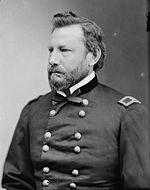 |
Myer, Albert James Albert J. Myer Albert James Myer was a surgeon and United States Army officer. He is known as the father of the U.S. Army Signal Corps, as its first chief signal officer just prior to the American Civil War, the inventor of wig-wag signaling , and also as the father of the U.S... |
Colonel, USV (March 13, 1863) |
Brigadier General, USV (March 13, 1865) |
Chief Signal Officer (1860-1863, 1866-1880) |
N
| Image | Name | Substantive Rank | Brevet Brevet (military) In many of the world's military establishments, brevet referred to a warrant authorizing a commissioned officer to hold a higher rank temporarily, but usually without receiving the pay of that higher rank except when actually serving in that role. An officer so promoted may be referred to as being... Rank | Nagle, James James Nagle James Nagle was an officer in the United States Army in both the Mexican War and the Civil War. During the latter conflict, he recruited and commanded four infantry regiments from the commonwealth of Pennsylvania and led two different brigades in the Eastern Theater... | Brigadier General, USV (March 13, 1863) |
Original appointment as Brigadier General, USV (September 10, 1862) expired March 4, 1863 due to lack of Senate confirmation Resigned, May 9, 1863 Recommissioned as Colonel (July 4, 1863-August2, 1863) Recommissioned again as Colonel (1864) Resigned, November 5, 1864 |
|
|---|---|---|---|---|---|---|---|
 |
Naglee, Henry Morris Henry Morris Naglee Henry Morris Naglee was a civil engineer, banker, vintner, and a Union General in the American Civil War. Naglee was born in Philadelphia, Pennsylvania, and graduated from the United States Military Academy in 1835.... |
Brigadier General, USV (February 12, 1862) |
Relieved, September 23, 1863 Mustered out, April 4, 1864 |
USMA, 1835 | |||
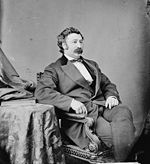 |
Negley, James S. James S. Negley James Scott Negley was an American Civil War General, farmer, railroader, and U.S. Representative from the state of Pennsylvania. He played a key role in the Union victory at the Battle of Murfreesboro.-Early life:... |
Major General, USV (November 29, 1862) |
Relieved, September, 1864 Resigned, January 19, 1865 U.S. Congressman from Pennsylvania Pennsylvania The Commonwealth of Pennsylvania is a U.S. state that is located in the Northeastern and Mid-Atlantic regions of the United States. The state borders Delaware and Maryland to the south, West Virginia to the southwest, Ohio to the west, New York and Ontario, Canada, to the north, and New Jersey to... (1869-1887) |
||||
| Neill, Thomas Hewson | Major, USA Brigadier General, USV (November 29, 1863) |
Brigadier General, USA Major General, USV |
USMA, 1847 Superintendent, USMA (1876-1879) |
||||
| Nelson, William | Major General, USV (July 17, 1862) |
Only naval officer in either army to reach major general Shot and killed in a private altercation by Brigadier General Jefferson C. Davis Jefferson C. Davis Jefferson Columbus Davis was an officer in the United States Army who served in the Mexican-American War, the Civil War, and the Modoc War. He was the first commander of the Department of Alaska, from 1868 to 1870... (September 29, 1862) |
|||||
| Newberry, Walter Cass Walter C. Newberry Walter Cass Newberry was a U.S. Representative from Illinois.Newberry was born in Sangerfield, New York and enlisted in the Union Army during the Civil War as a private in the Eighty-first Regiment, New York Volunteers... |
Colonel, USV | Brigadier General, USV (March 31, 1865) |
U.S. Congressman from Illinois Illinois Illinois is the fifth-most populous state of the United States of America, and is often noted for being a microcosm of the entire country. With Chicago in the northeast, small industrial cities and great agricultural productivity in central and northern Illinois, and natural resources like coal,... (1891-1893) |
||||
.jpg) |
Newton, John | Colonel, USA Major General, USV (March 30, 1863) |
Major General, USA (March 13, 1865) Major General, USA (March 13, 1865) |
USMA, 1842 son of Congressman Thomas Newton, Jr. Thomas Newton, Jr. Thomas Newton, Jr. was an American politician. He was born in Norfolk, Virginia.Newton was a member of the Virginia House of Delegates from 1796 to 1799. He served as a Democratic-Republican in the United States House of Representatives from March 4, 1801 to March 9, 1830.-External links:*... Volunteer rank revoked April 18, 1864 |
|||
| Nickerson, Franklin Stillman | Brigadier General, USV (November 29, 1862) |
Relieved, July 22, 1864 Resigned May 13, 1865 |
|||||
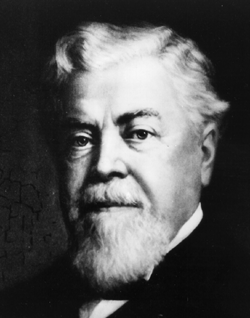 |
Noble, John Willock John Willock Noble John Willock Noble was a U.S. lawyer and brevet general in the Civil War. He served as the Secretary of the Interior between 1889 and 1893.... |
Colonel, USV | Brigadier General, USV (March 13, 1865) |
Secretary of the Interior United States Secretary of the Interior The United States Secretary of the Interior is the head of the United States Department of the Interior.The US Department of the Interior should not be confused with the concept of Ministries of the Interior as used in other countries... (1889-1893) |
|||
| Noyes, Edward Follansbee | Colonel, USV | Brigadier General, USV (March 12, 1865) |
Governor of Ohio (1872-1874) U.S. minister to France United States Ambassador to France This article is about the United States Ambassador to France. There has been a United States Ambassador to France since the American Revolution. The United States sent its first envoys to France in 1776, towards the end of the four-centuries-old Bourbon dynasty... (1877-1881) |
O
| Image | Name | Substantive Rank | Brevet Brevet (military) In many of the world's military establishments, brevet referred to a warrant authorizing a commissioned officer to hold a higher rank temporarily, but usually without receiving the pay of that higher rank except when actually serving in that role. An officer so promoted may be referred to as being... Rank | Oglesby, Richard James "Uncle Dick" Richard James Oglesby Richard James Oglesby was an Illinois statesman and U.S. Army officer. He served in the Mexican-American War and was a major general in the Union Army during the American Civil War. He also served Illinois in the legislature. Near the end of the civil war, he was elected the 14th Governor of... | Major General, USV (November 29, 1862) |
Resigned, May 26, 1864 Governor of Illinois Governor of Illinois The Governor of Illinois is the chief executive of the State of Illinois and the various agencies and departments over which the officer has jurisdiction, as prescribed in the state constitution. It is a directly elected position, votes being cast by popular suffrage of residents of the state.... (1865-1869, 1873, 1885-1889) U.S. Senator from Illinois Illinois Illinois is the fifth-most populous state of the United States of America, and is often noted for being a microcosm of the entire country. With Chicago in the northeast, small industrial cities and great agricultural productivity in central and northern Illinois, and natural resources like coal,... (1873-1879) Present at the deathbed of Abraham Lincoln Abraham Lincoln Abraham Lincoln was the 16th President of the United States, serving from March 1861 until his assassination in April 1865. He successfully led his country through a great constitutional, military and moral crisis – the American Civil War – preserving the Union, while ending slavery, and... |
|
|---|---|---|---|---|---|---|---|
| Oliver, John Morrison John Morrison Oliver John Morrison Oliver was a Union general during the Civil War. He fought in many of the battles involving the Army of the Tennessee, occasionally commanding a brigade.... |
Brigadier General, USV (January 12, 1865) |
Major General, USV | |||||
| Oliver, Paul Ambrose Paul Ambrose Oliver Paul Ambrose Oliver was an American explosives inventor, American Civil War Union Army captain and staff officer who was appointed to the brevet grade of brigadier general and Medal of Honor recipient. He was born on the USS Louisiana during one of its voyages in the English Channel... |
Major, USV | Brigadier General, USV (March 8, 1865) |
CMOH, Battle of Resaca Battle of Resaca The Battle of Resaca was part of the Atlanta Campaign of the American Civil War. The battle was waged in both Gordon and Whitfield counties, Georgia, from May 13 - 15, 1864. It ended inconclusively with the Confederate Army retreating. The engagement was fought between the Military Division of the... (May 15, 1864) |
||||
| Opdycke, Emerson Emerson Opdycke Samuel Emerson Opdycke was a businessman and Union brigadier general during the American Civil War.-Early years:... (b. Opdycke, Samuel Emerson) |
Brigadier General, USV (July 26, 1865) |
Major General, USV (March 13, 1865) |
|||||
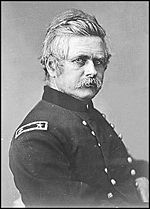 |
Ord, Edward Otho Cresap Edward Ord Edward Otho Cresap Ord was the designer of Fort Sam Houston, and a United States Army officer who saw action in the Seminole War, the Indian Wars, and the American Civil War. He commanded an army during the final days of the Civil War, and was instrumental in forcing the surrender of Confederate... |
Colonel, USA Major General, USV (May 3, 1862) |
USMA, 1839 | ||||
| Orme, William Ward | Brigadier General, USV (November 29, 1862) |
Resigned, April 20, 1864 | |||||
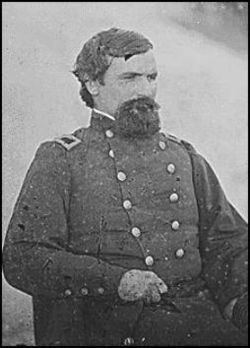 |
Osborn, Thomas Ogden | Brigadier General, USV (May 1, 1865) |
Major General, USV | U.S. minister to Argentina United States Ambassador to Argentina The United States Ambassador to Argentina is the official representative of the President of the United States to the head of state of Argentina.... (1874-1885) |
|||
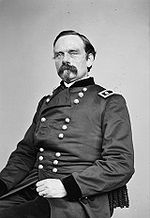 |
Osterhaus, Peter Joseph Peter J. Osterhaus Peter Joseph Osterhaus was Union Army General in the American Civil War and later served as a diplomat.-Early life:Osterhaus was born in Koblenz, Rhenish Prussia. He attended the Berlin Military Academy and after serving for some time as a Prussian Army officer, he emigrated to the United States... |
Major General, USV (July 23, 1864) |
|||||
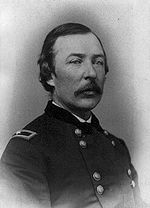 |
Owen, Joshua Thomas | Brigadier General, USV (November 29, 1862) |
Commission never confirmed by Senate, expired March 4, 1863 Relieved of duty, June, 1864 Mustered out, July, 1864 |
P
| Image | Name | Substantive Rank | Brevet Brevet (military) In many of the world's military establishments, brevet referred to a warrant authorizing a commissioned officer to hold a higher rank temporarily, but usually without receiving the pay of that higher rank except when actually serving in that role. An officer so promoted may be referred to as being... Rank | Indiana Indiana Indiana is a US state, admitted to the United States as the 19th on December 11, 1816. It is located in the Midwestern United States and Great Lakes Region. With 6,483,802 residents, the state is ranked 15th in population and 16th in population density. Indiana is ranked 38th in land area and is... (1869-1875) |
|---|---|---|---|---|
| Paine, Charles Jackson Charles Jackson Paine Charles Jackson Paine was an American railroad executive, soldier, and yachtsman who was a general in the Union Army during the American Civil War.-Biography:... |
Brigadier General, USV (July 4, 1864) |
Major General, USV (March 13, 1865) |
||
| Paine, Eleazar Arthur | Brigadier General, USV (September 3, 1861) |
USMA, 1839 Resigned April 5, 1865 Cousin of Halbert Eleazer Paine Halbert E. Paine Halbert Eleazer Paine was a lawyer, politician, and general in the Union Army during the American Civil War. He was a three-term postbellum U.S. Congressman from Wisconsin.-Biography:... |
||
| Paine, Halbert Eleazer Halbert E. Paine Halbert Eleazer Paine was a lawyer, politician, and general in the Union Army during the American Civil War. He was a three-term postbellum U.S. Congressman from Wisconsin.-Biography:... |
Brigadier General, USV (April 9, 1863) |
Resigned May 15, 1865 U.S. Congressman from Wisconsin Wisconsin Wisconsin is a U.S. state located in the north-central United States and is part of the Midwest. It is bordered by Minnesota to the west, Iowa to the southwest, Illinois to the south, Lake Michigan to the east, Michigan to the northeast, and Lake Superior to the north. Wisconsin's capital is... (1865-1871) Cousin of Eleazer Arthur Paine Eleazer A. Paine Eleazer Arthur Paine was an American soldier, author, lawyer, and a controversial general in the Union Army during the American Civil War. He was formally reprimanded for brutality toward civilians and violating their civil rights while commanding troops in western Kentucky.-Early life and... |
||
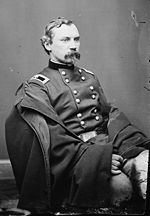 |
Palmer, Innis Newton Innis N. Palmer Innis Newton Palmer was a career officer in the United States Army, serving in the Mexican-American War, the Civil War, and on the Western frontier.... |
Lieutenant Colonel, USA (1863) Brigadier General, USV (September 23, 1861) |
Brigadier General, USA Major General, USV |
USMA, 1846 |
 |
Palmer, John McCauley John M. Palmer (politician) John McAuley Palmer , was an Illinois resident, an American Civil War General who fought for the Union, the 15th Governor of Illinois, and presidential candidate of the National Democratic Party in the 1896 election on a platform to defend the gold standard, free trade, and limited... |
Major General, USV (November 29, 1862) |
Governor of Illinois Governor of Illinois The Governor of Illinois is the chief executive of the State of Illinois and the various agencies and departments over which the officer has jurisdiction, as prescribed in the state constitution. It is a directly elected position, votes being cast by popular suffrage of residents of the state.... (1869-1873) U.S. Senator from Illinois Illinois Illinois is the fifth-most populous state of the United States of America, and is often noted for being a microcosm of the entire country. With Chicago in the northeast, small industrial cities and great agricultural productivity in central and northern Illinois, and natural resources like coal,... (1891-1897) Commander-in-chief, GAR (1891-1892) |
|
| Palmer, William Jackson William Jackson Palmer William Jackson Palmer was an American civil engineer, soldier, industrialist, and philanthropist.-Overview:... |
Colonel, USV | Brigadier General, USV (November 6, 1864) |
CMOH for actions at Red Hill, Alabama (January 14, 1865) | |
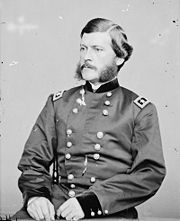 |
Parke, John Grubb John Parke John Grubb Parke was a United States Army engineer and a Union general in the American Civil War.-Early life:... |
Major General, USV (July 18, 1862) |
Major General, USA | USMA, 1849 Superintendent, USMA (1887-1889) |
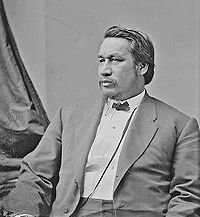 |
Parker, Ely Samuel Ely S. Parker Ely Samuel Parker , was a Seneca attorney, engineer, and tribal diplomat. He was commissioned a lieutenant colonel during the American Civil War, when he served as adjutant to General Ulysses S. Grant. He wrote the final draft of the Confederate surrender terms at Appomattox... |
Lieutenant Colonel, USV (1864) |
Brigadier general, USV (April 9. 1865) |
Military secretary to Ulysses S. Grant Ulysses S. Grant Ulysses S. Grant was the 18th President of the United States as well as military commander during the Civil War and post-war Reconstruction periods. Under Grant's command, the Union Army defeated the Confederate military and ended the Confederate States of America... Highest-ranking Native American in Union service |
| Parkhurst, John Gibson | Colonel, USV | Brigadier General, USV (May 22, 1865) |
U.S. minister to Belgium United States Ambassador to Belgium In 1832, shortly after the creation of the Kingdom of Belgium, the United States established diplomatic relations. Since that time, a long line of distinguished envoys have represented American interests in Belgium. These diplomats included men and women whose career paths would lead them to... (1888-1889) |
|
| Parsons, Lewis Baldwin | Brigadier General, USV (May 11, 1865) |
Major General, USV | ||
| Patrick, Marsena Rudolph Marsena R. Patrick Marsena Rudolph Patrick was a college president and an officer in the United States Army, serving as a general in the Union volunteer forces during the American Civil War. He was the provost marshal for the Army of the Potomac in many of its campaigns.-Early life:Patrick was born in Hounsfield,... |
Brigadier General, USV (March 20, 1862) |
Major General, USV (March 13, 1865) |
USMA, 1835 | |
| Patten, Henry Lyman | Major, USV | Brigadier General, USV (March 13, 1865) |
DOW, Second Battle of Deep Bottom (w. August 17, 1864, d. September 10, 1864) | |
| Patterson, Francis Engle Francis E. Patterson Francis Engle Patterson was a US Army general who died during the American Civil War.Patterson was born in Philadelphia to Irish-American army officer Robert Patterson and Sarah Engle... |
Brigadier General, USV (April 11, 1862) |
"Killed by accidental discharge of his own pistol" (November 22, 1862) Son of Robert Patterson Robert Patterson Robert Patterson was a United States major general during the Mexican-American War and at the beginning of the American Civil War... Brother-in-law of John Joseph Abercrombie John Joseph Abercrombie John Joseph Abercrombie was a career United States Army officer who served in numerous wars, finally reaching the rank of brigadier general during the American Civil War.-Early life and career:... |
||
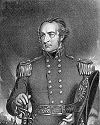 |
Patterson, Robert Robert Patterson Robert Patterson was a United States major general during the Mexican-American War and at the beginning of the American Civil War... |
Major General, USV | Discharged July, 1861 Father of Francis Engle Patterson Father-in-law of John Joseph Abercrombie John Joseph Abercrombie John Joseph Abercrombie was a career United States Army officer who served in numerous wars, finally reaching the rank of brigadier general during the American Civil War.-Early life and career:... |
|
| Paul, Gabriel René Gabriel Rene Paul Gabriel René Paul was a career officer in the United States Army most noted for his service as a Union Army general in the American Civil War.-Birth and early years:... |
Brigadier General, USA (February 16, 1865) Brigadier General, USV (April 18, 1863) |
Retired February 16, 1865 due to blinding at Battle of Gettysburg Battle of Gettysburg The Battle of Gettysburg , was fought July 1–3, 1863, in and around the town of Gettysburg, Pennsylvania. The battle with the largest number of casualties in the American Civil War, it is often described as the war's turning point. Union Maj. Gen. George Gordon Meade's Army of the Potomac... (July 1, 1863) USMA, 1834 Original appointment as Brigadier General, USV (September 5, 1862) expired March 4, 1863 |
||
| Pearson, Alfred L. Alfred L. Pearson Alfred L. Pearson was a lawyer and Union Army general in the American Civil War. He was awarded the U.S. military's highest decoration, the Medal of Honor, for his actions at the Battle of Lewis's Farm.-Biography:... |
Colonel, USV (August 31, 1863) |
Major General, USV (March 13, 1865) |
CMOH, Battle of Lewis's Farm Battle of Lewis's Farm -External links:*... (March 29, 1865) |
|
| Peck, Frank Henry | Lieutenant Colonel, USV | Brigadier General, USV (September 19, 1864) |
DOW, Battle of Opequon Battle of Opequon The Battle of Opequon, more commonly known as the Third Battle of Winchester, was fought in Winchester, Virginia, on September 19, 1864, during the Valley Campaigns of 1864 in the American Civil War.... (w. September 19, 1864, d. September 20, 1864) |
|
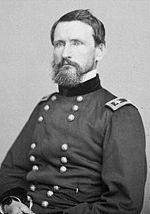 |
Peck, John James John J. Peck John James Peck was a United States soldier who fought in the Mexican-American War and American Civil War.-Early life:... |
Major General, USV (July 4, 1862) |
USMA, 1843 | |
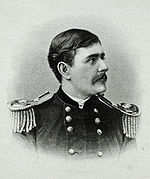 |
Pennypacker, Galusha Galusha Pennypacker -External links:... |
Brigadier General, USV (February 18, 1865) |
Major General, USV (March 13, 1865) |
CMOH, Battle of Fort Fisher Battle of Fort Fisher Two battles were fought over Fort Fisher during the American Civil War. The first battle was a failed attempt by the Union army and Navy to capture the fort. The second battle was a successful operation which led to the fall of the fort and the city of Wilmington, North Carolina.* First Battle of... (January 15, 1865) Youngest general in U.S. history |
| Penrose, William Henry | First Lieutenant, USA (May 14, 1861) Brigadier General, USV (July 27, 1865) |
|||
| Phelps, Charles Edward Charles E. Phelps Charles Edward Phelps was a colonel in the Union Army during the Civil War, later received a brevet as a brigadier general of volunteers, served as a city councilman, a U.S. Congressman from the third district of Maryland, and received the Medal of Honor... |
Colonel, USV (1863) |
Brigadier General, USV (March 13, 1865) |
CMOH, Battle of Spotsylvania (May 8, 1864) U.S. Congressman from Maryland Maryland Maryland is a U.S. state located in the Mid Atlantic region of the United States, bordering Virginia, West Virginia, and the District of Columbia to its south and west; Pennsylvania to its north; and Delaware to its east... (1865-1869) Half-brother of John Wolcott Phelps John W. Phelps John Wolcott Phelps , was a general in the Union Army during the American Civil War, an author, an ardent abolitionist and presidential candidate.-Soldier and abolitionist:... |
|
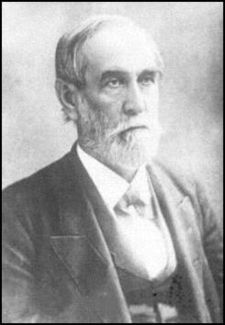 |
Phelps, John Smith John S. Phelps John Smith Phelps was a politician, soldier during the American Civil War, and the 23rd Governor of Missouri.-Early life and career:... |
Brigadier General, USV (July 19, 1862) |
Appointment expired March 4, 1863 U.S. Congressman from Missouri Missouri Missouri is a US state located in the Midwestern United States, bordered by Iowa, Illinois, Kentucky, Tennessee, Arkansas, Oklahoma, Kansas and Nebraska. With a 2010 population of 5,988,927, Missouri is the 18th most populous state in the nation and the fifth most populous in the Midwest. It... (1845-1863) Military Governor of Arkansas (1862-1863) Governor of Missouri (1877-1881) |
|
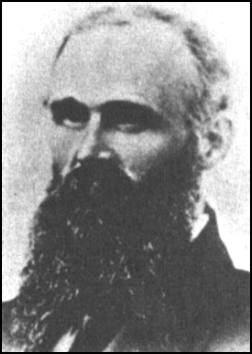 |
Phelps, John Wolcott John W. Phelps John Wolcott Phelps , was a general in the Union Army during the American Civil War, an author, an ardent abolitionist and presidential candidate.-Soldier and abolitionist:... |
Brigadier General, USV (May 17, 1861) |
Resigned, August 21, 1862) USMA, 1836 Half-brother of Charles Edward Phelps Charles E. Phelps Charles Edward Phelps was a colonel in the Union Army during the Civil War, later received a brevet as a brigadier general of volunteers, served as a city councilman, a U.S. Congressman from the third district of Maryland, and received the Medal of Honor... |
|
| Piatt, Abram Sanders Abram S. Piatt Abram Sanders Piatt was a wealthy farmer, publisher, poet, politician, and soldier from southern Ohio who served as a general in the Union Army during the American Civil War. He organized the only zouave regiment from Ohio and later led a brigade in the Army of the Potomac... (aka Piatt, Abraham Sanders) |
Brigadier General, USV (April 30, 1862) |
Resigned February 17, 1863 | ||
| Pierce, Byron Root | Brigadier General, USV (June 7, 1864) |
Major General, USV (March 13, 1865) |
||
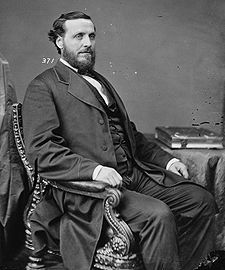 |
Pile, William Anderson William A. Pile William Anderson Pile was a nineteenth century politician and minister from Missouri, as well as a general in the Union Army during the American Civil War. He was Governor of New Mexico Territory from 1869 to 1871. William was one half Native American , most likely Choctaw... |
Brigadier General, USV (December 26, 1863) |
Major General, USV (April, 1865) |
U.S. Congressman from Missouri Missouri Missouri is a US state located in the Midwestern United States, bordered by Iowa, Illinois, Kentucky, Tennessee, Arkansas, Oklahoma, Kansas and Nebraska. With a 2010 population of 5,988,927, Missouri is the 18th most populous state in the nation and the fifth most populous in the Midwest. It... (1867-1869) Territorial Governor of New Mexico (1869-1871) U.S. minister to Venezuela United States Ambassador to Venezuela The following is a list of United States ambassadors, or other chiefs of mission, to Venezuela. The title given by the United States State Department to this position is currently Ambassador Extraordinary and Minister Plenipotentiary.-Ambassadors:... (1871-1874) |
| Pitcher, Thomas Gamble Thomas Gamble Pitcher Thomas Gamble Pitcher was a career American soldier who served as the Superintendent of the United States Military Academy from 1866 until 1870.... |
Captain, USA (1858) Brigadier General, USV (November 29, 1862) |
Brigadier General, USA (March 13, 1865) |
USMA, 1845 Superintendent, USMA (1866-1870) |
|
 |
Plaisted, Harris Merrill Harris M. Plaisted Harris Merrill Plaisted was an American Civil War general, U.S. Congressman, and the 38th Governor of Maine.-Biography:... |
Colonel, USV (Mar 12, 1862) |
Major General, USV (March 13, 1865) |
U.S. Congressman from Maine Maine Maine is a state in the New England region of the northeastern United States, bordered by the Atlantic Ocean to the east and south, New Hampshire to the west, and the Canadian provinces of Quebec to the northwest and New Brunswick to the northeast. Maine is both the northernmost and easternmost... (1875-1877) Governor of Maine Governor of Maine The governor of Maine is the chief executive of the State of Maine. Before Maine was admitted to the Union in 1820, Maine was part of Massachusetts and the governor of Massachusetts was chief executive.... (1881-1883) |
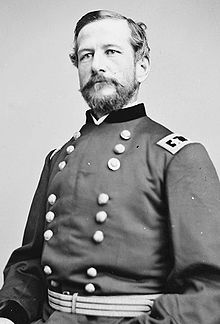 |
Pleasonton, Alfred Alfred Pleasonton Alfred Pleasonton was a United States Army officer and General of Union cavalry during the American Civil War. He commanded the Cavalry Corps of the Army of the Potomac during the Gettysburg Campaign, including the largest predominantly cavalry battle of the war, Brandy Station... |
Major, USA (1862) Major General, USV (June 22, 1863) |
Major General, USA (March 13, 1865) |
USMA, 1844 |
| Plummer, Joseph Bennett Joseph B. Plummer Joseph Bennett Plummer was a career soldier in the United States Army, serving as a general during the American Civil War.-Biography:... |
Major, USA (April, 1862) Brigadier General, USV (October 27, 1861) |
USMA, 1841 Died "Of Wound and Exposure in the Active Field", August 9, 1862 |
||
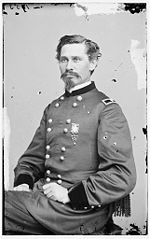 |
Poe, Orlando Metcalfe Orlando Poe Orlando Metcalfe Poe was an United States Army officer and engineer in the American Civil War. After helping General William Tecumseh Sherman's March to the Sea, he was responsible for much of the early lighthouse construction on the Great Lakes.-Early life:Poe was born in Navarre, Ohio... |
Captain, USA Brigadier General, USV (November 29, 1862) |
Brigadier General, USA | USMA, 1856 Volunteer appointment expired March 4, 1863 |
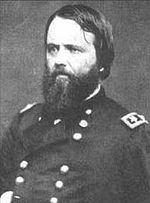 |
Pope, John John Pope (military officer) John Pope was a career United States Army officer and Union general in the American Civil War. He had a brief but successful career in the Western Theater, but he is best known for his defeat at the Second Battle of Bull Run in the East.Pope was a graduate of the United States Military Academy in... |
Brigadier General, USA (July 14, 1862) Major General, USV (March 21, 1862) |
USMA, 1842 Brother-in-law of Force, Manning Ferguson Manning Force Manning Ferguson Force was a lawyer, judge and soldier from Ohio. He became known as the commander of the 20th Ohio Volunteer Infantry in the Union Army during the American Civil War, and was a recipient of the Army Medal of Honor for gallantry in action.-Early life and career:Manning F... |
|
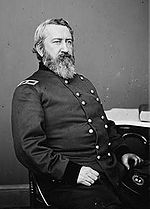 |
Porter, Andrew Andrew Porter (Civil War general) Andrew Porter was an American army officer who was a brigadier general in the Union Army during the American Civil War. He was an important staff officer under George B. McClellan during the 1862 Peninsula Campaign, serving as the Provost Marshal of the Army of the Potomac.-Early life and... |
Colonel, USA (May 14, 1861) Brigadier General, USV (May 18, 1861) |
Mustered out of volunteer service April 4, 1864 Resigned regular commission April 20, 1864 USMA (class of 1844), resigned in 1840 Cousin of Horace Porter Horace Porter Horace Porter, was an American soldier and diplomat who served as a general in the Union Army during the American Civil War.... First cousin (once removed) of Mary Todd Lincoln Mary Todd Lincoln Mary Ann Lincoln was the wife of the 16th President of the United States, Abraham Lincoln, and was First Lady of the United States from 1861 to 1865.-Life before the White House:... |
|
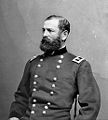 |
Porter, Fitz John Fitz John Porter Fitz John Porter was a career United States Army officer and a Union General during the American Civil War... |
Colonel, USA (1861) Major General, USV (July 4, 1862) |
Brigadier General, USA (1862) |
USMA, 1845 Relieved September 5, 1862 court-martialed Court-martial A court-martial is a military court. A court-martial is empowered to determine the guilt of members of the armed forces subject to military law, and, if the defendant is found guilty, to decide upon punishment.Most militaries maintain a court-martial system to try cases in which a breach of... and convicted (January 10, 1863) Dismissed from service January 21, 1863 Exonerated March 19, 1879 Nephew of David Dixon Porter David Dixon Porter David Dixon Porter was a member of one of the most distinguished families in the history of the United States Navy. Promoted as the second man to the rank of admiral, after his adoptive brother David G... , USN and William David Porter William D. Porter William David Porter was a flag officer of the United States Navy. He was the son of Commodore David Porter and brother of Admiral David Dixon Porter as well as foster brother of Admiral David Farragut .-Early career:Porter was born on 10 March 1808 in New Orleans, Louisiana He spent much of his... , USN |
 |
Porter, Horace Horace Porter Horace Porter, was an American soldier and diplomat who served as a general in the Union Army during the American Civil War.... |
Lieutenant Colonel, USA | Brigadier General, USA (March 13, 1865) |
CMOH, Battle of Chickamauga Battle of Chickamauga The Battle of Chickamauga, fought September 19–20, 1863, marked the end of a Union offensive in southeastern Tennessee and northwestern Georgia called the Chickamauga Campaign... (September 20, 1863) Private secretary to President Ulysses S. Grant Ulysses S. Grant Ulysses S. Grant was the 18th President of the United States as well as military commander during the Civil War and post-war Reconstruction periods. Under Grant's command, the Union Army defeated the Confederate military and ended the Confederate States of America... (1869-1873) U.S. Ambassador to France United States Ambassador to France This article is about the United States Ambassador to France. There has been a United States Ambassador to France since the American Revolution. The United States sent its first envoys to France in 1776, towards the end of the four-centuries-old Bourbon dynasty... (1897-1905) |
| Post, Philip Sidney Philip S. Post Philip Sidney Post was an American diplomat, politician, and decorated Army officer. He served as a United States Representative from Illinois for eight years, from 1887 to 1895. During the American Civil War, he was a Union Army general and earned the Medal of Honor.-Biography:Born in Florida,... |
Colonel, USV (1863) |
Brigadier General, USV (December 16, 1864) |
U.S. Congressman from Illinois Illinois Illinois is the fifth-most populous state of the United States of America, and is often noted for being a microcosm of the entire country. With Chicago in the northeast, small industrial cities and great agricultural productivity in central and northern Illinois, and natural resources like coal,... (1887-1895) |
|
| Potter, Edward Elmer | Brigadier General, USV (November 29, 1862) |
Major General, USV (March 13, 1865) |
||
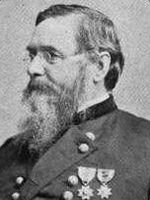 |
Potter, Joseph Haydn Joseph H. Potter Joseph Haydn Potter was a career soldier from the state of New Hampshire who served as a general in the Union Army during the American Civil War. He was twice a prisoner of war and was cited for gallantry on multiple occasions.-Early life and career:Potter born in Concord, New Hampshire, on... |
Major, USA (1863) Brigadier General, USV (May 1, 1865) |
Brigadier General, USA (March 13, 1865) |
USMA, 1843 |
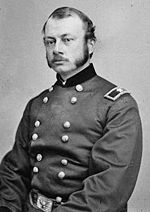 |
Potter, Robert Brown Robert Brown Potter Robert Brown Potter was a United States lawyer and a Union Army general in the American Civil War.-Early life:... |
Major General, USV (September 29, 1865) |
||
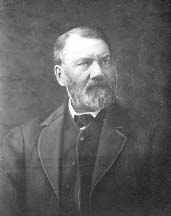 |
Potts, Benjamin Franklin Benjamin F. Potts Benjamin Franklin Potts was a lawyer, politician, and soldier from the state of Ohio who served as a general in the Union Army during the American Civil War, as well as a postbellum Governor of the Montana Territory from 1870 to 1883... |
Brigadier General, USV (January 12, 1865) |
Major General, USV (March 13, 1865) |
Territorial Governor of Montana (1870-1883) |
| Powell, William Henry | Brigadier General, USV (October 19, 1864) |
Major General, USV (March 13, 1865) |
CMOH for actions at Sinking Creek Sinking Creek (Virginia) -References:**USGS Hydrologic Unit Map - State of Virginia... (November 26, 1862) Resigned January 5, 1865 |
|
| Pratt, Calvin Edward | Brigadier General, USV (September 13, 1862) |
Resigned April 25, 1863 | ||
 |
Prentiss, Benjamin Mayberry Benjamin Prentiss Benjamin Mayberry Prentiss was an American soldier and politician. He fought in the Mexican-American War and on the Union side of the American Civil War, rising to the rank of major general.... |
Major General, USV (November 29, 1862) |
Resigned October 28, 1863 | |
| Prescott, George Lincoln | Colonel, USV | Brigadier General, USV (June 18, 1864) |
DOW, Second Battle of Petersburg (w. June 18, 1864, d. June 19, 1864) | |
| Prince, Henry | Major, USA (1855) Brigadier General, USV (April 20, 1862) |
Brigadier General, USA (March 13, 1865) |
USMA, 1835 |
Q
| Image | Name | Substantive Rank | Brevet Brevet (military) In many of the world's military establishments, brevet referred to a warrant authorizing a commissioned officer to hold a higher rank temporarily, but usually without receiving the pay of that higher rank except when actually serving in that role. An officer so promoted may be referred to as being... Rank | Quinby, Isaac Ferdinand Isaac Ferdinand Quinby Isaac Ferdinand Quinby was a U.S. soldier and Union general during the American Civil War.-Biography:Quinby was born near Morristown, New Jersey in 1821. He attended the United States Military Academy at West Point and graduated in 1843, ranking 6 out of 39 classmates. His early service in the... | Brigadier General, USV (March 17, 1862) |
USMA, 1843 Resigned, December 31, 1863 |
|---|
R
| Image | Name | Substantive Rank | Brevet Brevet (military) In many of the world's military establishments, brevet referred to a warrant authorizing a commissioned officer to hold a higher rank temporarily, but usually without receiving the pay of that higher rank except when actually serving in that role. An officer so promoted may be referred to as being... Rank | Ransom, Thomas Edward Greenfield Thomas E. G. Ransom Thomas Edwin Greenfield Ransom was a surveyor, civil engineer, real estate speculator, and a general in the Union Army during the American Civil War.-Biography:... | Brigadier General, USV (November 29, 1862) |
Major General, USV (September 1, 1864) |
Died October 29, 1864 |
|---|---|---|---|---|---|---|---|
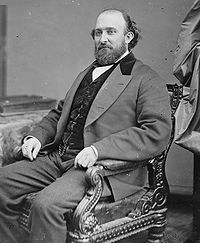 |
Raum, Green Berry | Brigadier General, USV (February 15, 1865) |
|||||
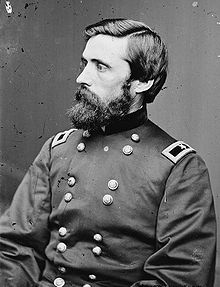 |
Rawlins, John Aaron John Aaron Rawlins John Aaron Rawlins was an United States Army general during the American Civil War, a confidant of Ulysses S. Grant, and later U.S. Secretary of War.-Biography:... |
Brigadier General, USA (March 3, 1865) |
Major General, USA (April 9, 1865) Major General, USV (February 24, 1865) |
Chief of Staff Chief of Staff The title, chief of staff, identifies the leader of a complex organization, institution, or body of persons and it also may identify a Principal Staff Officer , who is the coordinator of the supporting staff or a primary aide to an important individual, such as a president.In general, a chief of... to General Ulysses S. Grant Ulysses S. Grant Ulysses S. Grant was the 18th President of the United States as well as military commander during the Civil War and post-war Reconstruction periods. Under Grant's command, the Union Army defeated the Confederate military and ended the Confederate States of America... Secretary of War United States Secretary of War The Secretary of War was a member of the United States President's Cabinet, beginning with George Washington's administration. A similar position, called either "Secretary at War" or "Secretary of War," was appointed to serve the Congress of the Confederation under the Articles of Confederation... (1869) |
|||
| Read, Theodore | Lieutenant Colonel, USV | Brigadier General, USV (September 29, 1864) |
KIA, Battle of High Bridge Battle of High Bridge The Battle of High Bridge was fought on April 6–7, 1865, near the end of the Appomattox Campaign of the American Civil War. On April 6, the Confederate cavalry fought stubbornly to secure the Appomattox River bridges. On April 7, elements of the Union II Corps came up against Lt. Gen. James... (April 6, 1865) |
||||
| Reid, Hugh Thompson Hugh Thompson Reid Hugh Thompson Reid was a lawyer, president of the Des Moines Valley Railroad and Union general during the American Civil War.-Early life:... |
Brigadier General, USV (April 9, 1863) |
Resigned April 4, 1864 | |||||
| Reilly, James William James W. Reilly James William Reilly was a lawyer, politician, and soldier from the state of Ohio who served as a general in the Union Army during the American Civil War... |
Brigadier General, USV (July 30, 1864) |
Resigned April 20, 1865 | |||||
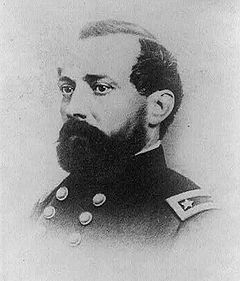 |
Reno, Jesse Lee Jesse L. Reno Jesse Lee Reno was a career United States Army officer who served in the Mexican-American War, the western frontier, and as a Union General during the American Civil War... |
Captain, USA Major General, USV (July 18, 1862) |
USMA, 1846 KIA, Battle of South Mountain Battle of South Mountain The Battle of South Mountain was fought September 14, 1862, as part of the Maryland Campaign of the American Civil War. Three pitched battles were fought for possession of three South Mountain passes: Crampton's, Turner's, and Fox's Gaps. Maj. Gen. George B... (September 14, 1862) |
||||
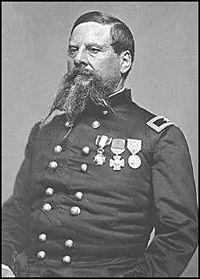 |
Revere, Joseph Warren Joseph W. Revere Joseph Warren Revere was a career United States Army officer. He is known for being a Union brigadier general during the Civil War, his embarrassment at the Battle of Chancellorsville and for his notable family.... |
Brigadier General, USV (October 25, 1862) |
Forced to resign August 10, 1863 Grandson of Paul Revere Paul Revere Paul Revere was an American silversmith and a patriot in the American Revolution. He is most famous for alerting Colonial militia of approaching British forces before the battles of Lexington and Concord, as dramatized in Henry Wadsworth Longfellow's poem, Paul Revere's Ride... Cousin of Paul Joseph Revere |
||||
| Revere, Paul Joseph | Colonel, USV | Brigadier General, USV (July 2, 1863) |
DOW, Battle of Gettysburg Battle of Gettysburg The Battle of Gettysburg , was fought July 1–3, 1863, in and around the town of Gettysburg, Pennsylvania. The battle with the largest number of casualties in the American Civil War, it is often described as the war's turning point. Union Maj. Gen. George Gordon Meade's Army of the Potomac... (w. July 2, 1863, d. July 4, 1863) Grandson of Paul Revere Paul Revere Paul Revere was an American silversmith and a patriot in the American Revolution. He is most famous for alerting Colonial militia of approaching British forces before the battles of Lexington and Concord, as dramatized in Henry Wadsworth Longfellow's poem, Paul Revere's Ride... Cousin of Joseph Warren Revere Joseph W. Revere Joseph Warren Revere was a career United States Army officer. He is known for being a Union brigadier general during the Civil War, his embarrassment at the Battle of Chancellorsville and for his notable family.... |
||||
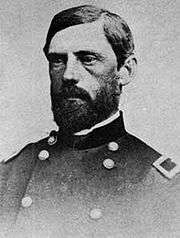 |
Reynolds, John Fulton John F. Reynolds John Fulton Reynolds was a career United States Army officer and a general in the American Civil War. One of the Union Army's most respected senior commanders, he played a key role in committing the Army of the Potomac to the Battle of Gettysburg and was killed at the start of the battle.-Early... |
Lieutenant Colonel, USA (May 14, 1861) Major General, USV (November 29, 1862) |
USMA, 1841 Superintendent, USMA (1860-1861) KIA, Battle of Gettysburg Battle of Gettysburg The Battle of Gettysburg , was fought July 1–3, 1863, in and around the town of Gettysburg, Pennsylvania. The battle with the largest number of casualties in the American Civil War, it is often described as the war's turning point. Union Maj. Gen. George Gordon Meade's Army of the Potomac... (July 1, 1863) |
||||
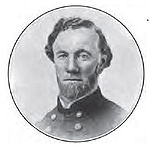 |
Reynolds, Joseph Jones Joseph J. Reynolds Joseph Jones Reynolds was an American engineer, educator, and military officer who fought in the American Civil War and the postbellum Indian Wars.-Early life and career:Reynolds was born in Flemingsburg, Kentucky... |
Major General, USV (November 29, 1862) |
USMA, 1843 | ||||
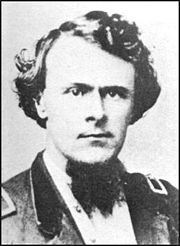 |
Rice, Americus Vespucuis Americus V. Rice Americus Vespucius Rice was a nineteenth century politician, banker, and businessman from Ohio. He served in the Union Army during the American Civil War and was promoted to brigadier general at the end of the war.... |
Brigadier General, USV (May 31, 1865) |
U.S. Congressman from Ohio Ohio Ohio is a Midwestern state in the United States. The 34th largest state by area in the U.S.,it is the 7th‑most populous with over 11.5 million residents, containing several major American cities and seven metropolitan areas with populations of 500,000 or more.The state's capital is Columbus... (1875-1879) |
||||
 |
Rice, Elliott Warren Elliott Warren Rice Elliott Warren Rice was a general in the Union Army during the American Civil War. He commanded an infantry brigade during the pivotal Atlanta Campaign in the summer of 1864.-Early life:... |
Brigadier General, USV (June 22, 1864) |
Major General, USV (March 13, 1865) |
Brother of Samuel Allen Rice Samuel Allen Rice Samuel Allen Rice was born in Cattaraugus, New York. He lived in Mahaska County, Iowa where he practiced law, was county attorney, and state attorney general . In the American Civil War, he was a colonel in the 33rd regiment of Iowa... |
|||
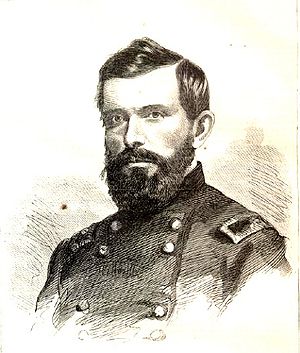 |
Rice, James Clay James Clay Rice James Clay Rice was a lawyer from Massachusetts, who became a brigadier general of volunteers in the Union Army during the American Civil War.-Early life:... |
Brigadier General, USV (August 17, 1863) |
KIA, Battle of Spotsylvania (May 10, 1864) | ||||
| Rice, Samuel Allen Samuel Allen Rice Samuel Allen Rice was born in Cattaraugus, New York. He lived in Mahaska County, Iowa where he practiced law, was county attorney, and state attorney general . In the American Civil War, he was a colonel in the 33rd regiment of Iowa... |
Brigadier General, USV (August 4,1863) |
DOW, Battle of Jenkins' Ferry Battle of Jenkins' Ferry The Battle of Jenkins' Ferry was fought April 30, 1864, in Grant County, Arkansas during the American Civil War. It was the climactic battle of the Camden Expedition, which was a part of the Union Army’s failed Red River Campaign. Each side sustained a large number of casualties, especially... (w. April 30, 1864, d. July 6, 1864) Brother of Elliott Warren Rice Elliott Warren Rice Elliott Warren Rice was a general in the Union Army during the American Civil War. He commanded an infantry brigade during the pivotal Atlanta Campaign in the summer of 1864.-Early life:... |
|||||
| Richardson, Israel Bush Israel B. Richardson Israel Bush Richardson was a United States Army officer during the Mexican-American War and American Civil War, where he was a major general in the Union Army... |
Major General, USV (July 4, 1862) |
USMA, 1841 DOW, Battle of Antietam Battle of Antietam The Battle of Antietam , fought on September 17, 1862, near Sharpsburg, Maryland, and Antietam Creek, as part of the Maryland Campaign, was the first major battle in the American Civil War to take place on Northern soil. It was the bloodiest single-day battle in American history, with about 23,000... (w. September 17, 1862, d. November 3, 1862) |
|||||
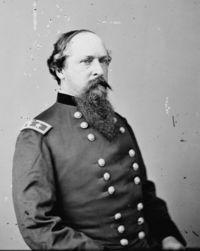 |
Ricketts, James Brewerton James B. Ricketts James Brewerton Ricketts was a career officer in the United States Army, serving as a Union Army general in the Eastern Theater during the American Civil War.-Early life and career:... |
Major, USA Brigadier General, USV (July 21, 1861) |
Major General, USA (March 13, 1865) Major General, USV (August 1, 1864) |
USMA, 1839 | |||
| Rinaker, John Irving John I. Rinaker John Irving Rinaker was a U.S. Representative from Illinois and a brigade commander in the Union Army during the American Civil War.... |
Colonel, USV (September 4, 1862) |
Brigadier General, USV (March 13, 1865) |
U.S. Congressman from Illinois Illinois Illinois is the fifth-most populous state of the United States of America, and is often noted for being a microcosm of the entire country. With Chicago in the northeast, small industrial cities and great agricultural productivity in central and northern Illinois, and natural resources like coal,... (1896-1897) |
||||
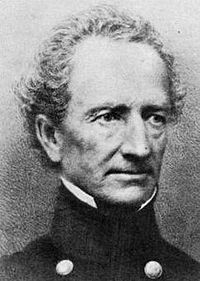 |
Ripley, James Wolfe James Wolfe Ripley James Wolfe Ripley was an American soldier, serving as a brigadier general in the Union Army during the Civil War. He was instrumental in the early days of the war in modernizing the artillery's ordnance. However, Ripley also delayed the introduction of repeating rifles into U.S... |
Brigadier General, USA (August 3, 1861) |
Major General, USA (March 13, 1865) |
USMA, 1814 Chief of Ordnance (1861-1863) Uncle of General Roswell Sabine Ripley Roswell S. Ripley Roswell Sabine Ripley was an officer in the United States Army during the Mexican-American War and, despite being Northern-born, a brigadier general in the Confederate States Army during the Civil War... , CSA |
|||
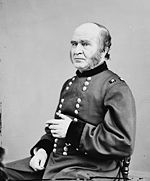 |
Roberts, Benjamin Stone Benjamin S. Roberts Benjamin Stone Roberts was an American lawyer, civil engineer, and a general in the Union Army during the American Civil War.-Early life:... |
Major, USA (May 13, 1861) Brigadier General, USV (July 16, 1862) |
Brigadier General, USA (March 13, 1865) Major General, USV (March 13, 1865) |
USMA, 1835 | |||
| Robinson, James Sidney James S. Robinson James Sidney Robinson was a U.S. Representative from Ohio and a general in the Union Army during the American Civil War.-Early life and career:... |
Brigadier General, USV (January 12, 1865) |
U.S. Congressman from Ohio Ohio Ohio is a Midwestern state in the United States. The 34th largest state by area in the U.S.,it is the 7th‑most populous with over 11.5 million residents, containing several major American cities and seven metropolitan areas with populations of 500,000 or more.The state's capital is Columbus... (1881-1885) |
|||||
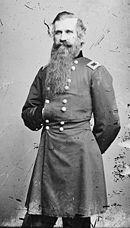 |
Robinson, John Cleveland John C. Robinson John Cleveland Robinson had a long and distinguished career in the United States Army, fighting in numerous wars and culminating his career as a Union Army brigadier general of volunteers and brevet major general of volunteers in the American Civil War. In 1866, President Andrew Johnson nominated... |
Captain, USA Brigadier General, USV (April 28, 1861) |
Major General, USA Major General, USV |
CMOH, Battle of Laurel Hill (May 8, 1864) USMA (class of 1839), dismissed 1836 Commander-in-chief, GAR (1877-1879) |
|||
| Robinson, Milton Stapp Milton S. Robinson Milton Stapp Robinson was an Indiana lawyer, politician, judge, and soldier. He was a brigade commander in the Union Army during the American Civil War and a postbellum U.S. Representative.-Biography:... |
Colonel, USV | Brigadier General, USV (March 13, 1865) |
U.S. Congressman from Indiana Indiana Indiana is a US state, admitted to the United States as the 19th on December 11, 1816. It is located in the Midwestern United States and Great Lakes Region. With 6,483,802 residents, the state is ranked 15th in population and 16th in population density. Indiana is ranked 38th in land area and is... (1875-1879) |
||||
| Rodman, Isaac Peace Isaac P. Rodman Isaac Peace Rodman was a Rhode Island banker and politician, and a Union Army brigadier general in the American Civil War, mortally wounded at the Battle of Antietam.-Early life and career:... |
Brigadier General, USV (April 28, 1862) |
DOW, Battle of Antietam Battle of Antietam The Battle of Antietam , fought on September 17, 1862, near Sharpsburg, Maryland, and Antietam Creek, as part of the Maryland Campaign, was the first major battle in the American Civil War to take place on Northern soil. It was the bloodiest single-day battle in American history, with about 23,000... (w. September 17, 1862, d. September 30, 1862) |
|||||
| Rogers, William Findlay William Findlay Rogers William Findlay Rogers was a member of the U.S. House of Representatives from New York.Rogers is probably best remembered today as the mayor and parks commissioner who hired Frederick Law Olmsted to design Buffalo's park system and its showpiece, Delaware Park... |
Colonel, USV | Brigadier General, USV (March 13, 1865) |
Resigned, 1863 U.S. Congressman from New York New York New York is a state in the Northeastern region of the United States. It is the nation's third most populous state. New York is bordered by New Jersey and Pennsylvania to the south, and by Connecticut, Massachusetts and Vermont to the east... (1883-1885) |
||||
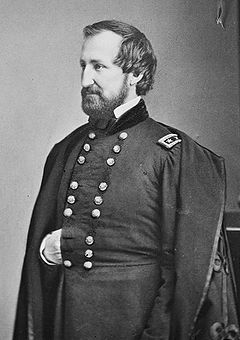 |
Rosecrans, William Starke | Brigadier General, USA (May 16, 1861) Major General, USV (March 21, 1862) |
USMA, 1842 Rejected original appointment as Major General, USV (September 17, 1862) Received the Thanks of Congress Thanks of Congress The Thanks of Congress are a series of formal resolutions passed by the United States Congress originally to extend the government's formal thanks for significant victories or impressive actions by American military commanders and their troops. Although it began during the American Revolutionary... (March 3, 1863) U.S. minister to Mexico United States Ambassador to Mexico The United States has maintained diplomatic relations with Mexico since 1823, when Andrew Jackson was appointed Envoy Extraordinary and Minister Plenipotentiary to that country. Jackson declined the appointment, however, and Joel R. Poinsett became the first U.S. envoy to Mexico in 1825. The rank... (1868-1869) U.S. Congressman from California California California is a state located on the West Coast of the United States. It is by far the most populous U.S. state, and the third-largest by land area... (1881-1885) |
||||
| Ross, Leonard Fulton Leonard Fulton Ross Leonard Fulton Ross was an American soldier, lawyer and judge who served in the Mexican-American War and as a general during the American Civil War.-Biography:... |
Brigadier General, USV (April 26, 1862) |
Resigned July 22, 1863 | |||||
| Rousseau, Lovell Harrison Lovell Rousseau Lovell Harrison Rousseau was a general in the United States and Union Armies during the American Civil War and a lawyer and politician in both Kentucky and Indiana.-Early life and career:... |
Major General, USV (October 8, 1862) |
U.S. Congressman from Kentucky Kentucky The Commonwealth of Kentucky is a state located in the East Central United States of America. As classified by the United States Census Bureau, Kentucky is a Southern state, more specifically in the East South Central region. Kentucky is one of four U.S. states constituted as a commonwealth... (1865-1866, 1866-1867) Father-in-law of Louis Douglass Watkins |
|||||
| Rowley, Thomas Algeo Thomas Algeo Rowley Thomas Algeo Rowley was a Union Army general in the American Civil War from Pittsburgh, Pennsylvania.-Early life:... |
Brigadier General, USV (November 29, 1862) |
Convicted by Court-martial Court-martial A court-martial is a military court. A court-martial is empowered to determine the guilt of members of the armed forces subject to military law, and, if the defendant is found guilty, to decide upon punishment.Most militaries maintain a court-martial system to try cases in which a breach of... (April 23, 1864) for actions at the Battle of Gettysburg Battle of Gettysburg The Battle of Gettysburg , was fought July 1–3, 1863, in and around the town of Gettysburg, Pennsylvania. The battle with the largest number of casualties in the American Civil War, it is often described as the war's turning point. Union Maj. Gen. George Gordon Meade's Army of the Potomac... ; Conviction overturned by Secretary of War United States Secretary of War The Secretary of War was a member of the United States President's Cabinet, beginning with George Washington's administration. A similar position, called either "Secretary at War" or "Secretary of War," was appointed to serve the Congress of the Confederation under the Articles of Confederation... Edwin Stanton Resigned December 29, 1864 |
|||||
| Rucker, Daniel Henry | Major, USA (August, 1861) Brigadier General, USV (May 23, 1863) |
Major General, USA (March 13, 1865) Major General, USV (March 13, 1865) |
|||||
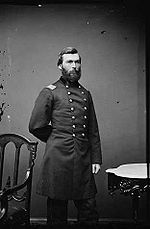 |
Ruger, Thomas Howard Thomas H. Ruger Thomas Howard Ruger was an American soldier and lawyer who served as a Union general in the American Civil War. After the war, he was a superintendent of the United States Military Academy at West Point, New York.... |
Brigadier General, USV (November 29, 1862) |
Major General, USV (November 30, 1864) |
USMA, 1854 Military Governor of Georgia (1868) Superintendent, USMA (1871-1876) |
|||
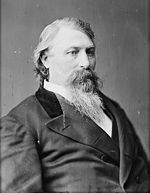 |
Rusk, Jeremiah McLain Jeremiah McLain Rusk Jeremiah McLain Rusk was the 15th Governor of the U.S. state of Wisconsin from 1882 to 1889 and the U.S. Secretary of Agriculture from 1889 to 1893.-Biography:... |
Lieutenant Colonel, USV | Brigadier General, USV (March 13, 1865) |
U. S. Congressman from Wisconsin Wisconsin Wisconsin is a U.S. state located in the north-central United States and is part of the Midwest. It is bordered by Minnesota to the west, Iowa to the southwest, Illinois to the south, Lake Michigan to the east, Michigan to the northeast, and Lake Superior to the north. Wisconsin's capital is... (1871-1877) Governor of Wisconsin Governor of Wisconsin The Governor of Wisconsin is the highest executive authority in the government of the U.S. state of Wisconsin. The position was first filled by Nelson Dewey on June 7, 1848, the year Wisconsin became a state... (1882-1889) Secretary of Agriculture United States Secretary of Agriculture The United States Secretary of Agriculture is the head of the United States Department of Agriculture. The current secretary is Tom Vilsack, who was confirmed by the U.S. Senate on 20 January 2009. The position carries similar responsibilities to those of agriculture ministers in other... (1889-1893) |
|||
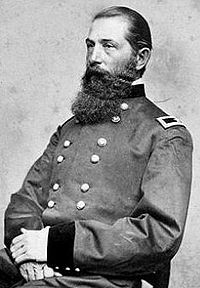 |
Russell, David Allen David Allen Russell David Allen Russell was a career United States Army officer who served in the Mexican-American War and the American Civil War. He was killed in action as a brigadier general in the Union Army.-Early life:... |
Major, USA (1862) Brigadier General, USV (November 29, 1862) |
Major General, USA | USMA, 1845 KIA, Battle of Opequon Battle of Opequon The Battle of Opequon, more commonly known as the Third Battle of Winchester, was fought in Winchester, Virginia, on September 19, 1864, during the Valley Campaigns of 1864 in the American Civil War.... (September 19, 1864) |
S
| Image | Name | Substantive Rank | Brevet Brevet (military) In many of the world's military establishments, brevet referred to a warrant authorizing a commissioned officer to hold a higher rank temporarily, but usually without receiving the pay of that higher rank except when actually serving in that role. An officer so promoted may be referred to as being... Rank | Battle of Trevilian Station Battle of Trevilian Station The Battle of Trevilian Station was fought on June 11–12, 1864, in Union Lt. Gen. Ulysses S. Grant's Overland Campaign against Confederate Gen. Robert E. Lee's Army of Northern Virginia. Union cavalry under Maj. Gen. Philip Sheridan fought against Confederate cavalry under Maj. Gens... (w. June 11, 1864, d. June 14, 1864) |
|---|---|---|---|---|
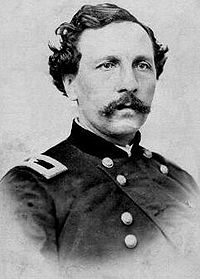 |
Salomon, Frederick C. Frederick C. Salomon Frederick C. Salomon was a German immigrant to the United States who served as a Union brigadier general in the American Civil War.-Biography:He was born in Stroebeck near Halberstadt, Prussia... (aka Salomon, Friedrich) |
Brigadier General, USV (July 16, 1862) |
Major General, USV (March 13, 1865) |
Brother of Wisconsin Governor Governor of Wisconsin The Governor of Wisconsin is the highest executive authority in the government of the U.S. state of Wisconsin. The position was first filled by Nelson Dewey on June 7, 1848, the year Wisconsin became a state... Edward Salomon Edward Salomon Edward Salomon was the eighth Governor of Wisconsin during the Civil War after the accidental drowning of his predecessor, Louis P. Harvey.Salomon was born in Ströbeck, Prussian Saxony... |
 |
Sanborn, John Benjamin John B. Sanborn John Benjamin Sanborn was a lawyer, politician, and soldier from the state of New Hampshire who served as a general in the Union Army during the American Civil War... |
Brigadier General, USV (August 4, 1863) |
Major General, USV (February 10, 1865) |
|
| Sanders, William Price William P. Sanders William Price Sanders was an officer in the Union Army in the American Civil War, who died at the Siege of Knoxville.-Birth and early years:... |
Captain, USA (May 14, 1861) Brigadier General, USV (October 18, 1863) |
USMA, 1856 DOW, Siege of Knoxville (w. November 18, 1863, d. November 19, 1863) |
||
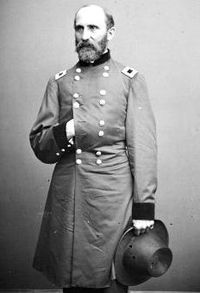 |
Saxton, Rufus Rufus Saxton Rufus Saxton was a Union Army brigadier general during the American Civil War who received America's highest military decoration, the Medal of Honor, for his actions defending Harper's Ferry during Confederate General Jackson's Valley Campaign.-Early life:Saxton was born in Greenfield, Massachusetts... |
Captain, USA (May 13, 1861) Brigadier General, USV (April 15, 1862) |
Brigadier General, USA (April 9, 1865) Major General, USV (January 12, 1865) |
USMA, 1849 CMOH for defense of Harper's Ferry Harpers Ferry, West Virginia Harpers Ferry is a historic town in Jefferson County, West Virginia, United States. In many books the town is called "Harper's Ferry" with an apostrophe.... during Jackson's Valley Campaign (May 26-30, 1863) |
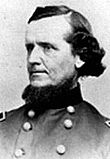 |
Scammon, Eliakim Parker Eliakim P. Scammon Eliakim Parker Scammon was a career officer in the United States Army, serving as a brigadier general in the Union Army during the American Civil War.-Early life and career:... |
Brigadier General, USV (October 15, 1862) |
USMA, 1837 | |
 |
Schenck, Robert Cumming Robert C. Schenck Robert Cumming Schenck was a Union Army general in the American Civil War, and American diplomatic representative to Brazil and the United Kingdom. He was at both battles of Bull Run and took part in the Shenandoah Valley Campaign of 1862, and the Battle of Cross Keys... |
Major General, USV (August 30, 1862) |
Resigned December 5, 1863 U.S. Congressman from Ohio Ohio Ohio is a Midwestern state in the United States. The 34th largest state by area in the U.S.,it is the 7th‑most populous with over 11.5 million residents, containing several major American cities and seven metropolitan areas with populations of 500,000 or more.The state's capital is Columbus... (1843-1851, 1863-1871) U.S. minister to Brazil United States Ambassador to Brazil The following is a list of Ambassadors of the United States, or other chiefs of mission, to Brazil. The title given by the United States State Department to this position is currently Ambassador Extraordinary and Minister Plenipotentiary.-See also:... (1851-1853) U.S. minister to the Court of St. James United States Ambassador to the United Kingdom The office of United States Ambassador to the United Kingdom was traditionally, and still is very much so today due to the Special Relationship, the most prestigious position in the United States Foreign Service... (1871-1876) |
|
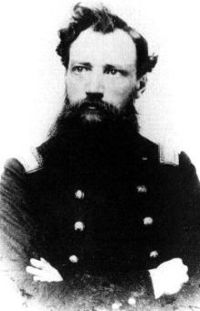 |
Schimmelfennig, Alexander Alexander Schimmelfennig Alexander Schimmelfennig was a German soldier and political revolutionary, and then an American Civil War general in the Union Army.-Early life and career:... |
Brigadier General, USV (November 29, 1862) |
Died of tuberculosis Tuberculosis Tuberculosis, MTB, or TB is a common, and in many cases lethal, infectious disease caused by various strains of mycobacteria, usually Mycobacterium tuberculosis. Tuberculosis usually attacks the lungs but can also affect other parts of the body... September 5, 1865 |
|
| Schoepf, Albin Francisco | Brigadier General, USV (September 30, 1861) |
|||
 |
Schofield, John McAllister John Schofield John McAllister Schofield was an American soldier who held major commands during the American Civil War. He later served as U.S. Secretary of War and Commanding General of the United States Army.-Early life:... |
Brigadier General, USA (November 30, 1864) Major General, USV (November 29, 1862) |
Major General, USA (March 13, 1865) |
USMA, 1853 CMOH, Battle of Wilson's Creek Battle of Wilson's Creek The Battle of Wilson's Creek, also known as the Battle of Oak Hills, was fought on August 10, 1861, near Springfield, Missouri, between Union forces and the Missouri State Guard, early in the American Civil War. It was the first major battle of the war west of the Mississippi River and is sometimes... (August 10, 1861) Secretary of War United States Secretary of War The Secretary of War was a member of the United States President's Cabinet, beginning with George Washington's administration. A similar position, called either "Secretary at War" or "Secretary of War," was appointed to serve the Congress of the Confederation under the Articles of Confederation... (1868-1869) Superintendent, USMA (1776-1881) General-in-Chief Commanding General of the United States Army Prior to the institution of the Chief of Staff of the United States Army in 1903, there was generally a single senior-most officer in the army. From 1783, he was known simply as the Senior Officer of the United States Army, but in 1821, the title was changed to Commanding General of the United... of the U.S. Army (1888–1895) Commander-in-chief, MOLLUS (1899-1903) |
 |
Schurz, Carl Carl Schurz Carl Christian Schurz was a German revolutionary, American statesman and reformer, and Union Army General in the American Civil War. He was also an accomplished journalist, newspaper editor and orator, who in 1869 became the first German-born American elected to the United States Senate.His wife,... |
Major General, USV (March 14, 1863) |
Resigned May 6, 1865 U.S. minister to Spain United States Ambassador to Spain -Ambassadors:*John Jay**Appointed: September 29, 1779**Title: Minister Plenipotentiary**Presented credentials:**Terminated mission: ~May 20, 1782*William Carmichael**Appointed: April 20, 1790**Title: Chargé d'Affaires... (1861) U.S. Senator from Missouri Missouri Missouri is a US state located in the Midwestern United States, bordered by Iowa, Illinois, Kentucky, Tennessee, Arkansas, Oklahoma, Kansas and Nebraska. With a 2010 population of 5,988,927, Missouri is the 18th most populous state in the nation and the fifth most populous in the Midwest. It... (1869-1875) Secretary of the Interior United States Secretary of the Interior The United States Secretary of the Interior is the head of the United States Department of the Interior.The US Department of the Interior should not be confused with the concept of Ministries of the Interior as used in other countries... (1877-1881) |
|
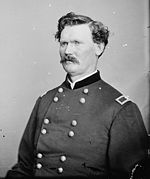 |
Scott, Robert Kingston Robert Kingston Scott Robert Kingston Scott was an American Republican politician, the 74th Governor of South Carolina, and an officer in the Union Army during the American Civil War.-Early life and career:... |
Brigadier General, USV (January 12, 1865) |
Major General, USV (December 5, 1865) |
Governor of South Carolina Governor of South Carolina The Governor of the State of South Carolina is the head of state for the State of South Carolina. Under the South Carolina Constitution, the Governor is also the head of government, serving as the chief executive of the South Carolina executive branch. The Governor is the ex officio... (1868-1872) |
 |
Scott, Winfield Winfield Scott Winfield Scott was a United States Army general, and unsuccessful presidential candidate of the Whig Party in 1852.... |
Major General, USA (June 25, 1841) |
Lieutenant General, USA (March 29, 1847) |
Retired November 1, 1861 General-in-Chief Commanding General of the United States Army Prior to the institution of the Chief of Staff of the United States Army in 1903, there was generally a single senior-most officer in the army. From 1783, he was known simply as the Senior Officer of the United States Army, but in 1821, the title was changed to Commanding General of the United... (1841-1861) Twice received the Congressional Gold Medal (November 3, 1814; March 9, 1848) Author of the Anaconda Plan Anaconda Plan The Anaconda Plan or Scott's Great Snake is the name widely applied to an outline strategy for subduing the seceding states in the American Civil War. Proposed by General-in-Chief Winfield Scott, the plan emphasized the blockade of the Southern ports, and called for an advance down the Mississippi... to defeat the Confederacy |
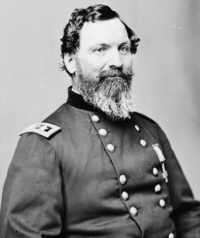 |
Sedgwick, John John Sedgwick John Sedgwick was a teacher, a career military officer, and a Union Army general in the American Civil War. He was the highest ranking Union casualty in the Civil War, killed by a sniper at the Battle of Spotsylvania Court House.-Early life:Sedgwick was born in the Litchfield Hills town of... |
Colonel, USA (April 25, 1861) Major General, USV (July 4, 1862) |
USMA, 1837 KIA, Battle of Spotsylvania Court House Battle of Spotsylvania Court House The Battle of Spotsylvania Court House, sometimes simply referred to as the Battle of Spotsylvania , was the second major battle in Lt. Gen. Ulysses S. Grant's 1864 Overland Campaign of the American Civil War. Following the bloody but inconclusive Battle of the Wilderness, Grant's army disengaged... (May 9, 1864) Highest-ranked Union general killed in action |
|
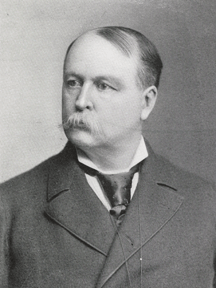 |
Sewell, William Joyce William Joyce Sewell William Joyce Sewell was born in Castlebar, County Mayo, Ireland immigrating to the United States in 1851 where he worked in the merchant industry in Chicago, Illinois before moving to Camden, New Jersey in 1860... |
Colonel, USV (October 1, 1864) |
Major General, USV (March 13, 1865) |
CMOH, Battle of Chancellorsville Battle of Chancellorsville The Battle of Chancellorsville was a major battle of the American Civil War, and the principal engagement of the Chancellorsville Campaign. It was fought from April 30 to May 6, 1863, in Spotsylvania County, Virginia, near the village of Chancellorsville. Two related battles were fought nearby on... (May 3, 1863) U.S. Senator from New Jersey New Jersey New Jersey is a state in the Northeastern and Middle Atlantic regions of the United States. , its population was 8,791,894. It is bordered on the north and east by the state of New York, on the southeast and south by the Atlantic Ocean, on the west by Pennsylvania and on the southwest by Delaware... (1881-1887, 1895-1901) |
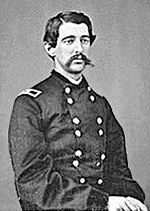 |
Seward, William Henry, Jr. William H. Seward, Jr. William Henry Seward, Jr. was born in Auburn, New York, the son of United States Secretary of State William Henry Seward, Sr... |
Brigadier General, USV (September 13, 1864) |
Resigned June 1, 1865 Son of Secretary of State William Henry Seward William H. Seward William Henry Seward, Sr. was the 12th Governor of New York, United States Senator and the United States Secretary of State under Abraham Lincoln and Andrew Johnson... |
|
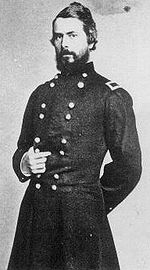 |
Seymour, Truman Truman Seymour Truman Seymour was an a career soldier and an accomplished painter. He served in the Union Army during the American Civil War, rising to the rank of major general. He commanded the Union troops at the Battle of Olustee, the largest Civil War battle fought in Florida.-Early life and career:Seymour... |
Captain, USA (November 22, 1860 Brigadier General, USV (April 28, 1862) |
Major General, USA (March 13, 1865) Major General, USV (March 13, 1865) |
USMA, 1846 |
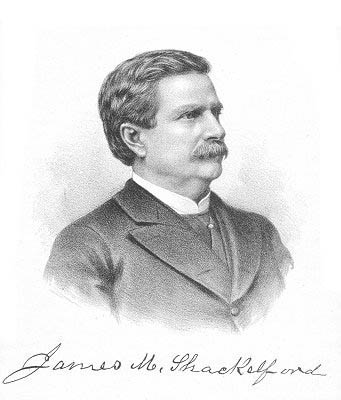 |
Shackelford, James Murrell James M. Shackelford James Murrell Shackelford was a lawyer, judge, and general in the Union Army during the American Civil War... |
Brigadier General, USV (January 2, 1863) |
Resigned January 18, 1864 | |
| Shaffer, John Wilson John Shaffer John Wilson Shaffer was an American political leader. Born in Lewisburg, Pennsylvania, Shaffer was active in Republican poliitics in Illinois and served in the Union Army during the American Civil War. He was appointed governor of the territory of Utah by President Ulysses S. Grant... |
Colonel, USV (January 20, 1862) |
Brigadier General, USV (March 13, 1865) |
Territorial Governor of Utah (1870) | |
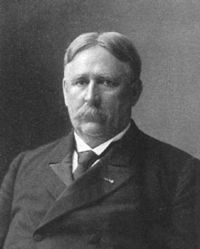 |
Shafter, William Rufus William Rufus Shafter William Rufus Shafter was a Union Army officer during the American Civil War who received America's highest military decoration, the Medal of Honor, for his actions at the Battle of Fair Oaks. Shafter also played a prominent part as a major general in the Spanish-American War... |
Colonel, USV (April 19, 1864) |
Brigadier General, USV (March 13, 1865) |
CMOH, Battle of Seven Pines Battle of Seven Pines The Battle of Seven Pines, also known as the Battle of Fair Oaks or Fair Oaks Station, took place on May 31 and June 1, 1862, in Henrico County, Virginia, as part of the Peninsula Campaign of the American Civil War. It was the culmination of an offensive up the Virginia Peninsula by Union Maj. Gen.... (May 31, 1862) |
| Shaler, Alexander Alexander Shaler Alexander Shaler was a Union Army general in the American Civil War. He received the United States military's highest decoration, the Medal of Honor, for his actions at the Second Battle of Fredericksburg... |
Brigadier General, USV (May 26, 1863) |
Major General, USV (July 27, 1863) |
CMOH, Second Battle of Fredericksburg (May 3, 1863) | |
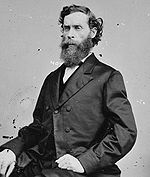 |
Shanks, John Peter Cleaver John P. C. Shanks John Peter Cleaver Shanks was a U.S. Representative from Indiana.-Biography:Born in Martinsburg, Virginia , Shanks pursued an academic course. He studied law and was admitted to the bar in 1848 and commenced practice in Portland, Indiana, in 1849... |
Colonel, USV (September 20, 1861) |
Major General, USV (March 13, 1865) |
U.S. Congressman from Indiana Indiana Indiana is a US state, admitted to the United States as the 19th on December 11, 1816. It is located in the Midwestern United States and Great Lakes Region. With 6,483,802 residents, the state is ranked 15th in population and 16th in population density. Indiana is ranked 38th in land area and is... (1861-1863, 1867-1875) |
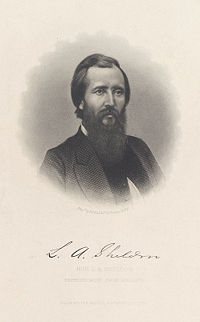 |
Sheldon, Lionel Allen Lionel Allen Sheldon Lionel Allen Sheldon was a U.S. Representative from Louisiana. He was Governor of New Mexico Territory from 1881 to 1885.-Early life:Born in Worcester, New York, Sheldon moved with his parents to Lagrange, Ohio... |
Colonel, USV (March 14, 1862) |
Brigadier General, USV (March 13, 1865) |
Mustered out December 2, 1864 U.S. Congressman from Louisiana Louisiana Louisiana is a state located in the southern region of the United States of America. Its capital is Baton Rouge and largest city is New Orleans. Louisiana is the only state in the U.S. with political subdivisions termed parishes, which are local governments equivalent to counties... (1869-1875) Territorial Governor of New Mexico (1881-1885) |
| Shepard, Isaac Fitzgerald | Brigadier General, USV (October 27, 1863) |
Appointment expired July 4, 1864 | ||
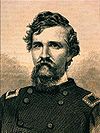 |
Shepley, George Foster | Brigadier General, USV (July 18, 1862) |
Resigned July 1, 1865 Military Governor of Louisiana (1862-1864) |
|
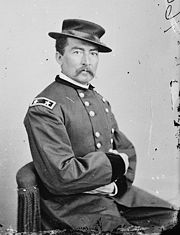 |
Sheridan, Philip Henry Philip Sheridan Philip Henry Sheridan was a career United States Army officer and a Union general in the American Civil War. His career was noted for his rapid rise to major general and his close association with Lt. Gen. Ulysses S... |
Major General, USA (November 8, 1864) |
USMA, 1853 Received the Thanks of Congress Thanks of Congress The Thanks of Congress are a series of formal resolutions passed by the United States Congress originally to extend the government's formal thanks for significant victories or impressive actions by American military commanders and their troops. Although it began during the American Revolutionary... (February 9, 1865) General-in-Chief Commanding General of the United States Army Prior to the institution of the Chief of Staff of the United States Army in 1903, there was generally a single senior-most officer in the army. From 1783, he was known simply as the Senior Officer of the United States Army, but in 1821, the title was changed to Commanding General of the United... (1883-1888) Commander-in-chief, MOLLUS (1886-1888) |
|
| Sherman, Francis Trowbridge Francis Trowbridge Sherman Francis Trowbridge Sherman was a Union general during the American Civil War. He served in the cavalry and infantry, seeing action in both the Western Theater and Eastern Theater.-Early life:... |
Brigadier General, USV (July 21, 1865) |
|||
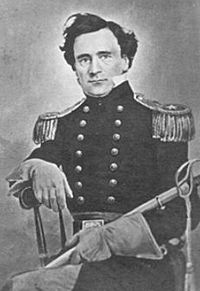 |
Sherman, Thomas West Thomas W. Sherman Thomas West Sherman was a United States Army officer with service during the Mexican-American War and the American Civil War.... |
Lieutenant Colonel, USA (May 14, 1861) Brigadier General, USV (May 17, 1861) |
Major General, USA (March 13, 1865) Major General, USV (March 13, 1865) |
USMA, 1836 |
 |
Sherman, William Tecumseh William Tecumseh Sherman William Tecumseh Sherman was an American soldier, businessman, educator and author. He served as a General in the Union Army during the American Civil War , for which he received recognition for his outstanding command of military strategy as well as criticism for the harshness of the "scorched... |
Major General, USA (August 12, 1864) |
USMA, 1841 Twice received the Thanks of Congress Thanks of Congress The Thanks of Congress are a series of formal resolutions passed by the United States Congress originally to extend the government's formal thanks for significant victories or impressive actions by American military commanders and their troops. Although it began during the American Revolutionary... (February 19, 1864; January 19, 1865) General-in-Chief Commanding General of the United States Army Prior to the institution of the Chief of Staff of the United States Army in 1903, there was generally a single senior-most officer in the army. From 1783, he was known simply as the Senior Officer of the United States Army, but in 1821, the title was changed to Commanding General of the United... (1869-1883) |
|
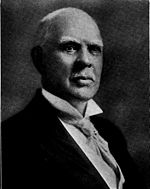 |
Sherwood, Isaac Ruth Isaac R. Sherwood Isaac Ruth Sherwood was an American politician and newspaper editor from Toledo, Ohio, as well as an officer in the Union army during the Civil War. He served nine terms in the United States Congress, and was a noted pacifist during World War I.-Early life and career:Sherwood was born in... |
Lieutenant Colonel, USV (February 12, 1864) |
Brigadier General, USV (February 27, 1865) |
U.S. Congressman from Ohio Ohio Ohio is a Midwestern state in the United States. The 34th largest state by area in the U.S.,it is the 7th‑most populous with over 11.5 million residents, containing several major American cities and seven metropolitan areas with populations of 500,000 or more.The state's capital is Columbus... (1873-1875, 1907-1921, 1923-1925) |
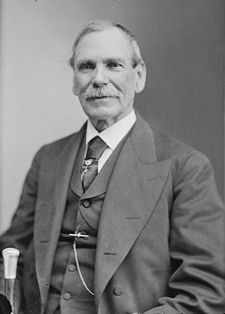 |
Shields, James James Shields James Shields was an American politician and United States Army officer who was born in Altmore, County Tyrone, Ireland. Shields, a Democrat, is the only person in United States history to serve as a U.S. Senator for three different states... |
Brigadier General, USV (August 19, 1861) |
Resigned March 28, 1863 U.S. Senator from Illinois Illinois Illinois is the fifth-most populous state of the United States of America, and is often noted for being a microcosm of the entire country. With Chicago in the northeast, small industrial cities and great agricultural productivity in central and northern Illinois, and natural resources like coal,... (1849-1855) U.S. Senator from Minnesota Minnesota Minnesota is a U.S. state located in the Midwestern United States. The twelfth largest state of the U.S., it is the twenty-first most populous, with 5.3 million residents. Minnesota was carved out of the eastern half of the Minnesota Territory and admitted to the Union as the thirty-second state... (1858-1859) U.S. Senator form Missouri Missouri Missouri is a US state located in the Midwestern United States, bordered by Iowa, Illinois, Kentucky, Tennessee, Arkansas, Oklahoma, Kansas and Nebraska. With a 2010 population of 5,988,927, Missouri is the 18th most populous state in the nation and the fifth most populous in the Midwest. It... (1879) |
|
 |
Sibley, Henry Hastings Henry Hastings Sibley Henry Hastings Sibley was the first Governor of the U.S. state of Minnesota.-Early life and education:... |
Brigadier General, USV (March 20, 1863) |
Major General, USV (November 29, 1865) |
Original appointment as Brigadier General, USV (September 29, 1862) expired March 4, 1863 Congressional Delegate from the Wisconsin Territory Wisconsin Wisconsin is a U.S. state located in the north-central United States and is part of the Midwest. It is bordered by Minnesota to the west, Iowa to the southwest, Illinois to the south, Lake Michigan to the east, Michigan to the northeast, and Lake Superior to the north. Wisconsin's capital is... (1848-1849) Congressional Delegate from the Minnesota Territory Minnesota Minnesota is a U.S. state located in the Midwestern United States. The twelfth largest state of the U.S., it is the twenty-first most populous, with 5.3 million residents. Minnesota was carved out of the eastern half of the Minnesota Territory and admitted to the Union as the thirty-second state... (1849-1853) 1st Governor of Minnesota Governor of Minnesota The Governor of Minnesota is the chief executive of the U.S. state of Minnesota, leading the state's executive branch. Forty different people have been governors of the state, though historically there were also three governors of Minnesota Territory. Alexander Ramsey, the first territorial... (1858-1860) |
| Sickles, Daniel Edgar Daniel Sickles Daniel Edgar Sickles was a colorful and controversial American politician, Union general in the American Civil War, and diplomat.... |
Major General, USV (November 29, 1862) |
CMOH, Battle of Gettysburg Battle of Gettysburg The Battle of Gettysburg , was fought July 1–3, 1863, in and around the town of Gettysburg, Pennsylvania. The battle with the largest number of casualties in the American Civil War, it is often described as the war's turning point. Union Maj. Gen. George Gordon Meade's Army of the Potomac... (July 2, 1862) U.S. Congressman from New York New York New York is a state in the Northeastern region of the United States. It is the nation's third most populous state. New York is bordered by New Jersey and Pennsylvania to the south, and by Connecticut, Massachusetts and Vermont to the east... (1857-1861, 1893-1895) U.S. minister to Spain United States Ambassador to Spain -Ambassadors:*John Jay**Appointed: September 29, 1779**Title: Minister Plenipotentiary**Presented credentials:**Terminated mission: ~May 20, 1782*William Carmichael**Appointed: April 20, 1790**Title: Chargé d'Affaires... (1869-1874) |
||
| Sigel, Franz Franz Sigel Franz Sigel was a German military officer, revolutionist and immigrant to the United States who was a teacher, newspaperman, politician, and served as a Union major general in the American Civil War.-Early life:... |
Major General, USV (March 21, 1862) |
Resigned May 4, 1865 | ||
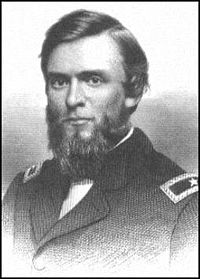 |
Sill, Joshua Woodrow Joshua W. Sill Joshua Woodrow Sill , was a career officer in the United States Army and brigadier general during the American Civil War. He was killed at the Battle of Stones River in Tennessee. Fort Sill, Oklahoma, was later named in his honor.-Early life and background:Sill was born in Chillicothe, Ohio... |
Brigadier General, USV (July 16, 1862) |
USMA, 1853 KIA, Battle of Stones River Battle of Stones River The Battle of Stones River or Second Battle of Murfreesboro , was fought from December 31, 1862, to January 2, 1863, in Middle Tennessee, as the culmination of the Stones River Campaign in the Western Theater of the American Civil War... (December 31, 1862) |
|
| Slack, James Richard James R. Slack James Richard Slack was an Indiana politician and a Union general during the American Civil War.-Early life:Slack was born in Bucks County, Pennsylvania in 1818. His family moved to Indiana in 1837 where he worked as a farm hand on his father's farm. He also worked as a teacher, studied law and... |
Brigadier General, USV (November 10, 1864) |
Major General, USV (March 13, 1865) |
||
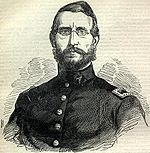 |
Slemmer, Adam Jacoby Adam J. Slemmer Adam Jacoby Slemmer was an officer in the United States Army during the Seminole Wars and the American Civil War, as well as in the Old West.-Early years:... |
Lieutenant Colonel, USA (February 8, 1864) Brigadier General, USV (November 29, 1862) |
Brigadier General, USA (March 13, 1865) |
USMA, 1850 |
 |
Slocum, Henry Warner Henry Warner Slocum Henry Warner Slocum , was a Union general during the American Civil War and later served in the United States House of Representatives from New York. During the war, he was one of the youngest major generals in the Army and fought numerous major battles in the Eastern Theater and in Georgia and the... |
Major General, USV (July 4, 1862) |
USMA, 1852 Resigned September 28, 1865 U.S. Congressman from New York New York New York is a state in the Northeastern region of the United States. It is the nation's third most populous state. New York is bordered by New Jersey and Pennsylvania to the south, and by Connecticut, Massachusetts and Vermont to the east... (1869-1973, 1883-1885) |
|
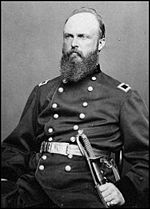 |
Slough, John Potts John P. Slough John Potts Slough was an American politician, lawyer, Union general during the American Civil War, and Chief Justice of New Mexico. He commanded the Union forces at the Battle of Glorieta Pass.-Early life and career:Slough was born in Cincinnati, Ohio... |
Brigadier General, USV (August 25, 1862) |
||
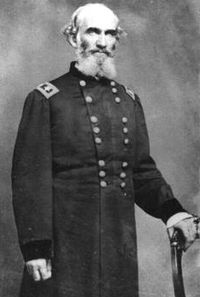 |
Smith, Andrew Jackson Andrew Jackson Smith Andrew Jackson Smith was a United States Army general during the American Civil War, rising to the command of a corps. He was most noted for his victory over Confederate General S.D... |
Lieutenant Colonel, USA *May 9, 1864) Major General, USV (May 12, 1864) |
Major General, USA (March 13, 1865) |
USMA, 1838 |
 |
Smith, Charles Ferguson Charles Ferguson Smith Charles Ferguson Smith was a career United States Army officer who served in the Mexican-American War and as a Union General in the American Civil War.-Early life and career:... |
Colonel, USA (September 9, 1861) Major General, USV (March 21, 1862) |
USMA, 1825 Died from infection April 25, 1862 |
|
| Smith, Charles Henry | Colonel, USV (June 18, 1863) |
Major General, USA (March 2, 1867) Major General, USV (March 13, 1865) |
CMOH, Battle of Saint Mary's Church Battle of Saint Mary's Church The Battle of Saint Mary's Church was an American Civil War cavalry battle fought on June 24, 1864, as part of Union Lt. Gen. Ulysses S. Grant's Overland Campaign against Confederate Gen. Robert E. Lee's Army of Northern Virginia.As Maj. Gen... (June 24, 1864) |
|
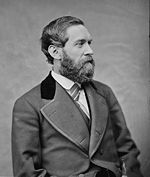 |
Smith, Giles Alexander Giles Alexander Smith Giles Alexander Smith , was a general in the Union Army during the American Civil War.-Biography:... |
Major General, USV (November 24, 1865) |
Brother of Morgan Lewis Smith Morgan Lewis Smith Morgan Lewis Smith was a Union general in the American Civil War.-Biography:Smith was born in Oswego County, New York. In 1843 he settled in Indiana, and later had some military experience in the United States Army. At the outbreak of the Civil War he raised the 8th Missouri Volunteer Infantry, of... Last Major General of volunteers by seniority |
|
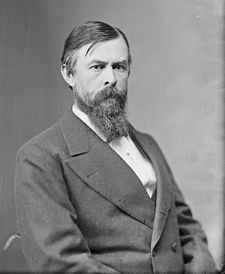 |
Smith, Green Clay Green Clay Smith Green Clay Smith was a U.S. soldier and politician. He served as a major general during the Civil War, was a congressman from Kentucky and was the Territorial Governor of Montana from 1866 to 1869. He also ran for President of the United States on the Prohibition ticket in 1876... |
Brigadier General, USV (June 11, 1862) |
Major General, USV (March 13, 1865( |
Resigned December 4, 1863 U.S. Congressman from Kentucky Kentucky The Commonwealth of Kentucky is a state located in the East Central United States of America. As classified by the United States Census Bureau, Kentucky is a Southern state, more specifically in the East South Central region. Kentucky is one of four U.S. states constituted as a commonwealth... (1863-1866) Territorial Governor of Montana (1866-1869) |
| Smith, Gustavus Adolphus | Brigadier General, USV (September 19, 1862) |
Brigadier General, USV (March 13, 1865) |
Appointment expired March 4, 1863 | |
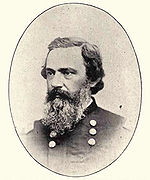 |
Smith, John Eugene John E. Smith John Eugene Smith was a Swiss immigrant to the United States, who served as a Union general during the American Civil War.-Early life:Smith was born in Berne, Switzerland in 1816. His father had served under Napoleon Bonaparte and emigrated with his family to Philadelphia, Pennsylvania after the... |
Brigadier General, USV (November 29, 1862) |
Major General, USV (January 12, 1865) |
|
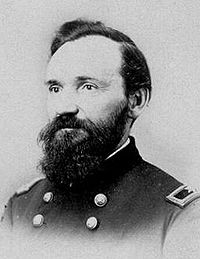 |
Smith, Morgan Lewis Morgan Lewis Smith Morgan Lewis Smith was a Union general in the American Civil War.-Biography:Smith was born in Oswego County, New York. In 1843 he settled in Indiana, and later had some military experience in the United States Army. At the outbreak of the Civil War he raised the 8th Missouri Volunteer Infantry, of... (aka Sanford, Martin L.) |
Brigadier General, USV (July 16, 1862) |
Resigned July 12, 1865 Brother of Giles Alexander Smith Giles Alexander Smith Giles Alexander Smith , was a general in the Union Army during the American Civil War.-Biography:... |
|
| Smith, Thomas Church Haskell | Brigadier General, USV (November 29, 1862) |
|||
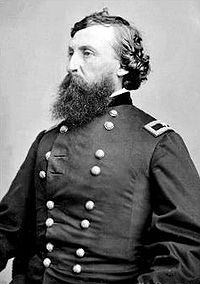 |
Smith, Thomas Kilby Thomas Kilby Smith Thomas Kilby Smith was a lawyer, soldier, and diplomat from the state of Ohio who served as a general in the Union Army during the American Civil War and then in the postbellum United States Army... |
Brigadier General, USV (August 11, 1863) |
Major General, USV (March 13, 1865) |
|
| Smith, William Farrar William Farrar Smith William Farrar Smith , was a civil engineer, a member of the New York City police commission, and Union general in the American Civil War.-Early life:... |
Major (March 3, 1863) Major General, USV (March 9, 1864) |
Major General, USA (March 13, 1865) |
USMA, 1845 Original appointment as Major General, USV (July 4, 1862) expired March 4, 1863 |
|
| Smith, William Jay William Jay Smith (Tennessee politician) William Jay Smith, a Representative from Tennessee; born in Birmingham, England on 24 September 1823; immigrated to the United States and settled in Orange County ; attended the common schools; learned the printing trade; moved to Tennessee in 1846; during the Mexican-American War, in 1847, served... |
Colonel, USV (March 13, 1865) |
Brigadier General, USV (June 16, 1865) |
U.S. Congressman from Tennessee Tennessee Tennessee is a U.S. state located in the Southeastern United States. It has a population of 6,346,105, making it the nation's 17th-largest state by population, and covers , making it the 36th-largest by total land area... (1869-1871) |
|
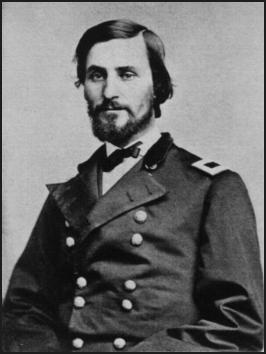 |
Smith, William Sooy William Sooy Smith William Sooy Smith was a West Point graduate and career United States Army officer who rose through the ranks to become a brigadier general in the Union Army during the American Civil War.... |
Brigadier General, USV (April 15, 1862) |
Resigned July 15, 1864 | |
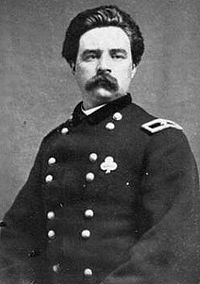 |
Smyth, Thomas Alfred Thomas Alfred Smyth Thomas Alfred Smyth was a major general in the Union Army during the American Civil War. He was the last Union general killed in the war.-Early life:... |
Brigadier General, USV (October 1, 1864) |
Major General, USV (April 7, 1865) |
DOW, Battle of Cumberland Church Battle of Cumberland Church The Battle of Cumberland Church was fought on April 7, 1865, as part of the Appomattox Campaign of the American Civil War.Near 2 p.m. on April 7, the advance of the Union II Corps encountered Confederate forces entrenched on high ground near Cumberland Church. The Union forces attacked twice but... (w. April 7, 1865, d. April 9, 1865) Last Union general killed during the war |
| Spalding, George George Spalding George Spalding was a politician from the U.S. state of Michigan.-Biography:Spalding was born in Blairgowrie, Perthshire, Scotland and immigrated to the United States in 1843 with his parents. The settled in Buffalo, New York, where he attended the public schools. He later moved to Monroe,... |
Colonel, USV (February 12, 1864) |
Brigadier General, USV (March 21, 1865) |
U.S. Congressman from Michigan Michigan Michigan is a U.S. state located in the Great Lakes Region of the United States of America. The name Michigan is the French form of the Ojibwa word mishigamaa, meaning "large water" or "large lake".... (1895-1899) |
|
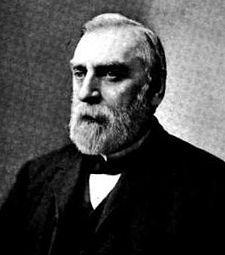 |
Spaulding, Oliver Lyman Oliver L. Spaulding Oliver Lyman Spaulding was a soldier and politician from the U.S. state of Michigan.-Biography:Spaulding was born in Jaffrey, New Hampshire. He completed preparatory studies, graduated from Oberlin College of Ohio in 1855, and moved to Michigan where he taught school. He studied law, was... |
Colonel, USV (April 16, 1864) |
Brigadier General, USV (June 25, 1865) |
U.S. Congressman from Michigan Michigan Michigan is a U.S. state located in the Great Lakes Region of the United States of America. The name Michigan is the French form of the Ojibwa word mishigamaa, meaning "large water" or "large lake".... (1881-1883) |
| Spears, James Gallant | Brigadier General, USV (March 5, 1862) |
Arrested February 6, 1864 for insubordination; Court-martialed and dismissed from service August 30, 1864 | ||
 |
Spencer, George Eliphaz George E. Spencer George Eliphaz Spencer was a U.S. senator from the state of Alabama.Born in Champion, New York, he was educated at Montreal College in Canada. After relocating to Iowa he engaged in the study of law. During the Civil War, he enlisted as a captain on October 16, 1862. While serving on the staff of... |
Colonel, USV (September 11, 1863) |
Brigadier General, USV (March 13, 1865) |
U.S. Senator from Alabama Alabama Alabama is a state located in the southeastern region of the United States. It is bordered by Tennessee to the north, Georgia to the east, Florida and the Gulf of Mexico to the south, and Mississippi to the west. Alabama ranks 30th in total land area and ranks second in the size of its inland... (1868-1879) |
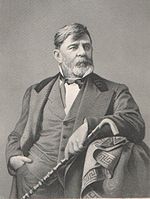 |
Spinola, Francis Barretto Francis Barretto Spinola Francis Barretto Spinola was the first Portuguese American to be elected to the United States House of Representatives, serving as a representative from New York from 1887 to 1891... |
Brigadier General, USV (October 1, 1862) |
Resigned June 8, 1865 U.S. Congressman from New York New York New York is a state in the Northeastern region of the United States. It is the nation's third most populous state. New York is bordered by New Jersey and Pennsylvania to the south, and by Connecticut, Massachusetts and Vermont to the east... (1887-1893) |
|
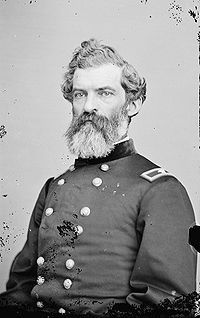 |
Sprague, John Wilson John W. Sprague John Wilson Sprague was an American soldier and railroad executive. He served as a general in the Union Army in the Western Theater of operations during the American Civil War. He received the Medal of Honor for gallantry at the Battle of Decatur during the Atlanta Campaign... |
Brigadier General, USV (July 30, 1864) |
Major General, USV (March 13, 1865) |
CMOH, Battle of Atlanta Battle of Atlanta The Battle of Atlanta was a battle of the Atlanta Campaign fought during the American Civil War on July 22, 1864, just southeast of Atlanta, Georgia. Continuing their summer campaign to seize the important rail and supply center of Atlanta, Union forces commanded by William T. Sherman overwhelmed... (July 22, 1864) |
| Spurling, Andrew Barclay | Lieutenant Colonel, USV (June 13, 1864) |
Brigadier General, USV (March 26, 1865) |
CMOH for actions near Evergreen, Alabama (March 23, 1865) | |
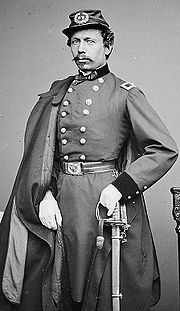 |
Stahel, Julius Julius Stahel Julius H. Stahel-Számwald was a Hungarian soldier who emigrated to the United States and became a Union general in the American Civil War. After the war, he served as a U.S. diplomat, a mining engineer, and a life insurance company executive... (b. Stahel-Számwald, Julius H.) |
Major General, USV (March 14, 1863) |
CMOH, Battle of Piedmont Battle of Piedmont The Battle of Piedmont was fought June 5, 1864, in the village of Piedmont, Augusta County, Virginia. Union Maj. Gen. David Hunter engaged Confederates under Brig. Gen. William E. "Grumble" Jones north of Piedmont. After severe fighting, Jones was killed and the Confederates were routed... (June 5, 1864) Resigned February 8, 1865 |
|
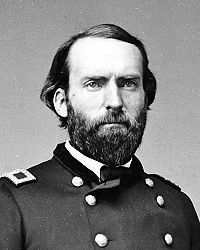 |
Stanley, David Sloane David S. Stanley David Sloane Stanley was a Union Army officer during the American Civil War and a recipient of America's highest military decoration, the Medal of Honor, for his actions at the Battle of Franklin.-Early life:... |
Major, USA (December 1, 1863) Major General, USV (November 29, 1862) |
Major General, USA (March 13, 1865) |
USMA, 1852 CMOH, Battle of Franklin (November 30, 1864) |
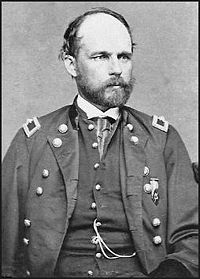 |
Stannard, George Jerrison George J. Stannard George Jerrison Stannard was a Vermont farmer, teacher, and Union general in the American Civil War. After the war, he served as Doorkeeper of the United States House of Representatives.-Early life:... |
Brigadier General, USV (March 11, 1863) |
Major General, USV (October 28, 1864) |
|
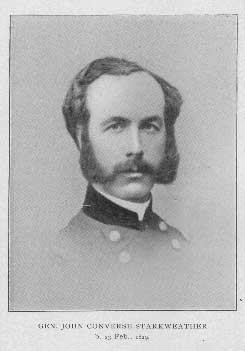 |
Starkweather, John Converse John Converse Starkweather John Converse Starkweather was a general in the Union Army during the American Civil War.-Early life and career:... |
Brigadier General, USV (July 17, 1863) |
Resigned May 11, 1865 | |
| Stedman, Griffin Alexander, Jr. | Colonel, USV (September 17, 1862) |
Brigadier General, USV August 5, 1862 |
DOW, Siege of Petersburg Siege of Petersburg The Richmond–Petersburg Campaign was a series of battles around Petersburg, Virginia, fought from June 9, 1864, to March 25, 1865, during the American Civil War... (w. August 5, 1864, d. August 6, 1864) |
|
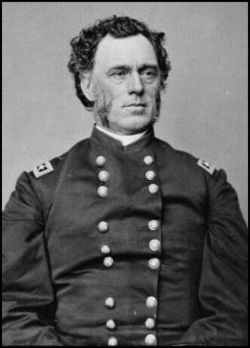 |
Steedman, James Blair James B. Steedman James Blair Steedman was an American soldier, printer, and politician. He also served during the American Civil War as a general in the Union Army, most noted for his performances at the Battle of Chickamauga in 1863 and the Battle of Nashville in 1864.-Early life and career:Steedman was born in... |
Major General, USV (April 20, 1864) |
||
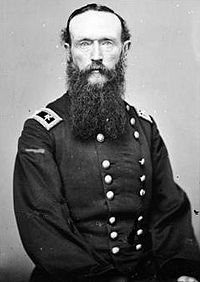 |
Steele, Frederick Frederick Steele Frederick Steele was a career military officer in the United States Army, serving as a major general in the Union Army during the American Civil War. He was most noted for his successful campaign to retake much of secessionist Arkansas for the Union cause.-Early life:Steele was born in Delhi, New... |
Lieutenant Colonel (August 26, 1863) Major General, USV (November 29, 1862) |
Major General, USA (March 13, 1865) |
USMA, 1843 |
| Stevens, Aaron Fletcher Aaron Fletcher Stevens Aaron Fletcher Stevens was a brevet brigadier general during the American Civil War, as well as a two-term U.S. Congressman.-Birth and early years:... |
Colonel, USV (September 23, 1862) |
Brigadier General, USV (December 8, 1864) |
U.S. Congressman from New Hampshire New Hampshire New Hampshire is a state in the New England region of the northeastern United States of America. The state was named after the southern English county of Hampshire. It is bordered by Massachusetts to the south, Vermont to the west, Maine and the Atlantic Ocean to the east, and the Canadian... (1867-1871) |
|
| Stevens Hazard Hazard Stevens Hazard Stevens was an American military officer, mountaineer, politician and writer. He received the Medal of Honor for his service in the Union army during the American Civil War at the Battle of Fort Huger. Stevens and P. B... |
Major, USV (October 13, 1864) |
Brigadier General, USV (April 2, 1865) |
CMOH, Battle of Fort Huger Battle of Suffolk (Hill's Point) The Battle of Suffolk at Hill's Point, also known as the Battle of Fort Huger, took place from April 11 to May 4, 1863, in Suffolk, Virginia, as part of Confederate Lt. Gen... (April 19, 1863) Son of Isaac Ingalls Stevens Isaac Stevens Isaac Ingalls Stevens was the first governor of Washington Territory, a United States Congressman, and a brigadier general in the Union Army during the American Civil War until his death at the Battle of Chantilly... |
|
| Stevens, Isaac Ingalls Isaac Stevens Isaac Ingalls Stevens was the first governor of Washington Territory, a United States Congressman, and a brigadier general in the Union Army during the American Civil War until his death at the Battle of Chantilly... |
Major General, USV (July 4, 1862) |
USMA, 1839 KIA, Battle of Chantilly Battle of Chantilly The Battle of Chantilly took place on September 1, 1862, in Fairfax County, Virginia, as the concluding battle of the Northern Virginia Campaign of the American Civil War. Thomas J... (September 1, 1862) Territorial Governor of Washington (1853-1857) Congressional Delegate for the Washington Territory (1857-1861) Father of Hazard Stevens Hazard Stevens Hazard Stevens was an American military officer, mountaineer, politician and writer. He received the Medal of Honor for his service in the Union army during the American Civil War at the Battle of Fort Huger. Stevens and P. B... |
||
| Stevenson, John Dunlap John Dunlap Stevenson John D. Stevenson was an American attorney, politician, and soldier in the U.S. Army in two wars. He was promoted to brevet major general of volunteers at the end of the American Civil War.... |
Brigadier General, USV (November 29, 1862) |
Major General, USV (March 13, 1865) |
Resigned April 22, 1864 Reappointed Brigadier General, USV August 7, 1864 |
|
| Stevenson, Thomas Greely Thomas G. Stevenson Thomas G. Stevenson was a general in the Union Army during the American Civil War. He was killed in action during the battle of Spotsylvania Courthouse.-Biography:... |
Brigadier General, USV (March 14, 1863) |
KIA, Battle of Spotsylvania Court House Battle of Spotsylvania Court House The Battle of Spotsylvania Court House, sometimes simply referred to as the Battle of Spotsylvania , was the second major battle in Lt. Gen. Ulysses S. Grant's 1864 Overland Campaign of the American Civil War. Following the bloody but inconclusive Battle of the Wilderness, Grant's army disengaged... (May 10, 1864) Original appointment as Brigadier General, USV (December 24, 1862) expired March 4, 1863 |
||
| Stokes, James Hughes | Brigadier General, USV (July 20, 1865) |
USMA, 1835 | ||
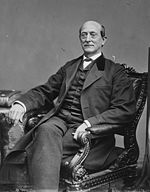 |
Stokes, William Brickly William Brickly Stokes William Brickly Stokes was an American politician and a member of the United States House of Representatives from Tennessee. He also served as colonel of the 5th Tennessee Cavalry during the American Civil War.... |
Colonel, USV (November 15, 1862) |
Brigadier General, USV (March 13, 1865) |
U.S. Congressman from Tennessee Tennessee Tennessee is a U.S. state located in the Southeastern United States. It has a population of 6,346,105, making it the nation's 17th-largest state by population, and covers , making it the 36th-largest by total land area... (1859-1861, 1866-1871) |
| Stolbrand, Charles John (b. Stolbrand, Carl Johan; aka Stolbrand, Carlos John) | Brigadier General, USV (February 18, 1865) |
|||
| Stone, Charles Pomeroy Charles Pomeroy Stone Charles Pomeroy Stone was a career United States Army officer, civil engineer, and surveyor. He fought with distinction in the Mexican–American War, earning two brevet promotions for his performance in the conflict. After resigning and surveying for the Mexican Government, he returned to the U.S... |
Colonel, USA (May 14, 1861) Brigadier General, USV (May 17, 1861) |
USMA, 1845 Mustered out of volunteer service April 4, 1864 Resigned September 13, 1864 |
||
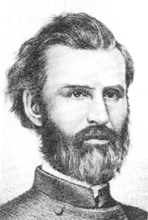 |
Stone, William Milo William M. Stone William Milo Stone was the sixth Governor of Iowa .- Biography :... |
Colonel, USV (September 9, 1862) |
Brigadier General, USV (March 13, 1865) |
Resigned August 13, 1863 Governor of Iowa (1864-1868) |
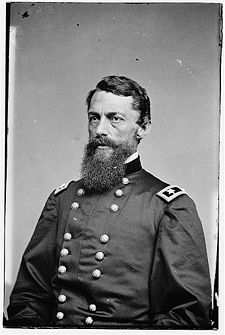 |
Stoneman, George George Stoneman George Stoneman, Jr. was a career United States Army officer, a Union cavalry general in the American Civil War, and the 15th Governor of California between 1883 and 1887.-Early life:... |
Lieutenant Colonel, USA (March 30, 1864) Major General, USV (November 29, 1862) |
Major General, USA (March 13, 1865) |
USMA, 1846 Governor of California Governor of California The Governor of California is the chief executive of the California state government, whose responsibilities include making annual State of the State addresses to the California State Legislature, submitting the budget, and ensuring that state laws are enforced... (1883-1887) |
| Stoughton, Edwin Henry Edwin H. Stoughton Edwin Henry Stoughton , was a general in the Union Army during the American Civil War and a lawyer.-Early life:Stoughton was born in Chester, Vermont, the son of Henry Evander and Laura Stoughton.... |
Brigadier General, USV (November 5, 1862) |
USMA, 1859 Volunteer appointment expired March 4, 1863 |
||
| Stoughton, William Lewis William L. Stoughton William Lewis Stoughton was a politician and soldier from U.S. state of Michigan who served in the United States Congress, as well as serving as a general and brigade commander in the Union Army during the American Civil War.Stoughton was born in Bangor, New York. He attended Kirtland,... |
Colonel, USV (April 1, 1862) |
Major General, USV (March 13, 1865) |
Mustered out September 30, 1864 U.S. Congressman from Michigan Michigan Michigan is a U.S. state located in the Great Lakes Region of the United States of America. The name Michigan is the French form of the Ojibwa word mishigamaa, meaning "large water" or "large lake".... (1869-1873) |
|
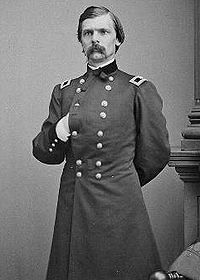 |
Strong, George Crockett George Crockett Strong George Crockett Strong was a Union brigadier general in the American Civil War.-Biography:Strong was born in Stockbridge, Vermont, and attended Williston Seminary but left after 1851. He attended Union College, but left for the U.S. Military Academy, from which he graduated in 1857... |
Captain, USA (March 3, 1863) Major General, USV (July 18, 1863) |
USMA, 1857 DOW, Second Battle of Fort Wagner (w. July 18, 1863, d. July 30, 1863) |
|
| Strong, William Kerley | Brigadier General, USV (September 28, 1861) |
Resigned October 20, 1863 | ||
| Stuart, David David Stuart (politician) David Stuart was a politician from the U.S. state of Michigan and an officer in the Union Army during the American Civil War.-Early life:... |
Brigadier General, USV (November 29, 1862) |
Appointment expired March 4, 1863 Resigned April 3, 1863 U.S. Congressman from Michigan Michigan Michigan is a U.S. state located in the Great Lakes Region of the United States of America. The name Michigan is the French form of the Ojibwa word mishigamaa, meaning "large water" or "large lake".... (1853-1855) |
||
| Stumbaugh, Frederick Shearer | Brigadier General, USV (November 29, 1862) |
Appointment revoked January 22, 1863 Mustered out May 15, 1863 |
||
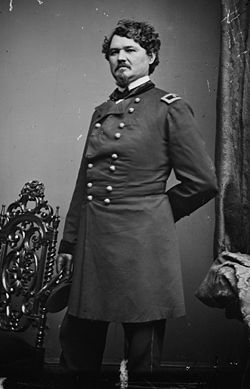 |
Sturgis, Samuel Davis Samuel D. Sturgis Samuel Davis Sturgis was an American military officer who served in the Mexican-American War, as a Union general in the American Civil War, and later in the Indian Wars.-Early life:... |
Lieutenant Colonel, USA (October 27, 1863) Brigadier General, USV (October 10, 1861) |
Major General, USA (March 13, 1865) |
USMA, 1846 |
| Sullivan, Jeremiah Cutler Jeremiah C. Sullivan Jeremiah Cutler Sullivan was an Indiana lawyer, antebellum United States Navy officer, and a brigadier general in the Union Army during the American Civil War. He was among a handful of former Navy officers who later served as infantry generals during the war.-Early life and career:Jeremiah C.... |
Brigadier General, USV (April 28, 1862) |
U.S. Naval Academy, 1848 Resigned May 11, 1865 |
||
| Sullivan, Peter John Peter John Sullivan Peter John Sullivan was an Irish-American soldier and lawyer, who became United States Ambassador to Colombia.-Life:... |
Colonel, USV (January 30, 1862) |
Brigadier General, USV (March 13, 1865) |
Resigned August 7, 1863 U.S. minister to Colombia United States Ambassador to Colombia The following is a list of Ambassadors of the United States, or other chiefs of mission, to Colombia and its predecessor states. The title given by the United States State Department to this position is currently Ambassador Extraordinary and Minister Plenipotentiary.- Gran Colombia:The following... (1867-1869) |
|
| Sully, Alfred Alfred Sully Alfred Sully , was a military officer during the American Civil War and during the Indian Wars on the frontier. He was also a noted painter.-Biography:... |
Major, USA (March 15, 1862) Brigadier General, USV (September 26, 1862) |
Brigadier General, USA (March 13, 1865) Major General, USV (March 8, 1865) |
USMA, 1841 | |
| Sumner, Edwin Vose Edwin Vose Sumner Edwin Vose Sumner was a career United States Army officer who became a Union Army general and the oldest field commander of any Army Corps on either side during the American Civil War... |
Brigadier General, USA (March 16, 1861) Major General, USV (July 4, 1862) |
Major General, USA (May 31, 1862) |
Died of a heart attack Myocardial infarction Myocardial infarction or acute myocardial infarction , commonly known as a heart attack, results from the interruption of blood supply to a part of the heart, causing heart cells to die... March 21, 1863 |
|
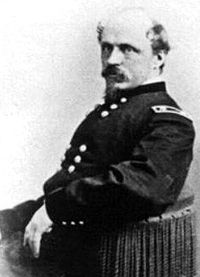 |
Swayne, Wager Wager Swayne Wager Swayne was a Union Army general during the American Civil War who received America's highest military decoration the Medal of Honor for his actions at the Second Battle of Corinth... |
Major General, USV (June 20, 1865) |
CMOH, Second Battle of Corinth Second Battle of Corinth The Second Battle of Corinth was fought October 3–4, 1862, in Corinth, Mississippi. For the second time in the Iuka-Corinth Campaign, Union Maj. Gen. William S... (October 4, 1862) Last Major General of volunteers appointed (May 1, 1866) Son of Supreme Court Justice Associate Justice of the Supreme Court of the United States Associate Justices of the Supreme Court of the United States are the members of the Supreme Court of the United States other than the Chief Justice of the United States... Noah Haynes Swayne Noah Haynes Swayne Noah Haynes Swayne was an American jurist and politician. He was the first Republican appointed as a justice to the United States Supreme Court.-Birth and early life:... |
|
| Sweeny, Thomas William Thomas William Sweeny Thomas William Sweeny was an Irish soldier who served in the Mexican-American War and then was a general in the Union Army during the American Civil War.-Birth and early years:... |
Major, USA (October 20, 1863) Brigadier General USV (November 29, 1862) |
|||
| Swift, Frederick William | Colonel, USV (December 4, 1864) |
Brigadier General, USV (March 13, 1865) |
CMOH, Battle of Campbell's Station Battle of Campbell's Station The Battle of Campbell's Station was a battle of the Knoxville Campaign of the American Civil War, occurring on November 16, 1863, at Campbell's Station, , Knox County, Tennessee.... (November 16, 1863) |
|
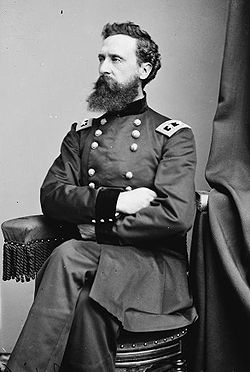 |
Sykes, George George Sykes George Sykes was a career United States Army officer and a Union General during the American Civil War.-Early life:... |
Lieutenant Colonel, USA (October 16, 1863) Major General, USV (November 29, 1862) |
Major General, USA (March 13, 1865) |
USMA, 1838 |
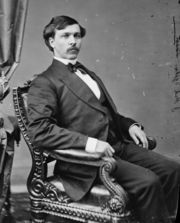 |
Sypher, Jacob Hale (aka Sypher, Jay Hale) |
Colonel, USV (August 11, 1864) |
Brigadier General USV (March 13, 1865) |
U.S. Congressman from Louisiana Louisiana Louisiana is a state located in the southern region of the United States of America. Its capital is Baton Rouge and largest city is New Orleans. Louisiana is the only state in the U.S. with political subdivisions termed parishes, which are local governments equivalent to counties... (1868-1869, 1870-1875) |
T
| Image | Name | Substantive Rank | Brevet Brevet (military) In many of the world's military establishments, brevet referred to a warrant authorizing a commissioned officer to hold a higher rank temporarily, but usually without receiving the pay of that higher rank except when actually serving in that role. An officer so promoted may be referred to as being... Rank | Taylor, George William George W. Taylor (general) George William Taylor was a general in the Union Army during the American Civil War. He commanded a brigade in the Army of the Potomac before being mortally wounded at the Second Battle of Bull Run in Northern Virginia.-Early life and career:Taylor was born at "Solitude," the family's mansion near... | Brigadier General, USV (May 9, 1862) |
DOW, Bull Run Bridge (w. August 27, 1862, d. September 1, 1862) | |
|---|---|---|---|---|---|---|---|
| Taylor, John McLean | Lieutenant Colonel, USA | Brigadier General, USA (March 13,1865) |
Son of Joseph Pannell Taylor Joseph Pannell Taylor Joseph Pannell Taylor was a career United States Army officer and Union general in the American Civil War.-Early life:... Nephew of President Zachary Taylor Zachary Taylor Zachary Taylor was the 12th President of the United States and an American military leader. Initially uninterested in politics, Taylor nonetheless ran as a Whig in the 1848 presidential election, defeating Lewis Cass... Cousin of General Richard Taylor Richard Taylor Richard Taylor may refer to:*Richard Taylor , father of U.S. president Zachary Taylor*Richard Taylor , British general*Richard Taylor , son of U.S... , CSA Brother-in-law of Albert Gallatin Lawrence and General David Rumph Jones, CSA |
||||
| Taylor, Joseph Pannell Joseph Pannell Taylor Joseph Pannell Taylor was a career United States Army officer and Union general in the American Civil War.-Early life:... |
Brigadier General, USA (February 9, 1863) |
Commissary General of the Army (1861-1864) Died June 29, 1864 Brother of President Zachary Taylor Zachary Taylor Zachary Taylor was the 12th President of the United States and an American military leader. Initially uninterested in politics, Taylor nonetheless ran as a Whig in the 1848 presidential election, defeating Lewis Cass... Uncle of generals Richard Taylor Richard Taylor Richard Taylor may refer to:*Richard Taylor , father of U.S. president Zachary Taylor*Richard Taylor , British general*Richard Taylor , son of U.S... , CSA and David Rumph Jones, CSA Father of John McLean Taylor Father-in-law of Albert Gallatin Lawrence |
|||||
| Taylor, Nelson Nelson Taylor Nelson Taylor was a U.S. Representative from New York and a general in the Union Army during the American Civil War.-Biography:Born in South Norwalk, Connecticut, Taylor attended the common schools.... |
Brigadier General, USV (September 7, 1862) |
Resigned January 19, 1863 U.S. Congressman from New York New York New York is a state in the Northeastern region of the United States. It is the nation's third most populous state. New York is bordered by New Jersey and Pennsylvania to the south, and by Connecticut, Massachusetts and Vermont to the east... (1865-1867) |
|||||
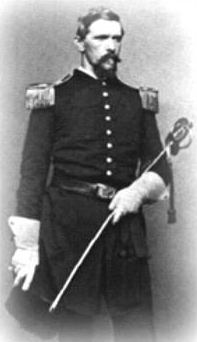 |
Terrill, William R. William R. Terrill William Rufus Terrill was a United States Army soldier and general who was killed in action at the Battle of Perryville during the American Civil War... |
Captain, USA (May 14, 1861) Brigadier General, USV (September 9, 1862) |
USMA, 1853 KIA, Battle of Perryville Battle of Perryville The Battle of Perryville, also known as the Battle of Chaplin Hills, was fought on October 8, 1862, in the Chaplin Hills west of Perryville, Kentucky, as the culmination of the Confederate Heartland Offensive during the American Civil War. Confederate Gen. Braxton Bragg's Army of Mississippi won a... (October 8, 1862) Brother of Confederate general James Barbour Terrill |
||||
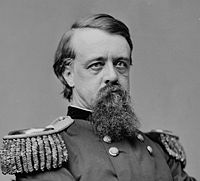 |
Terry, Alfred Howe Alfred Terry Alfred Howe Terry was a Union general in the American Civil War and the military commander of the Dakota Territory from 1866 to 1869 and again from 1872 to 1886.-Early life and career:... |
Brigadier General, USA (January 15, 1865) Major General, USV (January 16, 1865) |
Received the Thanks of Congress Thanks of Congress The Thanks of Congress are a series of formal resolutions passed by the United States Congress originally to extend the government's formal thanks for significant victories or impressive actions by American military commanders and their troops. Although it began during the American Revolutionary... (January 24, 1865) |
||||
| Terry, Henry Dwight | Brigadier General, USV (July 17, 1862) |
Resigned February 7, 1865 | |||||
 |
Thayer, John Milton John Milton Thayer John Milton Thayer was a general in the Union Army during the American Civil War and a postbellum United States Senator from Nebraska, as well as governor of Wyoming Territory and governor of Nebraska.-Early life and career:... |
Brigadier General, USV (March 13, 1863) |
Major General, USV (March 13, 1865) |
Original appointment as Brigadier General, USV (October 4, 1862) expired March 4, 1863 Territorial Governor of Wyoming (1875-1878) Governor of Nebraska Governor of Nebraska The Governor of Nebraska holds the "supreme executive power" of the State of Nebraska as provided by the fourth article of the Nebraska Constitution. The current Governor is Dave Heineman, a Republican, who assumed office on January 20, 2005 upon the resignation of Mike Johanns . He won a full... (1887-1891); remained in office until February 8, 1892, claiming successor was not a U.S. citizen |
|||
| Thayer, Sylvanus Sylvanus Thayer Colonel and Brevet Brigadier General Sylvanus Thayer also known as "the Father of West Point" was an early superintendent of the United States Military Academy at West Point and an early advocate of engineering education in the United States.-Biography:Thayer was born in Braintree, Massachusetts,... |
Colonel, USA | Brigadier General, USA (May 31, 1863) |
Retired June 1, 1863 Superintendent, USMA (1817-1833) Longest-serving West Point superintendent Oldest officer brevetted brigadier general |
||||
| Thomas, Charles | Colonel, USA | Major General, USA (March 13, 1865) |
Acting Quartermaster General | ||||
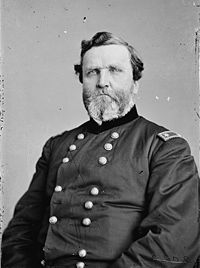 |
Thomas, George Henry George Henry Thomas George Henry Thomas was a career United States Army officer and a Union General during the American Civil War, one of the principal commanders in the Western Theater.... |
Major General, USA (January 16, 1865) |
USMA, 1840 Received the Thanks of Congress Thanks of Congress The Thanks of Congress are a series of formal resolutions passed by the United States Congress originally to extend the government's formal thanks for significant victories or impressive actions by American military commanders and their troops. Although it began during the American Revolutionary... (March 3, 1865) |
||||
| Thomas, Henry Goddard Henry Goddard Thomas Major General Henry Goddard Thomas was an Union general in the American Civil War. A native of Portland, Maine, Thomas graduated from Amherst College in 1858 and was admitted to the bar shortly thereafter. He enlisted as a private in the 5th Maine Volunteer Infantry Regiment... |
Captain, USA Brigadier General, USV (November 30, 1864) |
Brigadier General, USA (March 13, 1865) Major General, USV (March 13, 1865) |
|||||
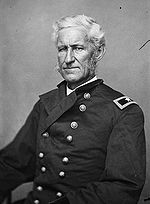 |
Thomas, Lorenzo Lorenzo Thomas Lorenzo Thomas was a career United States Army officer who was Adjutant General of the Army at the beginning of the American Civil War. After the war, he was appointed temporary Secretary of War by President Andrew Johnson, precipitating Johnson's impeachment.-Early life:Thomas was born in New... |
Brigadier General, USA (August 3, 1861) |
Major General, USA March 13, 1865 |
USMA, 1823 Adjutant General Adjutant general An Adjutant General is a military chief administrative officer.-Imperial Russia:In Imperial Russia, the General-Adjutant was a Court officer, who was usually an army general. He served as a personal aide to the Tsar and hence was a member of the H. I. M. Retinue... of the Army (1861-1869) |
|||
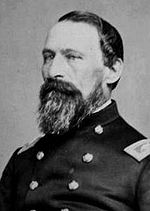 |
Thomas, Stephen Stephen Thomas Stephen Thomas , manufacturer, politician, jurist, and Union Army officer. He was a recipient of the Medal of Honor for gallantry.-Early life:... |
Brigadier General, USV (February 1, 1865) |
CMOH, Battle of Cedar Creek Battle of Cedar Creek The Battle of Cedar Creek, or Battle of Belle Grove, October 19, 1864, was one of the final, and most decisive, battles in the Valley Campaigns of 1864 during the American Civil War. The final Confederate invasion of the North, led by Lt. Gen. Jubal A. Early, was effectively ended... (October 19, 1864) Mustered out as Colonel, USV (January 21, 1865) |
||||
| Thompson, William William Thompson (Iowa) William Thompson , a lawyer, clerk, newspaperman, longtime Army officer, and Democrat, was the first person elected to Congress from Iowa's 1st congressional district. His race for re-election in 1848 was the only Iowa U.S. House election to be revoted. After Thompson's opponent, Whig candidate... |
Colonel, USV (July 20, 1864) |
Brigadier General, USV (March 13, 1865) |
U.S. Congressman from Iowa Iowa Iowa is a state located in the Midwestern United States, an area often referred to as the "American Heartland". It derives its name from the Ioway people, one of the many American Indian tribes that occupied the state at the time of European exploration. Iowa was a part of the French colony of New... (1847-1850) |
||||
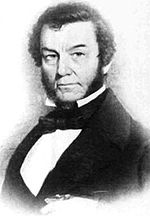 |
Thruston, Charles Mynn Charles Mynn Thruston Charles Mynn Thruston was a soldier, farmer, politician, and a brigadier general in the Union Army during the American Civil War. He served as the mayor of Cumberland, Maryland, from 1861 to 1862.... |
Brigadier General, USV (September 7, 1861) |
USMA, 1814 Resigned April 17, 1862 |
||||
| Tibbits, William B. | Brigadier General, USV (October 18, 1865) |
Major General, USV (March 13, 1865) |
|||||
| Tillson, Davis | Brigadier General, USV (November 29, 1862) |
USMA (class of 1853); left due to amputation of leg, 1851 | |||||
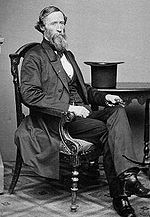 |
Todd, John Blair Smith John Blair Smith Todd John Blair Smith Todd was a Delegate from Dakota Territory to the United States House of Representatives and a general in the Union Army during the American Civil War.-Biography:... |
Brigadier General, USV (September 19, 1861) |
USMA, 1837 Appointment as Brigadier General, USV expired June 17, 1862 Congressional Delegate to Congress for the Dakota Territory Dakota Territory The Territory of Dakota was an organized incorporated territory of the United States that existed from March 2, 1861, until November 2, 1889, when the final extent of the reduced territory was split and admitted to the Union as the states of North and South Dakota.The Dakota Territory consisted of... (1861-1863, 1864-1865) Cousin of Mary Todd Lincoln Mary Todd Lincoln Mary Ann Lincoln was the wife of the 16th President of the United States, Abraham Lincoln, and was First Lady of the United States from 1861 to 1865.-Life before the White House:... |
||||
| Tompkins, Charles Henry Charles Henry Tompkins Charles Henry Tompkins was a Union Army colonel, who received an appointment to the brevet grade of Brigadier General of volunteers during the American Civil War. He was a recipient of the Congressional Medal of Honor for valor in action on June 1, 1861 in the Battle of Fairfax Court House... |
Captain, USA Colonel, USV |
Brigadier General, USA (March 13, 1865) |
CMOH, action near Fairfax, Virginia Fairfax, Virginia The City of Fairfax is an independent city forming an enclave within the confines of Fairfax County, in the Commonwealth of Virginia in the United States. Although politically independent of the surrounding county, the City is nevertheless the county seat.... (June 1, 1861) USMA (class of 1851), resigned 1849 Commissioner, Lincoln assassination trial Abraham Lincoln assassination The assassination of United States President Abraham Lincoln took place on Good Friday, April 14, 1865, as the American Civil War was drawing to a close. The assassination occurred five days after the commanding General of the Army of Northern Virginia, Robert E. Lee, and his battered Army of... |
||||
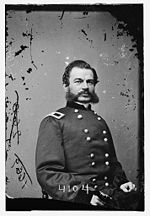 |
Torbert, Alfred Thomas Archimedes | Captain, USA (September 25, 1861) Brigadier General, USV (November 29, 1862) |
Major General, USA (March 13, 1865) Major General, USV (March 13, 1865) |
USMA, 1855 Also nominated and confirmed as First Lieutenant, CSA (March 18, 1861); refused appointment |
|||
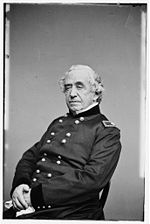 |
Totten, Joseph Gilbert Joseph Gilbert Totten Joseph Gilbert Totten fought in the War of 1812, served as Chief Engineer and was regent of the Smithsonian Institution and cofounder of the National Academy of Sciences.-Early life and education:... |
Brigadier General, USA (March 3, 1863) |
Major General, USA (1864) |
USMA, 1805 (tenth graduate of West Point) Chief of Engineers Chief of Engineers The Chief of Engineers commands the US Army Corps of Engineers. As a staff officer at The Pentagon, the Chief advises the Army on engineering matters and serves as the Army's topographer and the proponent for real estate and other related engineering programs.... (1838-1864) Died of pneumonia (April 22, 1864) |
|||
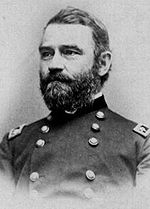 |
Tower, Zealous Bates Zealous Bates Tower Zealous Bates Tower was an American soldier and civil engineer who served as a general in the Union Army during the American Civil War... |
Lieutenant Colonel, USA (November, 1865) Brigadier General, USV (November 23, 1861) |
Major General, USA (March 13, 1865) Major General, USV (March 13, 1865) |
USMA, 1841 Superintendent, USMA (July, 1864-September, 1864) |
|||
 |
Tracy, Benjamin Franklin Benjamin F. Tracy Benjamin Franklin Tracy was a United States political figure who served as Secretary of the Navy from 1889 through 1893, during the administration of U.S. President Benjamin Harrison.-Biography:... |
Colonel, USV | Brigadier General, USV (March 13, 1865) |
CMOH, Battle of the Wilderness Battle of the Wilderness The Battle of the Wilderness, fought May 5–7, 1864, was the first battle of Lt. Gen. Ulysses S. Grant's 1864 Virginia Overland Campaign against Gen. Robert E. Lee and the Confederate Army of Northern Virginia. Both armies suffered heavy casualties, a harbinger of a bloody war of attrition by... (May 6, 1864) Secretary of the Navy United States Secretary of the Navy The Secretary of the Navy of the United States of America is the head of the Department of the Navy, a component organization of the Department of Defense... (1889-1893) Brother-in-law of Isaac Swartwood Catlin Isaac S. Catlin Isaac Swartwood Catlin was an American lawyer and a decorated officer in the American Civil War. A native of Owego, New York, Catlin studied law in New York City before returning to Owego to begin his career. He joined the Union Army in the first days of the Civil War and rose to become commander... |
|||
| Tremain, Henry Edwin | Major, USV | Brigadier General, USV (November 30, 1865) |
CMOH, Battle of Resaca Battle of Resaca The Battle of Resaca was part of the Atlanta Campaign of the American Civil War. The battle was waged in both Gordon and Whitfield counties, Georgia, from May 13 - 15, 1864. It ended inconclusively with the Confederate Army retreating. The engagement was fought between the Military Division of the... (May 15, 1864) |
||||
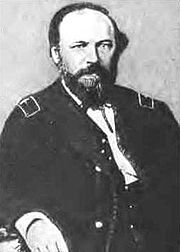 |
Turchin, John Basil Ivan Turchaninov Ivan Vasilyevich Turchaninov , better known by his Anglicised name of John Basil Turchin, was a Union army brigadier general in the American Civil War... (b. Turchaninov, Ivan Vasilovitch) |
Brigadier General, USV (July 17, 1862) |
Resigned October 4, 1864 Only general officer on either side from Russia Russia Russia or , officially known as both Russia and the Russian Federation , is a country in northern Eurasia. It is a federal semi-presidential republic, comprising 83 federal subjects... |
||||
| Turner, John Wesley | Colonel, USA Brigadier General, USV (September 7, 1863) |
Major General, USA (March 13, 1865) Major General, USV (1864) |
USMA, 1855 | ||||
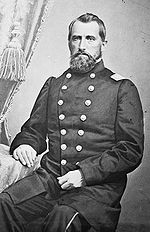 |
Tuttle, James Madison | Brigadier General, USV (June 9, 1862) |
Resigned June 14, 1864 | ||||
| Tyler, Daniel Daniel Tyler Daniel Tyler was an iron manufacturer, railroad president, and one of the first generals of the American Civil War.-Biography:... |
Brigadier General, USV (March 13, 1862) |
Resigned April 6, 1864 Uncle of Robert Ogden Tyler Robert O. Tyler Robert Ogden Tyler was an American soldier who served as a general in the Union Army during the American Civil War. He is best known as the commander of the Artillery Reserve of the Army of the Potomac, including at the Battle of Gettysburg in July 1863, where many of his batteries played... |
|||||
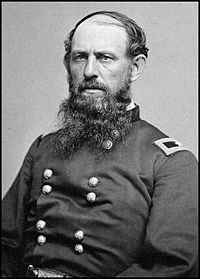 |
Tyler, Erastus B. | Brigadier General, USV (May 14, 1862) |
Major General, USV (March 13, 1865) |
||||
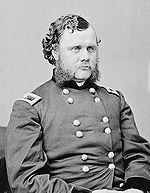 |
Tyler, Robert Ogden Robert O. Tyler Robert Ogden Tyler was an American soldier who served as a general in the Union Army during the American Civil War. He is best known as the commander of the Artillery Reserve of the Army of the Potomac, including at the Battle of Gettysburg in July 1863, where many of his batteries played... |
Major, USA Brigadier General, USV (November 29, 1862) |
Major General, USV (1864) Major General, USA (March 13, 1865) |
USMA, 1853 Nephew of Daniel Tyler Daniel Tyler Daniel Tyler was an iron manufacturer, railroad president, and one of the first generals of the American Civil War.-Biography:... |
|||
| Tyndale, Hector Hector Tyndale Hector Tyndale was a Union general during the American Civil War rising to the rank of Brevet Major General of Volunteers. He notably led brigades at the battles of Antietam and Wauhatchie... (b. Tyndale, George Hector) |
Brigadier General, USV (April 9, 1863) |
Major General, USV (March 13, 1865) |
Resigned August 26, 1864 |
U
| Image | Name | Substantive Rank | Brevet Brevet (military) In many of the world's military establishments, brevet referred to a warrant authorizing a commissioned officer to hold a higher rank temporarily, but usually without receiving the pay of that higher rank except when actually serving in that role. An officer so promoted may be referred to as being... Rank | Upton, Emory Emory Upton Emory Upton was a United States Army General and military strategist, prominent for his role in leading infantry to attack entrenched positions successfully at the Battle of Spotsylvania Court House during the American Civil War, but he also excelled at artillery and cavalry assignments... | Captain, USA Brigadier General, USV (May 12, 1864) |
Major General, USA Major General, USV |
USMA, 1861 Superintendent, USMA (1870-1875) One of only two general officers ever promoted on the field by General Grant |
|---|
V
| Image | Name | Substantive Rank | Brevet Brevet (military) In many of the world's military establishments, brevet referred to a warrant authorizing a commissioned officer to hold a higher rank temporarily, but usually without receiving the pay of that higher rank except when actually serving in that role. An officer so promoted may be referred to as being... Rank | Van Derveer, Ferdinand Ferdinand Van Derveer Ferdinand Van Derveer was a lawyer and a brigadier general in the Union Army during the American Civil War.-Biography:... | Brigadier General, USV (October 4, 1864) |
Resigned June 7, 1865 | |
|---|---|---|---|---|---|---|---|
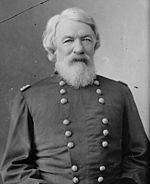 |
Van Vliet, Stewart Stewart Van Vliet Stewart Leonard Van Vliet , was a United States Army officer who fought on the side of the Union during the American Civil War.-Early life:... |
Major, USA (August, 1861) Brigadier General, USV (March 13, 1865) |
Brigadier General, USA (October, 1864) Major General, USV (March 13, 1865) |
USMA, 1840 Earlier appointment as Brigadier General, USV (September 23, 1861) expired July 17, 1862 |
|||
 |
Van Wyck, Charles H. Charles Van Wyck Charles Henry Van Wyck was a Representative from New York, a Senator from Nebraska, and a Union Army Brigadier general in the American Civil War.-Early life and political career:... |
Brigadier General, USV (September 27, 1865) |
U.S. Congressman from New York New York New York is a state in the Northeastern region of the United States. It is the nation's third most populous state. New York is bordered by New Jersey and Pennsylvania to the south, and by Connecticut, Massachusetts and Vermont to the east... (1859-1863, 1867-1871) U.S. Senator from Nebraska Nebraska Nebraska is a state on the Great Plains of the Midwestern United States. The state's capital is Lincoln and its largest city is Omaha, on the Missouri River.... (1881-1887) |
||||
| Vandever, William | Brigadier General (November 29, 1862) |
Major General, USV (June, 1865) |
U.S. Congressman from Iowa Iowa Iowa is a state located in the Midwestern United States, an area often referred to as the "American Heartland". It derives its name from the Ioway people, one of the many American Indian tribes that occupied the state at the time of European exploration. Iowa was a part of the French colony of New... (1859-1861) U.S. Congressman from California California California is a state located on the West Coast of the United States. It is by far the most populous U.S. state, and the third-largest by land area... (1887-1891) |
||||
| Veatch, James C. James C. Veatch James Clifford Veatch was a lawyer who served as an Indiana state legislator and county auditor. He later served as a Union general during the American Civil War, fighting primarily in the Western Theater... |
Brigadier General, USV (April 28, 1862) |
Major General, USV (1865) |
|||||
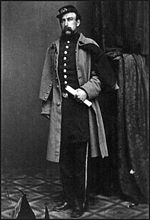 |
Viele, Egbert Ludovicus | Brigadier General, USV (August 17, 1861) |
USMA, 1847 Resigned October 23., 1863 U.S. Congressman from New York New York New York is a state in the Northeastern region of the United States. It is the nation's third most populous state. New York is bordered by New Jersey and Pennsylvania to the south, and by Connecticut, Massachusetts and Vermont to the east... (1885-1887) |
||||
| Vifquain, Victor | Lieutenant Colonel, USV | Brigadier General, USV (March 13, 1865) |
CMOH, Battle of Fort Blakely Battle of Fort Blakely -Sources:**-External links:*... (April 9, 1865) |
||||
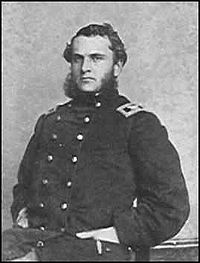 |
Vincent, Strong Strong Vincent Strong Vincent was a lawyer who became famous as a U.S. Army officer during the fighting on Little Round Top at the American Civil War Battle of Gettysburg, where he was mortally wounded.-Early life:... |
Brigadier General, USV (July 3, 1863) |
DOW, Battle of Gettysburg Battle of Gettysburg The Battle of Gettysburg , was fought July 1–3, 1863, in and around the town of Gettysburg, Pennsylvania. The battle with the largest number of casualties in the American Civil War, it is often described as the war's turning point. Union Maj. Gen. George Gordon Meade's Army of the Potomac... (July 2, 1863, d. July 7, 1863) |
||||
| Vinton, Francis Laurens | Captain, USA (October, 1861) Brigadier General, USV (March 13, 1863) |
USMA, 1856 Earlier appointment as Brigadier General, USV (September 19, 1862) expired March 4, 1863 Resigned May 5, 1863 |
|||||
| Vogdes, Israel Israel Vogdes Israel Vogdes was a career soldier and military educator from Pennsylvania who served as a general in the Union Army during the American Civil War.-Biography:... |
Colonel, USA (1863) Brigadier General, USV (November 29, 1862) |
Brigadier General, USA | USMA, 1837 | ||||
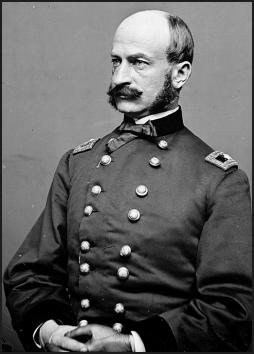 |
Von Steinwehr, Adolph Wilhelm August Freidrich, Baron Adolph von Steinwehr Baron Adolph Wilhelm August Friedrich von Steinwehr was a German-Brunswick army officer who emigrated to the United States, became a geographer, cartographer, and author, and served as a Union general in the American Civil War.-Early life:Steinwehr was born in Blankenburg, in the Duchy of... |
Brigadier General, USV (October 12, 1861) |
Resigned July 3, 1865 | ||||
| Von Vegesack, Ernst Mathias Peter, Baron Ernest von Vegesack Ernst Mattias Peter von Vegesack was a Swedish volunteer in the Union Army during American Civil War and later on was a member of the parliament of Sweden... |
Colonel, USV (1862) |
Brigadier General, USV (March 13, 1865) |
CMOH, Battle of Gaines' Mill Battle of Gaines' Mill The Battle of Gaines's Mill, sometimes known as the First Battle of Cold Harbor or the Battle of Chickahominy River, took place on June 27, 1862, in Hanover County, Virginia, as the third of the Seven Days Battles of the American Civil War... (June 27, 1862) |
W
| Image | Name | Substantive Rank | Brevet Brevet (military) In many of the world's military establishments, brevet referred to a warrant authorizing a commissioned officer to hold a higher rank temporarily, but usually without receiving the pay of that higher rank except when actually serving in that role. An officer so promoted may be referred to as being... Rank | Wade, Melancthon Smith Melancthon S. Wade Melancthon Smith Wade was a businessman, horticulturist, and soldier from the state of Ohio who served as a general in the Union Army during the early part of the American Civil War.-Biography:... | Brigadier General, USV (October 1, 1861) |
Resigned March 18, 1862 | |
|---|---|---|---|---|---|---|---|
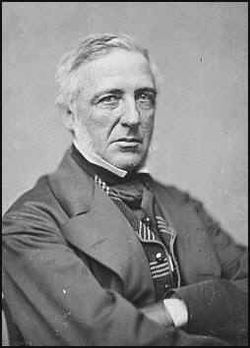 |
Wadsworth, James Samuel James S. Wadsworth James Samuel Wadsworth was a philanthropist, politician, and a Union general in the American Civil War. He was killed in battle during the Battle of the Wilderness of 1864.-Early years:... |
Brigadier General, USV (August 9, 1861) |
Major General, USV (May 6, 1863) |
DOW, Battle of the Wilderness Battle of the Wilderness The Battle of the Wilderness, fought May 5–7, 1864, was the first battle of Lt. Gen. Ulysses S. Grant's 1864 Virginia Overland Campaign against Gen. Robert E. Lee and the Confederate Army of Northern Virginia. Both armies suffered heavy casualties, a harbinger of a bloody war of attrition by... (w. May 6, 1863, d. May 8, 1863) |
|||
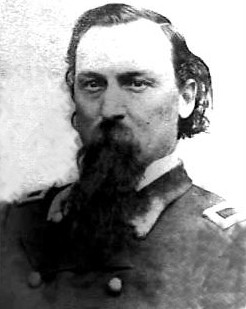 |
Wagner, George Day | Brigadier General, USV (November 29, 1862) |
Relieved of duty at his own request, December 4, 1864 Mustered out August 24, 1865 |
||||
| Wagner, Louis | Colonel, USV | Brigadier General, USV (March 13, 1865) |
Commander-in-chief, GAR (1880) | ||||
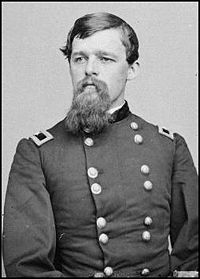 |
Walcutt, Charles C. Charles C. Walcutt Charles Carroll Walcutt was an American surveyor, soldier, and politician. He served as a general in the Union Army during the American Civil War, in which he was wounded twice.... |
Brigadier General, USV (June 30, 1864) |
Major General, USV (March 13, 1865) |
||||
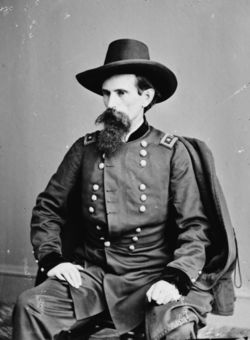 |
Wallace, Lewis "Lew" Lew Wallace Lewis "Lew" Wallace was an American lawyer, Union general in the American Civil War, territorial governor and statesman, politician and author... |
Major General, USV (March 21, 1862) |
Commissioner on Lincoln assassination trial Abraham Lincoln assassination The assassination of United States President Abraham Lincoln took place on Good Friday, April 14, 1865, as the American Civil War was drawing to a close. The assassination occurred five days after the commanding General of the Army of Northern Virginia, Robert E. Lee, and his battered Army of... Territorial Governor of New Mexico (1878-1881) U.S. minister to the Ottoman Empire United States Ambassador to Turkey The United States of America has maintained many high level contacts with Turkey since the nineteenth century.-Chargé d'Affaires:*George W. Erving *David Porter -Minister Resident:*David Porter *Dabney Smith Carr... (1881-1885) |
||||
 |
Wallace, William Harvey Lamb | Brigadier General, USV (March 21, 1862) |
DOW, Battle of Shiloh Battle of Shiloh The Battle of Shiloh, also known as the Battle of Pittsburg Landing, was a major battle in the Western Theater of the American Civil War, fought April 6–7, 1862, in southwestern Tennessee. A Union army under Maj. Gen. Ulysses S. Grant had moved via the Tennessee River deep into Tennessee and... (w. April 7, 1862, d. April 10, 1862) |
||||
| Ward, George Hull George Hull Ward George Hull Ward was a soldier and Union officer in the American Civil War.-Early life:Ward was born in Worcester, Massachusetts, and educated in the common schools. He married Emily E. Mayo on June 5, 1851... |
Colonel, USV | Brigadier General, USV (March 13, 1865) |
DOW, Battle of Gettysburg Battle of Gettysburg The Battle of Gettysburg , was fought July 1–3, 1863, in and around the town of Gettysburg, Pennsylvania. The battle with the largest number of casualties in the American Civil War, it is often described as the war's turning point. Union Maj. Gen. George Gordon Meade's Army of the Potomac... (w. July 2, 1863, d. July 3, 1863) |
||||
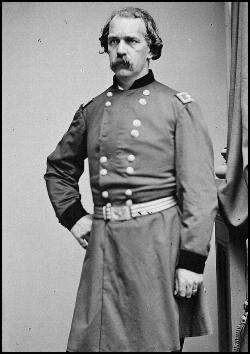 |
Ward, John Henry Hobart J. H. Hobart Ward John Henry Hobart Ward , most commonly referred to as J.H. Hobart Ward, was a career United States Army soldier who fought in the Mexican–American War and served in the New York state militia... |
Brigadier General, USV (October 4, 1862) |
Relieved May 12, 1864 Mustered out June 18, 1864 |
||||
| Ward, William Thomas William Thomas Ward William Thomas Ward was a brigadier general in the United States Army during the American Civil War, a United States Congressman from the U.S state Kentucky, and member of the Kentucky Legislature.-Biography:... |
Brigadier General, USV (September 18, 1861) |
Major General, USV (February 24, 1865) |
U.S. Congressman from Kentucky Kentucky The Commonwealth of Kentucky is a state located in the East Central United States of America. As classified by the United States Census Bureau, Kentucky is a Southern state, more specifically in the East South Central region. Kentucky is one of four U.S. states constituted as a commonwealth... (1851-1853) |
||||
| Warner, Adoniram Judson Adoniram J. Warner Adoniram Judson Warner was a U.S. Representative from Ohio and a general in the Union Army during the American Civil War.-Biography:... |
Colonel, USV, VRC (November 15, 1863) |
Brigadier General, USV (March 13, 1865) |
U.S. Congressman from Ohio Ohio Ohio is a Midwestern state in the United States. The 34th largest state by area in the U.S.,it is the 7th‑most populous with over 11.5 million residents, containing several major American cities and seven metropolitan areas with populations of 500,000 or more.The state's capital is Columbus... (1879-1881, 1883-1887) |
||||
| Warner, James Meech James M. Warner James Meech Warner was a New England manufacturer and a brevet brigadier general in the Union Army during the American Civil War.-Early life:... |
Captain, USA (October 8, 1864) Brigadier General, USV (May 8, 1865) |
Brigadier General, USA (March 13, 1865) |
USMA, 1860 | ||||
| Warner, Willard Willard Warner Willard Warner was a brevet brigadier general in the Union Army during the American Civil War. He was a U.S. senator from the state of Alabama after the war.-Early life and career:... |
Colonel, USV (October, 1864) |
Major General, USV (March 13, 1865) |
U.S. Senator from Alabama Alabama Alabama is a state located in the southeastern region of the United States. It is bordered by Tennessee to the north, Georgia to the east, Florida and the Gulf of Mexico to the south, and Mississippi to the west. Alabama ranks 30th in total land area and ranks second in the size of its inland... (1868-1871) Brother-in-law of Charles Robert Woods Charles R. Woods Charles Robert Woods was a career United States Army officer and a Union general during the American Civil War... and William Burnham Woods William Burnham Woods William Burnham Woods was an American jurist, politician, and soldier.-Early life and career:Woods was born on August 3, 1824 in Newark, Ohio. He was the older brother of Charles R. Woods, another future Civil War general. He attended college at both Western Reserve University and Yale... |
||||
| Warren, Fitz Henry Fitz Henry Warren Fitz Henry Warren was a politician and a general during the American Civil War.-Early life and career:Warren was born in Brimfield, Massachusetts. In August 1844, he moved to Burlington in the Iowa Territory. He was an early political activist in the Whig Party... |
Brigadier General, USV (July 16, 1862) |
Major General, USV (August 24, 1865) |
U.S. minister to Guatemala United States Ambassador to Guatemala The following is a list of Ambassadors of the United States, or other chiefs of mission, to Guatemala. The title given by the United States State Department to this position is currently Ambassador Extraordinary and Plenipotentiary.-See also:... (1866-1869) |
||||
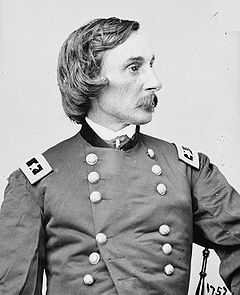 |
Warren, Gouverneur Kemble Gouverneur K. Warren Gouverneur Kemble Warren was a civil engineer and prominent general in the Union Army during the American Civil War... |
Major, USA Major General, USV (May 3, 1863) |
USMA, 1850 Resigned volunteer commission May 27, 1865 |
||||
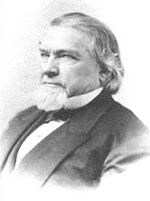 |
Washburn, Cadwallader Colden Cadwallader C. Washburn Cadwallader Colden Washburn was an American businessman, politician, and soldier noted for founding what would later become General Mills and working in government for Wisconsin. He was born in Livermore, Maine, one of seven brothers that included Israel Washburn, Jr., Elihu B. Washburne, William D... |
Major General, USV (November 29, 1862) |
U.S. Congressman from Wisconsin Wisconsin Wisconsin is a U.S. state located in the north-central United States and is part of the Midwest. It is bordered by Minnesota to the west, Iowa to the southwest, Illinois to the south, Lake Michigan to the east, Michigan to the northeast, and Lake Superior to the north. Wisconsin's capital is... (1855-1861, 1867-1871) Governor of Wisconsin Governor of Wisconsin The Governor of Wisconsin is the highest executive authority in the government of the U.S. state of Wisconsin. The position was first filled by Nelson Dewey on June 7, 1848, the year Wisconsin became a state... (1871-1873) Brother of Illinois Illinois Illinois is the fifth-most populous state of the United States of America, and is often noted for being a microcosm of the entire country. With Chicago in the northeast, small industrial cities and great agricultural productivity in central and northern Illinois, and natural resources like coal,... Congressman Elihu Benjamin Washburne Elihu B. Washburne Elihu Benjamin Washburne was one of seven brothers who played a prominent role in the early formation of the United States Republican Party... |
||||
| Washburn, Francis | Colonel, USV | Brigadier General, USV (April 6, 1865) |
DOW, Battle of High Bridge Battle of High Bridge The Battle of High Bridge was fought on April 6–7, 1865, near the end of the Appomattox Campaign of the American Civil War. On April 6, the Confederate cavalry fought stubbornly to secure the Appomattox River bridges. On April 7, elements of the Union II Corps came up against Lt. Gen. James... (w. April 6, 1865, d. April 22, 1865) |
||||
 |
Washburn, Henry Dana Henry D. Washburn Henry Dana Washburn was a U.S. Representative from Indiana and a general in the Union Army during the American Civil War.-Biography:... |
Colonel, USV (July 16, 1862) |
Major General, USV (July 26, 1865) |
U.S. Congressman from Indiana Indiana Indiana is a US state, admitted to the United States as the 19th on December 11, 1816. It is located in the Midwestern United States and Great Lakes Region. With 6,483,802 residents, the state is ranked 15th in population and 16th in population density. Indiana is ranked 38th in land area and is... (1866-1869) |
|||
| Watkins, Louis Douglass | Captain, USA (July, 1862) Brigadier General, USV (September 25, 1865) |
Son-in-law of Lovell Harrison Rousseau | |||||
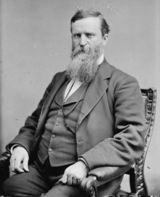 |
Weaver, James Baird | Colonel, USV (1862) |
Brigadier General, USV (March 13, 1865) |
U.S. Congressman from Iowa Iowa Iowa is a state located in the Midwestern United States, an area often referred to as the "American Heartland". It derives its name from the Ioway people, one of the many American Indian tribes that occupied the state at the time of European exploration. Iowa was a part of the French colony of New... (1879-1881, 1885-1889) |
|||
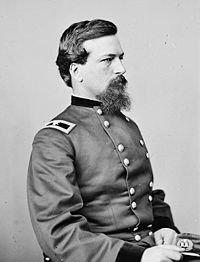 |
Webb, Alexander Stewart Alexander S. Webb Alexander Stewart Webb was a career United States Army officer and a Union general in the American Civil War who received the Medal of Honor for gallantry at the Battle of Gettysburg... |
Brigadier General, USV (June 23, 1863) |
Major General, USA (March 13, 1865) Major General, USV (August 1, 1864) |
CMOH, Battle of Gettysburg Battle of Gettysburg The Battle of Gettysburg , was fought July 1–3, 1863, in and around the town of Gettysburg, Pennsylvania. The battle with the largest number of casualties in the American Civil War, it is often described as the war's turning point. Union Maj. Gen. George Gordon Meade's Army of the Potomac... (July 3, 1864) USMA, 1855 |
|||
| Weber, Max Max Weber (general) Max Weber was a military officer in the armies of Germany and later the United States, most known for serving as a brigadier general in the Union army during the American Civil War.-Biography:... (aka Von Weber, Max) |
Brigadier General, USV (April 28, 1862) |
Resigned May 13, 1865 | |||||
| Webster, Joseph Dana Joseph Dana Webster Joseph Dana Webster was a United States civil engineer and soldier most noted for administrative services during the American Civil War where he served as chief of staff to both Ulysses S. Grant and William T. Sherman.... |
Major, USA (July 1, 1861) Brigadier General, USV (November 29, 1862) |
Major General, USV (March 13, 1865) |
|||||
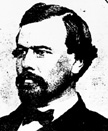 |
Weed, Stephen Hinsdale Stephen H. Weed Stephen Hinsdale Weed was a career military officer in the United States Army. He was killed defending Little Round Top during the Battle of Gettysburg in the American Civil War.-Early life and career:... |
Captain, USA (May 14, 1861) Brigadier General, USV (June 6, 1863) |
USMA, 1854 KIA, Battle of Gettysburg Battle of Gettysburg The Battle of Gettysburg , was fought July 1–3, 1863, in and around the town of Gettysburg, Pennsylvania. The battle with the largest number of casualties in the American Civil War, it is often described as the war's turning point. Union Maj. Gen. George Gordon Meade's Army of the Potomac... (July 2, 1863) |
||||
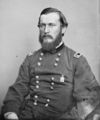 |
Weitzel, Godfrey Godfrey Weitzel Godfrey Weitzel was a major general in the Union army during the American Civil War, as well as the acting Mayor of New Orleans during the Federal occupancy of the city.-Early life and career:... |
Captain, USA Major General, USV (November 17, 1864) |
USMA, 1855 | ||||
| Wells, George Duncan | Colonel, USV | Brigadier General, USV (October 12, 1864) |
DOW, Battle of Cedar Creek Battle of Cedar Creek The Battle of Cedar Creek, or Battle of Belle Grove, October 19, 1864, was one of the final, and most decisive, battles in the Valley Campaigns of 1864 during the American Civil War. The final Confederate invasion of the North, led by Lt. Gen. Jubal A. Early, was effectively ended... (w. October 12, 1864, d. October 13, 1864) |
||||
 |
Wells, Henry Horatio Henry H. Wells Henry Horatio Wells , was a Union Army general in the American Civil War and a carpetbagger who served as the appointed provisional Governor of Virginia from 1868 to 1869 during Reconstruction. He was defeated for election in 1869.-Early life:Henry Wells was born in Rochester, New York and grew up... |
Lieutenant Colonel, USV | Brigadier General, USV (June 3, 1865) |
Provisional Governor of Virginia Governor of Virginia The governor of Virginia serves as the chief executive of the Commonwealth of Virginia for a four-year term. The position is currently held by Republican Bob McDonnell, who was inaugurated on January 16, 2010, as the 71st governor of Virginia.... (1868-1869) |
|||
| Wells, William William Wells (general) -Medal of Honor:Wells commanded the Second Battalion, 1st Vermont Cavalry, in the repulse of Stuart's Cavalry at the Battle of Hanover during the Gettysburg Campaign... |
Brigadier General, USV (May 19, 1865) |
Major General, USV (March 13, 1865) |
|||||
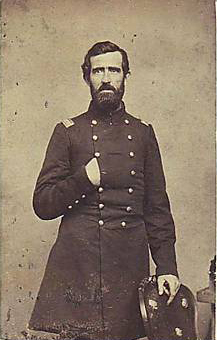 |
Welsh, Thomas Thomas Welsh (general) Thomas Welsh was a soldier in the United States Army during the Mexican-American War and a Union brigadier general during the American Civil War.-Early life and career:... |
Brigadier General, USV (March 13, 1863) |
Original appointment as Brigadier General, USV (November 29, 1862) expired March 4, 1863 Died of malaria Malaria Malaria is a mosquito-borne infectious disease of humans and other animals caused by eukaryotic protists of the genus Plasmodium. The disease results from the multiplication of Plasmodium parasites within red blood cells, causing symptoms that typically include fever and headache, in severe cases... , August 14, 1863 |
||||
| Wessells, Henry Walton | Colonel, USA (1865) Brigadier General, USV (April 25, 1862) |
Brigadier General, USA | USMA, 1833 | ||||
| West, Joseph Rodman Joseph R. West Joseph Rodman West was a United States Senator from Louisiana and a general in the United States Army during and after the American Civil War... |
Brigadier General, USV (October 25, 1862) |
Major General, USV (January 4, 1866) |
U.S. Senator from Louisiana Louisiana Louisiana is a state located in the southern region of the United States of America. Its capital is Baton Rouge and largest city is New Orleans. Louisiana is the only state in the U.S. with political subdivisions termed parishes, which are local governments equivalent to counties... (1871-1877) |
||||
| Wheaton, Frank Frank Wheaton Frank Wheaton was a career military officer in the United States Army during the American Civil War and Indian Wars.-Early life and career:... |
First Lieutenant, USA (1855) Brigadier General, USV (November 29, 1862) |
Major General, USA Major General, USV |
Son-in-law of Adjutant General Samuel Cooper Samuel Cooper (general) Samuel Cooper was a career United States Army officer, serving during the Second Seminole War and the Mexican-American War. Although little-known today, Cooper was also the highest ranking Confederate general during the American Civil War... , CSA |
||||
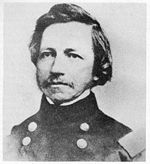 |
Whipple, Amiel Weeks Amiel Weeks Whipple Amiel Weeks Whipple was an American military engineer and surveyor. He served as a brigadier general in the American Civil War, where he was killed in action. Fort Whipple, now Fort Myer, was named in his honor.-Biography:... |
Major General, USV (May 3, 1863) |
Major General, USA (May 7, 1863) |
USMA, 1841 DOW, Battle of Chancellorsville Battle of Chancellorsville The Battle of Chancellorsville was a major battle of the American Civil War, and the principal engagement of the Chancellorsville Campaign. It was fought from April 30 to May 6, 1863, in Spotsylvania County, Virginia, near the village of Chancellorsville. Two related battles were fought nearby on... (w. May 4, 1863, d. May 7, 1863) |
|||
| Whipple, William Denison | Colonel, USA Brigadier General, USV (July 17, 1863) |
Major General, USA | USMA, 1851 | ||||
| Whitaker, Edward Washburn | Lieutenant Colonel, USV | Brigadier General, USv (March 13, 1865) |
CMOH, First Battle of Ream's Station First Battle of Ream's Station First Battle of Ream's Station was a battle fought June 29, 1864, during the Wilson-Kautz Raid of the American Civil War. Confederate forces under Maj. Gen. William Mahone and Brig. Gen. Fitzhugh Lee defeated Union cavalry raiding Confederate railroads south of Petersburg,... (June 29, 1864) |
||||
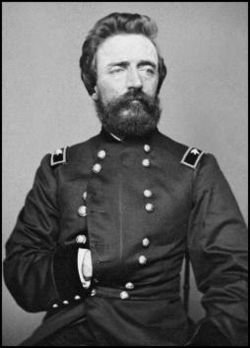 |
Whitaker, Walter Chiles Walter C. Whitaker Walter Chiles Whitaker was an American farmer, attorney, and soldier. He served as an officer in the United States Army during the Mexican–American War, and also was a Union general during the American Civil War... |
Brigadier General, USV (June 25, 1863) |
Major General, USV (March 13, 1865) |
||||
 |
White, Harry Harry White (Pennsylvania) Harry White was a Republican member of the U.S. House of Representatives from Pennsylvania.-Biography:Harry White was born in Indiana, Pennsylvania. He attended the Indiana Academy, and was graduated from Princeton College in 1854. He studied law, was admitted to the bar in June 1855 and... |
Major, USV (December 13, 1861) |
Brigadier General, USV (March 13, 1865) |
U.S. Congressman from Pennsylvania Pennsylvania The Commonwealth of Pennsylvania is a U.S. state that is located in the Northeastern and Mid-Atlantic regions of the United States. The state borders Delaware and Maryland to the south, West Virginia to the southwest, Ohio to the west, New York and Ontario, Canada, to the north, and New Jersey to... (1877-1881) |
|||
| White, Julius Julius White Julius White was a brigadier general in the Union Army during the American Civil War, as well as a postbellum diplomat.-Civil War:... |
Brigadier General, USV (June 9, 1862) |
Major General, USV (March 13, 1865) |
Resigned November 19, 1864 | ||||
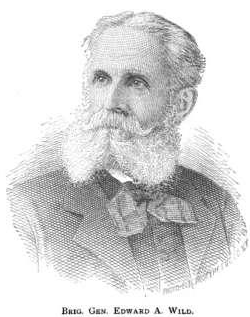 |
Wild, Edward Augustus Edward A. Wild Edward Augustus Wild was an American homeopathic doctor and a brigadier general in the Union Army during the American Civil War.-Early life and career:... |
Brigadier General, USV (April 24, 1863) |
|||||
| Willcox, Orlando Bolivar Orlando B. Willcox Orlando Bolivar Willcox was an American soldier who served as a general in the Union Army during the American Civil War.-Early life:... |
Brigadier General, USV (July 21, 1861) |
Major General, USA Major General, USV |
CMOH First Battle of Bull Run First Battle of Bull Run First Battle of Bull Run, also known as First Manassas , was fought on July 21, 1861, in Prince William County, Virginia, near the City of Manassas... (July 21, 1861) USMA, 1847 |
||||
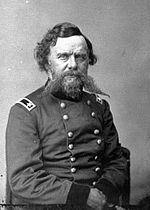 |
Williams, Alpheus Starkey Alpheus S. Williams Alpheus Starkey Williams was a lawyer, judge, journalist, U.S. Congressman, and a Union general in the American Civil War.-Early life:... |
Brigadier General, USV (May 17, 1861) |
Major General, USV (January 12, 1866) |
U.S. Congressman from Michigan Michigan Michigan is a U.S. state located in the Great Lakes Region of the United States of America. The name Michigan is the French form of the Ojibwa word mishigamaa, meaning "large water" or "large lake".... (1875-1879) |
|||
| Williams, David Henry | Brigadier General, USV (November 29, 1862) |
Appointment expired March 4, 1863 | |||||
| Williams, Nelson Grosvenor Nelson G. Williams Nelson G. Williams was a New York City customs agent and Union Army officer during the American Civil War.-Early life:Williams was born in New York and was appointed to West Point in 1839. He resigned a year later due to poor math grades. He worked as an importer in New York City before moving to... |
Brigadier General, USV (November 29, 1862) |
USMA (class of 1843), withdrew July, 1840 Resigned November 27, 1862 Appointment expired March 9, 1863 |
|||||
| Williams, Seth Seth Williams Seth Williams was an American military officer who served as assistant adjutant general of the Union's Army of the Potomac during the American Civil War.-Early life:... |
Major, USA (August, 1861) Brigadier General, USV (September 23, 1861) |
Major General, USA (March 13, 1864) Major General, USV (August, 1864) |
USMA, 1842 | ||||
| Williams, Thomas Thomas Williams (general) Thomas R. Williams was an antebellum United States Army officer and a brigadier general in the Union Army during the American Civil War. He was killed as he commanded the Union troops at the Battle of Baton Rouge.... |
Major, USA (May 14, 1861) Brigadier General, USV (September 28, 1861) |
KIA, Battle of Baton Rouge Battle of Baton Rouge (1862) The Battle of Baton Rouge was a ground and naval battle in the American Civil War fought in East Baton Rouge Parish, Louisiana, on August 5, 1862. The Union victory halted Confederate attempts to recapture the capital city of Louisiana.-Background:... (August 5, 1862) |
USMA, 1837 | ||||
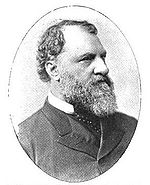 |
Williamson, James Alexander James Alexander Williamson James A. Williamson was a politician, and lawyer who served in the Union army during the American Civil War, rising to the rank of brigadier general. He received the Medal of Honor for his actions at the Battle of Chickasaw Bayou.-Biography:Williamson was born in Columbia, Kentucky in 1829... |
Brigadier General, USV (January 13, 1865) |
Major General, USV (March 13, 1865) |
CMOH, Battle of Chickasaw Bayou Battle of Chickasaw Bayou The Battle of Chickasaw Bayou, also called Walnut Hills, fought December 26–29, 1862, was the opening engagement of the Vicksburg Campaign during the American Civil War. Confederate forces under Lt. Gen. John C. Pemberton repulsed an advance by Union Maj. Gen. William T... (December 29, 1862) |
|||
| Willich, August August Willich August Willich , born Johann August Ernst von Willich, was a military officer in the Prussian Army and a leading early proponent of Communism in Germany. In 1847 he discarded his title of nobility... (b. Von Willich, August) |
Brigadier General, USV (July 17, 1862) |
Major General, USV (October 21, 1865) |
|||||
.jpg) |
Wilson, James Harrison James H. Wilson James Harrison Wilson was a United States Army topographic engineer, a Union Army Major General in the American Civil War and later wars, a railroad executive, and author.-Early life and engineering:... |
First Lieutenant, USA (1861) Major General, USV (May 6, 1865) |
Major General, USA | USMA, 1860 | |||
| Winthrop, Frederick | Colonel, USV | Major General, USV (April 1, 1865) |
KIA, Battle of Five Forks Battle of Five Forks The Battle of Five Forks was fought on April 1, 1865, southwest of Petersburg, Virginia, in Dinwiddie County, during the Appomattox Campaign of the American Civil War. The battle, sometimes referred to as the "Waterloo of the Confederacy," pitted Union Maj. Gen. Philip H. Sheridan against... (April 1, 1865) |
||||
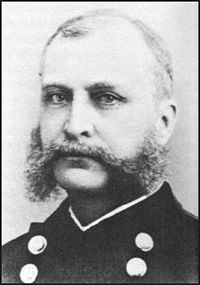 |
Wistar, Isaac Jones Isaac J. Wistar Isaac Jones Wistar was an American lawyer, miner, farmer, soldier, and author. He served in the Union Army during the American Civil War, in which he was wounded twice, and was noted for his criticized performance during the 1864 Bermuda Hundred Campaign... |
Brigadier General, USV (November 29, 1862) |
Resigned September 15, 1864 | ||||
| Witcher, John Seashoales John Witcher John Seashoal Witcher was a nineteenth century politician and clerk from Virginia and West Virginia and was lieutenant colonel of the 3rd West Virginia Volunteer Cavalry in the Civil War.-Biography:... |
Lieutenant Colonel, USV (May 6, 1865) |
Brigadier General, USV (March 13, 1865) |
U.S. Congressman from West Virginia West Virginia West Virginia is a state in the Appalachian and Southeastern regions of the United States, bordered by Virginia to the southeast, Kentucky to the southwest, Ohio to the northwest, Pennsylvania to the northeast and Maryland to the east... (1869-1871) |
||||
| Withington, William Herbert | Colonel, USV | Brigadier General, USV (March 13, 1865) |
CMOH, First Battle of Bull Run First Battle of Bull Run First Battle of Bull Run, also known as First Manassas , was fought on July 21, 1861, in Prince William County, Virginia, near the City of Manassas... (July 21, 1861) |
||||
| Wood, Henry Clay | Major, USA | Brigadier General, USA (March 13, 1865) |
CMOH, Battle of Wilson's Creek Battle of Wilson's Creek The Battle of Wilson's Creek, also known as the Battle of Oak Hills, was fought on August 10, 1861, near Springfield, Missouri, between Union forces and the Missouri State Guard, early in the American Civil War. It was the first major battle of the war west of the Mississippi River and is sometimes... (August 10, 1861) |
||||
| Wood, Thomas John Thomas J. Wood Thomas John Wood was a career United States Army officer and a Union general during the American Civil War.-Early life and career:... |
Colonel, USA (1861) Major General, USV (January 27, 1865) |
USMA, 1845 | |||||
| Woodbury, Daniel Phineas Daniel Phineas Woodbury Daniel Phineas Woodbury was an American soldier and an engineer during the American Civil War.-Birth and early years:... |
Lieutenant Colonel, USA (1861) Brigadier General, USV (March 19, 1862) |
Major General, USA (August 15, 1864) | USMA, 1836 Died of yellow fever Yellow fever Yellow fever is an acute viral hemorrhagic disease. The virus is a 40 to 50 nm enveloped RNA virus with positive sense of the Flaviviridae family.... (August 15, 1864) |
||||
| Woodford, Steward Lyndon Stewart L. Woodford Stewart Lyndon Woodford was an American politician.-Life:He studied at Yale University and Columbia College . At the latter he graduated in 1854 and was a member of St. Anthony Hall... |
Colonel, USV | Brigadier General, USV (May 12, 1865) |
U.S. Congressman from New York New York New York is a state in the Northeastern region of the United States. It is the nation's third most populous state. New York is bordered by New Jersey and Pennsylvania to the south, and by Connecticut, Massachusetts and Vermont to the east... (1873-1874) U.S. minister to Spain United States Ambassador to Spain -Ambassadors:*John Jay**Appointed: September 29, 1779**Title: Minister Plenipotentiary**Presented credentials:**Terminated mission: ~May 20, 1782*William Carmichael**Appointed: April 20, 1790**Title: Chargé d'Affaires... (1897-1898) |
||||
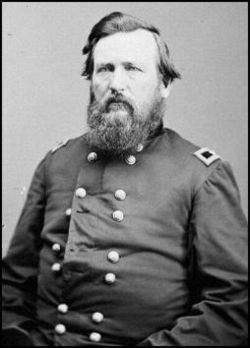 |
Woods, Charles Robert Charles R. Woods Charles Robert Woods was a career United States Army officer and a Union general during the American Civil War... |
Captain (April 1, 1861) Brigadier General, USV (August 4, 1863) |
Major General, USA (March 13, 1865) Major General, USV (November 22, 1864) |
USMA, 1852 Brother of William Burnham Woods William Burnham Woods William Burnham Woods was an American jurist, politician, and soldier.-Early life and career:Woods was born on August 3, 1824 in Newark, Ohio. He was the older brother of Charles R. Woods, another future Civil War general. He attended college at both Western Reserve University and Yale... Brother-in-law of Willard Warner Willard Warner Willard Warner was a brevet brigadier general in the Union Army during the American Civil War. He was a U.S. senator from the state of Alabama after the war.-Early life and career:... |
|||
.jpg) |
Woods, William Burnham William Burnham Woods William Burnham Woods was an American jurist, politician, and soldier.-Early life and career:Woods was born on August 3, 1824 in Newark, Ohio. He was the older brother of Charles R. Woods, another future Civil War general. He attended college at both Western Reserve University and Yale... |
Brigadier General, USV (May 31, 1865) |
Major General, USV (March 13, 1865) |
Associate Justice of the Supreme Court Associate Justice of the Supreme Court of the United States Associate Justices of the Supreme Court of the United States are the members of the Supreme Court of the United States other than the Chief Justice of the United States... (1880-1887) Brother of Charles Robert Woods Charles R. Woods Charles Robert Woods was a career United States Army officer and a Union general during the American Civil War... Brother-in-law of Willard Warner Willard Warner Willard Warner was a brevet brigadier general in the Union Army during the American Civil War. He was a U.S. senator from the state of Alabama after the war.-Early life and career:... |
|||
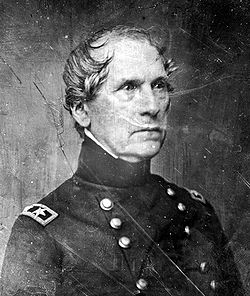 |
Wool, John Ellis John E. Wool John Ellis Wool was an officer in the United States Army during three consecutive U.S. wars: the War of 1812, the Mexican-American War and the American Civil War. By the time of the Mexican-American War, he was widely considered one of the most capable officers in the army and a superb organizer... |
Major General, USA (May 16, 1862) |
Retired August 1, 1863 Oldest Civil War general in active service (b. February 29, 1784) |
||||
| Wright, George George Wright (general) George Wright was an American soldier who served in the Mexican-American War and the American Civil War.-Early life and career:... |
Colonel, USA (1855) Brigadier General, USV (September 28, 1861) |
USMA, 1822 Died in the wreck of the steamer Brother Jonathan Brother Jonathan (steamer) The Brother Jonathan was a paddle steamer that crashed on an uncharted rock near Point St. George, off the coast of Crescent City, California, on July 30, 1865. The ship was carrying 244 passengers and crew with a large shipment of gold. Only 19 survived the wreck, making it the deadliest shipwreck... (June 30, 1865) |
|||||
 |
Wright, Horatio Gouverneur Horatio Wright Horatio Gouverneur Wright was an engineer and general in the Union Army during the American Civil War. After the war, he was involved in a number of engineering projects, including the Brooklyn Bridge and the completion of the Washington Monument, and served as Chief of Engineers for the U.S... |
Major, USA (August, 1861) Major General, USV (May 12, 1864) |
Major General, USA (March 13, 1865) |
USMA, 1841 Original appointment as Major General, USV (July 18, 1862) expired March 4, 1863 |
Y
| Image | Name | Substantive Rank | Brevet Brevet (military) In many of the world's military establishments, brevet referred to a warrant authorizing a commissioned officer to hold a higher rank temporarily, but usually without receiving the pay of that higher rank except when actually serving in that role. An officer so promoted may be referred to as being... Rank | Young, Samuel Baldwin Marks Samuel Baldwin Marks Young Samuel Baldwin Marks Young was a United States Army general. He also served as the first president of Army War College between 1902 and 1903. He then served from 1903 until 1904 as the first Chief of Staff of the United States Army.-Biography:Young was born in Pittsburgh, Pennsylvania, to John... | Colonel, USV (December, 1864) |
Brigadier General, USV (April 9.1865) |
Commander-in-chief, MOLLUS (1913-1915, 1915-1919) |
|---|---|---|---|---|---|---|---|
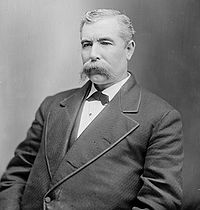 |
Young, Thomas Lowry Thomas L. Young Thomas Lowry Young was a Republican politician from Ohio. Young served as the 33rd Governor of Ohio.-Biography:... |
Colonel, USV | Brigadier General, USV (March 13, 1865) |
Governor of Ohio(1877-1878) U.S. Congressman from Ohio Ohio Ohio is a Midwestern state in the United States. The 34th largest state by area in the U.S.,it is the 7th‑most populous with over 11.5 million residents, containing several major American cities and seven metropolitan areas with populations of 500,000 or more.The state's capital is Columbus... (1879-1883) |
Z
| Image | Name | Substantive Rank | Brevet Brevet (military) In many of the world's military establishments, brevet referred to a warrant authorizing a commissioned officer to hold a higher rank temporarily, but usually without receiving the pay of that higher rank except when actually serving in that role. An officer so promoted may be referred to as being... Rank | Zook, Samuel Kosciuszko Samuel K. Zook Samuel Kosciuszko Zook was a Union general during the American Civil War, killed in action during the Battle of Gettysburg.-Early years:... | Brigadier General, USV (November 29, 1862) |
Major General, USV (July 3, 1863) |
DOW, Battle of Gettysburg Battle of Gettysburg The Battle of Gettysburg , was fought July 1–3, 1863, in and around the town of Gettysburg, Pennsylvania. The battle with the largest number of casualties in the American Civil War, it is often described as the war's turning point. Union Maj. Gen. George Gordon Meade's Army of the Potomac... (July 2, 1863, d. July 3, 1863) |
|---|
See also
- General officers in the Confederate States Army
- General officers in the United States

